Violence! Sex! Defiance! Trump’s over-the-top presidency has changed the rules for prospective candidates
Roy Moore was twice ousted from the Alabama Supreme Court for flouting the U.S. Constitution. Now he’s on a path to become the state’s next U.S. senator.
Scott Wagner accosted a videographer recording him as he campaigned for Pennsylvania governor. He’s since won the endorsement of Stephen K. Bannon, the president’s political alter ego, and is a strong contender to win the GOP nomination.
Kid Rock, the country-rapper-rock star whose resume includes a sex tape, Waffle House brawl and enough raunchy lyrics to fill a pornographic novel, was treated as a serious prospect for Senate in Michigan until he removed himself from consideration Tuesday in characteristically colorful fashion.
“… no, I’m not running for Senate,” he said in an expletive-laden announcement on Howard Stern’s SiriusXM radio show. “Are you … kidding me?”
Trump assails ‘politically motivated ingrates’ as San Juan mayor renews pleas for more help
President Trump on Sunday morning assailed “politically motivated ingrates” for criticizing the speed and scope of the federal recovery effort in the wake of Hurricane Maria, while praising first responders, the military, Puerto Rico’s governor and federal workers.
His remarks were in a series posts on Twitter, just as on Saturday morning when Trump first unleashed attacks on his critics in Puerto Rico from his New Jersey golf resort. While less acidic than those a day earlier that drew a strong backlash, the tweets signaled that Trump is comfortable keeping the furor alive.
Maria, a Category 4 storm, devastated Puerto Rico, whose 3.4 million residents are U.S. citizens. It struck on Sept. 20, hard on the heels of hurricanes Harvey and Irma, which raked Texas and Florida respectively. Puerto Rico, too, was picking up after Irma’s damage even as Maria slammed it.
In the first of two dozen tweets on Saturday, Trump attacked the “poor leadership” of the mayor of ravaged San Juan, who had criticized him in pleading for more aid, suggested that Puerto Ricans officials were “not able to get their workers to help” and said islanders “want everything to be done for them.”
San Juan Mayor Carmen Yulin Cruz, appearing Sunday on ABC’s “This Week,” for a second day declined to respond directly to Trump’s personal criticism of her, saying: “There’s only one goal, and that’s saving lives.”
Cruz also said she appreciated the efforts of responders, including those from the Federal Emergency Management Agency, but felt they had not been given sufficient means to help those in the most dire need. For example, she said, people were being told to register online for aid, but very few have access to the internet.
“I recognize the good heart that the FEMA people have, and they want to help,” she said. “They just don’t have the resources.”
Trump’s defenders have cited enormous logistical obstacles and the heavy strain placed on responders by the two previous hurricanes. William “Brock” Long, the FEMA administrator, pointed Sunday to round-the-clock efforts to repair the electrical grid and get basic supplies like food and water to cut-off areas.
“We’ve pushed everything into that island that we can,” said Long, also interviewed on “This Week.” Asked about Trump’s suggestion that Puerto Ricans were not doing enough to help themselves, Long said, “I believe in the Puerto Ricans. They’re pulling their weight.”
Long pointed to the “Herculean effort” being made to help the island and its people recover, but conceded: “We got a long way to go.”
Trump lashes out at Puerto Ricans after mayor’s criticism of administration’s relief effort
From the comfort of his New Jersey golf resort, President Trump lashed out Saturday at the mayor of San Juan, Puerto Rico, and the ravaged island’s residents, defending his administration’s hurricane response by suggesting that Puerto Ricans had not done enough to help themselves.
Trump’s Twitter assault, which began early Saturday and lasted until evening, was set off by criticism from Mayor Carmen Yulin Cruz, who on Friday had criticized the federal response since Hurricane Maria’s Sept. 20 landfall.
“Such poor leadership ability by the Mayor of San Juan, and others in Puerto Rico, who are not able to get their workers to help,” Trump tweeted. He added: “They want everything to be done for them when it should be a community effort. 10,000 federal workers now on island doing a fantastic job.”
The president’s comments were a breathtaking and racially inflected swipe at residents who have labored for more than a week to survive without electricity, running water, food or medical supplies. Media reports have shown residents in the city and villages sweltering in line for hours with gas cans, hoping for enough fuel to run generators. Nearly every hospital in Puerto Rico lost power in the hurricane, though many have crept toward a semblance of operation. Thousands of crates of supplies have arrived in Puerto Rico, but their distribution has been slowed by destroyed roads and trucks and a shortage of drivers to deliver the goods around the island.
U.S. in direct contact with North Korea
The United States is in direct contact with North Korea over its missile and nuclear tests.
“We are probing, so stay tuned,” Secretary of State Rex Tillerson told reporters traveling with him during a daylong visit to China.
“We ask: Would you like to talk? We have lines of communications to Pyongyang. We’re not in a dark situation,” he added.
Tillerson called for a calming of the situation on the Korean Peninsula, but said it was incumbent on North Korea to halt its missile launches.
Following his meetings with Chinese President Xi Jinping and other officials in Beijing, Tillerson said he thinks China has become deeply concerned about the North’s missile and nuclear programs and is working hard to convince Pyongyang to reenter talks. Tillerson did not say specifically what form those talks should take.
“I think the most immediate action that we need is to calm things down,” Tillerson told reporters. “They’re a little overheated right now. And I think we need to calm them down first.”
Tillerson is in China in part to prepare for President Trump’s trip there in November. The president also will visit Japan and South Korea, the two allies most directly affected by North Korea’s aggressions, as well as Vietnam and the Philippines.
The Associated Press contributed to this report.
11:25 a.m. This article was updated with staff reporting.
This article was originally published at 7:37 a.m.
From his golf resort, Trump aims some sharp tweets at a mayor in Puerto Rico
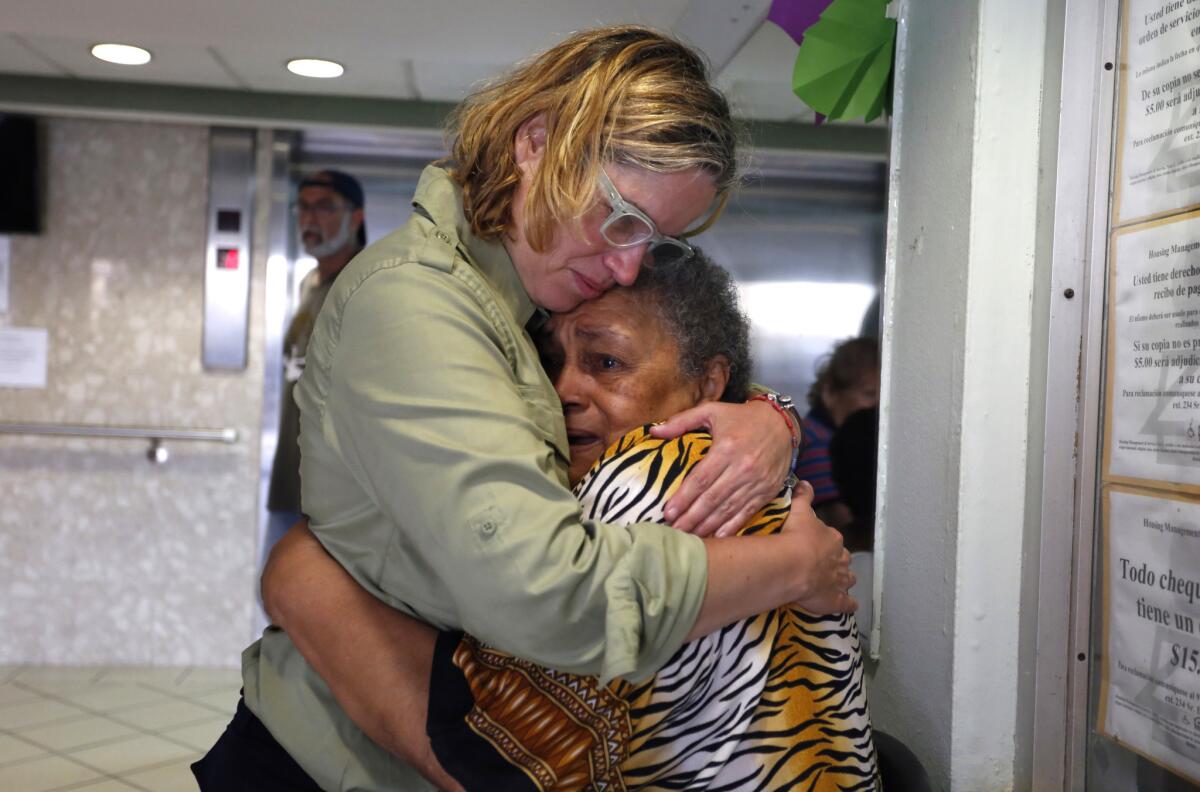
A day after San Juan Mayor Carmen Yulin Cruz criticized the Trump administration’s upbeat take on hurricane relief efforts in Puerto Rico, President Trump is returning fire on Twitter.
Cruz, who has been on television almost daily since Puerto Rico was slammed by Hurricane Maria on Sept. 20, often criticizing the federal response, on Friday said of Trump’s self-congratulatory praise for those efforts, “We are dying & you are killing us with the inefficiency.”
From his golf resort in Bedminster, N.J., on Saturday morning, Trump counterattacked in several tweets, suggesting Cruz was a poor leader who had been “told by the Democrats that you must be nasty to Trump,” and complaining that Puerto Rican workers “want everything to be done for them”:
Trump boasts of doing ‘an incredible job’ in Puerto Rico, even as San Juan mayor pleads ‘save us from dying’
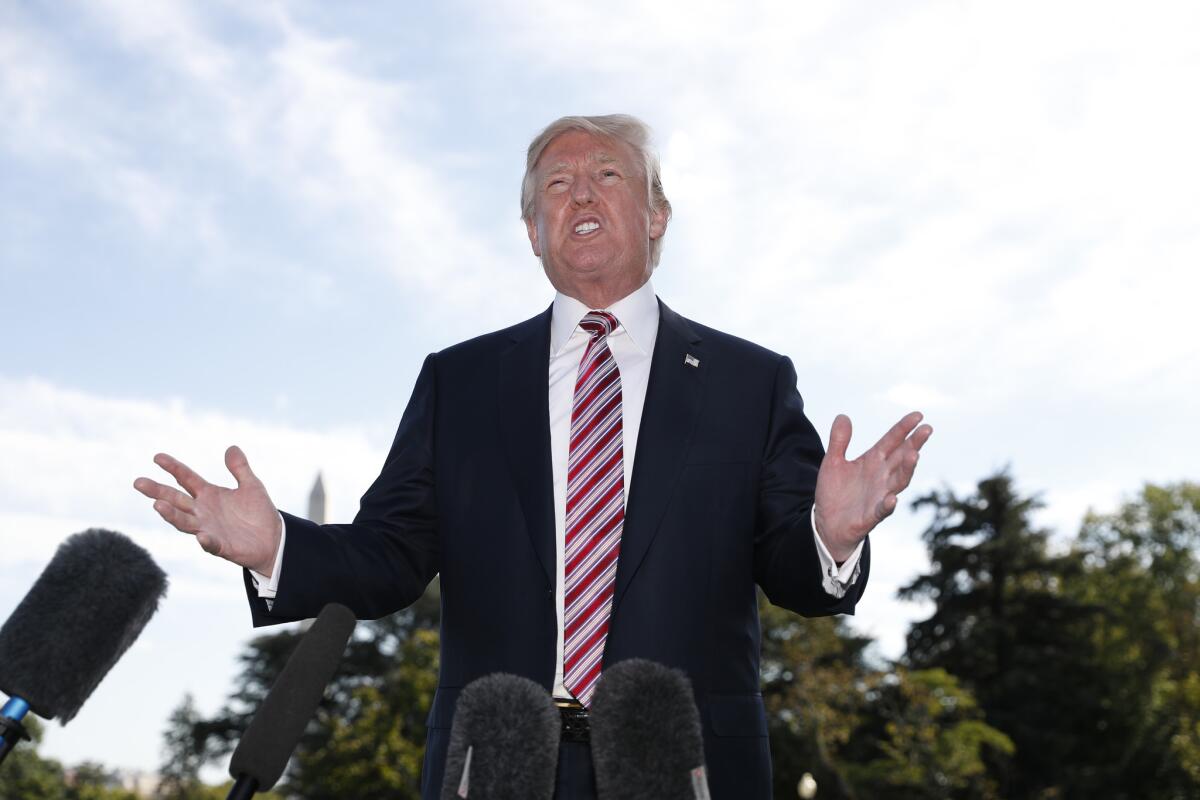
President Trump on Friday continued to praise his administration for doing “an incredible job” responding to Puerto Rico’s devastation, though millions remain without power and clean water nine days after Hurricane Maria.
“We have done an incredible job considering there is absolutely nothing to work with,” Trump told reporters as he left the White House for a weekend at his golf club in Bedminster, N.J.
Only moments after Trump’s self-congratulatory remarks were broadcast, however, the mayor of San Juan was televised with a damning indictment of the U.S. government’s treatment of the 3.5 million Americans on the island.
“I am begging anyone who can hear us to save us from dying,” Carmen Yulin Cruz said into the cameras.
She added: “We are dying and you are killing us with the inefficiency,”
Though Trump earlier this week cited Cruz in a tweet, thanking her for “your kind words” about the federal response, in fact Cruz has been critical almost daily, saying officials are moving too slowly.
The world was witnessing that Puerto Ricans are treated not as “second-class citizens,” Cruz said, “but as animals that can be disposed of.”
The contrast between Trump’s optimistic take and her cries for help, plus heart-rending coverage from Puerto Rico generally, contributed to a spreading perception of a president out of touch.
White House officials have pushed back hard against allegations that the administration’s Puerto Rico response hasn’t measured up to that in Texas and Florida after hurricanes Harvey and Irma.
Trump pushed back as well. In his remarks as he departed for New Jersey, the president cited as he has before the unique difficulties in Puerto Rico, given both the poor condition of its infrastructure before the storm and the intensity of Maria.
“When you look at Texas and when you look at Florida, it’s a whole different level,” Trump said. “Nobody has ever seen when you have a Category 5 wipe out an island like this.”
The island’s power generation plant has been “wiped out,” the president said, adding: “It’s not like, ‘Let’s go back and fix it.’ That’s what I do — I’m a construction guy. You don’t go back and fix it, there is nothing. The power grid is gone.”
He also reiterated his concern about potential costs, saying that the amount of money needed just to replace the power grid “is really tremendous.” Trump said there would have to be talks between Washington and indebted Puerto Rico about how to pay the expenses — a suggestion he did not make about Texas and Florida.
“In the meantime,” Trump said, “we’ve saved a lot of lives. We’ve done a really good job.”
Health and Human Services Secretary Tom Price resigns after controversy over more than $400,000 in taxpayer-paid flights
Health and Human Services Secretary Tom Price resigned Friday in the midst of an expanding controversy over spending hundreds of thousands of dollars in taxpayer money for private air flights.
His departure was announced in a terse statement by the White House.
“Secretary of Health and Human Services Thomas Price offered his resignation earlier today and the President accepted,” the statement said.
Price, a former congressman, was one of four Cabinet members facing questions about private and military airplane flights.
Until Friday night, he had been resisting Democratic calls for his firing. Politico had reported, in stories that unfolded over days, that Price had spent more than $400,000 on private domestic travel in recent months. He spent an additional half million dollars on military aircraft for events in Europe and Africa.
President Trump, asked outside the White House earlier Friday if he planned to fire Price, called him a “fine man” and said he would “make a decision sometime tonight.”
“I certainly don’t like the optics,” Trump said. “I’m not happy, I can tell you that. I’m not happy.”
Three other Cabinet members--Interior’s Ryan Zinke, Treasury Secretary Steve Mnuchin and Environmental Protection Agency administrator Scott Pruitt--also have taken multiple taxpayer-paid flights on private or military aircraft.
None of the three had cost taxpayers as much as Price. The secretary said Thursday that he would repay the government $52,000, a fraction of the cost of the flights.
The attention on costly flights for members of the Trump administration came amid other problems. Investigators on Capitol Hill were looking into the use of private emails for government work by officials including the president’s son-in-law Jared Kushner. Puerto Rican officials, meantime, were lashing out at U.S. rescue efforts that were stalled or not reaching the neediest on the storm-ravaged island.
The criticism hit Trump at a difficult time, taking attention away from his newest endeavor, the tax plan he announced Wednesday in Indiana. Trump has been forced on defense at a time he could be building positive momentum that could boost his popularity and give him more power to pressure Congress his way.
That political danger underscored another: Trump’s presidential victory was powered by his contention that an outsider businessman sympathetic to overlooked Americans could conduct the government to their advantage, competently and efficiently. Central to that pitch was his promise to eradicate self-serving and self-dealing behavior—or, as his enthusiastic crowds put it often, to “Drain the Swamp.”
The multiple crises threaten to undercut him on all of those fronts, allowing opponents to redefine him as a president overlooking his own supporters while sanctioning behavior he once criticized.
Pence to headline Koch network’s strategy session for the midterm elections
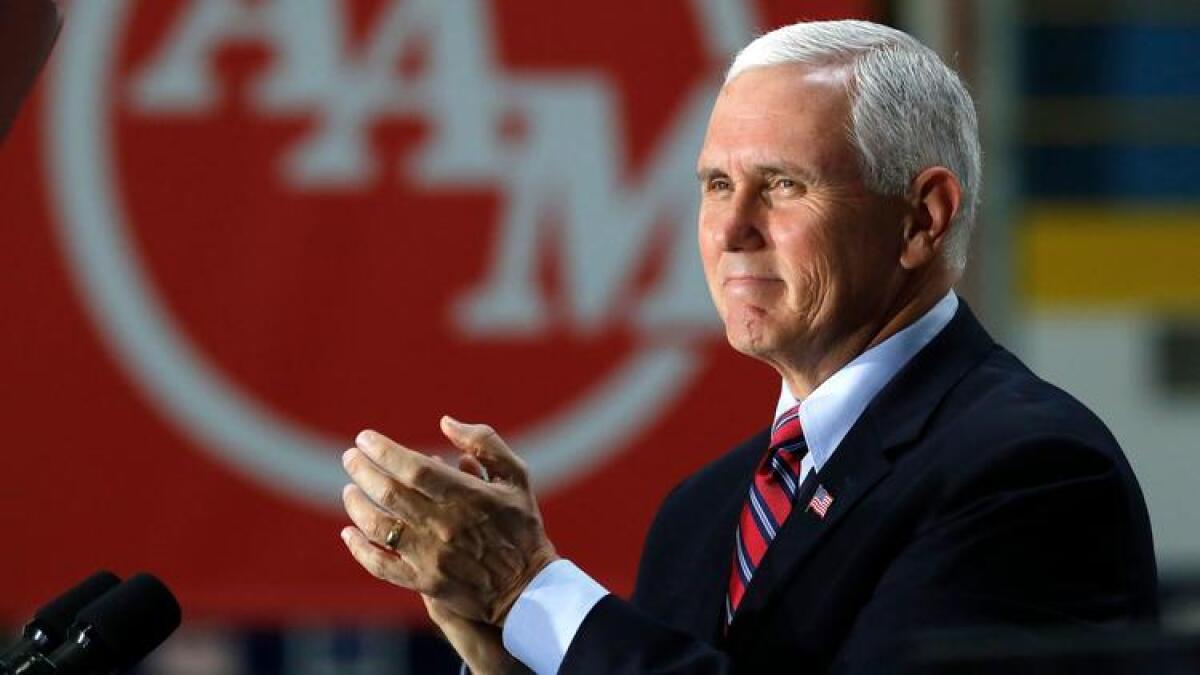
Vice President Mike Pence will deliver the keynote address next month at a retreat in Manhattan of the conservative Koch network, as wealthy donors gather to plan political and policy strategy ahead of the 2018 midterm elections.
The network, founded by billionaire industrialist Koch brothers Charles G. and David H. Koch, has close ties to Pence, which has helped enable it to exert influence in the White House despite not endorsing President Trump in 2016.
Pence held a private conversation in June with Charles Koch ahead of the group’s Colorado Springs seminar with donors who pay $100,000 annual dues to attend network events.
Trump’s legislative director, Marc Short, previously headed the Koch-backed Freedom Partners, a chamber of commerce-style advocacy organization with an aligned political fundraising committee.
The Manhattan meeting on Oct. 12-13 will be the first in New York for the Koch donors network. Over two days, the group will focus on “shaping strategy for the upcoming Senate, House, and gubernatorial races, as well as plans to achieve important policy gains in Washington and state capitals across the country,” according to a statement.
The Koch network has promised to spend up to $400 million on issues and political advocacy in support of its free-market policies during this election cycle, through its sprawling consortium of outside groups, including Americans for Prosperity and others that sometimes outpace the traditional Republican Party infrastructure.
“We are very pleased to host the vice president at our upcoming retreat,” said network spokesman James Davis. “Our members are looking forward to his insight.”
The Koch groups, which have helped shape administrative policy, particularly on tax and regulatory reform, were poised to gain influence at the White House with the departure of top Trump advisor Stephen K. Bannon. His nativist and populist ideas sometimes clashed with the more button-downed, business-oriented group.
But Bannon threatens direct competition for the Koch network now that he has been pushed from the White House — from his perch once again as editor of Breitbart News, the conservative media website. He is trying to tap his own network of wealthy donors to back candidates aligned with Trump’s “America First” agenda.
Bannon is assembling a potential slate of outsider candidates opposed to the Republican establishment, including Roy Moore, the fiery former chief justice in Alabama who defeated appointed Sen. Luther Strange in the Republican primary election this week.
Allies of Bannon’s are looking for other potential candidates to challenge incumbent Republicans, including some senators who have been aligned with the Koch network.
Trump will make his first visit as president to Asia in November
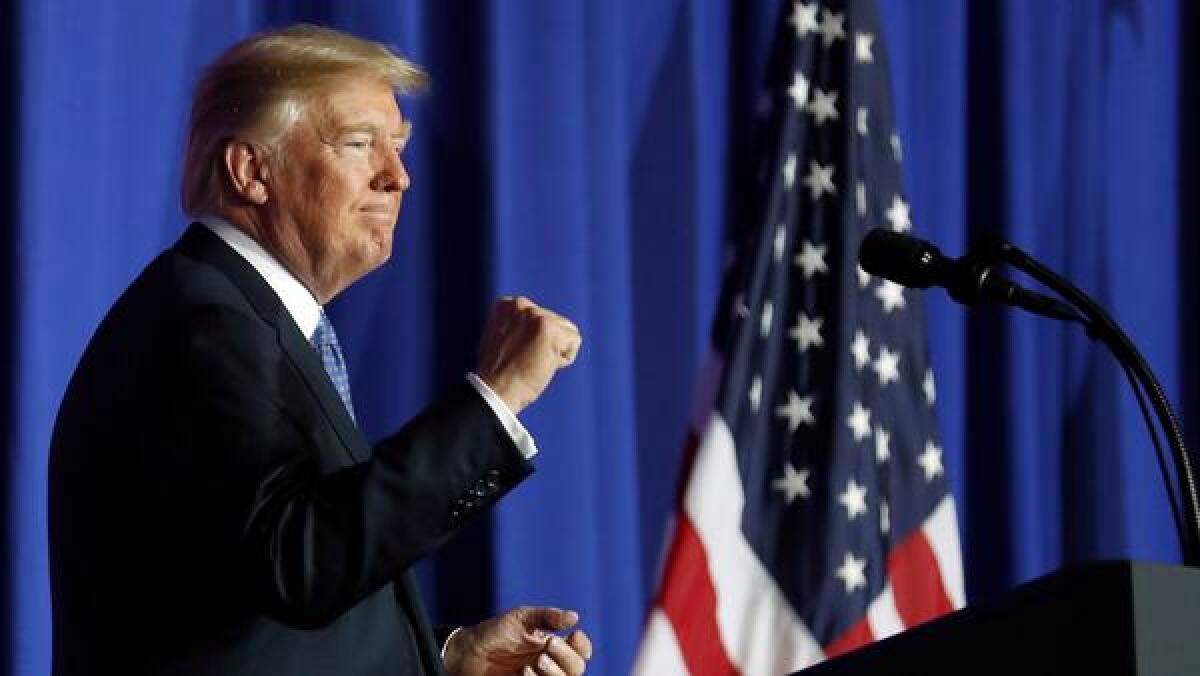
The White House announced Friday that President Trump and First Lady Melania Trump will go on a five-nation Asia tour in early November, with stops in Japan, South Korea, China, Vietnam and the Philippines, as well as a stop in Hawaii.
The trip, scheduled Nov. 3 through 14, will include engagements with the Asia-Pacific Economic Cooperation summit and the Assn. of Southeast Asian Nations summit, demonstrating Trump’s “continued commitment to the alliances and partnerships of the United States in the region,” according to a statement from the White House.
Trump is slated to discuss the importance of a free and open Indo-Pacific region to the United States’ prosperity and security, and the importance of fair and reciprocal economic ties among trade partners, according to the statement.
“The president’s engagements will strengthen the international resolve to confront the North Korean threat and ensure the complete, verifiable, and irreversible denuclearization of the Korean Peninsula,” the statement said.
Why the GOP tax plan’s big boost in the standard deduction won’t be a windfall for some average Americans
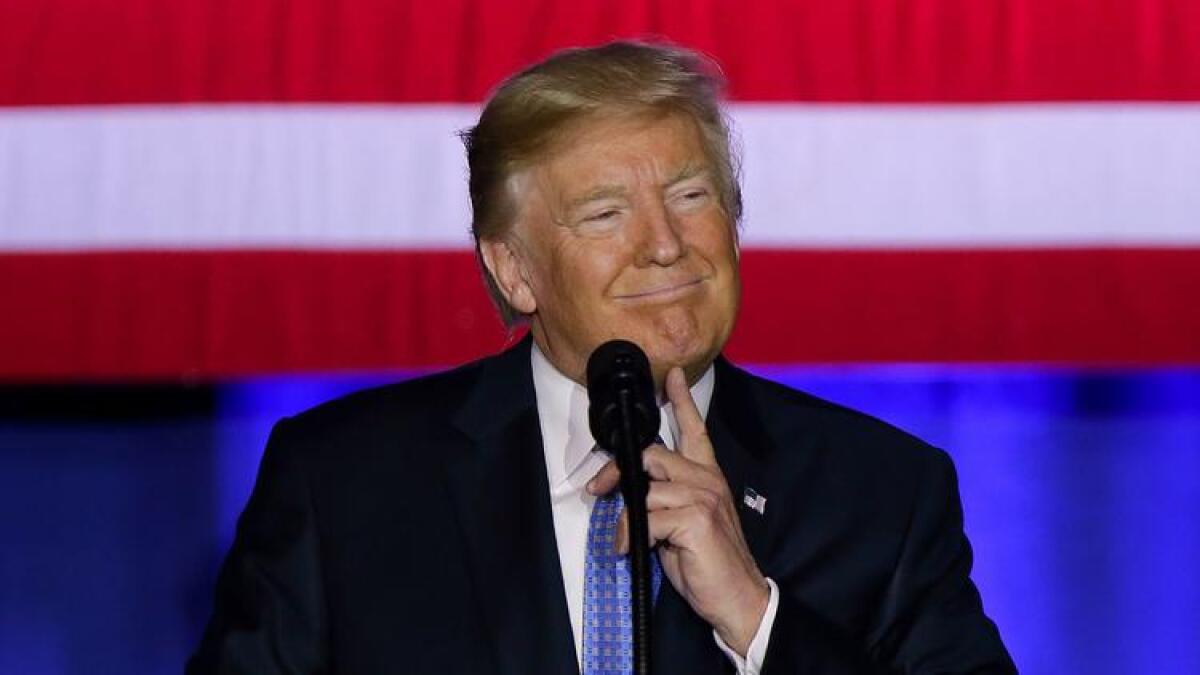
The Republican plan to nearly double the standard deduction as part of a sweeping tax overhaul appears to be a windfall for average Americans because it would allow them to shield thousands of additional dollars from taxes.
But don’t start planning how you’d spend those savings yet.
Another untouted proposed change that would eliminate personal exemptions would significantly reduce the benefit for some people and conceivably wipe it out for others.
A family with two or more children actually could end up worse off than under the current tax code, depending on the final shape of the law, a sign that the Republican plan might not help the middle class as much as it does the wealthy.
“It is definitely not a windfall,” Jacob Leibenluft, a senior advisor at the Center on Budget and Policy Priorities, a liberal think tank, said of the larger standard deduction.
First group of refugees heads from Pacific camps to U.S. under deal Trump slammed as ‘dumb’
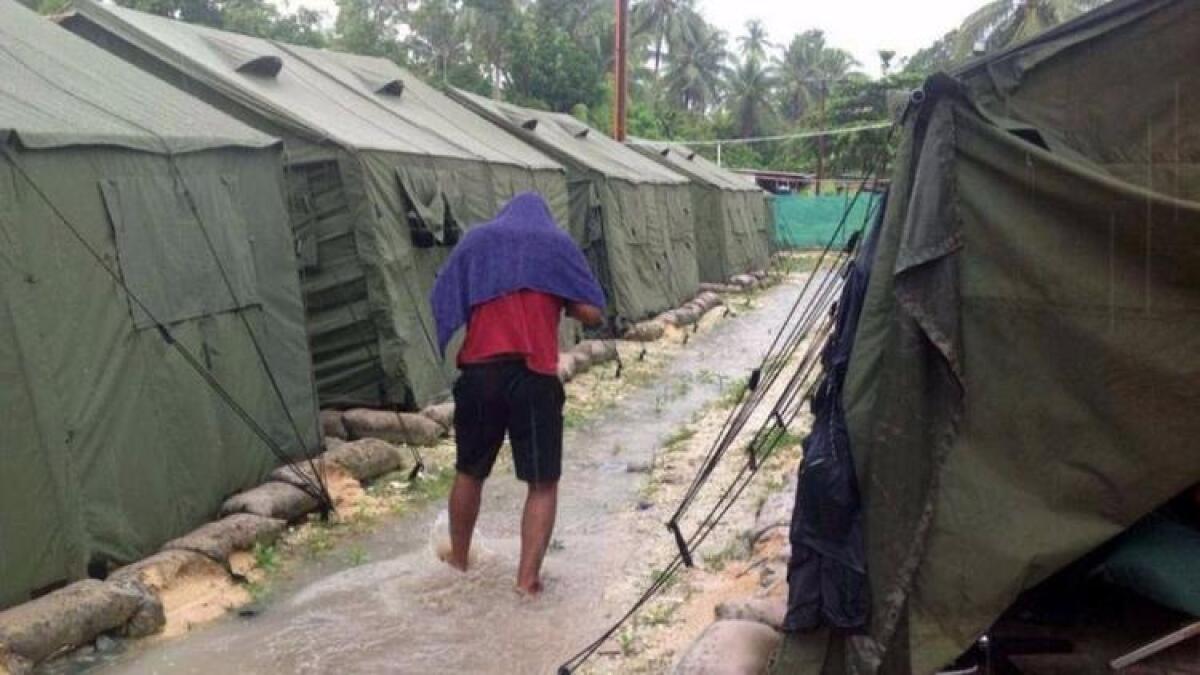
The first refugees accepted under a contentious agreement with Australia are headed to the United States, months after President Trump assailed the deal as “dumb” and not in the country’s best interests.
Fifty-four asylum-seeking refugees left Pacific island camps this week where Australia had housed them for several years. Some came from an all-male camp in Papua New Guinea’s Manus Island, while the others came from a camp on the island of Nauru, a U.S. State Department official said on Thursday. A number of advocacy groups have said the refugees are set to settle in cities from Los Angeles to Atlanta.
The resettlement of the refugees, mostly men from countries such as Iran, Afghanistan, Pakistan, Iraq and Somalia, is part of a deal forged between the United States and Australia under the Obama administration.
Under the agreement, about 1,250 refugees who have been refused entry to Australia and are housed in offshore detention centers will be accepted by the U.S.
Trump falsely says Senate failed to repeal Obamacare because a senator was ‘in the hospital’
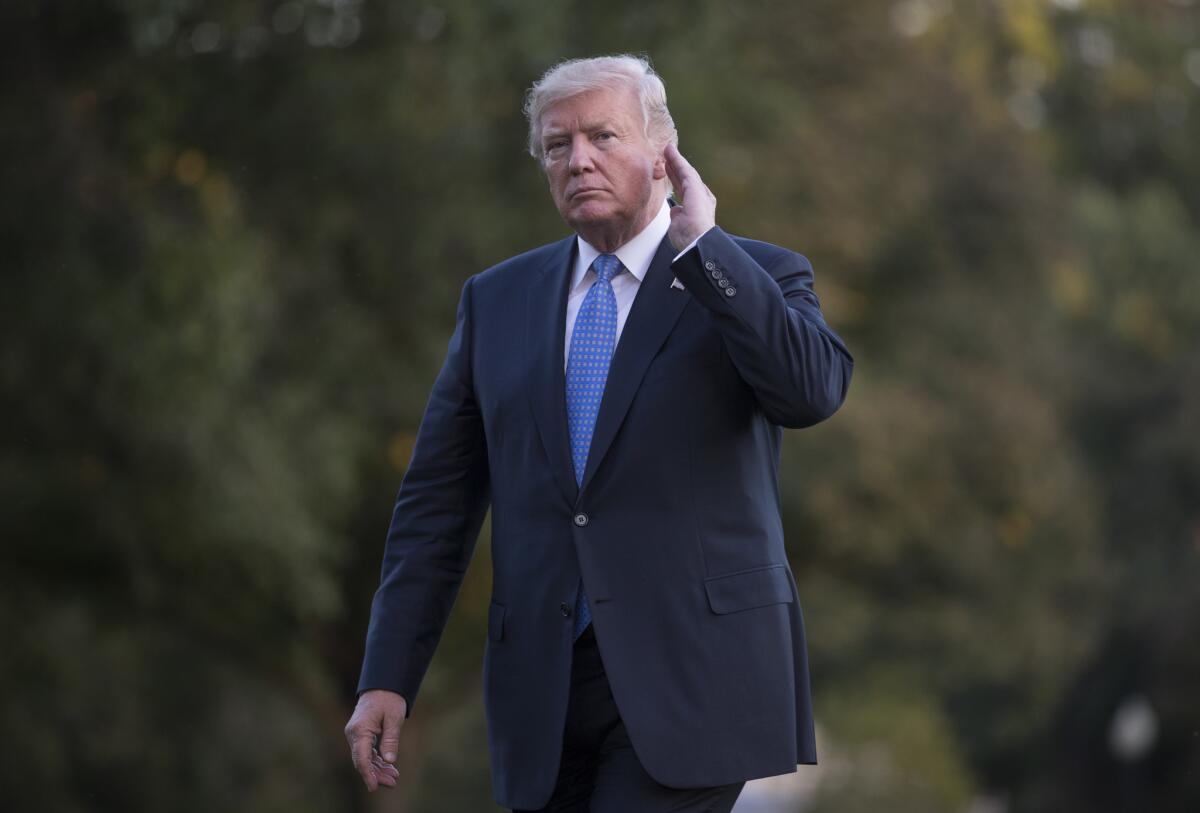
President Trump lately, and oddly, has taken to blaming Republicans’ failure to repeal the Affordable Care Act this week on the false claim that a GOP senator has been “in the hospital” and couldn’t make the vote.
“We have one senator who’s a ‘yes’ vote, a great person, but he’s in the hospital,” Trump said on Thursday morning’s “Fox & Friends” show.
“We have the votes to get it done. You can’t do it when somebody is in the hospital,” Trump reiterated later in the interview.
On Wednesday, he also tweeted about “one Yes vote in hospital” and later told reporters at the White House that Republicans would have the necessary votes, “but with one man in the hospital we cannot display that we have them.”
In fact, the unnamed senator is Thad Cochran of Mississippi, and while he is back in his state for medical treatment, he is not in a hospital. What’s more, according to his staff, Cochran had arranged to return to Washington if he were needed for the healthcare vote.
The Senate leadership called off the vote earlier this week after the 52-member Senate Republican majority couldn’t muster the 50 votes to pass a bill. The public opposition from three Republican senators doomed that bill to defeat
Yet, more mystifying than Trump’s false claim to have enough votes to repeal and replace Obamacare was his repeated talk of a hospitalized senator -- even after Cochran’s office on Wednesday circulated the senator’s own tweet to the contrary.
On Twitter, Cochran thanked Trump for the well-wishes but wrote that he’s “not hospitalized” but “recuperating at home in Mississippi and look forward to returning to work soon.”
White House Press Secretary Sarah Huckabee Sanders defended Trump’s misstatements on Thursday.
“That was our understanding, that the senator was physically unable to be here this week,” she told White House reporters.
She did not explain why the White House would think that about Cochran. With close votes looming, Senate leaders routinely take pains to know where their votes are -- and senators make provision to get to the Senate if necessary.
Nor did she explain how Trump could say he has the necessary votes to pass a healthcare bill in the Senate, with or without Cochran, when Senate Republicans have said otherwise. Instead, her response further confused the matter: “We have the votes on the substance, but not on the process.”
Health Secretary Tom Price says he will partly reimburse $400,000 worth of travel on charter planes
Health and Human Services Secretary Tom Price, who faces mounting criticism over his personal use of charter flights for routine travel around the country, said Thursday he would reimburse the federal government for part of the costs.
But Price did not commit to reimbursing most of the travel tab.
And even as Price expressed regret about his charter travel, which President Trump has criticized, new questions emerged about his use of military aircraft for two international trips earlier this year to Africa, Europe and East Asia.
The international trips, first reported by Politico, cost around $500,000, according to figures confirmed by the Los Angeles Times based on military data.
While use of military aircraft for foreign travel is not unprecedented, particularly for destinations not serviced regularly by commercial airlines, it is not routine for secretaries of domestic agencies and it is unclear whether such an expense was necessary for Price’s trips.
For example, Price used the military planes to travel between Berlin, Geneva and Washington, D.C., defense department records indicate. Those routes are serviced by regular commercial flights
A spokesperson at the Department of Health and Human Services did not immediately respond to questions about the foreign travel.
In his statement about his use of charter aircraft for domestic travel, Price appeared to indicate he made a mistake.
“I regret the concerns this has raised regarding the use of taxpayer dollars,” Price said in a statement announcing the decision.
“All of my political career I’ve fought for the taxpayers,” he added. “It is clear to me that in this case, I was not sensitive enough to my concern for the taxpayer.”
Price’s unusual use of charter flights also was first reported by Politico, which has documented more than two dozen charter flights taken by Price, costing taxpayers more than $400,000.
Health and Human Services said that Price had agreed to repay $52,000 for the flights, which included visits to a resort where he owns land and to Nashville, where he had lunch with a son. It wasn’t immediately clear how he had reached that figure.
The travel is now the subject of an investigation by the inspector general’s office at the Health and Human Services Department.
The House Oversight Committee has also asked the White House and various agencies to turn over information about any private flights.
Price’s predecessor as health secretary, Sylvia Mathews Burwell, never took a charter flight during her roughly 3 years as President Obama’s secretary and took a military plane “a handful of times,” according to a former spokesman who spoke on condition of anonymity.
Burwell’s spouse flew once with her on a military plane, to Cuba, the spokesman said, and he reimbursed the government. A Price spokesman told Politico that Price’s reimbursement for his wife’s flights was unprecedented.
Price, an orthopedic surgeon and former Republican congressman from Georgia, faced ethics questions following his nomination over reports that he traded extensively in the stock of healthcare companies even as he pursued legislation that would have affected some of the same companies.
President Trump said Wednesday that he was “not happy” with Price’s travel, stoking speculation that Price might be forced to resign. “We’ll see,” Trump said to questions from reporters.
Price appeared to allude to that possibility in his statement Thursday.
“I have spent 40 years both as a doctor and in public service putting people first,” he said. “It has been my personal honor to serve the American people, and I look forward to continuing that service.”
W.J. Hennigan and Jackie Calmes in Washington contributed to this report.
This post was updated at 6:18 p.m. with information on Price’s travel by military planes.
This post was updated at 8:07 p.m. with details of Burwell’s travel.
Justice Neil Gorsuch draws protesters with speech at Trump Hotel
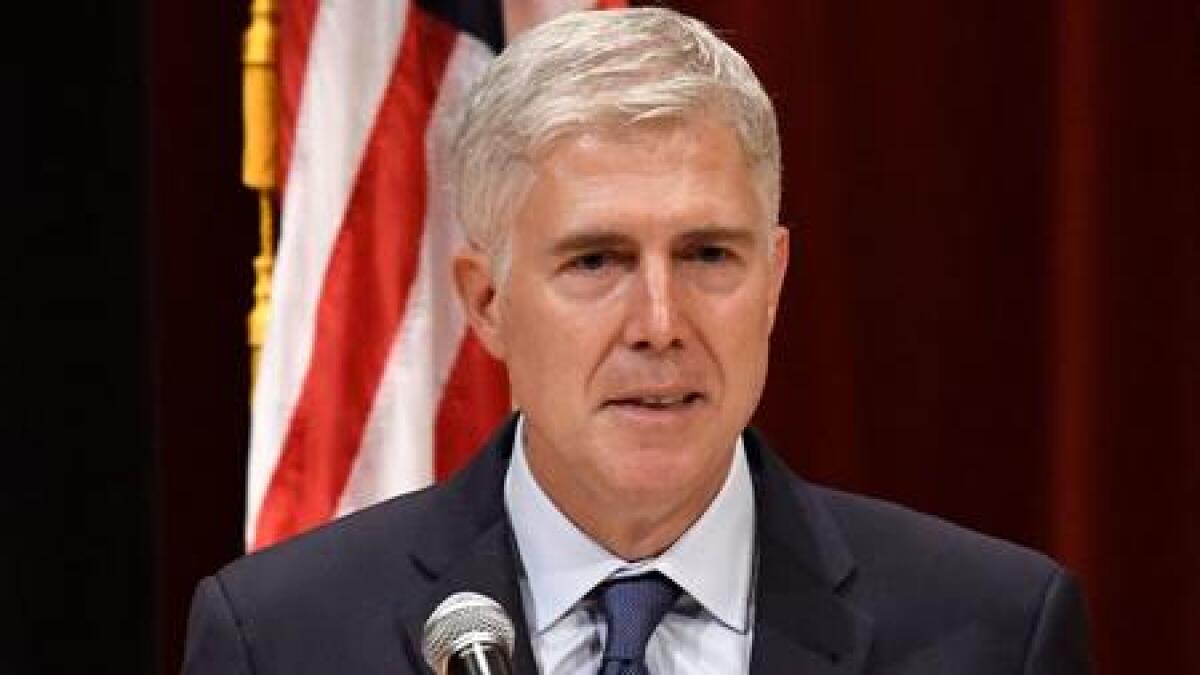
Justice Neil M. Gorsuch, President Trump’s first Supreme Court appointee, on Thursday drew protesters to the Trump International Hotel when he gave his first major speech in Washington there to a conservative education group.
Several progressive groups accused Gorsuch of undercutting the court’s appearance of impartiality. They said he may be required to recuse himself if the justices are asked to decide whether Trump is violating the Constitution’s ban on presidents taking an emolument from a foreign state -- as critics have suggested he is -- by profiting from foreign emissaries using the hotel.
“In an era of ruthless ideological divisions, Justice Gorsuch’s decision will undermine the court’s public legitimacy as an entity above partisan politics,” the groups said in a public letter to Chief Justice John G. Roberts Jr.
The groups included the Planned Parenthood Federation, the Alliance for Justice and NARAL Pro-Choice America.
Gorsuch also drew criticism a week ago for joining Senate Majority Leader Mitch McConnell to speak at the University of Louisville in Kentucky, McConnell’s home state.
In his role as majority leader, McConnell played the key role last year in blocking hearings for President Obama’s Supreme Court nominee, Judge Merrick Garland, which cleared the way for Trump to name Gorsuch to fill the vacant seat and the Republican-controlled Senate to confirm him this year.
In November, Gorsuch is scheduled to give the keynote address at the annual convention of the Federalist Society, a conservative lawyers group.
The meaning of an “emolument” is not entirely clear from the Constitution, but Trump has been sued by a watchdog group called Citizens for Responsibility and Ethics in Washington for violating the constitutional ban. It cites the president’s ownership of the high-end hotel, situated on Pennsylvania Avenue between Congress and the White House, and said his profits could be deemed as emoluments because foreign diplomats are choosing to spend money there.
A judge in New York is scheduled to hear arguments in the case on Oct. 18.
Three-star general named to coordinate military’s Puerto Rico relief efforts

A three-star military commander was named on Thursday to manage Hurricane Maria relief efforts in devastated Puerto Rico.
Lt. Gen. Jeffrey S. Buchanan, an Army infantry officer who served multiple tours in Iraq, is expected to take over at the island command headquarters set up in the convention center in San Juan, the capital. A one-star general arrived earlier in the week.
The Trump administration has been criticized for a slow and inadequate response to the hurricane that hit Puerto Rico just over a week ago, leaving the American island in ruins, without power and increasingly lacking in water and other basic necessities. The military effort is expected to expand in the coming days.
Having a commander who reports both to the governor and the military chain of command will create a “unified team” of military and civilian disaster response units, Craig Fugate, the head of the Federal Emergency Management Administration during the Obama administration, said in a phone interview.
A dual-status commander can marshal U.S. military forces to help clear roads, move supplies and get crews into remote places to assist in fixing the electrical grid, coordinating with public agencies and private utilities.
Fugate noted that the relief effort is hampered by a bottleneck of supplies at the Port of San Juan, and the dearth of passable roads, drivers and gasoline to move the water, food, fuel and other necessities to the communities that need them.
Those problems will not be alleviated by waiving the federal Jones Act so that foreign-flagged ships can freely transport more goods into Puerto Rico. Trump, who waived the act on Thursday, had been criticized for not doing so earlier.
His decision was “probably” more of a political one than an action to bring more aid to the island, Fugate said.
“You have all the armchair quarterbacks shouting out a lot of criticism,” Fugate said. “Sometimes it is just more politically expedient to deal with it just to tamp down all the voices.”
Roy Moore’s victory in Alabama could signal a wave of insurgent candidates like the tea party uprising
Roy Moore’s upset victory in the Alabama Senate primary sent shock waves through the Republican establishment Wednesday, portending a GOP civil war as outsider candidates in other states threaten to challenge incumbents.
The potential showdowns are reminiscent of the tea party uprising that just a few years ago cost Republicans the majority in the Senate. Now President Trump’s populist rise to power — honed by his former advisor Stephen K. Bannon — has generated a new wave of long shot candidates capable of upending the 2018 midterms.
In Mississippi, state Sen. Chris McDaniel, who met with Bannon to consider challenging two-term incumbent Sen. Roger Wicker, called the results in Alabama “a great awakening.”
“The GOP establishment’s stranglehold on American politics is finally coming to an end. It should encourage conservative challengers all across the republic,” he said. “The environment couldn’t be any better.”
Arizona’s Kelli Ward, who is challenging Sen. Jeff Flake, said after Alabama, she felt “inspired and motivated.”
“Voters elected President Trump to shake up the status quo and get big things accomplished,” she said.
Nevada Sen. Dean Heller is another incumbent who faces a challenge by a candidate, Danny Tarkanian, with potential backing from Bannon’s allies.
And in Tennessee, incumbent Sen. Bob Corker’s sudden retirement, announced hours before the polls closed in Alabama, sent several potential candidates scrambling for what promises to be an intense primary.
On Capitol Hill, Republicans braced for more incumbents to resign rather than face challenging nomination fights.
As a result, Republican professionals who until recently felt that their control of the Senate was secure because the states holding elections in 2018 mostly lean red have started to worry. The departure of incumbents and the rise of candidates who Democrats easily can attack as extreme might put their majority at risk, they fear. At minimum, the new wave of challengers likely means more money spent and a Senate Republican Caucus that will lean further right, and be harder to control, after the next election.
“You’re going to see in state after state after state people who follow the model of Judge Moore,” Bannon told a cheering crowd at Moore’s election night party in Montgomery. They are candidates “that do not need to raise money from the elites, from the crony capitalists, from the fat cats in Washington, D.C., New York City, in Silicon Valley,” he said.
House Majority Whip Steve Scalise returns to work at Capitol after June shooting
The congressman shot in June at a baseball practice is returning to work at the Capitol after three months in the hospital and at a rehabilitation facility.
That’s the word from Majority Whip Steve Scalise’s office. The Louisiana Republican will vote Thursday morning and address his colleagues on the House floor. This is his first public appearance since the shooting.
Scalise and four other people were injured June 14 when a gunman opened fire on a Republican baseball practice in nearby Alexandria, Va. U.S. Capitol Police and other officers returned fire and killed the gunman. The rifle-wielding attacker had nursed grievances against President Trump and the GOP.
The 51-year-old congressman was struck in the hip, and the bullet tore into blood vessels, bones and internal organs.
Trump plans to slash refugee admissions by more than half
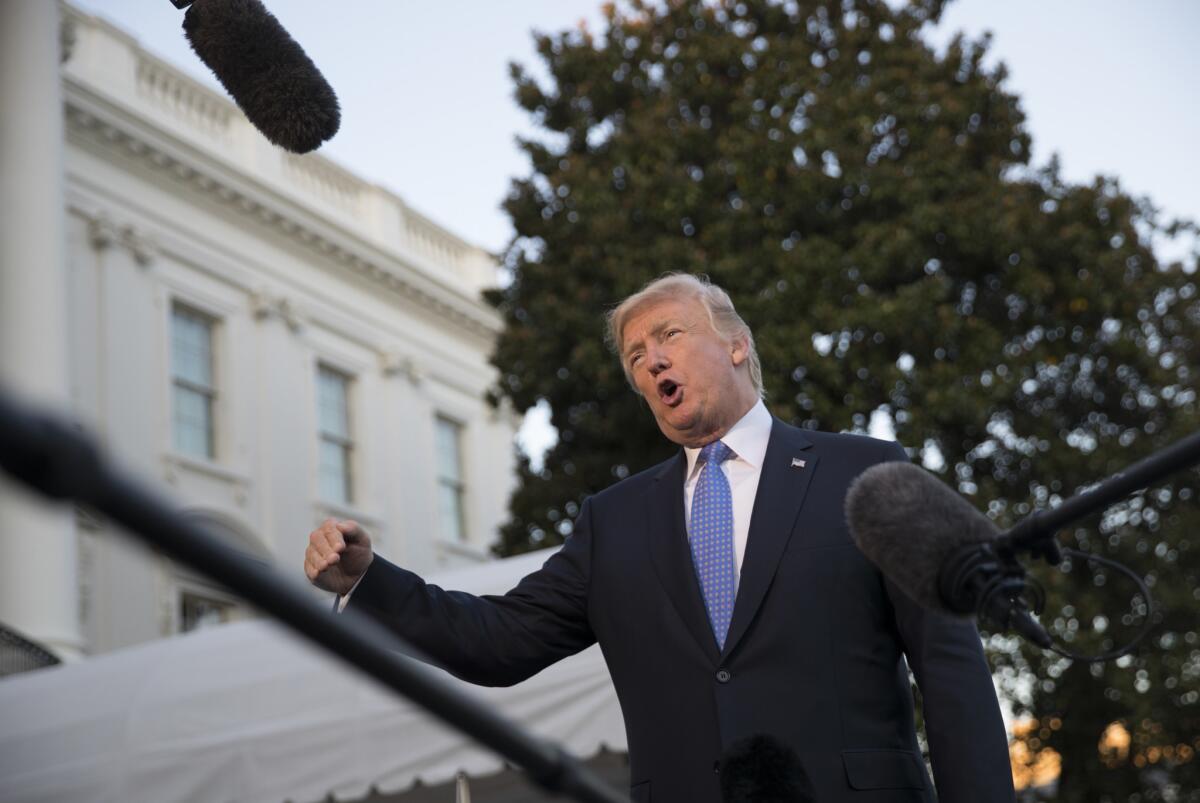
President Trump plans to slash the number of refugees allowed to enter the United States by more than half, pressing a longer-term goal of limiting legal immigration and imposing tougher vetting procedures for foreign visitors.
The Trump administration has told Congress it will limit refugee admissions to about 45,000 in the fiscal year that starts Sunday. That’s down sharply from the 110,000 cap in President Obama’s last year in office, though only about 52,000 were actually admitted because of restrictions put in place after Trump took office.
Here’s why Trump’s tax plan will hit Californians especially hard
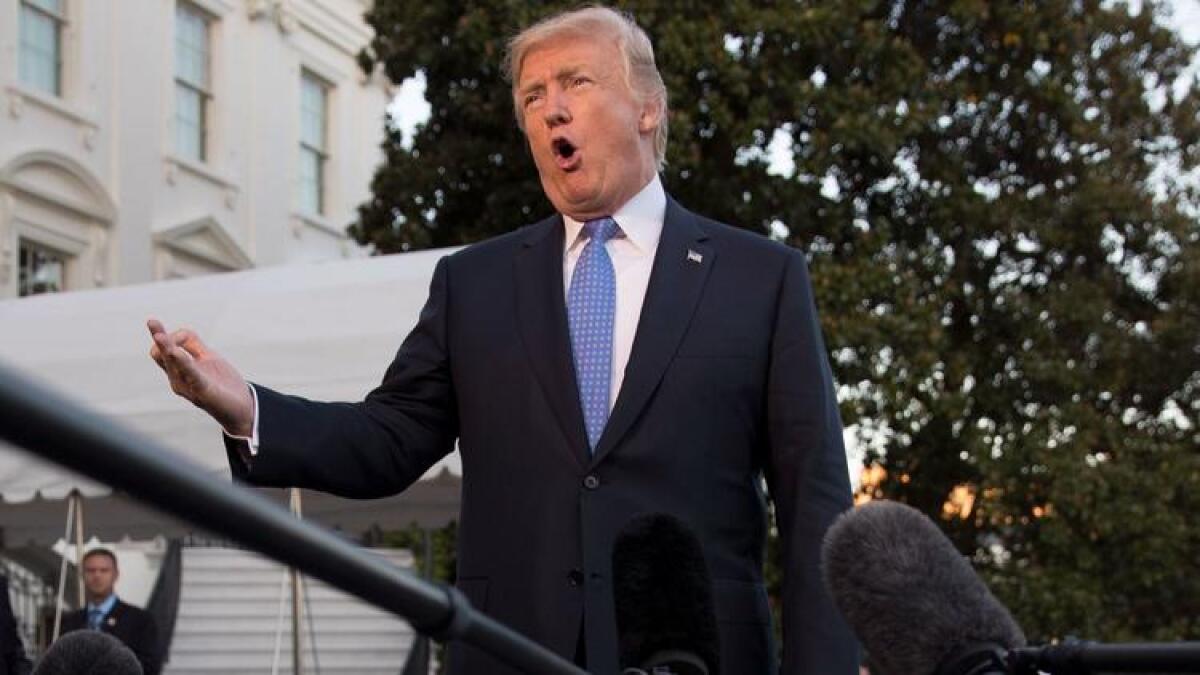
Many Californians face a big financial hit under the Republican tax plan, which would eliminate a major tax break that benefits state residents more than those anywhere else in the U.S.
The federal deduction for state and local taxes allowed Californians to reduce their taxable income by $101 billion in 2014, according to an analysis by the nonpartisan Tax Foundation.
The tax outline released Wednesday by President Trump and top congressional Republicans would ax the break, which largely benefits residents in states that are Democratic strongholds.
“Republicans in Washington have once again zeroed in on California to punish us and make our state the single biggest loser in their reckless tax scheme,” said Senate President Pro Tem Kevin de León (D-Los Angeles).
Sen. Dianne Feinstein (D-Calif.) said the elimination of the deduction was one reason the plan was a “non-starter” for her.
“I don’t believe California should suffer in order for President Trump to give tax cuts to the rich,” she said.
Here’s why California’s early 2020 primary is destined to pick the next president. (Nah, not really)
Today we answer questions.
Woo-hoo! Now that Gov. Jerry Brown has signed the bill, it looks like California is moving up its 2020 presidential primary. Finally!
Uh.
No more watching from the sidelines as small-fry states like Iowa and New Hampshire throw their weight around.
Um.
I’m already fluffing pillows and prepping the guestroom for all the 2020 hopefuls who’ll be camped out.
Er.
What? You don’t seem too excited.
Look, it would be great if California voted in a truly meaningful presidential primary. It’s been about 50 years since that happened. But it’s about as likely in 2020 as President Trump dumping Vice President Pence and running for reelection on a unity ticket with Hillary Clinton.
How can that be?
Lots of reasons, both political and practical.
Do tell.
Twitter to talk to House and Senate as part of probe into Russia’s election meddling
Social media giant Twitter will visit Capitol Hill on Thursday as part of the House and Senate investigations into Russian interference in the 2016 elections.
Twitter’s closed-door meetings with staff follow similar briefings from Facebook earlier this month, and the House and Senate panels have invited both tech giants, along with Google, to appear at public hearings this fall. The committees are scrutinizing the spread of false news stories and propaganda on social media, to what extent Russia was involved and whether anyone in the United States helped target those stories.
After criticism, Trump to waive Jones Act, allowing assistance to reach hurricane-ravaged Puerto Rico
White House Press Secretary Sarah Huckabee Sanders tweeted Thursday morning that Trump would waive the Jones Act, effective immediately, at the request of Puerto Rico Gov. Ricardo Rossello, allowing assistance to reach the hurricane-ravaged U.S. territory.
The Jones Act is a 97-year-old maritime law that says shipping between ports in the United States must be done by U.S.-owned, U.S.-flagged and U.S.-built ships operated by U.S. citizens.
The Jones Act entered the news this week after the federal government waived its restrictions to ease relief efforts for Texas and Florida after their recent hurricanes, but not for Puerto Rico, whose stranded residents are desperate for water, food, medicine and other basic supplies.
As of Wednesday, about 97% of the island’s residents still lacked power, Rossello said, and about half remained without running water.
Increasingly desperate local officials have demanded more help from the federal government and faster delivery of what aid is coming.
“They’re going very slowly. The aid isn’t getting to people fast enough. We seem to be losing a lot of time in jurisdictional trifles,” San Juan Mayor Carmen Yulin Cruz said in an interview Wednesday.
“People are dying,” she said. “We don’t have time for that.”
Trump hints at firing Health Secretary Tom Price over airplane use
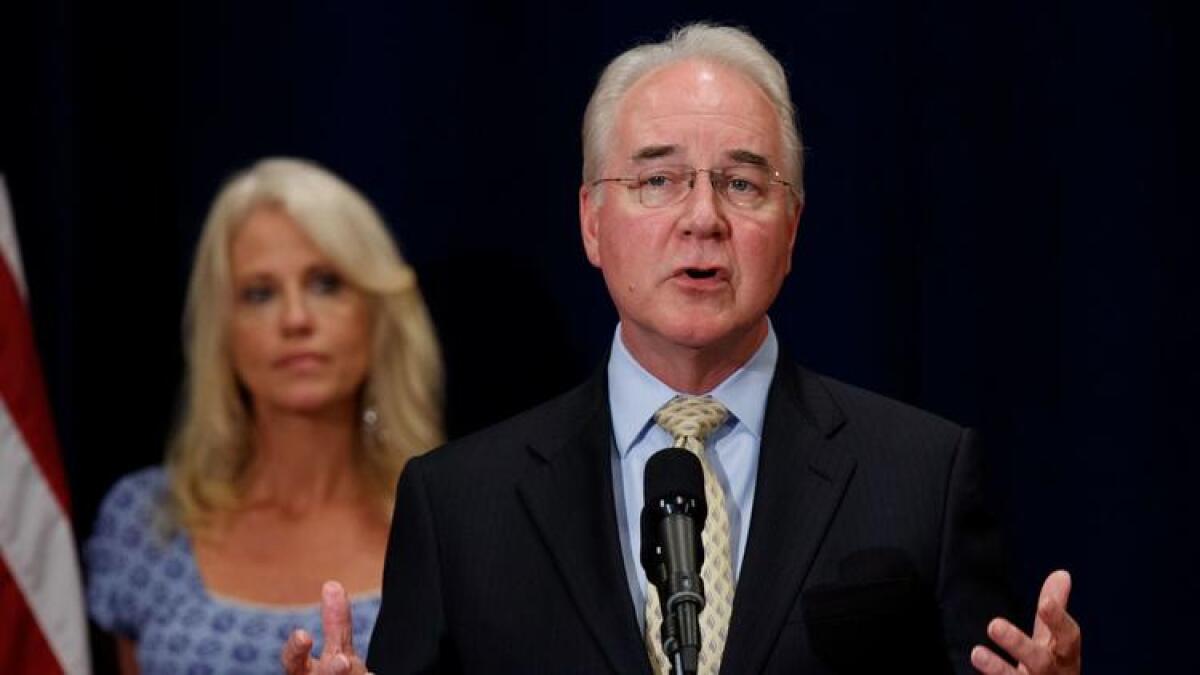
President Trump on Wednesday said he was “not happy” about Health and Human Services Secretary Tom Price’s repeated use of taxpayer-funded expensive charter flights, and did not rule out firing the Cabinet member.
“I’m not happy about it. I am not happy about it. I’m going to look at it,” said Trump. Asked if Price’s job was on the line, he replied: “We’ll see.”
Politico has documented more than two dozen charter flights taken by Price, to the tune of more than $400,000. They included visits to a resort where he owns land and a lunch with his son.
His department’s inspector general is probing the flights, and the House Oversight Committee has asked the White House and various agencies to turn over information about private flights.
Such flights are typically not allowed if there are cheaper commercial options, which Politico said there were for Price’s flights.
Trump’s remarks were the latest example of the White House distancing itself from Price’s actions. On Monday, asked about the flights during a media briefing, Press Sescretary Sarah Huckabee Sanders said that “this wasn’t White House-approved travel.”
Health Secretary Tom Price under scrutiny after spending more than $400,000 on taxpayer-funded travel

The head of Health and Human Services ran up a six-figure tab flying around the country on private jets.
Politico has documented 26 flights by Secretary Tom Price on private charter planes at taxpayer expense since early May, estimating the cost at more than $400,000. It found frequent, low-cost airline flights on some of the routes he took, as well as train fares as low as $72 for a trip between Washington and Philadelphia — as opposed to about $25,000 for his charter.
Two of Price’s private jet trips paid for by the government were to places where he owns property — St. Simons Island, Ga., and Nashvile, Politico reported. A department spokesman said Price conducted official business and visited family members and colleagues.
On Wednesday, President Trump said he’s “not happy’” about Price’s use of private jet.
Price has previously called for deep spending and staffing cuts at the Department of Health and Human Services, including a $6-billion reduction at the National Institutes of Health, opening him to charges of both poor judgment and hypocrisy.
When he was a Georgia congressman, he spoke out against a proposed purchase of small planes to transport government officials, including members of Congress. “This is just another example of fiscal irresponsibility run amok in Congress right now,” he told CNBC.
On Saturday, Price said he would forgo private flights at taxpayer expense pending an internal review, conceding in a Fox News interview that his behavior created an image problem. (Price is a relative pauper in Trump’s Cabinet, with $22 million or so in assets.)
GOP gives up on voting on Obamacare repeal, but bipartisan approaches remain in doubt
Members of Congress searched for a way forward on healthcare legislation Tuesday, but as they did, the wreckage of the latest Republican plan to repeal the Affordable Care Act continued to threaten to block the way for bipartisan progress.
Senate Republicans, emerging from their weekly policy lunch, said they would not move ahead with a vote on the most recent repeal legislation, sponsored by Republican Sens. Bill Cassidy of Louisiana and Lindsey Graham of South Carolina. The public opposition from three Republican senators — John McCain of Arizona, Rand Paul of Kentucky and Susan Collins of Maine — had doomed that bill to defeat.
“We haven’t given up on changing the American healthcare system,” said Senate Majority Leader Mitch McConnell (R-Ky.). “We are not going to be able to do that this week. But it still lies ahead of us.”
McConnell, Graham and other leading Republicans insisted the repeal effort would be revived later, likely next year.
Trump, GOP tax plan has a lot for businesses to like, and a lot of questions for everyone else
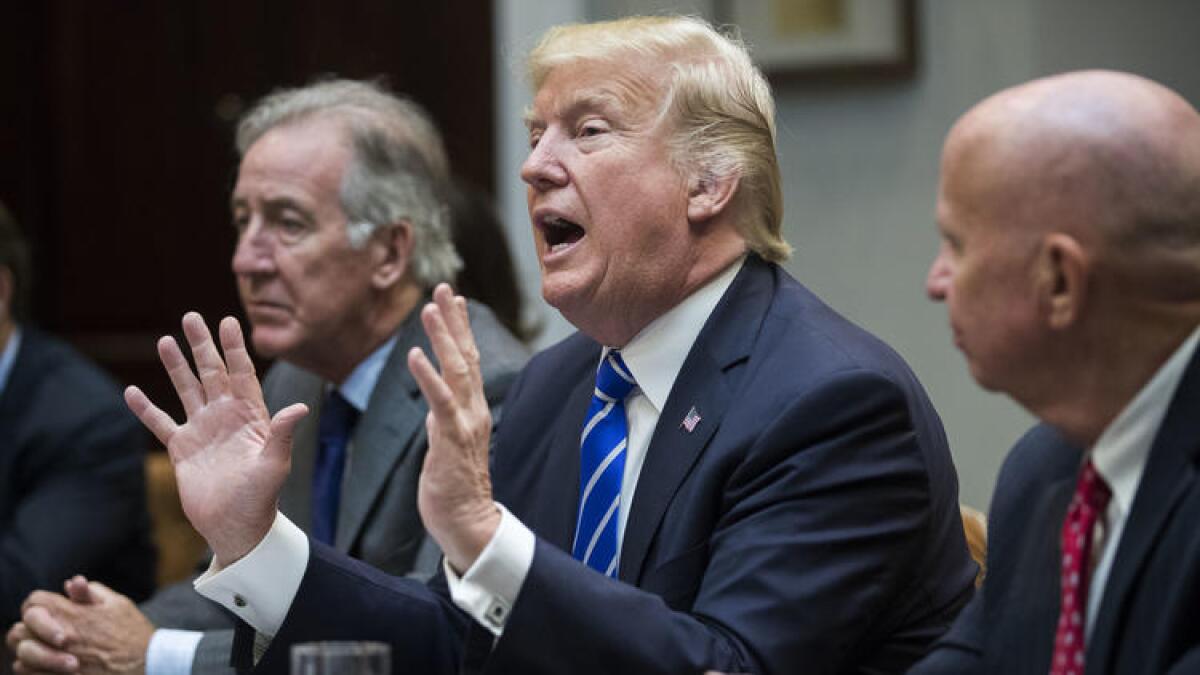
The Republican tax overhaul has a lot for businesses to like — and a lot of unanswered questions for everyone else.
According to the plan, which Republican officials outlined on Wednesday, many businesses would see a huge reduction in their tax bills and many middle-class Americans would see tax relief. The plan would reduce the number of individual tax brackets to three from seven and nearly double the standard deduction.
President Trump is scheduled to pitch the plan during a speech in Indianapolis on Wednesday. The release of the framework kicks off a scramble by lawmakers to hammer out the details, craft legislation and, if all goes according to plan, pass legislation by the end of the year.
“This framework will deliver a 21st century tax code that is built for growth, supports middle-class families, defends our workers, protects our jobs and puts America first,” said the nine-page document setting out the parameters of the tax proposal.
But most of the key details for individual taxpayers are yet to be worked out, including the income levels for the new tax brackets and whether the individual tax cuts would favor the wealthy.
There’s more certainty for businesses.
New Republican tax outline gives huge cuts to businesses, but details of individual relief are less certain
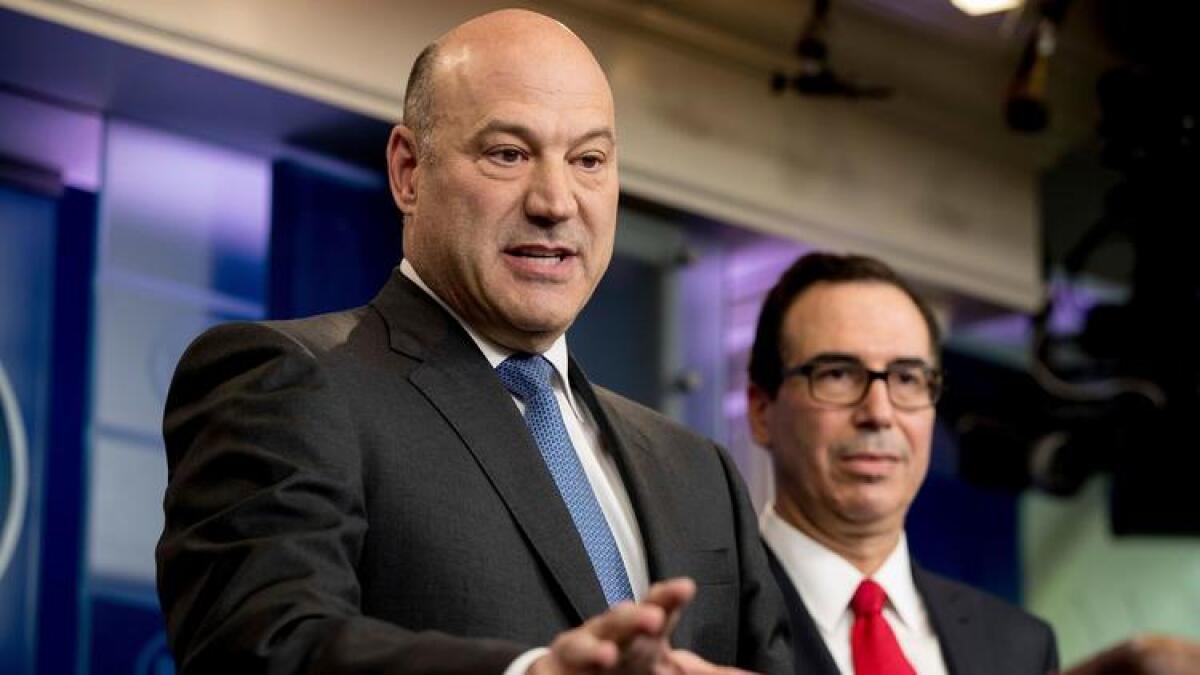
Businesses would receive huge tax cuts and many middle-class Americans would see relief under a tax overhaul outline agreed to by President Trump and top congressional Republicans, according to people familiar with the plan.
But many of the specifics, such as whether the individual tax cuts would favor the wealthy, are still to be worked out.
After months of high-level negotiations, Trump will pitch what the party is calling its “unified tax reform framework” during a speech in Indianapolis on Wednesday. Crucial details still must be worked out by lawmakers as they try to craft legislation and pass it by the end of the year.
Republican leaders have acknowledged that the plan, if enacted, initially would add to the budget deficit. They claim that stronger economic growth spurred by the tax cuts eventually would offset the deficit increase. Democrats challenge that, based on experience with past tax cuts.
According to people familiar with the plan, it calls for slashing the 35% U.S. corporate tax rate to 20%. That’s not as low as Trump wanted, but is still a gigantic reduction, to the lowest top rate since 1940. The United States no longer would tax most foreign earnings.
Businesses have been lobbying heavily for a reduction in the corporate rate. It is the highest rate among developed nations, although many companies pay a lower rate, if any tax at all, by using loopholes and deductions.
So-called pass-through businesses that pay taxes through the individual code — from mom-and-pop operations to large partnerships such as law firms, hedge funds and some of Trump’s own businesses — would see their top tax rate drop to 25% from 39.6%.
For individuals, there is much less clarity.
The current seven tax brackets would be reduced to three: 12%, 25% and 35%. But Congress still must determine what the income levels are for those brackets.
Tired of not winning? Trump deletes his tweets endorsing the losing Senate candidate in Alabama
President Trump was all-in for the man he called “Big Luther” -- Alabama’s Sen. Luther Strange, the Republican appointed to replace former Sen. Jeff Sessions when Sessions became Trump’s attorney general. Repeatedly the president endorsed Strange on his favored medium, Twitter, and campaigned with Strange on Friday at a raucous rally in Birmingham, Ala.
Strange was the underdog from the start but Trump repeatedly boasted that, thanks to his backing, “Big Luther” was “shooting up” in the polls. As many expected, however, the winner of the Republican runoff contest on Tuesday was zealously Christian conservative Roy Moore, who twice was suspended from Alabama’s Supreme Court for defying federal law in favor of what he calls “God’s law.”
By Wednesday morning, some of Trump’s tweets documenting his support for loser Strange, including the one above, were gone from his personal Twitter account. The deleted Tweets were tracked by ProPublica, including these:
Not all of the tweets about Strange disappeared. As of Wednesday morning, several remained live.
Once the election results were in, Trump tweeted to congratulate Moore -- first on Tuesday night and again on Wednesday morning. As it happens, Trump’s allegiance to Strange was in question even before voters cast ballots.
Amid his effusive pro-Strange tweets, and his boasts of boosting the incumbent’s standing, Trump had mused aloud that he might have backed the wrong horse -- even from the Birmingham stage with Strange.
Because, as Trump has often said, he likes to win. And if he doesn’t, delete the evidence.
Taliban claims attack on Kabul airport during visit by U.S. defense secretary and NATO secretary-general
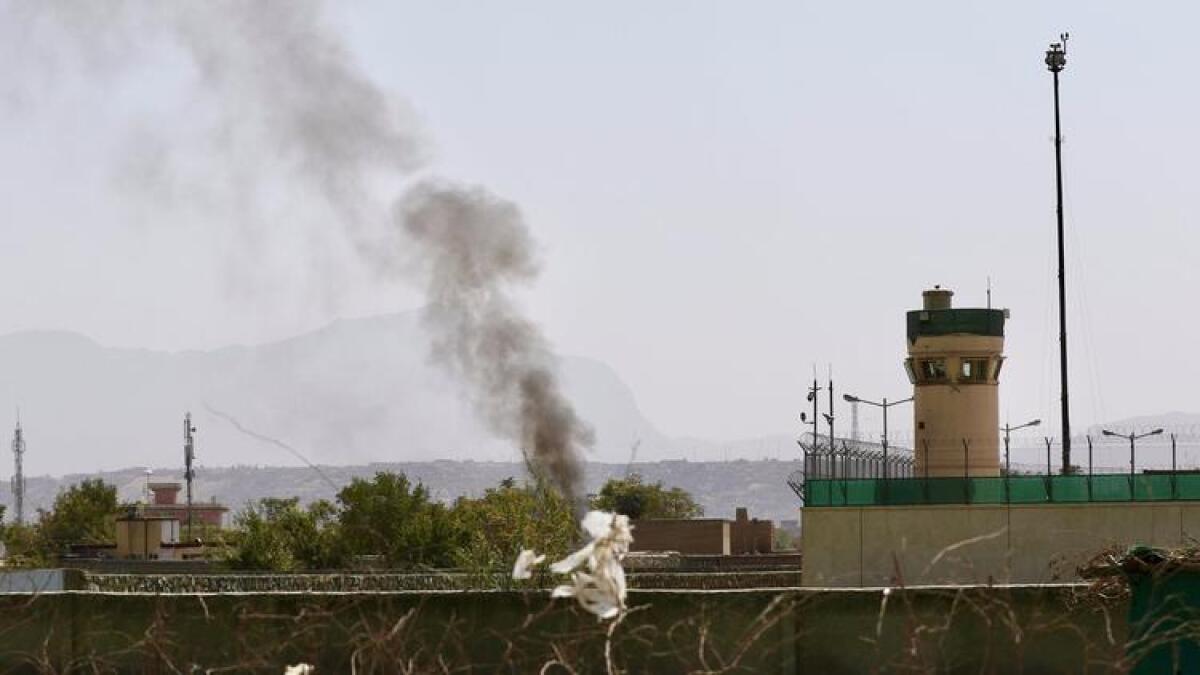
At least five civilians including a woman were wounded after several rockets were fired toward the international airport in Kabul, officials said Wednesday.
The attack came as Secretary of Defense James N. Mattis and NATO Secretary-General Jens Stoltenberg were in the Afghan capital for a visit and just hours before they held a joint news conference with Afghan President Ashraf Ghani.
Najib Danish, spokesman for the Afghan Interior Ministry, said one of the rockets stuck a home near the airport, wounding the five victims. He said one of them was a woman who was “not in a good health condition.”
Zabihullah Mujahid, a spokesman for the Taliban, claimed responsibility for the attack on his official Twitter account.
Trump leaves the Washington ‘swamp’ to dine with donors in Manhattan
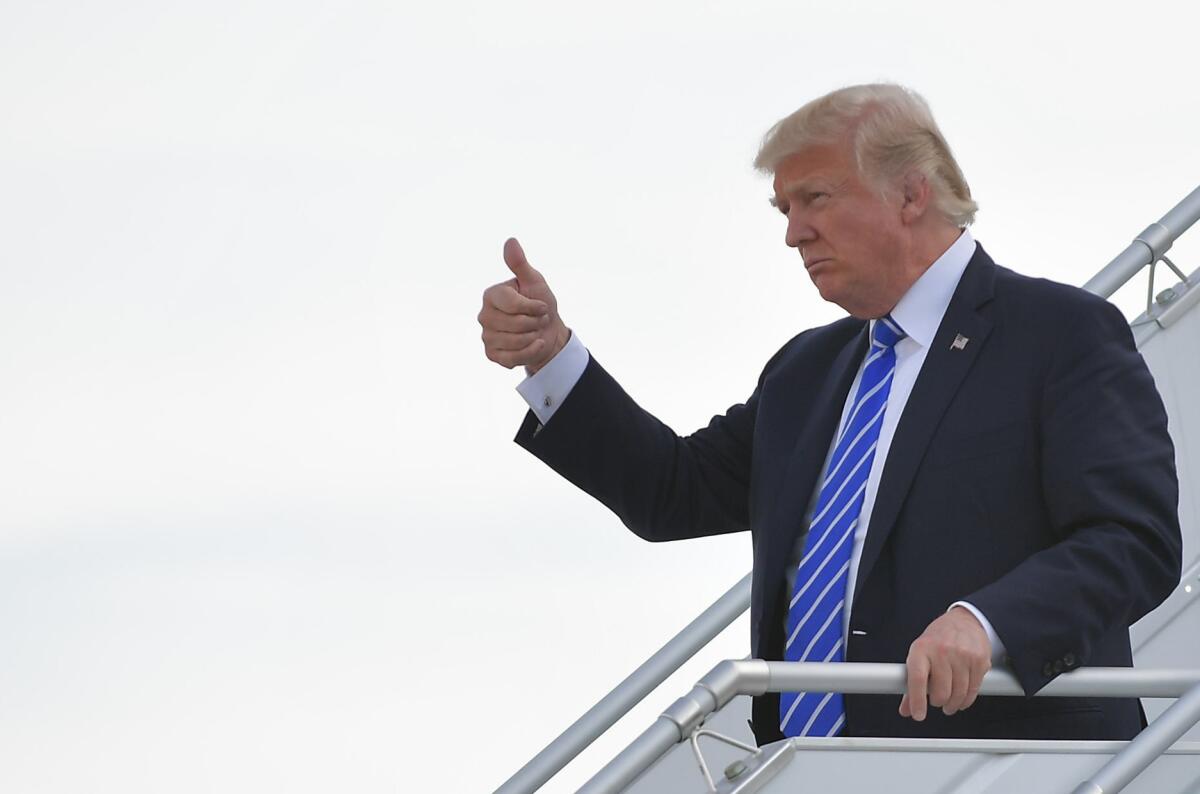
President Trump returned to one of his high-priced haunts in Manhattan to raise money for the Republican Party on Tuesday, as Republicans in Congress failed again to pass a healthcare bill and the Senate candidate that he and other party leaders favored was losing a special Alabama election.
Trump dined with about 150 donors from New York’s real estate and financial industries at the famous circus-themed Le Cirque restaurant on the Upper East Side. Some attendees paid six-figure sums for the company of a president who often decries what he calls Washington’s pay-to-play “swamp.”
The Republican National Committee and the Trump Victory Fund expected the event to raise about $5 million to help protect Republicans’ majorities in the Senate and the House in next year’s midterm election.
The White House declined to let reporters traveling with the president attend any part of the fundraising activities or hear Trump’s remarks. In years past, reporters typically have been allowed to at least attend a president’s speech at fundraisers.
Trump similarly held fundraisers at Le Cirque for his presidential campaign last year, and for decades he was a regular at the restaurant. It has fallen on hard times, however, filing for bankruptcy in March and slipping to a one-star rating from the New York Times’ restaurant critic.
Donors paid a minimum of $35,000 for two tickets to attend the event. Couples who paid $100,000 were given “VIP access” and $250,000 bought two seats to a “roundtable discussion” with the president, according to Cassie Smedile, national press secretary for the RNC.
Among the attendees was casino and hotel owner Steve Wynn. Trump also met with RNC Chairwoman Ronna Romney McDaniel, who took over the party after Reince Priebus left the RNC to be Trump’s first chief of staff in January.
Trump’s dinner came as Alabama’s Republican voters were choosing their Senate candidate in an early test of the value of Trump’s endorsement -- and the president lost.
He strongly endorsed incumbent Sen. Luther Strange, campaigning for him in the state on Friday, but Strange, who was appointed to the Senate seat when former Sen. Jeff Sessions became Trump’s attorney general, lost to conservative challenger Roy Moore. The result became clear about the time Trump was leaving New York.
This post was updated at 6:15 p.m. to reflect the result of the Alabama Republican primary for the Senate vacancy.
At Cuba’s urgent request, Tillerson meets with his counterpart over attacks at U.S. embassy in Havana
Secretary of State Rex Tillerson had a hurriedly arranged meeting on Tuesday with his Cuban counterpart as the United States considers closing its embassy in Havana after mysterious ailments afflicted 21 U.S. diplomats there.
The late-day meeting came at the request of Cuban Foreign Minister Bruno Rodriguez, U.S. officials said. He had no comment as he left the State Department.
The Cuban government has professed to be as confounded by the illnesses as Washington is; the U.S. has suspected an attack, but one of still undetermined origin.
The attacks have been described as possible sonic waves or other high-pitched sound bombardments. The victims reported loss of hearing and dizziness, and two may have suffered minor brain damage.
Speculation has centered on possible rogue elements of the Cuban military or third parties, like Russia or Iran.
The injured people were removed from Cuba. The attacks apparently started in 2016, with the most recent one in August.
Ironically, the mysterious incident occurred as relations between Havana and Washington have improved.
Tillerson said a week ago that closing the embassy was “under evaluation.” It had only been opened a year ago as the two countries normalized diplomatic ties after more than half a century.
Two Cuban diplomats were expelled from Washington in response to the illnesses. But the State Department says Havana has been cooperating with the investigation.
However, Deputy Secretary of State John Sullivan expressed more skepticism, testifying before Congress on Tuesday that Cuban authorities must have at least known what was going on, given their tight surveillance of American diplomats.
It was not clear what information Rodriguez, the Cuban foreign minister, brought to the meeting. Speaking ahead of it, State Department spokeswoman Heather Nauert said, “We’ll have plenty of questions for them.”
Later, the Cuban government put out a statement saying that Rodriguez had reassured Tillerson of the speed, seriousness and professionalism with which Havana was investigating the incidents, which it called unprecedented.
Rodriguez said no cause had yet been determined, and he asked that the two expelled Cuban diplomats be allowed to return to their functions.
He also said it would be “regrettable that a matter of this nature is politicized and that hasty decisions not supported by conclusive evidence and investigation results are taken” - an allusion to the possibility of the Americans closing their embassy.
This post was updated at 3:15 p.m. to reflect that the meeting had ended.
This post was updated at 7:15 p.m. to add Cuba’s statement.
Roger Stone denies collusion with Russia during Trump campaign
Republican political consultant Roger Stone testified Tuesday to a House committee investigating whether President Trump’s aides had improper contacts with Moscow during last year’s campaign.
Stone later denied to reporters that he had cooperated with Russian agents or operatives during the race, and said he knew of no one else who did so either.
“I am aware of no evidence whatsoever of collusion by the Russian state or anyone in the Trump campaign,” Stone said after he had appeared for nearly three hours in a closed-door session of the House Intelligence Committee.
But Rep. Adam Schiff (D-Burbank) told reporters that Stone, a combative Republican operative who began his career under President Nixon, had declined to answer some of the panel’s questions, raising the possibility that Stone might be called back under subpoena.
“We hope that he will cooperate in the future,” Schiff said. “If not it will be necessary to subpoena him to bring him back and answer those important questions.”
Schiff declined to say what questions Stone had declined to answer.
Like Trump, Stone is outspoken and given to spinning conspiracy theories. He left the Trump campaign soon after it was launched in mid-2015 but continued to maintain contact with Trump.
He landed in the Democrats’ cross-hairs partly due to his own boasts and tweets.
Congressional investigators are especially interested in learning how Stone was able to predict last summer that WikiLeaks would soon disclose digital documents related to Democrat Hillary Clinton’s campaign — a prediction that proved accurate.
WikiLeaks released thousands of private emails pilfered from computer networks used by the Democratic National Committee days later, including some that undermined Clinton’s campaign.
Stone said after his testimony Tuesday that he had refused to identify his source. He said an “opinion journalist,” who he said was in touch with fugitive WikiLeaks founder Julian Assange, had told him that the anti-secrecy website was planning to publish the stolen emails.
In another incident last summer, Stone appeared to also foreshadow the release of emails allegedly stolen by Russian hackers from the Gmail account of Clinton’s campaign chairman, John Podesta, by tweeting that “it will soon [be] Podesta’s time in the barrel.”
Podesta’s pilfered emails appeared online soon after.
Stone released a 47-page statement to the committee that accused Democrats on the panel of making “probably false statements” about links between Trump campaign aides and Russia.
Though Stone volunteered in March to appear before the panel, he called the closed-door hearing “a political proceeding” and accused the committee of cowardice for not letting him testify in public.
The panel is one of four congressional committees investigating Russian interference in the 2016 election and whether Trump aides and family members had improper contacts with Moscow.
Stone said he had not heard from special counsel Robert S. Mueller III, who is overseeing a separate criminal probe into Russian contacts with Trump’s aides and into the White House response to the scandal.
Investigators from Mueller’s office are expected to begin interviewing White House aides in coming weeks, an official familiar with the probe said.
Trump defends administration’s aid to Puerto Rico, denies he was distracted by his fight with NFL players

President Trump denied on Tuesday that his administration had been slow to respond to Puerto Rico’s hurricane devastation because he’d been distracted by his five-day feud with protesting NFL players.
At a news conference in the Rose Garden with Prime Minister Mariano Rajoy Brey of Spain, Trump repeatedly said Puerto Rican officials had praised his administration’s efforts. Those same officials have begged for more assistance to the island, which suffered grievous damage earlier this month from Hurricane Maria, after a near-hit from Hurricane Irma.
On his favorite communications platform, Twitter, Trump had not mentioned Puerto Rico from Sept. 20 until Monday night. In the interim, he had written dozens of tweets, many on his criticisms of NFL players who kneel during the pre-game rendition of the national anthem to protest police brutality toward African Americans.
“I wasn’t preoccupied with the NFL. I was ashamed of what was taking place,” Trump said in reply to a question.
He pressed what has been his argument in recent days: that the protesters were taking a stand against patriotism and military service members. “I don’t think you can disrespect our country, our flag, our national anthem,” he said.
“I’ve heard that before, about, ‘Was I preoccupied?’ ” Trump added. “Not at all, not at all. I have plenty of time on my hands. All I do is work. And to be honest with you, that’s an important function of working — is called respect for our country.”
A Department of Defense assessment concluded that Puerto Rico’s entire electrical system is damaged and almost half of the population lacks drinking water. One of every 7 hospitals is without fuel or power needed for machines assisting patients.
Trump said part of the difficulty in getting adequate supplies to Puerto Rico is its location.
“It’s the most difficult job because it’s on the island — it’s on an island in the middle of the ocean. It’s out in the ocean,” he said. “You can’t just drive your trucks there from other states.”
Returning to the subject later, the president said, “This isn’t like Florida, where we can go right up the spine, or like Texas, where we go right down the middle and we distribute. This is, you know, a thing called the Atlantic Ocean. This is tough stuff.”
Trump said that as he spoke, U.S. officials were unloading “massive” amounts of food, water and supplies for Puerto Rico, whose 3.5 million residents are American citizens.
The president announced earlier that he would visit Puerto Rico next week on Tuesday.
“The governor has been so incredible in his — in his statements about the job we’re doing,” Trump said. “We’re doing a great job.”
Trump also used the news conference to reiterate a threat to North Korea. Its foreign minister said that Trump’s previous statements constituted a declaration of war, and that Pyongyang may take aim at U.S. military planes flying nearby.
Trump has repeatedly dismissed North Korean leader Kim Jong Un as “Rocket Man,” or “Little Rocket Man,” a reference to the nation’s development of nuclear weapons and its frequent missile test launches.
Asked for his reaction to the threats from North Korea, Trump said that the U.S. was “totally prepared for the second option” — a military option.
“Not a preferred option, but if we take that option, it will be devastating — I can tell you that — devastating for North Korea,” he said. “That’s called the military option. If we have to take it, we will.”
As he has previously, Trump blamed past presidents for failing to curb North Korea’s nuclear advances.
“It could have been handled much more easily. Yet various administrations, many — which left me a mess,” he said. “But I’ll fix the mess.”
Sen. Bob Corker says he will not seek reelection next year
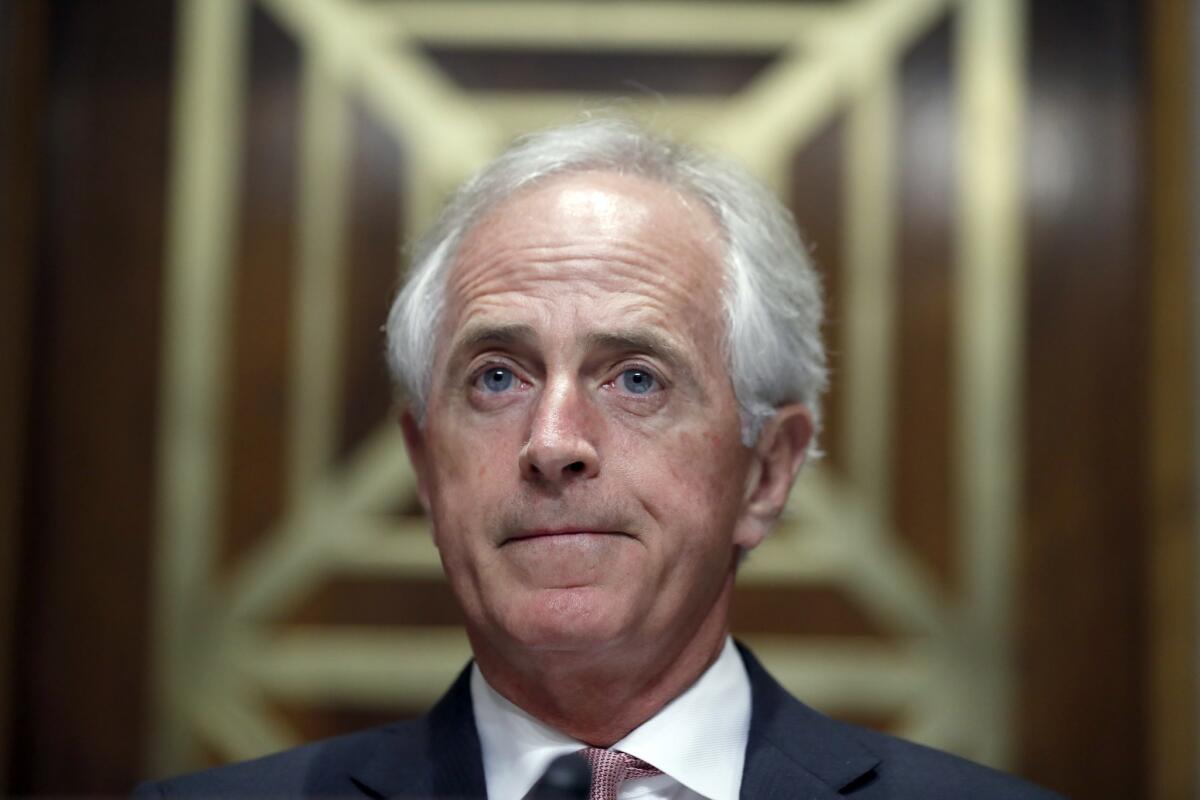
Republican Sen. Bob Corker of Tennessee said Tuesday he will not seek reelection.
In a surprise announcement, the two-term lawmaker said that after discussions with his family, “I have decided that I will leave the United States Senate when my term expires at the end of 2018.”
Corker is chairman of the Senate Foreign Relations Committee. He has tangled with President Trump, both publicly and via Twitter. But Trump recently encouraged the senator to seek another term.
Corker criticized the president after he blamed both white nationalists and anti-racist protesters for the violence at an August rally in Charlottesville, Va. Corker questioned whether Trump had shown the “stability” and “competence” to succeed in office. Trump responded by assailing the senator via Twitter.
Pentagon’s top military officer says he advised President Trump not to ban transgender troops
The Pentagon’s top uniformed officer said Tuesday that he believes gender identity is not a credible reason to discharge transgender service members from the military, an opinion that puts him odds with President Trump.
Gen. Joseph F. Dunford Jr., the chairman of the Joint Chiefs of Staff, told the Senate Armed Services Committee that he has advised the White House to keep any troops who have served “with honor and value” and will continue to provide that advice.
“I would say that I believe any individual who meets the physical and mental standards and is worldwide deployable and is currently serving should be afforded the opportunity to continue to serve,” he said.
It was the latest example that the Pentagon was not onboard when the president took to Twitter on July 26 to declare a ban on transgender troops in uniform.
Trump said then that he made his decision “in consultation with my Generals,” but it is not clear who gave him that advice.
The White House issued formal guidance to the Pentagon last month that followed up on Trump’s tweets, and said the Pentagon should submit final plans to the White House on implementation of the transgender ban by Feb. 21.
Trump is seeking to reverse a year-old Obama administration policy that ended a longtime prohibition on transgender people serving in the armed services and the Coast Guard.
Despite Trump’s moves, several military leaders have publicly sought to reassure transgender service members that the Pentagon would not reimpose a ban until a panel of experts had studied the matter.
Defense Secretary James N. Mattis said that until the studies are complete no one now serving would be kicked out based on gender identity. Navy Secretary Richard V. Spencer said anyone able to serve in the military should be allowed to do so.
Several powerful Republican lawmakers — including Sens. John McCain of Arizona, Richard C. Shelby of Alabama and Orrin G. Hatch of Utah — also expressed opposition to the president’s decision.
McCain, chairman of the Senate Armed Services Committee, has co-sponsored a bipartisan bill to stop the proposed ban.
The Pentagon was blindsided when Trump first wrote in July that the U.S. military would not “accept or allow” transgender troops to serve “in any capacity.”
Several thousand self-declared transgender service members are estimated to be in uniform, including some deployed overseas, and the president’s declaration raised qustions about whether they will be kicked out of the military or allowed to continue to serve.
In his tweets, Trump said he had decided to bar transgender troops because the military “cannot be burdened with the tremendous medical costs and disruption that transgender in the military would entail.”
Experts said neither justification was accurate or fair since the expected medical costs were negligible and transgender troops have been openly serving for the past year without disruption.
Trump’s ban drew rebuke from war veterans and lesbian, gay, bisexual and transgender advocacy groups.
A federal lawsuit was filed on Aug. 9 on behalf of five transgender service members who seek to block implementation of the ban while the suit proceeds.
Hillary Clinton pushes National Voter Registration Day
Rep. Sheila Jackson-Lee kneels on House floor in solidarity with NFL protests
Rep. Sheila Jackson-Lee (D-Texas) on Tuesday knelt on the House floor in solidarity with protests by NFL players against police brutality.
“There is no basis in the 1st Amendment that says that you cannot kneel for the national anthem or in front of the flag,” Jackson said, citing the text of the amendment.
“I kneel in honor of the 1st Amendment. I kneel because the flag is a symbol for freedom. I kneel because I’m going to stand against racism. I kneel because I will stand with those young men, and I’ll stand with our soldiers, and I’ll stand with America, because I kneel.”
U.S. imposes more sanctions on North Korea
Tightening pressure on nuclear-armed North Korea and its allies, the Trump administration on Tuesday announced another round of economic sanctions against Pyongyang, blacklisting banks and individuals in several countries.
Even as the administration stepped up the economic pressure, President Trump repeated his warnings of possible military action.
“Not a preferred option,” he told reporters. “But if we take that option, it will be devastating, I can tell you that, devastating for North Korea.”
Trump spoke at a brief White House news conference with visiting Spanish Prime Minister Mariano Rajoy, who agreed that North Korea posed an urgent danger and said he supported the U.S. sanctions.
Trump praised Rajoy for expelling North Korea’s ambassador. Several countries have forced North Korean envoys to leave in recent weeks to show displeasure as Kim Jong Un’s government has tested long-range ballistic missiles and a hydrogen bomb in defiance of U.N. resolutions.
In the latest U.S. sanctions, the Treasury Department blacklisted eight North Korean banks and 26 individuals who the department said were operating in China, Russia, Libya and the United Arab Emirates.
The administration said the North Korean banks are used to help finance development of weapons of mass destruction, including nuclear bombs, and the individuals were working with the North Korean financial system.
The sanctions complement two other packages of penalties approved unanimously by the 15-member United Nations Security Council this summer, as well as earlier U.S. sanctions, according to U.S. officials.
The U.N. sanctions target North Korean exports of seafood, textiles and coal, and limit its imports of oil.
China, Pyongyang’s main ally, is reluctant to cut too deeply into the impoverished country’s oil supplies for fear of toppling the government and triggering a refugee crisis that could spill across its borders.
The United States believes tightening the economic screws is key to forcing Kim’s government to the negotiating table, much as international sanctions helped bring Iran to talks that produced a nuclear disarmament accord in 2015
“We are targeting North Korean banks and financial facilitators acting as representatives for North Korean banks across the globe,” said Treasury Secretary Steven T. Mnuchin.
“This further advances our strategy to fully isolate North Korea in order to achieve our broader objectives of a peaceful and denuclearized Korean peninsula,” he added.
The sanctions come amid an escalating war of personal insults between Kim and Trump.
After Trump used his speech last week to the U.N. General Assembly to mock Kim as “Rocket Man,” the North Korean leader made a rare televised speech in which he called Trump “deranged.
Trump said Tuesday that Kim was “acting very badly.” But he didn’t repeat the insult.
Interior Secretary Ryan Zinke calls his staff disloyal in speech to oil industry
Interior Secretary Ryan Zinke walked into a big gathering of the National Petroleum Council on Monday already facing at least two government probes for his management of the department’s workforce of 70,000 — but that didn’t stop him from bashing his employees.
Zinke told the gathering that he figured upon taking his post that nearly a third of the people at the department were disloyal. The comment may have shed light on the secretary’s reasons for directing department officials to reassign approximately 50 top managers in June, as soon as the move may have been legally permissible.
Several of the managers interviewed by The Times said they were puzzled by the directives, which sent them to corners of the agency where they had no expertise. At least one has filed a whistle-blower lawsuit.
The department is declining to comment on the specific charges leveled against Zinke. But the secretary had plenty to say about what he thinks of the workforce during his talk before the oil trade group in Washington.
He said he knew when he took over the department in March that “I got 30% of the crew that’s not loyal to the flag,” according to a report by the Associated Press. He compared the department to a pirate ship that captures “a prized ship at sea, and only the captain and the first mate row over” to finish the mission.
Walter Shaub, who in July resigned his post running the federal Office of Government Ethics following repeated clashes with the Trump administration, tweeted that Zinke is misguided about what loyalty means.
“Feds are loyal to America, not junior cabinet secretaries and politicians,” he wrote.
Some senior civil servants have charged that Zinke’s moves were intended to drive experienced managers from federal employment. If that was the motive, Zinke succeeded in some cases.
But the reassignments also landed the department in a high-profile whistle-blower lawsuit, filed by Joel Clement, the department’s director of policy analysis who had been leading some its highest-profile climate change work. Clement was plucked from his work helping Alaskan villages imperiled by rising seas and placed in a post overseeing the auditing of oil and gas leases.
Trump calls for NFL rule to make players stand during the national anthem
President Trump took to Twitter on Tuesday morning to call for an NFL rule to stop players from kneeling during the national anthem.
There is a meme going around that gives the impression that the NFL already has such a rule in place.
But, according to some excellent research and reporting by the Indiana Star, that quote is not actually from the 2017 Official Playing Rules of the National Football League.
Instead, it’s a part of the league’s game operations manual, which is distributed to every NFL team. So, technically, “it’s policy, it’s not a rule,” NFL spokesman Brian McCarthy told the Indiana Star.
“I think where people are getting confused is, rules, that’s like holding or defensive pass interference, that’s a rule. This is policy.”
McCarthy told the Indiana Star that players who didn’t take the field or protested during the anthem would not be penalized.
NFL spokesman Joe Lockhart declined to comment on Trump’s tweet during a conference call with reporters Tuesday morning.
In addition to calling for an NFL rule requiring players to stand for the national anthem, President Trump also tweeted on Tuesday morning about football ratings and on the Dallas Cowboys’ demonstration on “Monday Night Football.”
Trump says he’ll visit Puerto Rico next Tuesday
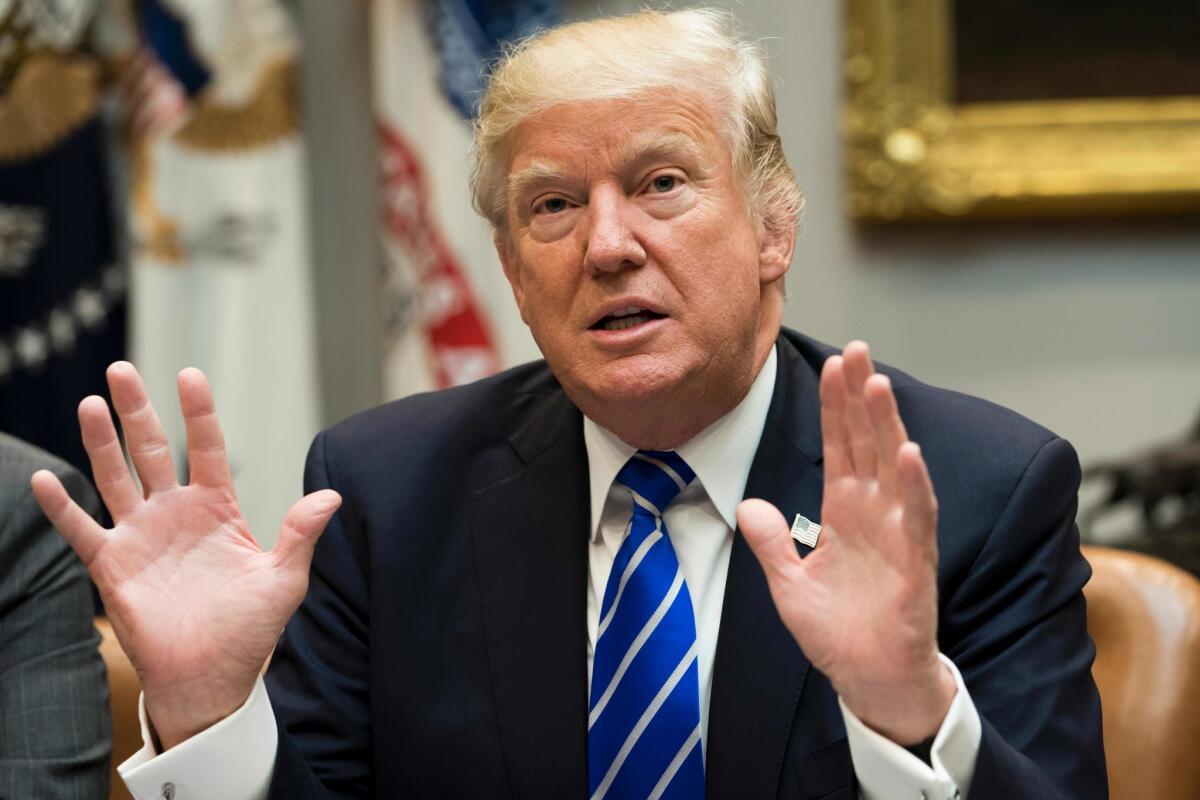
President Donald Trump says he’ll visit hurricane-ravaged Puerto Rico next Tuesday.
Trump announced the visit after the administration came under criticism for its response to the damage on the island that is home to more than 3 million U.S. citizens. The island has been coping with shortages of food, drinking water, electricity and various forms of communication after Hurricane Maria struck earlier this month.
Trump said Tuesday is the earliest he can visit without disrupting recovery operations.
He said he may also visit the U.S. Virgin Islands.
Trump says Puerto Rico is important to him. He says Puerto Ricans are “great people and we need to help them.”
Ivanka Trump’s business ties shrouded in secrecy in China
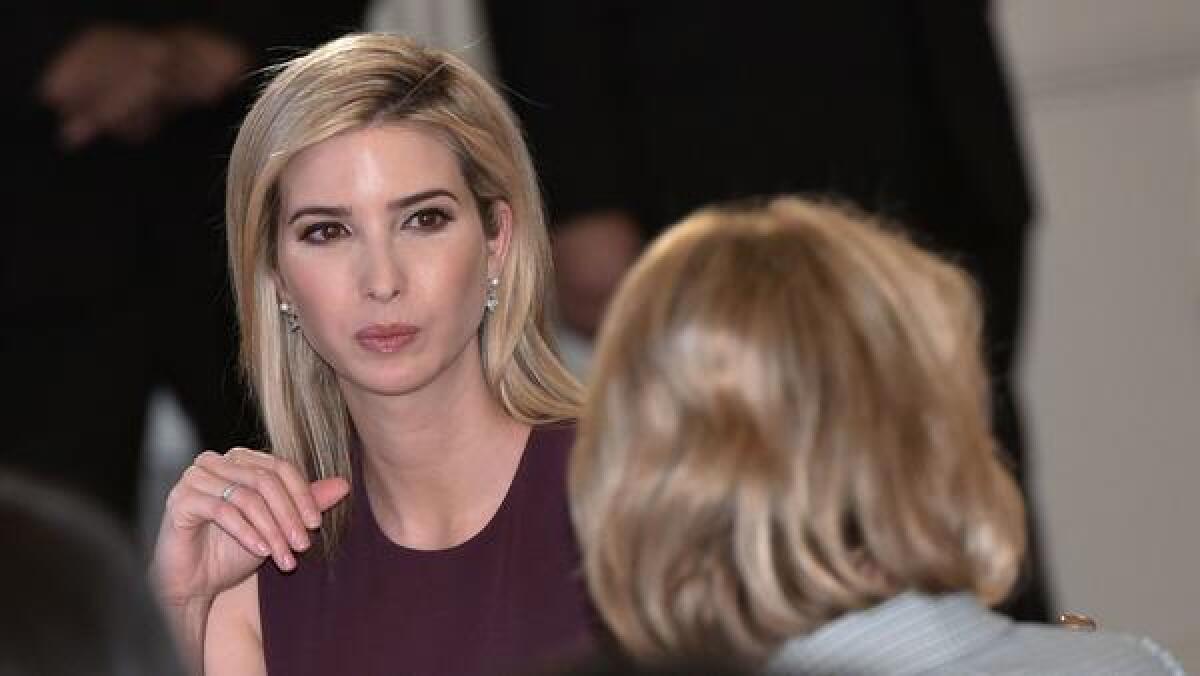
It is no secret that the bulk of Ivanka Trump’s merchandise comes from China. But just which Chinese companies manufacture and export her handbags, shoes and clothes is more secret than ever, according to an Associated Press investigation.
In the months since she took her White House role, public information about the companies importing Ivanka Trump goods to the U.S. has become harder to find. Information that once routinely appeared in private trade tracking data has vanished, leaving the identities of companies involved in 90% of shipments unknown. Even less is known about her manufacturers. Trump’s brand, which is still owned by the first daughter and presidential advisor, declined to disclose the information.
The deepening secrecy means it’s unclear who Trump’s company is doing business with in China, even as she and her husband, Jared Kushner, have emerged as important conduits for top Chinese officials in Washington. The lack of disclosure makes it difficult to understand whether foreign governments could use business ties with her brand to try to influence the White House — and whether her company stands to profit from foreign government subsidies that can destroy American jobs. Such questions are especially pronounced in China, where state-owned and state-subsidized companies dominate large swaths of commercial activity.
“There should be more transparency, but right now, we do not have the legal mechanism to enforce transparency unless Congress requests information through a subpoena,” said Richard Painter, who served as chief White House ethics lawyer for George W. Bush and is part of a lawsuit against President Donald Trump accusing him of constitutional violations. “I don’t know how much money she’s making on this and why it’s worth it. I think it’s putting our trade policy in a very awkward situation.”
Trump associate Roger Stone, ahead of House panel appearance, denies colluding with Russia
Longtime Donald Trump associate Roger Stone says there is “not one shred of evidence” that he was involved with Russian interference in the 2016 election.
Stone is defending himself in a lengthy statement released ahead of a closed-door appearance before the House intelligence committee Tuesday. He has also released a series of supporting documents, including direct messages he exchanged with Guccifer 2.0, the unnamed hacker who has taken credit for breaking into Democratic National Committee email servers.
“While some may label me a dirty trickster, the members of this committee could not point to any tactic that is outside the accepted norms of what political strategists and consultants do today. I do not engage in any illegal activities on behalf of my clients or the causes in which I support,” Stone said in the prepared statement. “There is one ‘trick’ that is not in my bag and that is treason.”
Stone, a Republican strategist who has known Trump for many years and informally advised him during the 2016 campaign, also denies he had advance knowledge of the leak of former Clinton campaign chairman John Podesta’s emails and says he never colluded with WikiLeaks founder Julian Assange. He has long denied that he worked with Russian officials to influence the presidential election.
“I recognize that those who believe that there was collusion between the Trump camp and the Russian state, now say Stone, ‘MUST HAVE’ been involved, but that is not based on one shred of evidence,” Stone writes. “This is nothing more than conjecture, supposition, projection, allegation, and coincidence, none of it proven by evidence or fact.”
Stone’s interview comes as the House and Senate intelligence panels are looking into the Russian meddling and possible links to Trump’s campaign. Stone has been part of the investigation partly because he has said he communicated during the presidential campaign with Guccifer 2.0.
Stone is, for the first time, releasing those communications, which he says are “innocuous.” The direct messages on Twitter, exchanged over a monthlong period, show Stone first congratulating Guccifer for being reinstated on Twitter after he was kicked off, and asking that the account retweet a tweet about how the election could be rigged against Trump. Guccifer writes, “I’m pleased to say that u r great man .... please tell me if I can help u anyhow.”
Stone doesn’t respond again until several weeks later, when Guccifer asks him about an article on a Democratic turnout model. Stone replies “pretty standard.”
On WikiLeaks, Stone said he was kept apprised of Assange’s plans to release the Podesta emails by a journalist he said served as an “intermediary.” He did not name the journalist.
Stone has been outspoken in his own defense and asked for his House appearance to be public. But he said the House panel insisted on holding the session behind closed doors.
His statement is heavy with criticism for Rep. Adam Schiff of Burbank, the top Democrat on the House intelligence panel, who suggested in March that Stone had a direct line to Russian hackers based on his comments predicting the release of former Clinton campaign chairman John Podesta’s emails. “Shame on you, Mr. Schiff,” he writes.
As his statement was released, Stone held court with about five dozen supporters at the Trump Hotel on Monday night, taking photos with the group and offering the “V’’ for victory sign at one point.
The House panel will also interview former Trump staffer Boris Epshteyn this week, according to a source familiar with the interview. The person declined to be named because the panel’s meetings are private.
Epshteyn, who grew up in Moscow, worked a short time in the White House press office. He left in March and now works as a political analyst for right-leaning Sinclair Broadcasting.
The interviews come as the House and Senate intelligence panels are looking into Russian meddling and scrutinizing the spread of false news stories and propaganda on social media. The Senate intelligence committee will speak to officials from Twitter on Thursday, also behind closed doors.
Analysis: Back into the Trump vortex America goes, where the president fuels a divisive debate
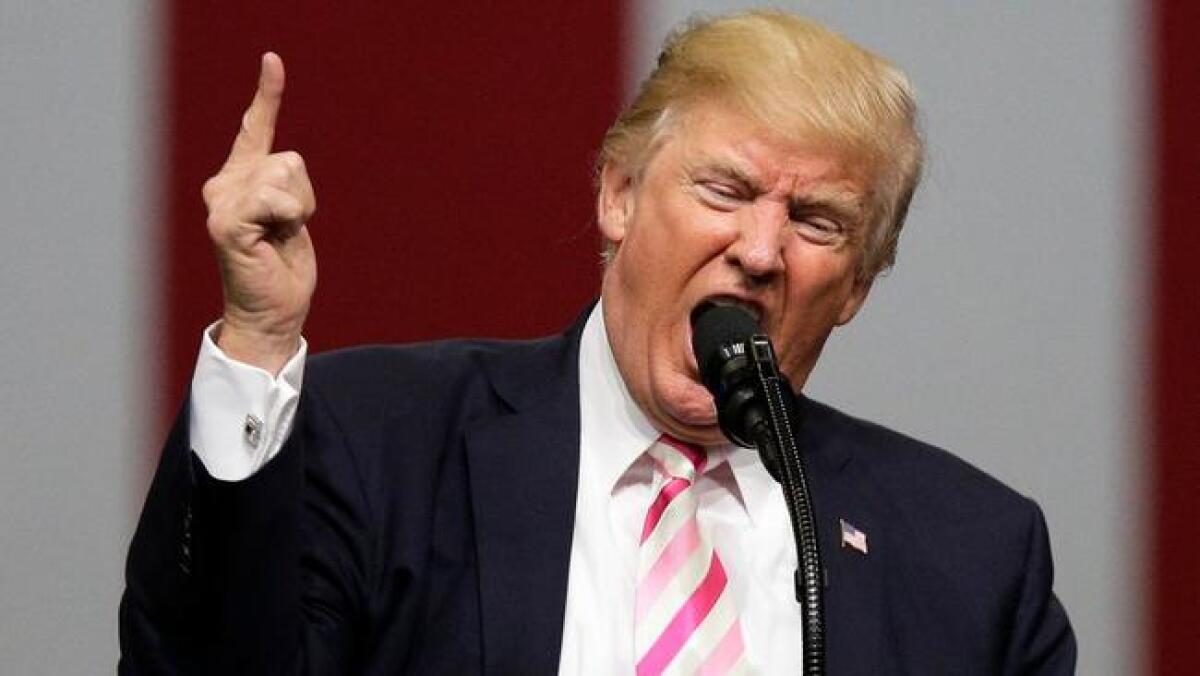
America once again finds itself where it has been so often since the day Donald Trump descended an escalator to a podium at the tower named for him to announce his presidential candidacy: pulled into the vortex of partisanship as a master publicist plays notes of division and dispute.
President Trump’s continued stoking of debate over football players kneeling during the national anthem — and the way the subject has dominated public discussion — raised anew the question that surrounds many Trump controversies: Is this part of a plan? Does he believe he gains political advantage from playing off national divisions on topics as fraught as race relations and patriotism? Or does the resulting chaos deliver personal satisfaction to a president who often appears bored with the more humdrum aspects of his post?
Eight months into Trump’s presidency, there’s no answer. But regardless of his motivation, Trump’s impact on the national psyche has been profound.
It is hard to remember a time when everything wasn’t polarized, but it was not that long ago. There were, to be sure, differences of opinion, sometimes on topics as serious as war and sometimes fiercely fought. But never has partisanship spread so widely across the nation’s mass culture.
Trump team’s travel perks are costing taxpayers mightily. Here’s why there’s little outrage
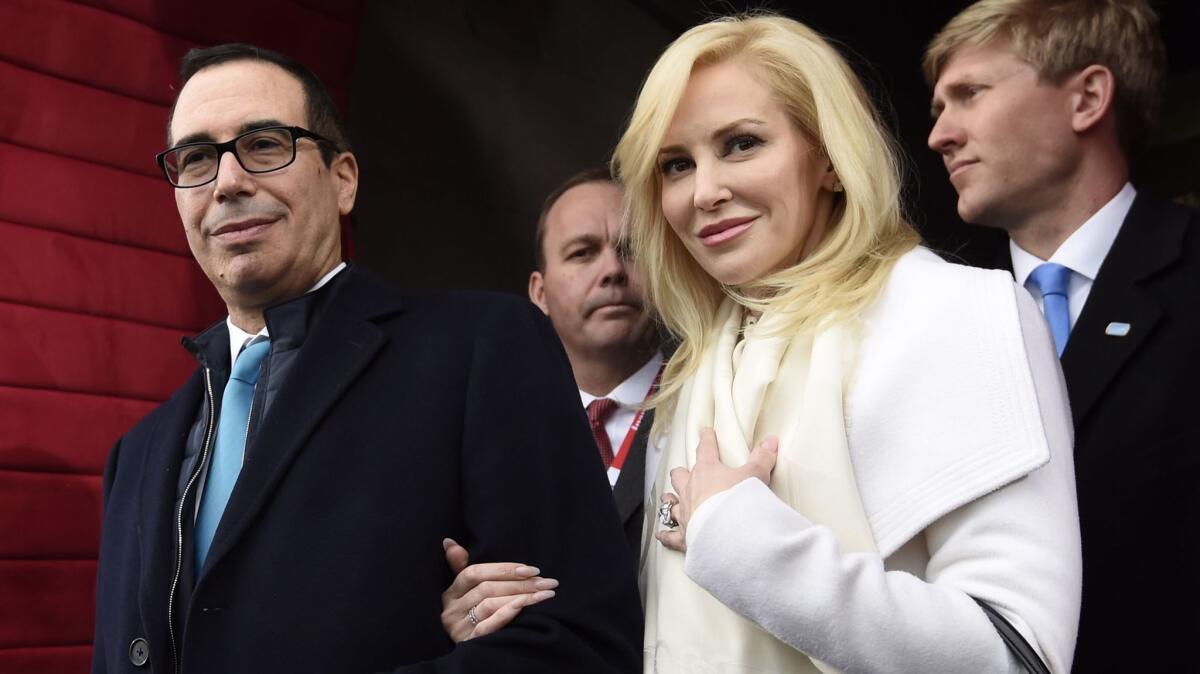
The Treasury secretary requested a military plane for his European honeymoon. The head of Health and Human Services ran up a six-figure tab flying around the country on private jets. The chief of the Environmental Protection Agency dinged taxpayers for repeated excursions back home to Oklahoma.
In normal times, Washington’s scandal machinery would be kicking into high gear. Mounting outrage — some real, some calculated — would lead to months of hearings and calls for criminal investigations.
The abundant wealth of two of the fancy fliers, Treasury Secretary Steven T. Mnuchin and Health Secretary Tom Price, would only amplify the criticism.
But the unceasing turmoil of Donald Trump’s presidency has muted the outcry.
It’s hard for the champagne tastes of a Cabinet secretary to garner much attention when the president is picking a racially tinged fight with pro athletes, drawing plaudits from white supremacists, battling a special prosecutor probing Russia’s role in his election and warning that he might nuke North Korea.
White House pushes back on report that aides warned Trump not to insult North Korea’s leader
A recent report by the Los Angeles Times that aides had warned President Trump not to personally attack North Korea’s leader, Kim Jong Un, was a “false narrative,” the president’s spokeswoman said on Monday.
But Sarah Huckabee Sanders, the White House press secretary, did not deny the facts of the story. The Times reported on Friday that some top aides, including national security advisor H.R. McMaster, told Trump before his debut speech at the United Nations General Assembly Sept. 19 that attacking Kim Jong Un personally could escalate tensions and shut off any chance for negotiations over North Korea’s nuclear missile program.
Trump ignored them. Some of the most incendiary lines from his speech -- including calling Kim “Rocket Man” on “a suicide mission” and threatening to “totally destroy” North Korea -- were not in a speech draft that several senior officials reviewed and vetted the day before the president spoke.
“The national security team was involved and engaged throughout the speech-writing process, and was very happy with the president’s speech at the U.N.,” Sanders told White House reporters when asked about The Times story.
Some of Trump’s national security advisors believe Trump’s personal jabs at the unpredictable and ruthless Kim has propelled the crisis to a new stage.
Last last week, Kim verbally retaliated, calling Trump “a mentally deranged U.S. dotard” and a “gangster.”
The escalation of insults threatens to scuttle a months-long international effort to squeeze Pyongyang’s economy through sanctions designed to force Kim to the negotiating table.
Trump continued to dress down Kim over the weekend, calling the young despot “Little Rocket Man” Friday night at a campaign rally for Republican Sen. Luther Strange in Huntsville, Ala., and again on Twitter on Saturday.
Press Secretary Sarah Huckabee Sanders: U.S. has ‘not declared war’ on North Korea
It’s never appropriate for a country to shoot down another country’s aircraft when it’s over international waters. Our goal is still the same. We continue to seek the peaceful denuclearization of the Korean peninsula.
— Press Secretary Sarah Sanders
In an Alabama radio interview, Trump lets loose on Republicans as he tries to exert influence in Senate race
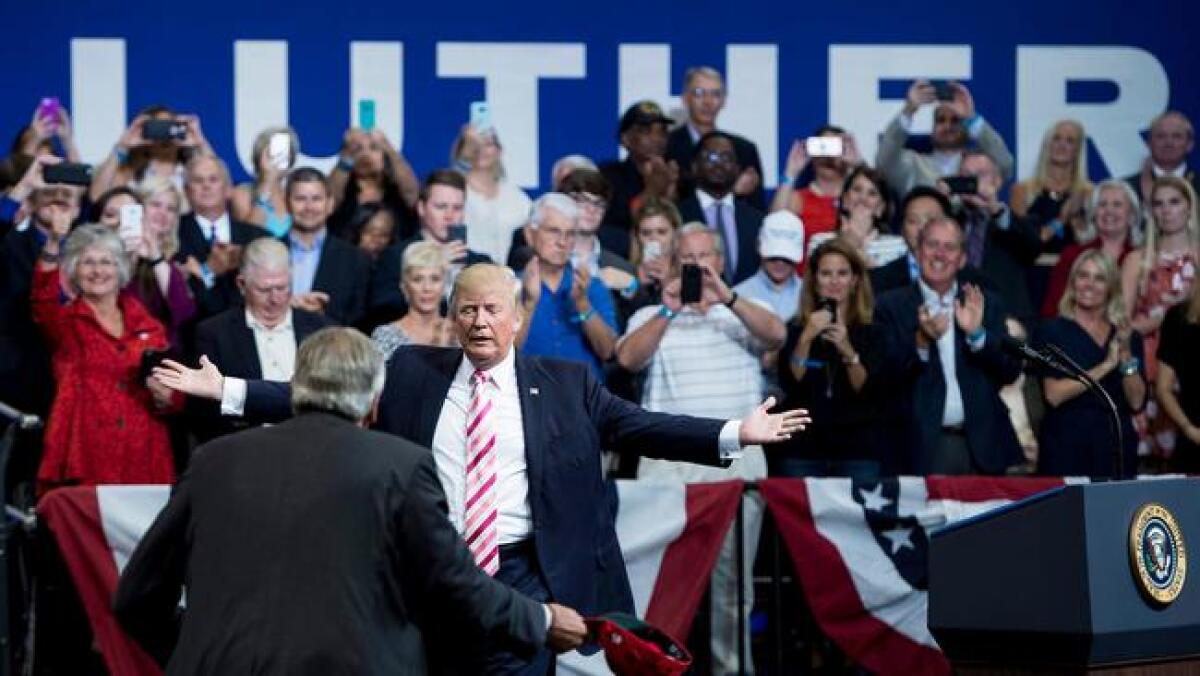
In an effort to boost his favored candidate in Tuesday’s special U.S. Senate election in Alabama, President Trump on Monday criticized Senate Majority Leader Mitch McConnell, Sen. John McCain and other Republicans for failing to pass healthcare legislation.
Trump told radio listeners of Alabama’s “Rick and Bubba Show” that Republicans had passed scores of bills to repeal the Affordable Care Act when they were doomed by President Obama’s veto.
But Senate Republicans had stumbled now that Trump was prepared to sign a bill to replace Obamacare.
“Now, when it matters, because you have a president who’s actually going to sign it, they don’t do it and they pander and they grandstand,” he said.
He repeatedly targeted McCain, who voted against the last Republican healthcare proposal and has said he will vote against the Graham-Cassidy repeal measure this week.
“What McCain has done is an extreme slap in the face of the Republican Party,” Trump said. “Extreme.”
He praised the current proposal - which was partly rewritten early Monday before its only Senate hearing - as “a great bill” that he suggested was doomed.
“So we’re going to lose two-three votes and that’s the end of that,” Trump said after reminding the audience that Republicans, holding 52 seats, had only a narrow margin for passage.
Trump called into the show, which he touted as “the biggest show in Alabama,” to bolster Luther Strange’s flagging campaign. Vice President Mike Pence separately campaigned for Strange in the state.
Strange is running to win outright the seat to which he was appointed earlier this year when Jeff Sessions left the Senate to become U.S. attorney general.
Trump gave a fiery speech at a Friday night rally in Huntsville on behalf of Strange, who is trailing former state chief justice Roy Moore in almost all pre-election polls.
In his speech, Trump said Strange was better positioned to defeat a Democratic candidate in a runoff, an argument he reiterated Monday.
Trump told his Huntsville audience that Strange and Moore were “both good men” and that if Moore won the nomination, “I’m going to be campaigning like hell for him.”
On Monday, Trump called Moore “Ray” twice before he was corrected by the radio show host, and contended he knew little about him.
“I don’t know Roy Moore at all and I think it’s perhaps indicative when somebody doesn’t even know his name—that’s not a good sign for him,” Trump said. “I know there’s great controversy and a lot of angst but I don’t really know that much about Roy Moore.”
The Alabama campaign has put Trump in the difficult position of siding with the Republican establishment he usually chafes against. He has repeatedly praised Strange’s loyalty to him and his agenda, but as a sitting senator Strange is backed by McConnell and other Republican leaders with whom Trump has rocky relations.
It is Moore who more closely resembles Trump stylistically and in his penchant for embroiling himself in controversy.
Twice Moore lost his office for flaunting court decisions, one on his erection of a Ten Commandments monument on courthouse grounds and a second time for blocking gay marriage.
Several prominent Trump backers, including former White House strategist Steve Bannon, former Alaska Gov. Sarah Palin, and Housing and Urban Development Secretary Ben Carson, are backing Moore.
Trump’s main effort before Tuesday’s vote has been to establish Strange’s independence from McConnell, whose allies have dumped millions of dollars into the race for advertising and other efforts on Strange’s behalf.
“As you know Mitch is not, polling-wise, the most popular guy in the country,” Trump said. He added of Strange: “They like to label him Mitch’s best friend in the Senate and he hardly even knows him. He’ll be fighting Mitch—I know he’s going to fight him on that ridiculous filibuster rule.”
McConnell has stuck to Senate tradition requiring 60 votes for most actions, a posture that Trump has angrily denounced.
During his 15-minute conversation with the radio hosts, Trump touted a tax plan he said would be released Wednesday as “the largest tax cuts in the history of our country” and said that his administration was “doing great.”
“I don’t think any president’s accomplished what we’ve accomplished,” he said. “And yet I’m always bucking the system. I’m fighting the system. I’m fighting Republicans as much as Democrats.”
As the interview came to an end, host Rick Burgess asked Trump if he would offer an endorsement of the show, although Burgess noted it might not be appropriate for a president to do so.
Trump was game.
“This is Donald Trump, president of the United States,” he said. “I love the state of Alabama and you’re listening to the Rick and Bubba show. And enjoy it and if they ever switch allegiance please do not run this whatever-it-is.”
And, he added, “Good luck to Luther.”
North Korea’s top diplomat says Trump has ‘declared war’ on his country
North Korea’s top diplomat said Monday that President Trump’s tweet that leader Kim Jong Un “won’t be around much longer” was a declaration of war against his country by the United States.
Foreign Minister Ri Yong Ho told reporters that what he called Trump’s “declaration of war” gives North Korea “every right” under the U.N. Charter to take countermeasures, “including the right to shoot down the United States strategic bombers even they’re not yet inside the airspace border of our country.”
Ri referred to Trump’s tweet Saturday that said: “Just heard Foreign Minister of North Korea speak at U.N. If he echoes thoughts of Little Rocket Man, they won’t be around much longer!”
Ri said: “The question of who won’t be around much longer will be answered then.”
McCain says his brain cancer prognosis is ‘very poor’
Sen. John McCain says doctors have given him a “very poor prognosis” as he battles brain cancer.
McCain underwent surgery in July for a brain tumor that was later found to be a form of glioblastoma, the same type of cancer that took the life of his former Senate colleague Edward M. Kennedy in 2009.
McCain toldss CBS’ “60 Minutes” in an interview that aired Sunday night that he thinks about Kennedy a lot. He said Kennedy continued to work despite the diagnosis and “never gave up because he loved the engagement.”
McCain said he has “feelings sometimes of fear of what happens,” but counters that with gratitude for having “had a great life.”
He added: “It’s not that you’re leaving, it’s that you — that you stayed.”
Revised health care bill would send more money to states with holdout senators
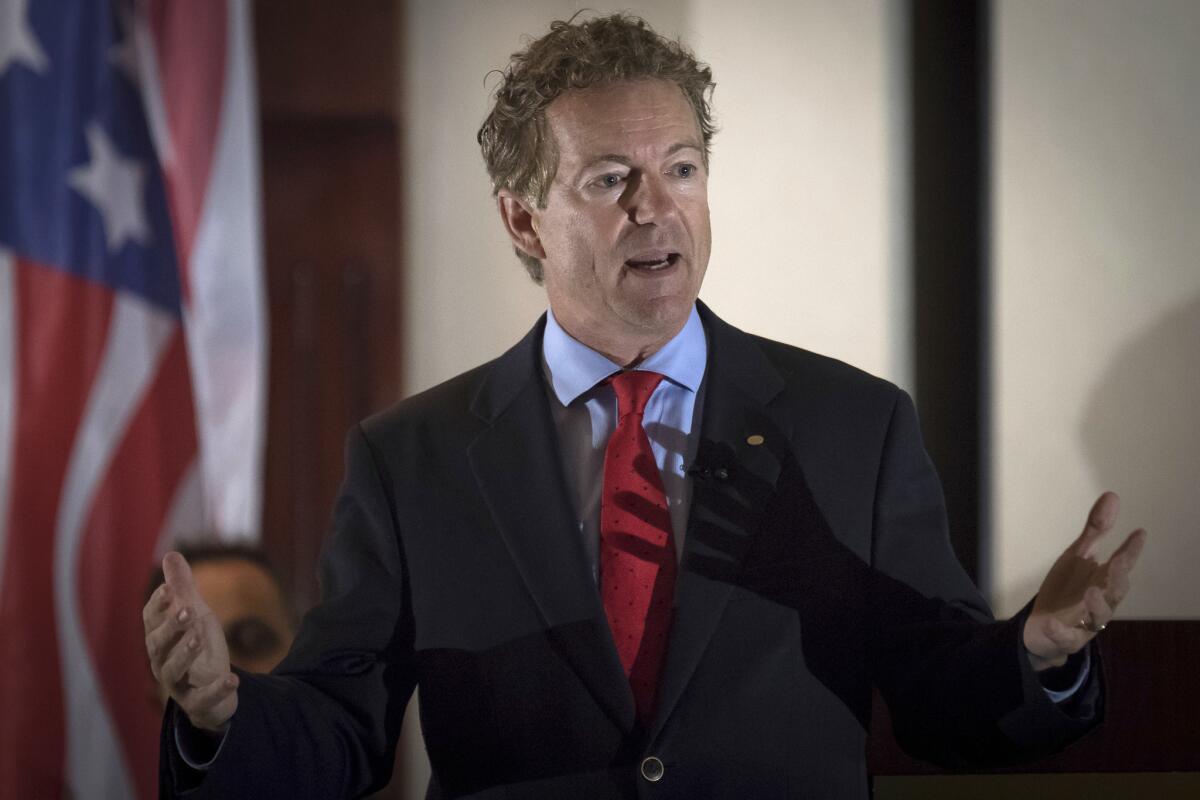
Senate Republicans are adding billions of dollars to their teetering health care bill, hoping to win support from GOP senators who may be opposing the legislation.
According to documents obtained by The Associated Press, a new version of the measure would add $14.5 billion for states.
Part of that money is aimed at sparsely populated states. Maine GOP Sen. Susan Collins on Sunday all but closed the door on supporting the bill, while Alaska Republican Sen. Lisa Murkowski is undecided.
A table says Arizona would get 14% more money than under President Obama’s law, Kentucky 4% more and Texas 49% more.
Sens. John McCain of Arizona, Kentucky’s Rand Paul and Texas’ Ted Cruz have all expressed opposition to the bill.
Democrats say the numbers are misleading.
Jared Kushner used personal email for some White House communication, lawyer says

President Trump’s son-in-law, Jared Kushner, used his personal email account on dozens of occasions to communicate with colleagues in the White House, his lawyer said Sunday.
Between January and August, Kushner received or responded to fewer than 100 emails from White House officials from his private account, attorney Abbe Lowell said in a statement that confirmed Kushner’s use of a personal address in the first months of the administration.
The use of a private email account to discuss government matters is a politically freighted issue that factored prominently in last year’s presidential election. Trump repeatedly attacked Democratic opponent Hillary Clinton for setting up a private email server as secretary of state, a decision that prompted an FBI investigation that shadowed her for much of the campaign.
In Kushner’s case, Lowell said, the emails to and from his private account usually involved “forwarded news articles or political commentary and most often occurred when someone initiated the exchange by sending an email to his personal, rather than his White House, address.”
The attorney said Kushner, a key aide to Trump, uses his White House address to discuss White House business and that any non-personal emails were forwarded to his official account and “all have been preserved in any event.”
Politico first reported Kushner’s use of a personal email account.
Trump repeatedly argued during the campaign that Clinton deserved to be prosecuted for mishandling classified information, frequently deriding her as “Crooked Hillary,” and has continued to suggest that even after being elected president.
Former FBI Director James B. Comey said that though Clinton and her aides were “extremely careless” in their handling of classified material, there was no evidence that anyone intended to break the law, and he recommended against criminal prosecution. The Justice Department accepted that conclusion.
At a political event in Alabama on Friday, Trump responded to supporter chants of “Lock her up” by saying, “You’ve got to speak to [Atty. Gen.] Jeff Sessions about that.”
Trump administration expands travel ban to North Korea and Chad
Travelers from eight countries will face restrictions on entry to the U.S, ranging from a total ban to more targeted restrictions, under a new proclamation signed by President Trump on Sunday.
The new rules will affect the citizens of Chad, Iran, Libya, North Korea, Somalia, Syria, Venezuela and Yemen. It will go into effect Oct. 18.
Officials emphasized that valid visas would not be revoked as a result of the proclamation.
Some countries will face full bans. Others are more tailored, such as Venezuela’s, which will apply only to certain government officials and their families
Trump’s controversial ban on visitors from six Muslim-majority countries expires Sunday, 90 days after it went into effect.
Trump cites previously unreported figures for ‘terrific’ tax plan
President Trump said Sunday the White House has “totally finalized” a tax plan, but the particulars differed substantially from what has been reported about the proposal.
“I think it’ll be terrific.… I think it’s going to go through, and it will be the largest tax cut in the history of the country,” the president told reporters as he prepared to return to the White House from his New Jersey golf resort.
Trump said he hoped for a corporate tax rate of 15%, a figure he has used before. Congressional officials have said they hope to cut the current rate of 35% to 20%.
Asked whether the finalized plan in fact called for a rate of 15%, Trump said: “We’ll see what happens. But I hope it’s going to be 15%.”
Trump added that such a cut in the corporate rate would “bring jobs back into our country,” a premise that many economists question.
The president also said the individual rate would be 10% or 12%, “much lower than it is right now.”
Reports have said the plan calls for lowering the top bracket for individuals to 35% from what is currently 39.6%. It was not clear if Trump was disclosing what rates in other tax brackets would be or citing figures that are no longer under discussion.
Trump has said previously that the plan would not cut taxes for the wealthiest Americans, and Democrats have said they would not support a blueprint that did so.
Trump on his role in kneeling-protest controversy: ‘Nothing to do with race’
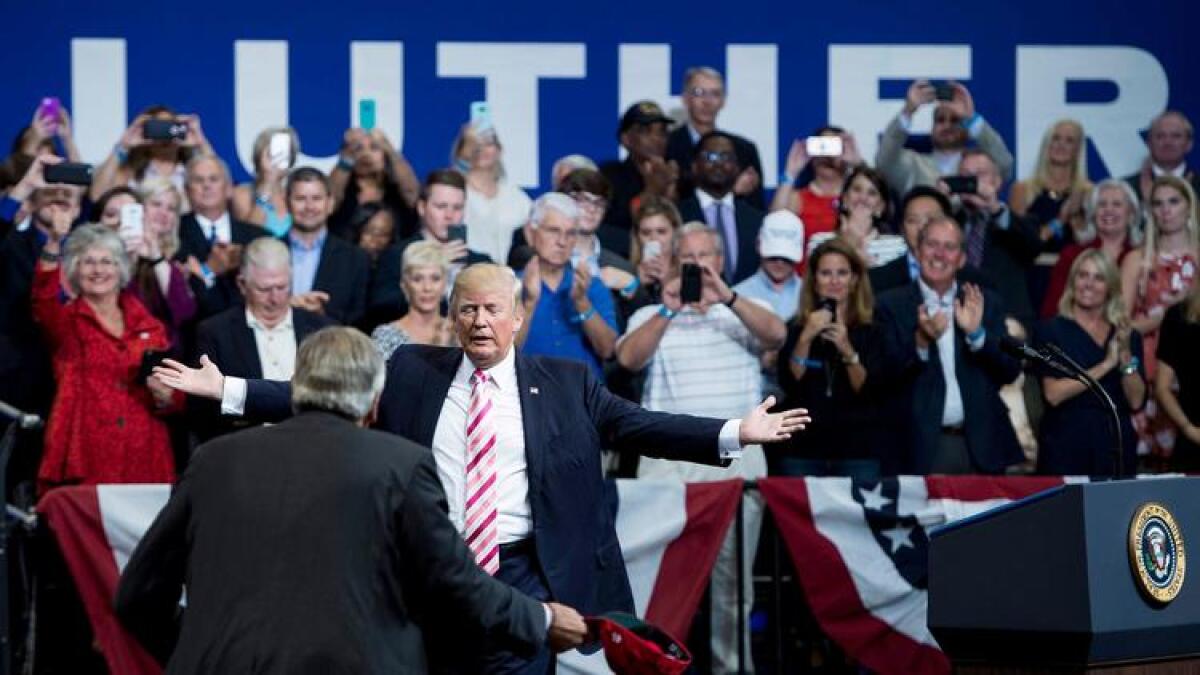
President Trump declared Sunday that his strident speech in Alabama two days earlier, in which he denounced protests carried out mostly by African American pro football players, as well as a series of vehement tweets since then, had nothing to do with race.
Trump has carefully avoided overt mentions of race during days of angry criticism of players who kneel during the national anthem to protest racial injustice — or in some cases to protest being told they don’t have the right to protest.
But African Americans are a large majority in the National Football League, and made up nearly all the 130 players who knelt, sat or raised a fist in defiance before or during Sunday’s NFL games.
Afterward, asked by reporters if he was inflaming racial tensions, Trump replied with an emphatic negative.
“This has nothing to do with race,” he said as he prepared to board Air Force One for a short flight back to Washington after a weekend at his golf resort in New Jersey. “I never said anything about race. This has nothing to do with race or anything else.”
He added: “This has to do with respect for our country and respect for our flag.”
Many of the protesting players have tweeted or made statements to the effect that they mean the flag no disrespect, but that they believe racial injustice degrades American values.
At his Alabama speech, Trump told cheering supporters, nearly all of whom were white, that any protesting “son of a bitch” at an NFL game should be ordered off the field and fired. Asked Sunday whether he was troubled by criticism of that statement by his friend, New England Patriots owner Robert Kraft, the president said no.
“He’s a good friend of mine, and I want him to do what he wants to do,” he said of Kraft. He again depicted failing to stand for the anthem as a sign of disrespect for “our soldiers, our first responders.”
A number of military veterans have been among those offering online support to the protesting players.
Defections from right, center worsen prospects for latest GOP Obamacare repeal measure
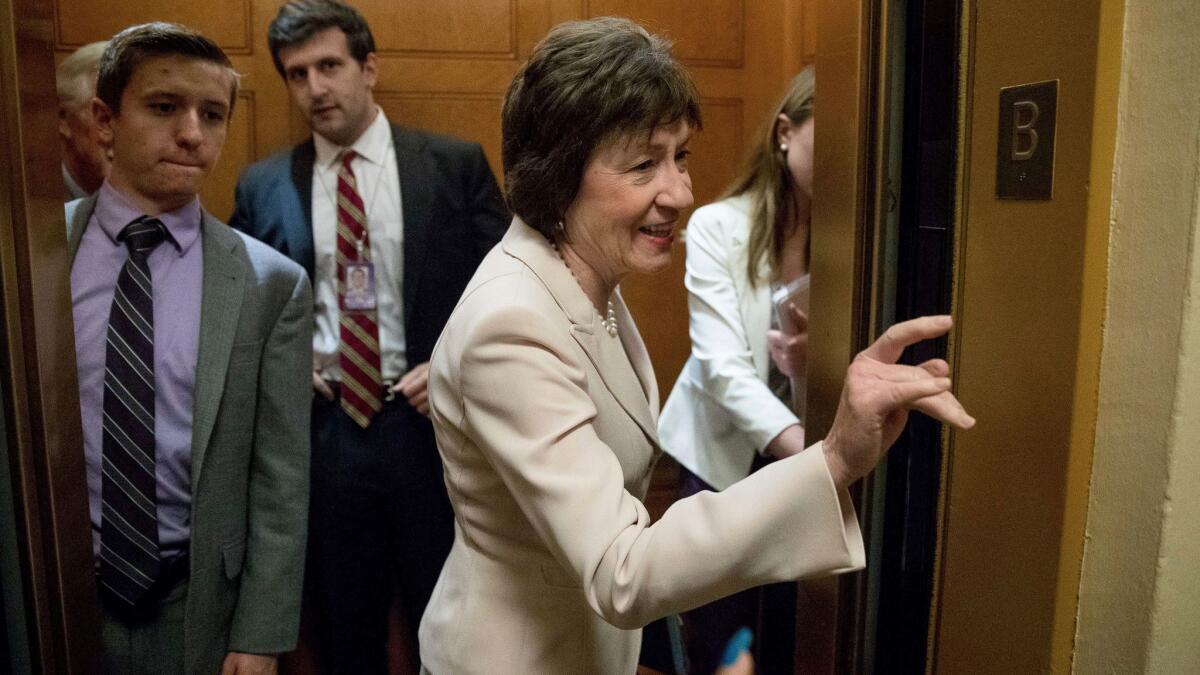
The already faltering prospects for the latest GOP-backed plan to repeal the Affordable Care Act worsened Sunday as a prominent Republican moderate and a leading conservative each indicated they were leaning against voting for it.
In an interview aired Sunday on CNN’s “State of the Union,” Sen. Susan Collins (R-Maine) said she wanted to see an analysis by the Congressional Budget Office before finally making up her mind on the measure, but that it would be “very difficult” to see voting for it. Previous CBO analyses of GOP plans have forecast millions of people being left unable to afford coverage.
Separately, at an appearance in his home state of Texas, Sen. Ted Cruz said that “right now they don’t have my vote.” Cruz said he did not think Sen. Mike Lee (R-Utah) was supporting the bill either.
Two other Republican senators, John McCain of Arizona and Rand Paul of Kentucky, have already said they would not support the current version of the bill, the third attempt by Senate GOP leaders to scrap the Affordable Care Act, the signature legislative achievement of President Obama.
With 52 Republicans in the Senate and no Democratic support for repealing Obamacare, the bill can afford to lose only two GOP votes.
“It’s very difficult for me to envision a scenario where I would end up voting for this bill,” Collins said in the CNN interview. “I have a number of serious reservations about it.”
Paul, interviewed on NBC’s “Meet the Press,” said he has always wanted to repeal Obamacare, but that the latest bill, by South Carolina Sen. Lindsey Graham and Louisiana Sen. Bill Cassidy, “sets up a perpetual food fight” over the formula for healthcare spending.
Asked if he could envision changes that would allow him to support the bill, Paul said he might be able to if the bill’s central element, block grants to states to cover healthcare spending, were eliminated — an unlikely prospect.
Graham and Cassidy, interviewed on ABC’s “This Week” said they had not yet abandoned the bill and suggested that they could still work out an agreement with Paul. They also said they were continuing to discuss the bill with Sen. Lisa Murkowski of Alaska, who has not declared a position but has said she has considerable doubts about the proposal.
Treasury secretary defends Trump rhetoric on North Korea
Treasury Secretary Steve Mnuchin defended President Trump’s mode of dealing with North Korea, insisting Sunday that heated rhetorical exchanges with reclusive despot Kim Jong Un were not making a volatile situation more dangerous.
“This is not about personalities; this is not personal,” Mnuchin said on ABC’s “This Week.”
For the last week, Trump has used various forums, including a high-profile speech to the United Nations General Assembly, to belittle Kim as “Rocket Man.”
The North Koreans have responded with a volley of insults, including calling Trump a “dotard,” meaning a mentally feeble old person, coupling that with new threats to attack the United States.
In the ABC interview, Mnuchin parried questions about Saturday’s flight by U.S. B-1B bombers and F-15C fighter jets over waters north of the demilitarized zone dividing the Korean peninsula. The Pentagon described the warplanes’ deployment as being in response to “reckless behavior” by Kim’s government.
Mnuchin, echoing language frequently used by White House aides as North Korea tensions have escalated, said Trump had a wide variety of options for dealing with Kim and his nuclear ambitions and ballistics program.
“The president has said everything’s on the table,” he said.
Late Saturday, Trump tweeted a reference to a speech earlier in the day by North Korea’s foreign minister, Ri Yong Ho.
“Just heard Foreign Minister of North Korea speak at U.N.,” the said on Twitter. “If he echoes thoughts of Little Rocket Man, they won’t be around much longer!”
Queried by ABC interviewer Martha Raddatz about whether the president’s bellicose language was causing the public to question his ability to deal effectively with North Korea, Mnuchin replied: “I can assure you, the president’s No. 1 priority is the safety of the American people and our allies.”
NFL players again ‘take a knee’ as Trump renews his attacks

In silent rebuttal of criticism from President Trump, NFL players in the sport’s first game of the day kneeled during the national anthem, while other locked arms in solidarity.
The opening moments of the game, played in London, featured numerous players from both the Baltimore Ravens and the Jacksonville Jaguars kneeling. Their protest came just hours after Trump fired off a pair of early-morning tweets again assailing professional athletes who have staged “take a knee” protests during the playing of the national anthem, and urging fans to shun games.
Trump’s attacks brought a strongly worded rebuttal from an NFL owner who is close to the president: New England Patriots CEO and owner Robert Kraft, who complimented players and said he was “deeply disappointed” by the tone of Trump’s comments on Friday. Kraft said he supported players’ rights to “peacefully affect social change and raise awareness.”
Kraft has been a significant donor to Trump’s campaigns and once gave Trump a Super Bowl ring. The criticism from him, which was issued in his own name, rather than simply as a statement from the team, provided a further indication of of how deeply Trump’s statements of the last 48 hours have alienated him from professional football.
In his tweets Sunday, Trump also suggested that any drop in NFL game attendance was due to the disgruntlement of fans who objected to the protests, originally intended to call attention to police shootings of unarmed black men and to the Black Lives Matter movement.
He also repeated his previous contention that rules meant to protect players from traumatic brain injuries had made professional football “boring.”
The president ignited the racially charged controversy on Friday night with a campaign-style speech in Alabama in which he referred to any player taking part in such protests as a “son of a bitch.”
That drew a fusillade of criticism on Saturday from pro athletes who have taken part in the protests, their supporters and a number of major league franchise owners, and a succession doubling-down tweets from Trump.
On Sunday, Sen. Rand Paul (R-Ky.) said he thought Trump’s quarrel with the NFL was ill advised.
“If I were president, I probably would not get involved in this,” Paul said in an appearance on NBC’s “Meet the Press.”
The president’s surrogates hurried to his defense on Sunday, with Treasury Secretary Steve Mnuchin saying Trump was right to decry the “take a knee” protests as disrespectful.
“They can do free speech on their own time,” Mnuchin said of the professional athletes involved, speaking on ABC’s “This Week.”
Asked about the president’s use of a profanity to describe the protesting players, Mnuchin said: “I think the president can use whatever language he wants to use.”
Mnuchin’s comments then drew a sharp riposte from Rep. Ted Lieu (D-Torrance), who said on Twitter that the treasury secretary did not seem to understand First Amendment protections.
“I am beginning to think that in govt, you are stupid as a rock,” Lieu tweeted. “US Constitution also applies to NFL players. Get it?”
UPDATES
8: 13: a.m.: This post was updated with comment from Rep. Ted Lieu.
7:10 a.m.: This post was updated with comments from Treasury Secretary Steve Mnuchin.
6:40 a.m.: This post was updated with details from the Ravens-Jaguars game in London.
Trump’s pregame tweets urge fans to boycott NFL games if protests continue
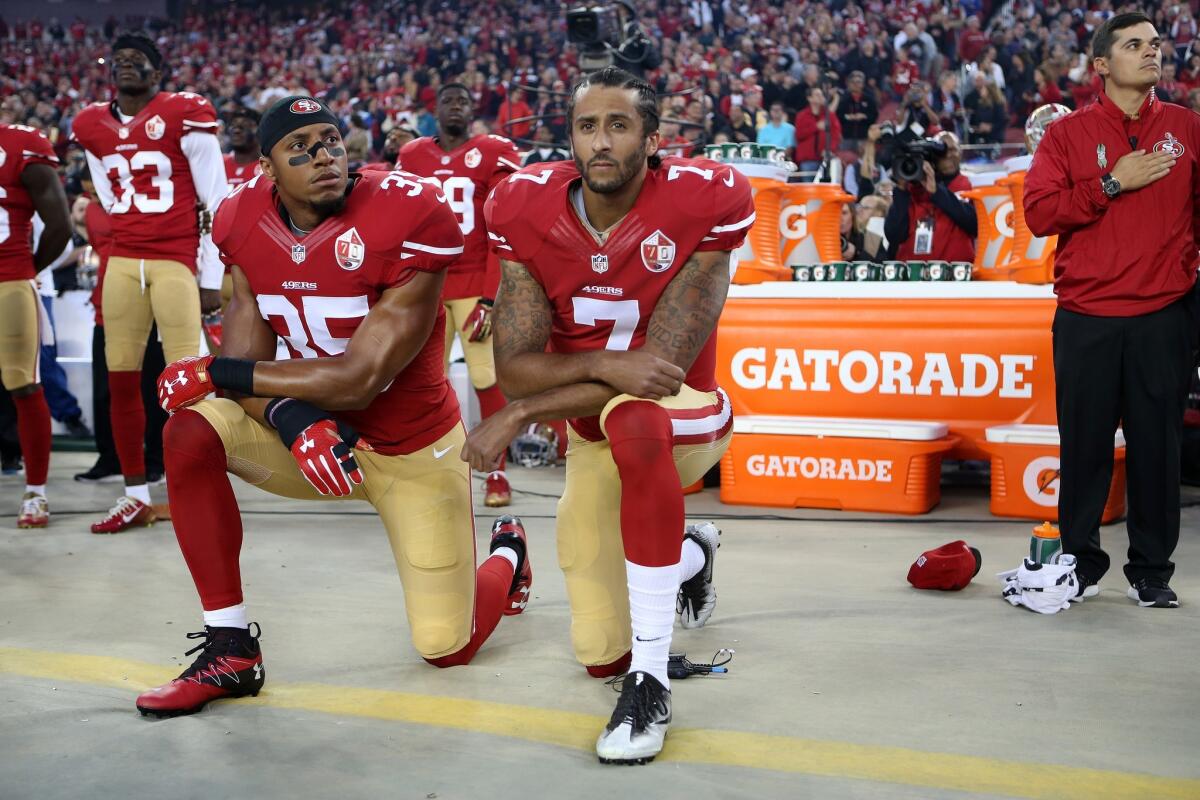
It’s Sunday, and President Trump is ready for some football — but it sounds as though he’ll be watching to see who kneels for the national anthem.
Two days after a fiery speech in Alabama in which he called for NFL owners to discipline players who protest during “The Star Spangled Banner,” Trump fired out two early tweets urging fans to boycott games “until players stop disrespecting our Flag & Country.”
Analysis: In Trump’s bully pulpit, it’s ‘us’ vs. ‘them,’ with race often used as a device to polarize
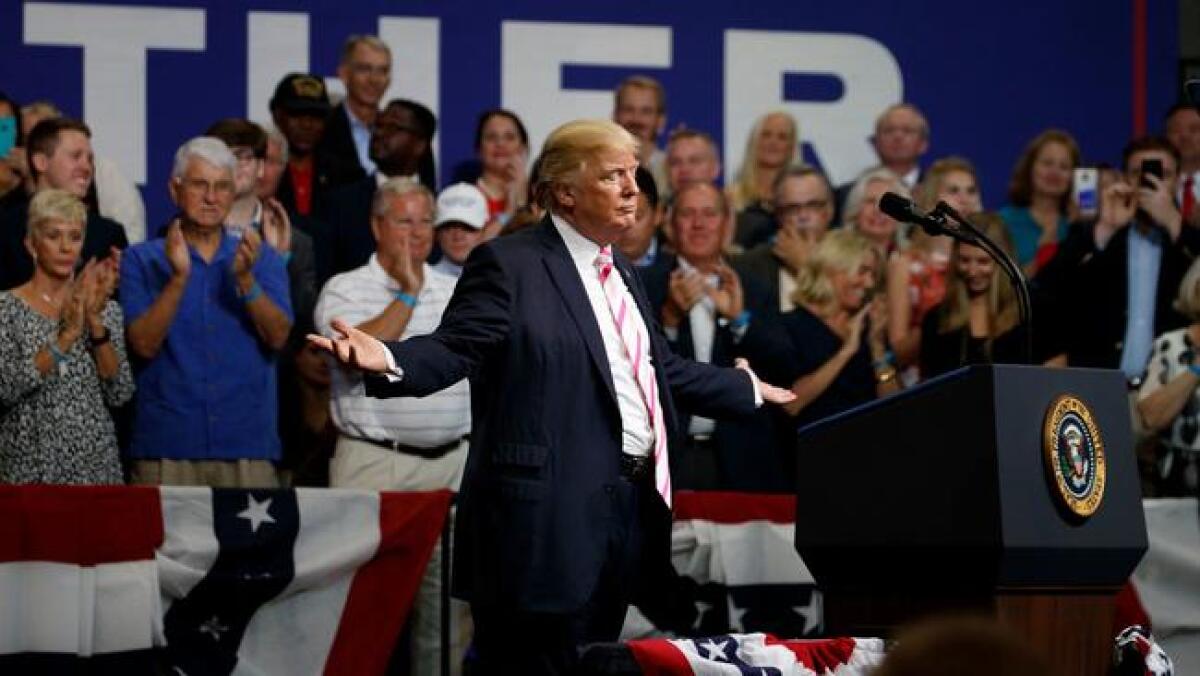
For much of his time as president, Donald Trump has been the bully in the bully pulpit, castigating targets foreign and domestic. Much of Trump’s bluster attempts to divide people into us-against-them, and it often has a single polarizing agent: race.
On Friday night, as he has many times before, Trump inflamed an almost exclusively white Southern audience against opponents who he said were trying to steal their heritage and attack their values. In that Alabama speech and on Saturday, he criticized African American athletes who had exercised free speech by declining to stand during the national anthem.
His racially oriented statements seem to reflect Trump’s embrace of the world as it was decades ago when power was largely held by men like him.
By the sheer bulk of his comments, Trump has reversed what had been a trend in politics over several decades: Racial appeals have grown less overt, not more. Trump’s targets in the last week, by contrast, have included Golden State Warriors star Stephen Curry, unemployed NFL quarterback Colin Kaepernick and ESPN anchor Jemele Hill — all African Americans.
Amid war of words, U.S. warplanes fly near North Korea in a rare show of force
American bomber and fighter jets flew along North Korea’s eastern coastline Saturday in a “show of force” that was closer to the rogue nation’s border than any other mission this century, the Pentagon reported.
The rare predawn flight came amid heightened tensions between Pyongyang and Washington and follows a North Korean threat to detonate a hydrogen bomb in the Pacific Ocean.
Dana White, chief Pentagon spokeswoman, said in a statement Saturday that U.S. B-1 bomber and F-15 fighter jets launched from airfields in the region and flew in international airspace over waters east of North Korea.
“This mission is a demonstration of U.S. resolve and a clear message that the president has many military options to defeat any threat,” White said. “North Korea’s weapons program is a grave threat to the Asia-Pacific region and the entire international community.”
The Pentagon issued several photos of the sleek fighter and bomber jets streaking across the darkened sky toward the Korean Peninsula.
While the U.S. military routinely conducts such missions in response to North Korean missile and nuclear tests, this flight was the “farthest north of the Demilitarized Zone any U.S. fighter or bomber aircraft [has] flown off North Korea’s coast in the 21st century, underscoring the seriousness with which we take [North Korea’s] reckless behavior,” White said.
The Demilitarized Zone is a strip of land on the Korean Peninsula that separates North and South Korea. It is frequently the scene of military exercises when tensions rise, as has been the case since President Trump took office.
After the military flights Saturday, North Korea’s foreign minister, Ri Yong Ho, spoke to the United Nation General Assembly in New York and called Trump “a mentally deranged person full of megalomania” who is holding “the nuclear button.”
Ri’s comments further escalated a the war of words instigated this week when Trump described North Korean leader Kim Jong Un as “Rocket Man” on “a suicide mission.”
Trump also used his first address to the United Nations n to threaten to “totally destroy” North Korea.
The inflammatory statements were not in a draft of the speech that several senior officials had earlier reviewed and vetted, The Times reported.
Kim lashed back at Trump in a rare personal statement Thursday, calling Trump “a mentally deranged U.S. dotard” and a “gangster” who had to be tamed “with fire.”
The same day, Trump announced new U.S. sanctions against other countries, foreign businesses and individuals that do business with North Korea, a move likely to primarily affect China, Pyongyang’s largest trading partner.
The sanctions were in response to North Korea’s underground test this month of what was believed to be a hydrogen bomb and the nation’s continued ballistic missile tests, several of which have involved missiles fired over northern Japan.
Trump pulls White House invitation from Golden State Warriors after Curry said he opposed accepting it

President Trump on Saturday withdrew his invitation to the NBA champion Golden State Warriors to visit the White House, blaming the team’s star, Stephen Curry, for “hesitating” about accepting the offer.
Trump’s move appeared preemptory as the team was expected to vote to decline the traditional White House offer extended to sports champions after Curry said Friday he would oppose a visit.
Curry, who has been critical of Trump, said that he hoped to send a message by snubbing the White House invitation “that we don’t stand for basically what our president has – the things that he’s said and the things that he hasn’t said in the right times, that we won’t stand for it.”
Warriors coach Steve Kerr also has said he’d prefer not to attend a White House event with Trump.
Cleveland Cavaliers star LeBron James took to Twitter to criticize Trump, calling him a “bum.”
“Going to the White House was a great honor until you showed up!” James tweeted.
On Friday night, Trump publicly criticized African American National Football League players such as Colin Kaepernick who have been kneeling during the national anthem to protest the nation’s racial disparities.
Trump urged NFL owners to fire the players and encouraged fans to walk out in their own protest.
“That’s a total disrespect of our heritage. That’s a total disrespect of everything that we stand for,” Trump told a rally in Alabama, where he was campaigning for Republican Sen. Luther Strange.
“Wouldn’t you love to see one of these NFL owners, when somebody disrespects our flag, you’d say, ‘Get that son of a bitch off the field right now. Out! He’s fired,” Trump said to loud applause.
8:57 a.m.: This post was updated with comments from LeBron James.
Trump says McCain ‘let down’ Arizona and friend Lindsey Graham in opposing latest GOP healthcare bill
President Trump on Saturday slammed John McCain for delivering an apparent fatal blow to the latest GOP healthcare legislation, saying the Arizona Republican “let down” his state and the bill’s sponsor by announcing his opposition.
In a series of early-morning tweets, Trump also indicated he isn’t giving up on pushing the last-ditch Obamacare replacement through the Senate next week by publicly urging two other Republican opponents to support it.
But the president focused Saturday on McCain, who raised Trump’s ire in July by surprisingly casting a last-minute no vote that killed an earlier Republican attempt to replace the Affordable Care Act.
Trump, who said in July 2015 that the former Vietnam prisoner of war wasn’t a war hero, took aim Saturday at McCain’s loyalty to his party and his close Senate friend, Sen. Lindsey Graham (R-S.C.).
The healthcare bill is sponsored by Graham and Sen. Bill Cassidy (R-La.).
On Friday, McCain announced that he could not “in good conscience” vote for the legislation, which is opposed by patient advocates, hospitals, physician groups and a growing number of healthcare experts.
McCain urged the Senate to work on a bipartisan healthcare bill while lamenting that he could not support legislation sponsored by his two Republican colleagues.
“I take no pleasure in announcing my opposition. Far from it. The bill’s authors are my dear friends,” he said.
No Democrats or independents in the Senate plan to vote for the Graham-Cassidy bill. That means Republicans can lose the votes of only three members from their slim 52-seat majority when the bill gets to the Senate floor for a vote next week.
Sen. Rand Paul (R-Ky.) already had said he opposed the bill. And Sens. Susan Collins (R-Maine) and Lisa Murkowski (R-Alaska), who also voted against the GOP’s July healthcare repeal effort, have signaled strong reservations about the latest proposal.
Trump signaled on Twitter he was not giving up on getting support from Paul and Murkowski.
In Alabama, Trump detours to insult Kim Jong Un and defend himself
President Trump traveled to Alabama on Friday night to help out a Republican senator threatened by an insurgent GOP challenger. He departed having detailed a litany of woes of a president under siege.
The president continued his brash public feud with North Korean leader Kim Jong Un, escalating the insults he has leveled at Kim this week but insisting, without details, that he would protect the American people from Kim’s wrath.
“Little Rocket Man,” Trump dismissively termed Kim.
Protesters interrupt James Comey during convocation speech at Howard University
More than 50 students at Howard University in Washington protested former FBI Director James Comey’s convocation address to students on Friday.
After some delay, Comey delivered his speech and received a standing ovation. It was one of his few public appearances since he was fired by President Trump in May.
“Our country is going through one of those periods where we’re trying to figure out who we really are and what do we stand for,” Comey told the historically black university. “It’s painful.”
Before the event began, protesters shouted: “Get out James Comey! You’re not our homie!” Many waved fists and sang “We Shall Not be Moved.”
In response, Comey urged students to respect a back-and-forth dialogue.
“I love the enthusiasm of the young folks. I just wish they would understand what a conversation is. A conversation is where you speak and I listen. And then I speak and you listen. And then we go back in forth,” he said.
The demonstration was organized by the Howard University resistance movement, which formed last spring.
“James Comey represents an institution diametrically opposed to the interests of Black people domestically and abroad,” the group said in a statement.
In August, the university announced that Comey would deliver the convocation as well as five lectures on public policy during the school year.
Comey said he would donate the $100,000 fee to a scholarship fund for students from foster homes.
Comey is used to taking flak.
Democrats assailed him last year when he led an FBI investigation into Hillary Clinton’s use of a private email server when she was secretary of State, and then re-opened the probe 11 days before the November election. No charges were pressed.
Trump then attacked Comey, and ultimately fired him, for pursuing an FBI probe into Russian meddling in the election. The dismissal led to appointment of special counsel Robert S. Mueller III, who has significantly expanded the investigation.
Sen. John McCain delivers a potentially fatal blow to GOP effort to repeal Obamacare
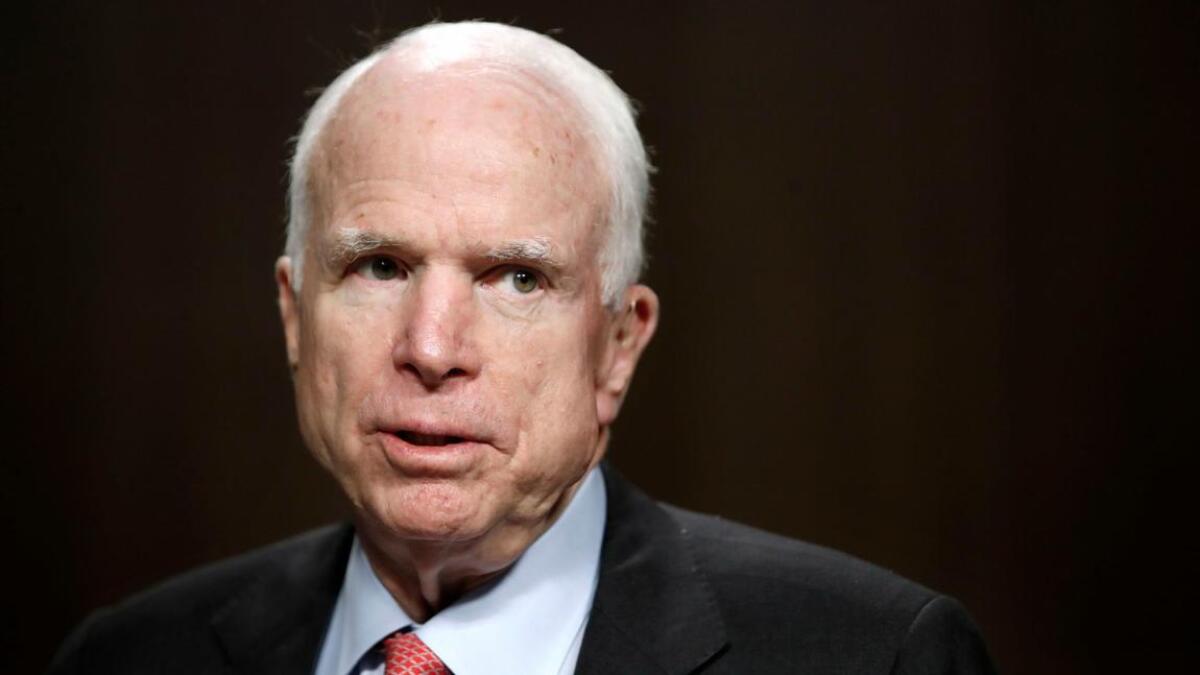
Sen. John McCain (R-Ariz.) dealt a critical blow to Republicans’ last-ditch attempt to roll back the Affordable Care Act on Friday, announcing he will not vote for sweeping repeal legislation that GOP leaders plan to bring to the Senate floor for a vote next week.
“We should not be content to pass healthcare legislation on a party-line basis,” McCain said in a lengthy statement criticizing the GOP rush to pass a repeal bill without any hearings and little public scrutiny.
McCain’s move raises serious questions about whether Republicans have the votes to pass the latest repeal bill, authored by Sens. Lindsey Graham (R-S.C.) and Bill Cassidy (R-La.).
The party, which has 52 votes in the Senate, can lose only two or the bill will fail.
Sen. Rand Paul (R-Ky.) has already said he will oppose the Graham-Cassidy bill, which he has criticized for maintaining too much of the current law’s government spending on healthcare.
And Sen. Susan Collins (R-Maine), a centrist Republican who helped sink the last GOP repeal effort in July, has signaled strong reservations about the current proposal.
McCain also opposed that previous effort, casting a dramatic middle-of-the-night vote against the measure and calling for his colleagues to stop trying to rush through major healthcare legislation.
McCain reiterated those calls Friday in announcing his opposition to Graham-Cassidy.
“As I have repeatedly stressed, healthcare reform legislation ought to be the product of regular order in the Senate. Committees of jurisdiction should mark up legislation with input from all committee members, and send their bill to the floor for debate and amendment,” the veteran lawmaker said.
“That is the only way we might achieve bipartisan consensus on lasting reform, without which a policy that affects one-fifth of our economy and every single American family will be subject to reversal with every change of administration and congressional majority.”
In Alabama, the heart of Trump country, many think he’s backing the wrong candidate in Senate race
President Trump will swoop into Alabama on Friday to bolster the campaign of Sen. Luther Strange, a soft-spoken former state attorney general now in danger of losing the seat he was tapped to fill just months ago after Jeff Sessions joined the administration.
But in this conservative state that overwhelmingly supported Trump and prides itself as the heart of Old Dixie, some think the president is backing the wrong man. And they’re not sure his visit will help.
Voter enthusiasm instead runs high for the more Trump-like candidate, Roy Moore, the state’s polarizing former chief justice. His far-right, Bible-quoting views twice resulted in him being forced off the bench for defying higher court decisions, including the U.S. Supreme Court’s ruling in favor of gay marriage. Die-hard supporters have no doubt he will be just as unwavering if they send him to Washington.
The GOP establishment has poured millions of dollars into Strange’s campaign, much from Senate Majority Leader Mitch McConnell’s aligned Senate Leadership Fund.
But a rival group, run by allies of Stephen K. Bannon, the former Trump advisor, backs Moore, turning Tuesday’s GOP runoff into a trial run for several upcoming outsider-versus-establishment contests to be waged in Arizona, Nevada and other states ahead of the 2018 midterm election.
The race also marks a new kind of power struggle for the hearts and minds of Trump voters — one that pits Bannon, an influential figure in the president’s campaign, against Trump himself.
Trump’s endorsement was once seen as making Strange a shoo-in for the job. But now it’s unclear whether voter loyalty to the president can overcome skepticism about “Big Luther,” as Alabamans call the 6-foot-9 senator.
“I was a big Trump supporter -- and still am -- but he’s wrong on this one,” said Jeff Hopper, a gun rights activist who brought his family to hear Moore speak at a Christian high school in Florence, Ala., where cotton grows in fields along the highway.
“Quite frankly I’m a little bit disappointed that Donald Trump has decided to come out on his side.”
The Republican tax plan is still more talk than action
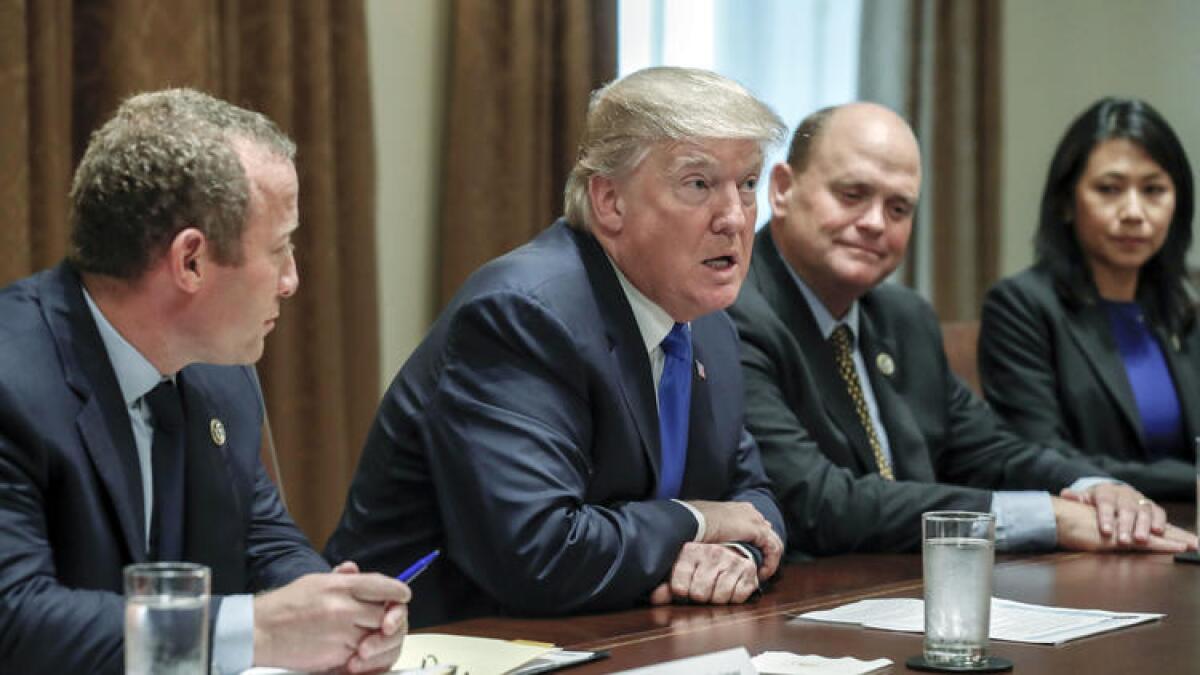
They have a blueprint and principles. They’ve held countless strategy sessions for what could be the biggest tax overhaul in decades.
They even produced a handy desk calendar with daily inspirational messages and helpful tax statistics to drive home the need for reform.
All Republicans need now is an actual plan.
Despite months of promises and what Senate Majority Leader Mitch McConnell calls a “once-in-a-lifetime opportunity,” the GOP-led Congress and White House have yet to agree on how to revamp the tax code, including how much to reduce corporate and individual tax rates, how tax cuts would be paid for or whether they will be offset at all.
“There is no movement on tax reform,” said Rep. Mark Meadows (R-N.C.), chairman of the conservative House Freedom Caucus, after Republicans huddled recently behind closed doors for the latest update.
“I’m sure they’re working, paddling like a bunch of ducks,” he said. “They just need to make some decisions.”
‘Dotard’ rockets from obscurity to light up Trump-Kim exchange, spark partisan war of words
President Trump fired off “rocket man.”
North Korean dictator Kim Jong Un, the target of that verbal missile launch, shot back a flurry of taunts, calling America’s leader “a rogue,” “a frightened dog,” a “gangster fond of playing with fire.”
But it was one word that lit up social media, sent countless masses thumbing through dictionaries (or the online equivalent), one word that turned the back-and-forth between the brinksmen into a teachable moment: dotard.
Secretary of Education Betsy DeVos rescinds Obama-era guidelines on campus sexual assault
Secretary of Education Betsy DeVos on Friday rescinded controversial Obama-era guidelines that had prodded colleges and universities to more aggressively — some say too aggressively — investigate campus sexual assaults.
The decision left women’s groups worried that victims of sexual assault will lose protections or face intimidation to remain silent, but critics of the former guidelines said the change could lead to a process that also considers the rights of those accused.
The department said it was withdrawing the Obama administration’s policy – which was spelled out in a 2011 letter to schools – because of criticism that it placed too much pressure on school administrators, favored alleged victims and lacked due process for people who had been accused of sexual assault.
“Those documents have led to the deprivation of rights for many students – both accused students denied fair process and victims denied an adequate resolution of their complaints,” the department’s acting assistant secretary for civil rights, Candice Jackson, said in a letter Friday.
Jackson and DeVos have both been criticized for showing support for those who have been accused of sexual assault. Advocates for victims complained that the department has not spent enough time listening to survivors.
The department also released a new question-and-answer statement, replacing one issued by the Obama administration in 2014, to advise colleges and universities about how their responsibilities have changed. It emphasizes providing the same information, rights and opportunities to both parties in a sexual assault investigation.
It also allows schools to facilitate an informal resolution process if both parties agree, rather than adjudicate every case, as currently required.
The letter rescinds any suggested timeline for investigations. The former guidance recommended schools reach a decision in about 60 days, something critics said put too much pressure on administrators, particularly in cases that involved conflicting evidence.
The guidelines still require each school to have a coordinator and to report all incidents of sexual assault as required by the Clery Act, separate guidance from 1990 that remains in place.
And the new guidance gives schools more flexibility for the standard of evidence used to investigate these cases. The previous guidelines suggested using a “preponderance of evidence,” meaning the decision makers were more than 50% sure an assault occurred. Critics said a higher standard should be used, such as “clear and convincing evidence” of an assault, which will now be an option.
UPDATES:
8:38 a.m.: This article was updated with additional details about the new policy.
This article was originally published at 8 a.m.
Who are you calling a dotard? Trump keeps the war of words with Kim going
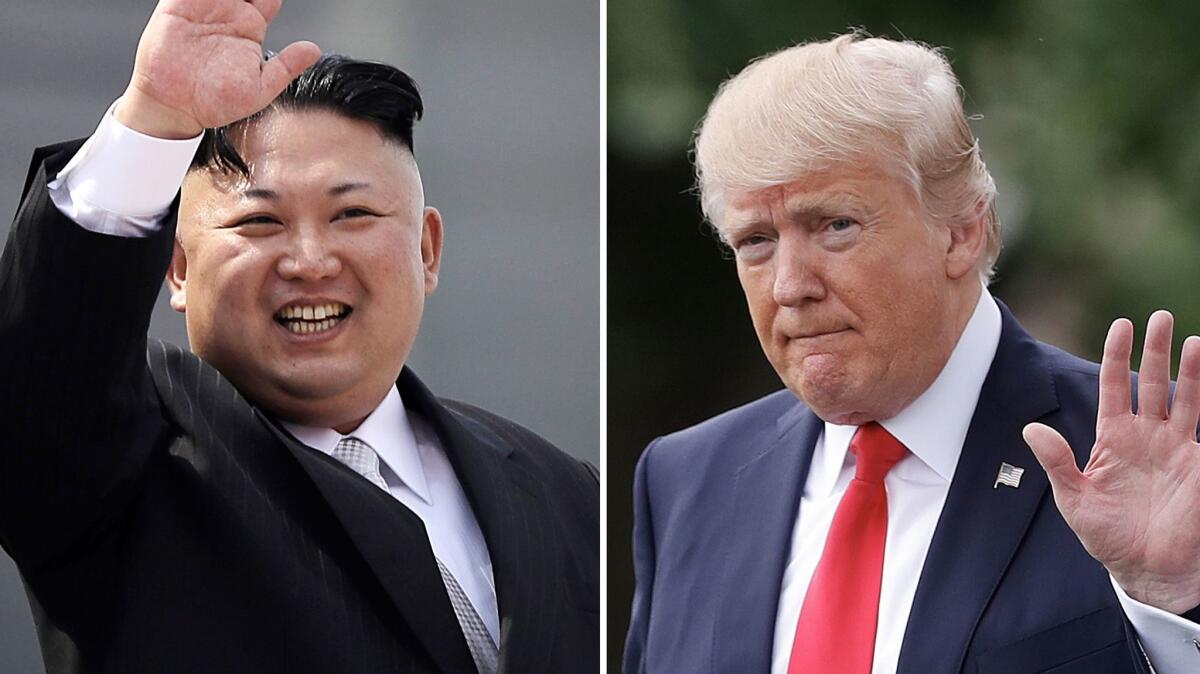
President Trump isn’t going to let Kim Jong Un get the last word.
The North Korean leader continued the spat between Pyongyang and Washington on Friday, calling Trump a “mentally deranged U.S. dotard.”
The U.S. president responded with a Friday morning tweet, labeling Kim “a madman who doesn’t mind starving or killing his people.”
Kim Jong Un calls Trump ‘deranged,’ says he will ‘pay dearly’ for his threats
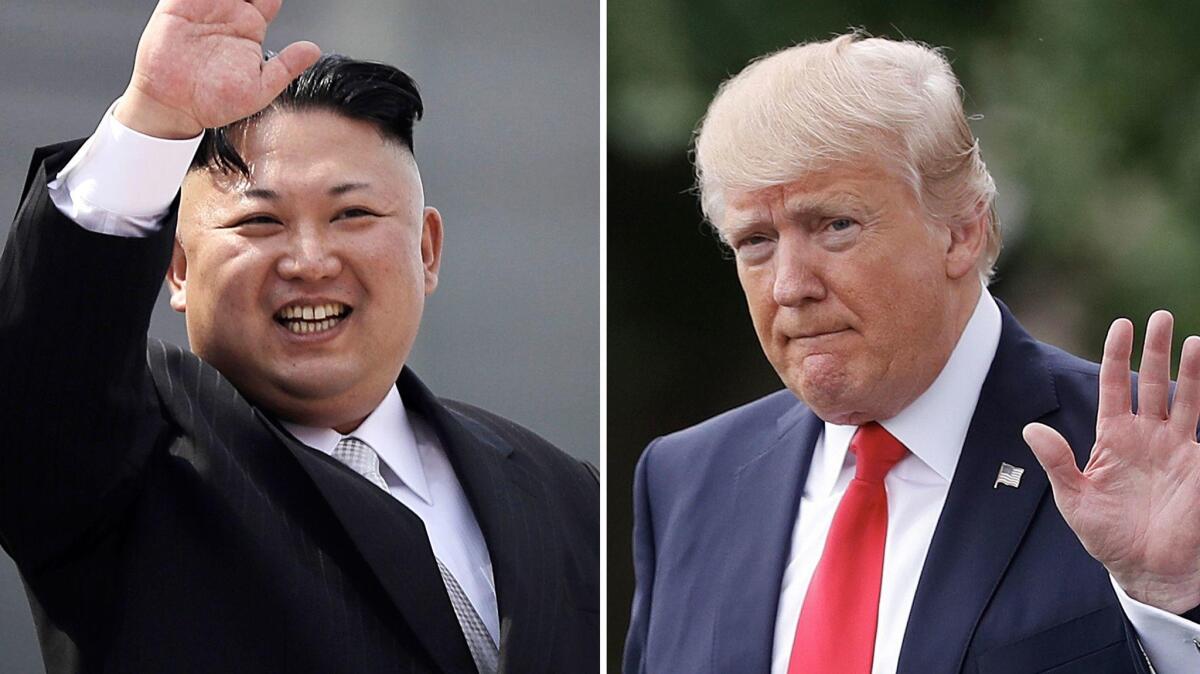
North Korean leader Kim Jong Un called President Trump “deranged” and said that he will “pay dearly” for his threats, in a statement carried by the state news agency Thursday.
The comments came in response to Trump’s combative speech at the U.N. General Assembly on Tuesday.
Kim said that Trump is “unfit to hold the prerogative of supreme command of a country” and described the president as “a rogue and a gangster fond of playing with fire.”
Kim said he is “thinking hard” about his response, but Trump will “pay dearly for his speech calling for totally destroying” North Korea.
Trump announces more sanctions against North Korea for its nuclear buildup
President Trump on Thursday announced plans for new sanctions against North Korea as he struggles to find ways to confront that country’s nuclear buildup.
After threatening earlier this week to completely destroy North Korea if it uses its nuclear weaponry against U.S. territory or allies, Trump told reporters he was issuing a new executive order adding more sanctions to those that the United States and allies already have imposed.
He said the measures would target North Korea’s textiles, fishing industry and shipping. In fact, sanctions against those industries are already in place, so it was not clear what was different about the additional ones.
“Do business with the United States ... or the lawless regime” of North Korea, he said.
“We seek ... a complete denuclearization of North Korea,” the president said. Many observers call that standard all but impossible to meet, given the progress of Pyongyang’s nuclear program to date.
Trump, on the margins of the annual United Nations General Assembly, was meeting Thursday with the presidents of Japan and South Korea, the two neighbors of North Korea with the most at stake in the showdown.
Already, the U.S. and the U.N. have imposed tough economic sanctions against North Korea that eat away at its export income, imports and revenue from workers it sends overseas. But none of those measures has curbed efforts by North Korean leader Kim Jong Un to develop intercontinental missiles capable of delivering a nuclear weapon to the United States.
Analysis: Trump seeks to reassure loyalists even as he courts deals with Democrats
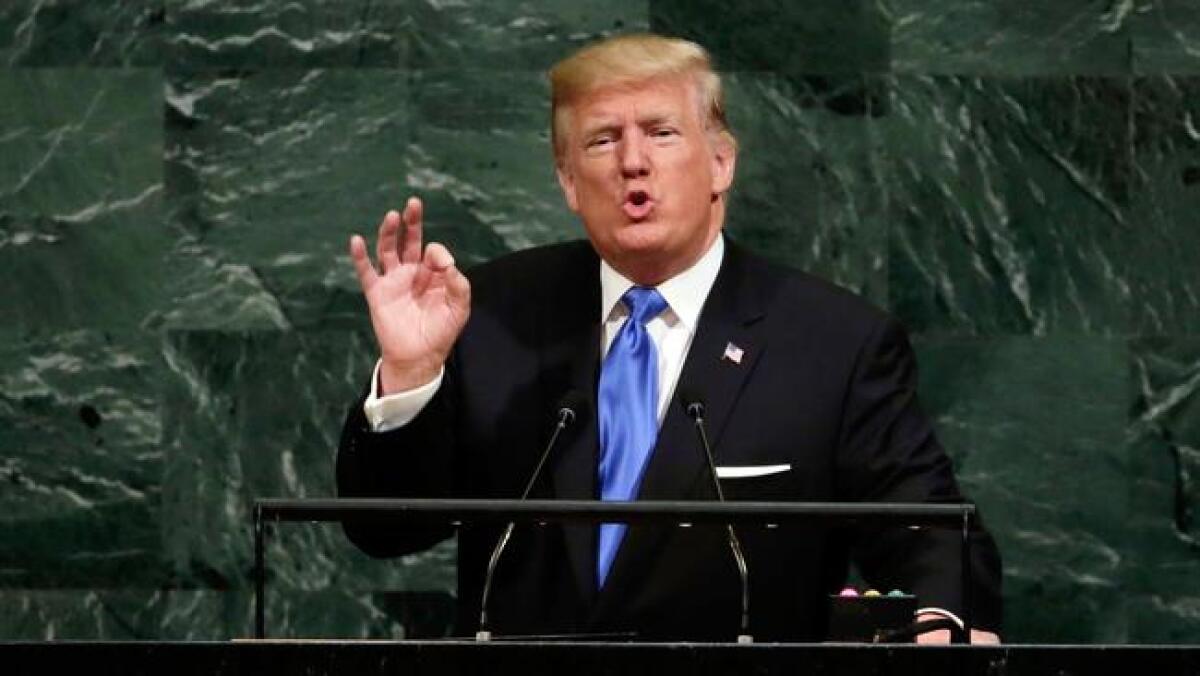
As mainstream media outlets raised questions Tuesday about the wisdom of President Trump labeling North Korean leader Kim Jong Un “Rocket Man” from the lectern at the United Nations, the president’s message-making sped into gear.
“Trump supporters around the country should take pride in President Trump’s strong and principled speech before the world’s leaders at the United Nations today where he expressed profound and unwavering America First principles,” Michael S. Glassner, the executive director of Trump’s reelection organization, said in an email blasted out shortly after Trump’s U.N. address.
“The President described a new vision, putting Americans first…and condemning those who support rogue nations and terrorists.”
For two weeks Trump has been in a well-publicized dalliance with Democrats, cutting deals on the federal budget and debt ceiling and seeking an agreement on immigrants who entered the country illegally as young children. At the same time, he has sought to blunt any retribution from his supporters by flooding them with messages focused on why they backed him in the first place.
Trump offers condolences and assistance to Mexico after devastating earthquake

President Trump extended his condolences to Mexico’s president and offered assistance on Wednesday, a day after an earthquake devastated central Mexico, including the capital, Mexico City, and killed more than 200 people.
Trump and President Enrique Peña Nieto had a lengthy telephone call in the morning, according to the White House, after Trump first tweeted his concern the night before -- prompt reactions that contrasted with his tardy response to disaster in Mexico earlier this month.
“The president offered assistance and search-and-rescue teams, which are being deployed now,” White House Press Secretary Sarah Sanders said in a statement describing the call, and “also pledged to continue close coordination with Mexico as the two countries respond to the recent earthquakes and hurricanes.”
Trump did not extend condolences to Mexico for a week after a deadly earthquake in the southern states of Oaxaca and Chiapas on Sept. 7. Trump blamed poor cellphone reception in the mountains of Mexico for the delay in reaching Peña Nieto.
Yet partly out of pique, by then Mexico had rescinded its offer to help the United States deal with damage in Texas and Louisiana from Hurricane Harvey, and focused instead on earthquake response.
Vice President Mike Pence also spoke of Mexico’s plight, in remarks at the U.N. Security Council on Wednesday.
“Our hearts and our prayers are with the people of Puerto Rico and the people of Mexico,” he said, referring to damage from Hurricane Maria in Puerto Rico and Mexico’s earthquake casualties.
On Twitter on Tuesday night, Trump wrote, “God bless the people of Mexico City. We are with you and will be there for you.”
Federal Reserve will start reducing its stockpile of bonds
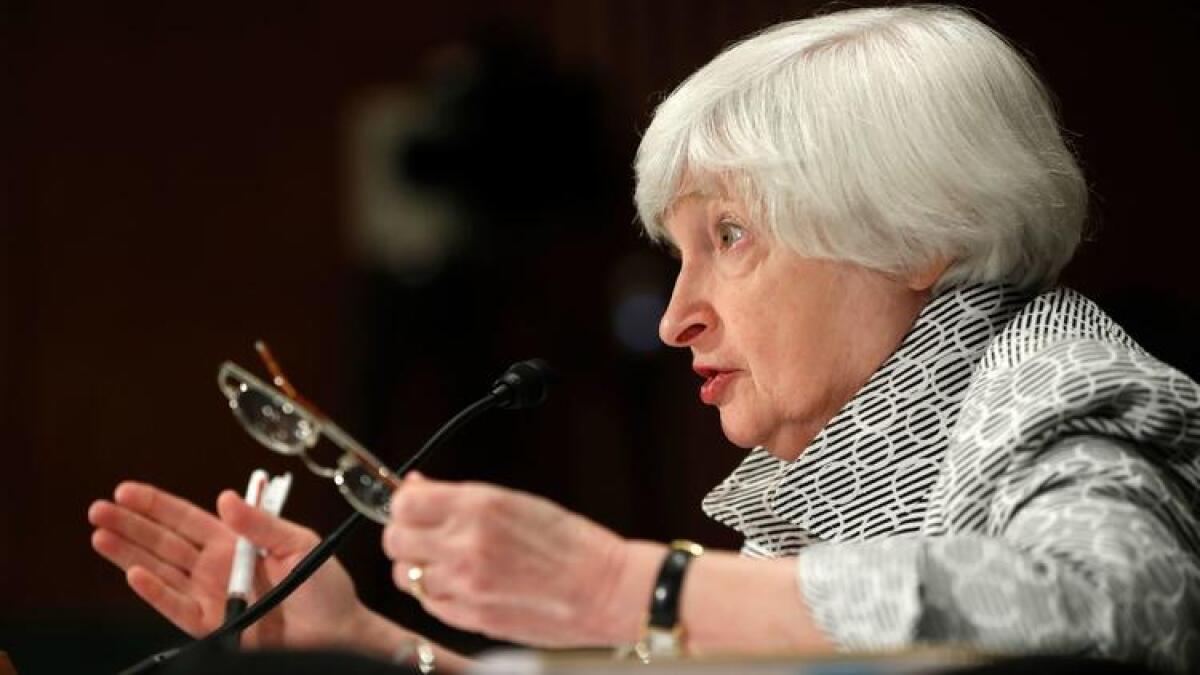
The Federal Reserve announced on Wednesday that it would start slowly reducing the trillions of dollars in bonds it purchased to try to stimulate the economy, another milestone in the central bank’s efforts to return to a normal monetary policy after the Great Recession.
The long-awaited reduction in the Fed’s $4.5-trillion balance sheet comes amid great uncertainty at the central bank. There are several vacancies on the Fed board and there could be a change in leadership early next year if President Trump decides not to renominate Chairwoman Janet L. Yellen.
On top of that, the devastation caused by recent severe hurricanes could make it difficult for Fed policymakers to get a solid read on the economy in the coming weeks as they decide whether to enact another small hike in a key interest rate.
“Hurricanes Harvey, Irma and Maria have devastated many communities, inflicting severe hardship,” Fed officials said in a policy statement Wednesday after a two-day meeting.
“Storm-related disruptions and rebuilding will affect economic activity in the near-term, but past experience suggests that the storms are unlikely to materially alter the course of the national economy over the medium term,” the Fed statement said.
Obama says Republican healthcare plan would inflict ‘real human suffering’
The latest Republican effort to repeal the Affordable Care Act would inflict “real human suffering” on millions of Americans, former President Barack Obama said Wednesday, speaking out in public defense of his signature healthcare reform effort.
The law has led to major increases in the number of Americans with healthcare coverage, Obama said, speaking in New York at an event on global development sponsored by the Bill and Melinda Gates Foundation.
“When I see people trying to undo that hard-won progress for the 50th or 60th time,” he said, “it is aggravating.”
The Republican efforts would make coverage unavailable to cancer survivors, pregnant women, children with asthma and others with existing medical problems, he said, “without any ... common sense rationale.”
“It’s certainly frustrating to have to mobilize every couple months to keep our leaders from inflicting real human suffering on our constituents,” he added. “But typically, that’s how progress is won, and how progress is maintained.”
Comedian skewers Republican Graham-Cassidy healthcare bill as failing to pass the ‘Jimmy Kimmel test’
Late-night comedian Jimmy Kimmel skewered the new Republican healthcare plan, a potentially devastating development as Senate GOP leaders struggle for support ahead of a possible vote next week.
Kimmel waded into the healthcare debate earlier this year when he choked up on TV recounting his newborn son’s heart condition — and the high costs of healthcare that he can pay, but he knows other Americans cannot.
The “Jimmy Kimmel Live” host has become one of the most prominent celebrities to publicly advocate preserving Obamacare’s insurance protections — so much so that Republicans themselves have aspired to meet “the Jimmy Kimmel test.”
It says that patients like the child born with a congenital disease would get the care they need, with no caps on insurance coverage for pre-existing conditions, regardless of costs.
On Monday night, Kimmel said the new bill from Sen. Lindsey Graham (R-S.C.) and Sen. Bill Cassidy (R-La.) — a one-time guest on the show who coined the Kimmel test phrase — failed the standard.
“This new bill actually does pass the Jimmy Kimmel test but a different Jimmy Kimmel test,” the comedian said in his opening monologue.
“With this one, your child with the pre-existing condition will get the care he needs if, and only if, his father is Jimmy Kimmel. ... ,” he said. “Not only did Bill Cassidy fail the Jimmy Kimmel test, he failed the Bill Cassidy test.”
He said: “This guy, Bill Cassidy, just lied to my face.”
The reaction was swift and fierce, especially because Kimmel tweeted the Capitol switchboard number for viewers to call their senators urging a “no” vote.
Democrats and others opposed to the new bill quickly shared the message, ensuring phone lines lit up at Congress.
Cassidy, a medical doctor who has worked tirelessly on the new bill, mounted a vigorous defense Wednesday and said Kimmel was mistaken.
“I am sorry he does not understand,” the senator said on CNN. “Under Graham-Cassidy-Heller-Johnson, more people will have coverage, and we protect those with pre-existing conditions.”
Experts analyzing the just-released bill, which Republicans are trying to pass before a Sept. 30 deadline, say it would more likely cut coverage for millions of Americans.
Under the plan, states that expanded Medicaid coverage for lower-income Americans with Obamacare would see their funding reduced and distributed more evenly with those that did not.
States also would have more leeway to apply for waivers from the kinds of Obamacare protections against spending caps and lifetime limits that were a cornerstone of the Affordable Care Act.
Republicans have not yet secured the 50 votes needed from their slim 52-seat majority for passage.
Key GOP senators who opposed an earlier overhaul — Sen. John McCain (R-Ariz.), Sen. Susan Collins (R-Maine) and Sen. Lisa Murkowski (R-Alaska) — have not said whether they will support the new bill.
Sen. Rand Paul (R-Ky.) has said he will oppose it, and others may join him.
Kimmel’s monologue could prove pivotal in influencing the debate.
An exercise in civil disobedience gets three congressmen arrested in New York
Sitting in the middle of Fifth Avenue got three congressmen hauled away by New York City police on Tuesday afternoon during a demonstration in front of Trump Tower to protest the president’s immigration policy.
Reps. Raúl M. Grijalva (D-Ariz.), Luis V. Gutierrez (D-Ill.) and Adriano Espaillat (D-N.Y.), along with New York City Council Speaker Melissa Mark-Viverito, were among a group of about 10 protesters taken into custody, according to postings on social media.
“We’re making it clear to Trump, GOP & Dems: we will continue peaceful fight for #Dreamers & immigrants as long as it takes,’’ Guiterrez posted on Twitter in explanation of the protests.
Photographs showed the protesters sitting in the middle of the street holding a white banner, as a cordon of police stood above them. Trump was believed to be in Trump Tower after addressing the United Nations earlier in the day.
White House names former NFL player to lead initiative for historically black colleges
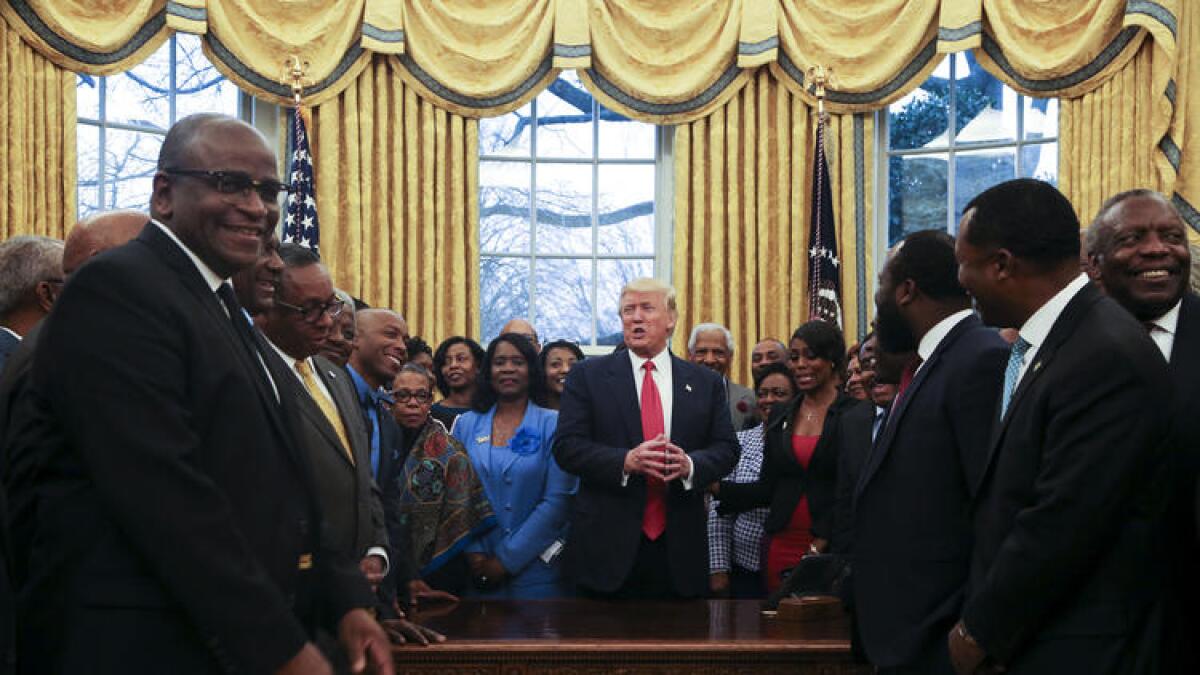
Amid criticism that it hasn’t lived up to its commitment to historically black colleges, the Trump administration has named Johnathan M. Holifield, a former NFL player, author and entrepreneur, to lead a White House initiative on the issue.
Advocates applauded the appointment and said they look forward to working with Holifield, who played for one season with the Cincinnati Bengals, in 1989. But some are still skeptical and called for more substantive changes, particularly a reversal of proposed budget cuts and a greater commitment to Title III of the Higher Education Act, which helps institutions of higher education support low-income students.
Holifield’s appointment was announced Monday at the annual White House conference for presidents and stakeholders at historically black colleges and universities, or HBCUs. Some attendees said they hoped the event would be a first step to more cooperation with the administration.
Trump is all in for GOP healthcare bill; sponsor Graham allies with ‘Darth Vader’ (a.k.a. Steve Bannon) for support
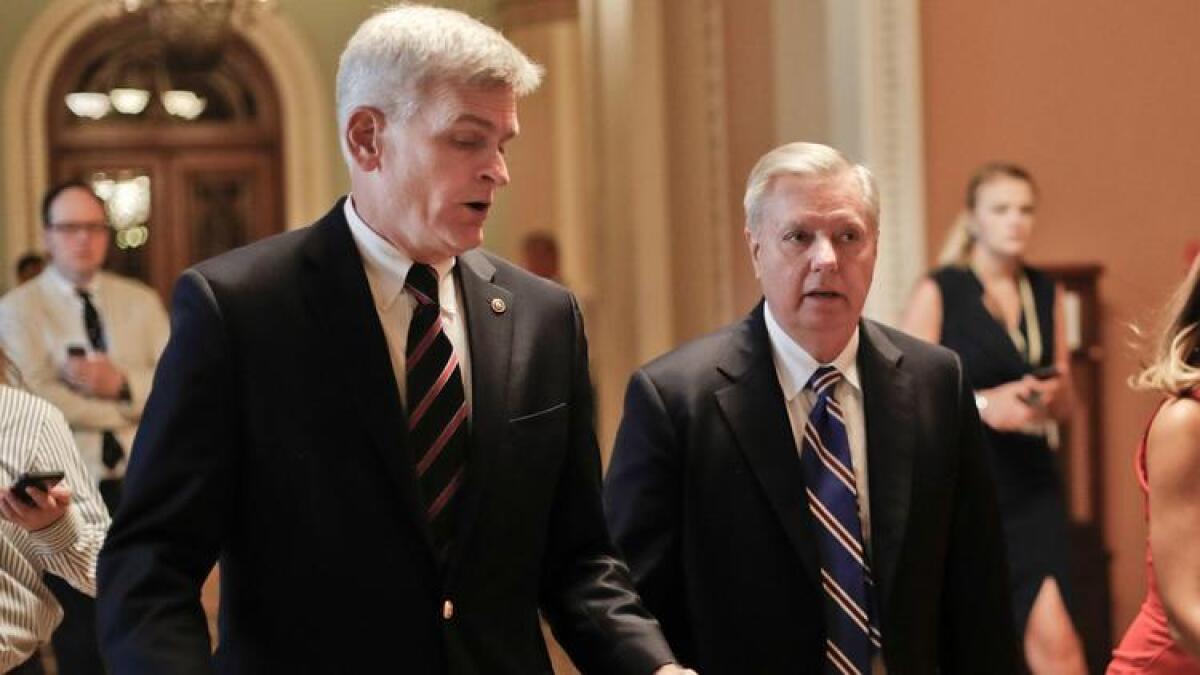
President Trump is making a big push to revive the Republican healthcare overhaul days before a Senate deadline, dispatching Vice President Mike Pence from New York back to Washington on Tuesday to tell GOP senators: “This is the moment.”
Senate Republicans have until Sept. 30 to pass their latest legislation, from Republican Sens. Bill Cassidy of Louisiana and Lindsey Graham of South Carolina, with 50 votes plus Pence as the tie-breaker. On Oct. 1, the start of a new fiscal year, the threshold reverts to 60 votes — an impossible hurdle since there are 52 Republicans and the Democratic caucus is solidly opposed.
They face building pressure from angry conservative activists pushing Republicans to keep their promise to “repeal and replace Obamacare.” But opponents of the bill, including major medical and patient associations, have mobilized against it.
Pence, who was in New York with Trump and other senior administration officials to attend the U.N. General Assembly meeting, returned to the Capitol to tell Republican senators: “Now is the time. We have 12 days,” according to a media pool report from Air Force Two.
Trump and House Speaker Paul D. Ryan, a Wisconsin Republican, both phoned Pence during his flight from New York. Graham told reporters on Pence’s plane that Trump had called him on Monday evening to urge action.
Cassidy and Graham have been working to salvage the party effort for an alternative health insurance program after the spectacular collapse last month of an earlier Republican bill to undo President Obama’s 2010 Affordable Care Act.
Graham said Tuesday he has made an alliance with “Darth Vader” — referring to former Trump advisor Steven K. Bannon — for support to see the bill to passage. Bannon, who was portrayed as the villain on NBC’s “Saturday Night Live,” is back to running the website Breitbart, which is influential among conservatives, after being pushed out of the White House.
“I have got Alan Greenspan, Jeb Bush and Steve Bannon” behind this bill, Graham said. “If anyone can do better, I’d like to meet them.”
Even though some senators have been working separately on bipartisan legislation to improve the Affordable Care Act by stabilizing the health insurance marketplace, Pence planned to tell Republican senators that House Republicans would not support those efforts.
Bipartisan group of governors voice opposition to latest Obamacare repeal effort in Congress
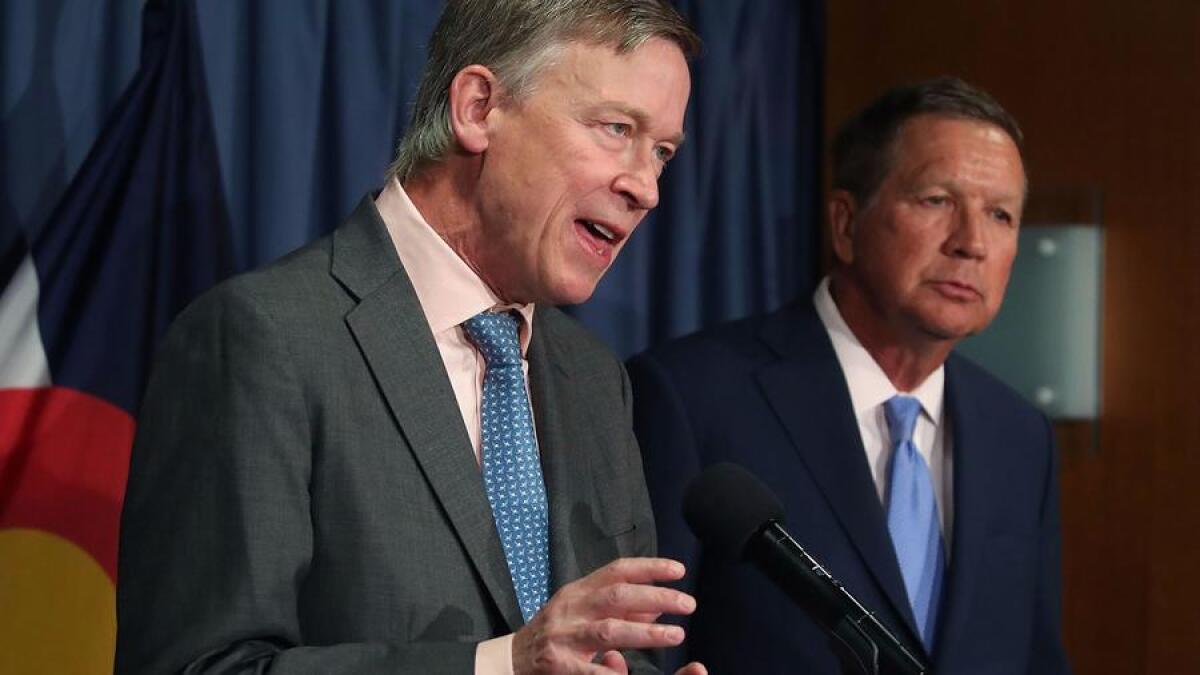
The latest Republican-led effort to repeal the Affordable Care Act has some resistance outside Washington: a bipartisan group of governors.
On Tuesday, nearly a dozen governors, including Bill Walker of Alaska, signed a letter opposing the new repeal legislation sponsored by Sens. Bill Cassidy (R-La.) and Lindsey Graham (R-S.C.) that in recent days has gained momentum in Congress.
The move by Walker could influence his state’s senior senator, Lisa Murkowski, a key vote who has been silent on whether she supports the new legislation. In July, Murkowski, a Republican, voted with Sens. Susan Collins (R-Maine) and John McCain (R-Ariz.), in opposition to the last Obamacare repeal effort.
Walker’s opposition comes a day after Arizona Gov. Doug Ducey said he supports the legislation. (For his part, McCain, who has not said if he supports the new repeal bill, has said his vote would be influenced by Ducey’s position.)
In voicing their opposition, the group, led by Govs. John Hickenlooper (D-Colo.) and John Kasich (R-Ohio), denounced the legislation for being crafted behind closed doors.
“Legislation should receive consideration under regular order, including hearings in health committees and input from the appropriate health-related parties,” the governors wrote in a letter to congressional leaders.
Since the summer the bipartisan group of governors has expressed concerns about deep cuts to Medicaid in their states, which, among other things, helps provide funding for drug addiction treatment.
On Monday, the Congressional Budget Office said that it would not be able to produce a full analysis of the Cassidy-Graham bill, including cuts to Medicaid, for several weeks.
U.S. hasn’t yet seen the need to shoot down North Korean missiles
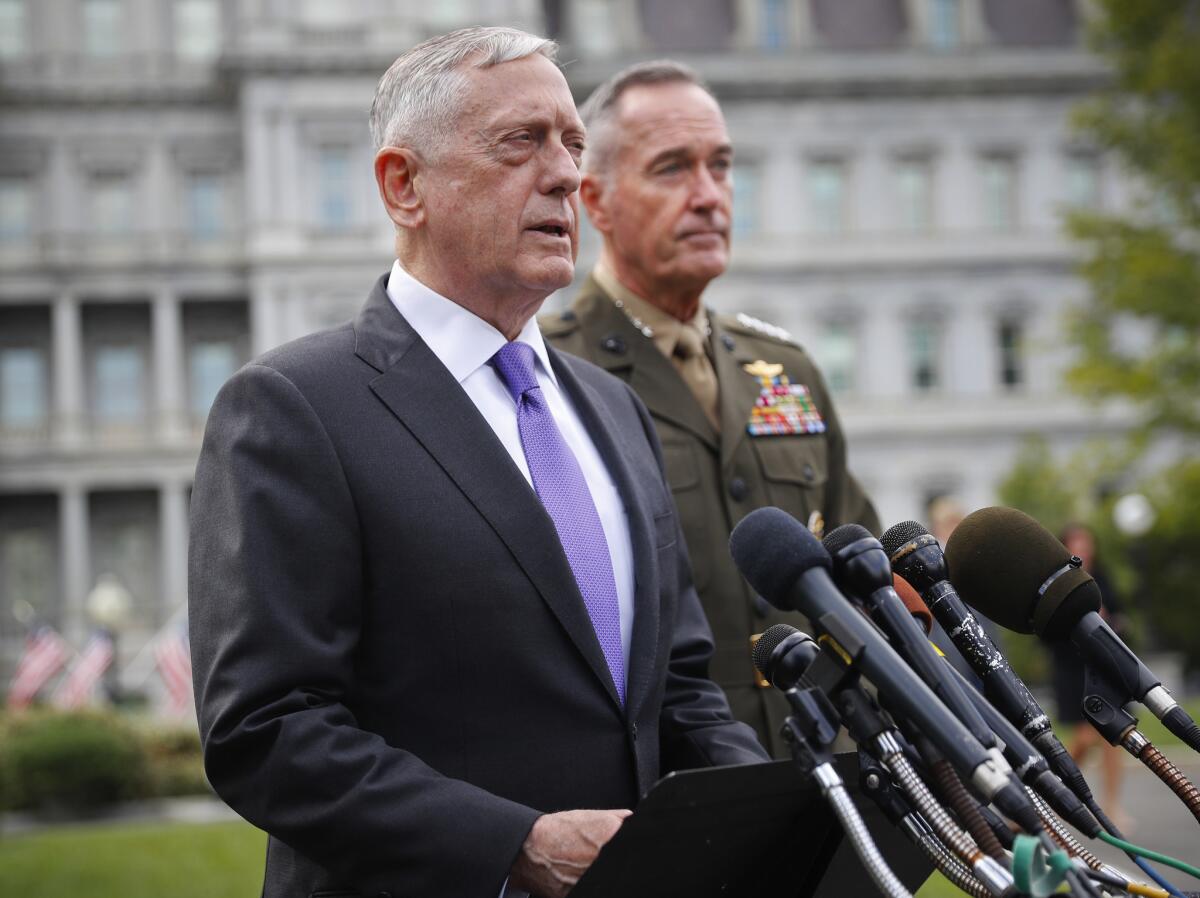
Defense Secretary James N. Mattis said Monday that the U.S. military has not attempted to shoot down ballistic missiles test-launched by North Korea because they have not been on a trajectory to hit U.S. or allies’ territory.
The comments come after the underground test of a nuclear bomb earlier this month and days after North Korea launched its second missile in less than a month that flew over northern Japan.
The intermediate-range missile was launched Friday near the isolated nation’s capital, Pyongyang, soaring for about 2,300 miles before splashing down in the Pacific Ocean. The test demonstrated that the U.S. territory of Guam is now in attack range.
Mattis said these launches are testing the U.S. military to see how much North Korea can get away with before triggering a response.
“They are intentionally doing provocations that seem to press against the envelope to see how far they can push without going over some kind of line in their minds that would make them vulnerable,” he told reporters at the Pentagon.
“The bottom line is: The missiles, were they to be a threat – whether it be to U.S. territory, Guam, [or] obviously Japan’s territory -- that would elicit a different response from us,” he said.
The U.S., Japan and South Korea have missile defense systems surrounding North Korea, including at sea. Analysts have stressed that knocking a missile out of the sky with interceptors is difficult and has been often been described as “hitting a bullet with a bullet.”
North Korea has conducted 15 missile tests in 2017 and more than 60 since Kim Jong Un took power in 2011.
Thus far, U.S. response to the launches has been sanctions, which have largely cut off Pyongyang from the rest of the world economy, and “show of force” exercises.
On Sunday, U.S. Air Force flew B-1 bombers and F-35 stealth fighter jets over the Korean Peninsula, along with allied fighter jets from South Korea and Japan.
Trump returns to New York, guarded by police cars, helicopters and garbage trucks

A motorcade arrives at Trump Tower in New York ahead of the United Nations General Assembly. (Barbara Demick / Los Angeles Times)
New Yorkers generally hate the week of the U.N. General Assembly, when heads of state from around the world gather in the city, snarling traffic and inconveniencing those who actually live here.
This year it means the return of New York’s not-so-favorite local son, President Trump, who received just 18% of the vote in his hometown. Police have started barricading a vast swath of Midtown, stretching from the United Nations headquarters to Trump Tower, which is about 15 blocks away on Fifth Avenue.
The building, where Trump maintains a triplex penthouse, was surrounded Sunday by police cars -- and strangely, an effective if low-tech barricade of New York City garbage trucks. Helicopters whirred overhead as a motorcade arrived.
This will be Trump’s third and probably longest trip home since his inauguration. The last two times Trump visited the city, he was greeted by large crowds of protesters with signs reading, “New York Hates You.” This trip is unlikely to be much friendlier.
The New York Police Department and Secret Service would not answer questions about the number of personnel providing security for the visit or the costs involved. Trump has said previously that he avoids coming home because of the security costs.
He arrived Sunday from Bedminster, N.J., where he has a weekend home at one of his golf clubs.
Iran’s supreme leader warns U.S. against making a ‘wrong move’ on the nuclear deal
Supreme Leader Ayatollah Ali Khamenei warned Sunday that Iran would respond strongly to “any wrong move” by the United States on the multilateral nuclear deal struck in 2015.
President Trump has threatened to declare Iran in violation of the landmark agreement next month, which could pave the way for additional U.S. economic sanctions against the Islamic Republic.
Iranian leaders have accused Trump of trying to sabotage the deal in which Iran agreed to shelve its nuclear program in exchange for relief from international sanctions.
“Every day they [American officials] play a new trick or expose a new side of their viciousness,” Khamenei said at a graduation ceremony at a police academy, Mehr News reported.
The ongoing war of words comes as world leaders prepare to gather at the United Nations this week. The U.N. nuclear watchdog has said Iran has met its obligations under the nuclear agreement and is cooperating with international inspectors.
The Trump administration has sent mixed signals on the nuclear agreement, which Trump once called “the worst deal ever.”
Last week, Trump effectively endorsed the deal by extending one of its terms, a waiver on certain U.S. sanctions against Iran. But he also accused Iran of violating “the spirit of the deal” and renewed a threat to declare that Iran was not complying with its terms, a move that would give Congress 60 days to decide whether to reimpose sanctions.
“They have violated so many different elements, but they’ve also violated the spirit of that deal,” Trump said last week. “And you will see what we’ll be doing in October. It will be very evident.”
Trump administration officials have argued that Iran must allow U.N. inspectors access to military sites, but Iranian leaders have rejected the idea, saying it would violate their country’s sovereignty.
On Friday, firebrand cleric Ahmad Khatami said in the closely watched weekly sermon at Tehran University that “nowhere in the text…of the [nuclear deal] is it mentioned that military sites can be inspected.”
Tillerson: U.S. may close embassy in Cuba after mysterious sonic attacks
The Trump administration is considering closing down the U.S. Embassy in Cuba after nearly two dozen American diplomatic staffers or family members suffered health effects that were blamed on suspected sonic attacks, Secretary of State Rex Tillerson said Sunday.
“We have it under evaluation,” Tillerson said in an interview aired on CBS’ “Face the Nation,” when asked about calls by some GOP lawmakers to shutter the embassy in Havana. “It’s under review.”
An embassy shutdown would mark an abrupt reversal of the warming ties between the two nations since diplomatic relations were restored in 2015. President Trump has criticized the diplomatic opening, but he has not moved to break ties again.
Tillerson called the health problems stemming from the apparent sonic attacks “a very serious issue with respect to the harm that certain individuals have suffered,” adding: “We’ve brought some of those people home.”
Those health effects have reportedly included hearing loss, nausea, headaches and ringing of the ears.
Five Republican senators have urged Tillerson to shut down the U.S. embassy and expel all Cuban diplomats from the United States unless the Havana government takes “tangible action.”
Two Cuban diplomats stationed in Washington have already been expelled in response to the attacks, which only recently came to light after having gone on for months.
The Havana government has repeatedly denied any responsibility for the attacks, which also have affected the Canadian embassy in Havana.
Haley: Trump didn’t intend to harm British bombing investigation
The U.S. ambassador to the United Nations, Nikki Haley, said President Trump was “upset and passionate” about last week’s subway bombing in London when he tweeted shortly after the attack about a “loser terrorist” who had been “in the sights of Scotland Yard.”
Haley, in an interview that aired Sunday on ABC’s “This Week,” said the president had not intended to hinder British authorities in their response to the bombing by seemingly disclosing that an attacker or attackers had previously come to the attention of the Metropolitan Police.
“Look, the president would not want to do any harm to the investigation – let’s be clear,” Haley said. “There was no ill intent.”
Trump has previously tweeted out controversial statements about other terrorist attacks in the United Kingdom. He stirred indignation among many Londoners by attacking the city’s mayor, Sadiq Khan, after a June attack in London’s Borough Market that left seven dead.
Critics said Trump seized upon an attempt by Khan to calm the public about a stepped-up police deployment, using an out-of-context quote to imply that the mayor had said the attack – rather than the visible armed police presence in its aftermath – was no cause for alarm.
After a bombing in May at an Ariana Grande concert in the northern city of Manchester that left 22 people dead, British authorities were infuriated by a leak of important intelligence that had been shared by them with U.S. officials, as is customary between the two close allies.
Asked about Trump’s comments on the latest attack, British Prime Minister Theresa May, in an interview that was pre-taped and aired separately on ABC, declined to directly criticize the president. But she said: “I don’t think it’s helpful for anyone to speculate on what it an ongoing investigation.”
The rush-hour bombing on Friday at the Parsons Green station and a subsequent stampede left 30 people injured, British officials said. The National Health Service said all but one of those hurt had been released from the hospital.
British officials said Sunday that a second man, age 21, had been arrested late Saturday in West London in connection with the attack, but provided few details. Earlier, an 18-year-old man was arrested at the port of Dover, from which ferries depart for continental Europe.
Trump retweets meme of him hitting Hillary Clinton with golf ball, knocking her down
In the latest instance of President Trump seeming to revel in the notion of physical attacks against perceived enemies, the president retweeted an animated GIF showing him hitting a golf ball that then knocks down his onetime rival Hillary Clinton.
Critics swiftly responded. Rep. Adam Schiff (D-Burbank), appearing on ABC’s “This Week, said: “It’s distressing to have a president that frankly will tweet and retweet things as juvenile as that.”
The original tweet, from a user whose Twitter handle consists of an expletive, was sent last week and retweeted Sunday by the president, who is spending the weekend at his New Jersey golf property. Here is what he retweeted:
A former Trump campaign strategist, David Urban, brushed aside the controversy. “Retweets do not equal endorsements,” he said on CNN’s “State of the Union,” leading to a sharp exchange.
The president has previously taken to Twitter to retweet animations including one that depicted him pummeling a figure with a CNN logo superimposed on his head. Another presidential Twitter share last month – later deleted – showed a train hitting a person, again with a CNN logo imposed on the figure’s head.
Trump associates have previously dismissed criticism of such retweets, suggesting they were intended to be humorous.
Clinton is out with a new book about the campaign, and Trump has repeatedly used Twitter to deride her as a sore loser.
In the first part of the animation Trump retweeted on Sunday, the president is seen in golf attire, teeing off. The second shows footage of Clinton tripping as she boards a plane, with the video altered to show her being struck in the back with a golf ball.
The tweet refers to “Donald Trump’s amazing golf swing” and uses the hashtag #CrookedHillary, the then-candidate’s most-used epithet for his Democratic opponent.
Trump derides North Korea’s leader as ‘Rocket Man’
With tensions running high over North Korea, President Trump on Sunday mocked its mercurial leader, Kim Jong Un, referring to him as “Rocket Man.”
Trump, who is spending the weekend at his New Jersey golf property, said on Twitter that he had spoken Saturday evening with South Korea’s president, Moon Jae-in, and that the two had discussed Pyongyang’s latest actions, including the firing of two missiles that overflew Japan and a test detonation of the North’s most powerful nuclear device yet.
The White House was more circumspect in a readout of the call, saying that in their conversation, Trump and Moon had “committed to continuing to take steps to strengthen deterrence and defense capabilities.”
Meanwhile, national security advisor H.R. McMaster said on ABC’s “This Week” that Trump was determined to contain the threat posed by North Korea. Of Kim, he said: “He is going to have to give up his nuclear weapons, because the president has said that he is not going to tolerate this regime threatening the United States and our citizens with a nuclear weapon.”
Asked whether that meant Trump was contemplating a strike against North Korea, McMaster said: “He’s been very clear about that – that all options are on the table.”
Secretary of State Rex Tillerson, however, emphasized that military action would be a last resort. Interviewed on CBS’ “Face the Nation,” he said the Trump administration’s strategy centered on a “peaceful pressure campaign” against Kim’s government.
“If our diplomatic efforts fail, though, our military option will be the only one left,” Tillerson said.
North Korea is expected to be a major topic as the United Nations General Assembly holds its annual session this week.
White House may reverse itself on withdrawing from Paris climate deal
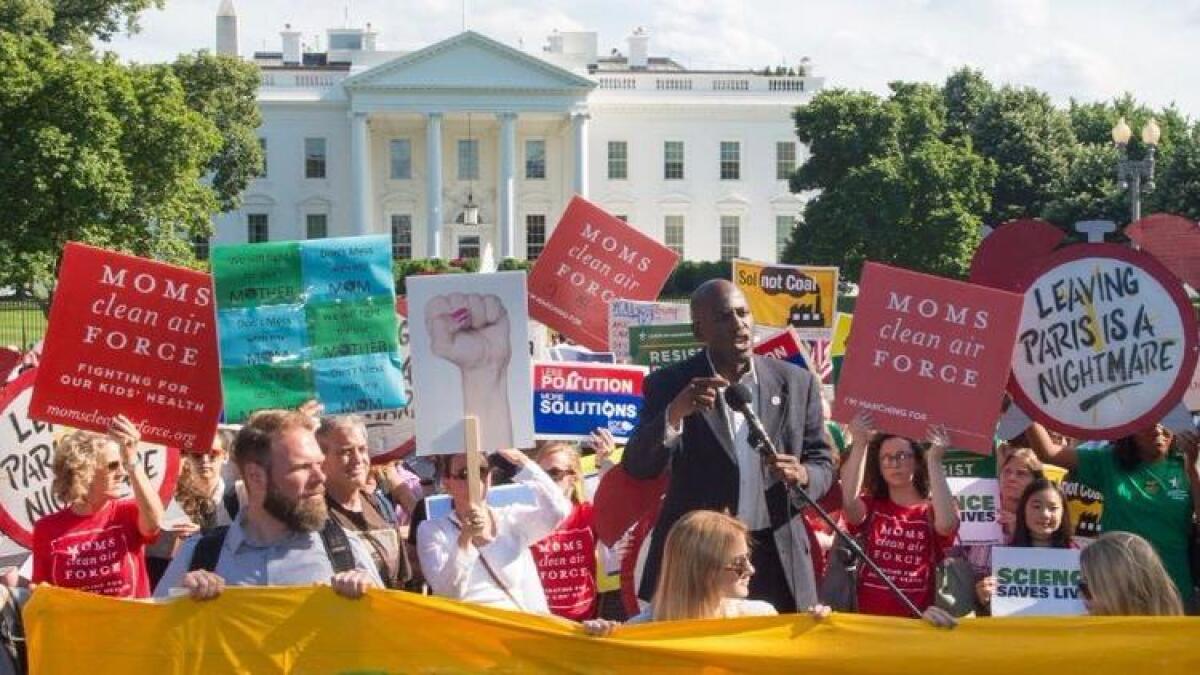
A European official said Saturday the Trump administration has softened its stance on the landmark Paris climate accord and may not completely withdraw after all.
If true, this would mark yet another reversal of a Trump campaign promise, one of the most controversial.
But the White House quickly attempted to rebut the report.
“There has been no change in the United States’ position on the Paris agreement,” said Lindsay Walters, a presidential spokeswoman. “As the president has made abundantly clear, the United States is withdrawing unless we can re-enter on terms that are more favorable to our country.”
At a ministerial summit in Montreal, where the United States participated as an observer, the European Union’s top climate official said the administration had backed away from its announcement in June that it was walking out of the historic 2015 agreement.
The U.S. “stated that they will not renegotiate the Paris accord, but they try to review the terms on which they could be engaged under this agreement,” Miguel Arias Canete said.
It was not immediately clear how far that statement would go. Trump, when announcing his decision to withdraw, was adamant about the U.S. ignoring goals on limiting greenhouse-gas emissions and other elements believed to contribute to global warming.
At the time, it was seen as another abrogation of the United States’ preeminent role as a global leader.
But Trump argued the deal was bad for U.S. businesses and that it made Washington foot too much of the bill.
Global warming is an issue with renewed political currency after Hurricane Harvey left epic floods in Houston and the Gulf Coast and Hurricane Irma devastated parts of the Caribbean and left millions in Florida without power. Scientists say warmer waters may have intensified the force of the storms.
Popular priest’s speech at Catholic University is canceled because of protests over his support for gays
Catholic University of America has abruptly canceled a speech by a well-known, popular Jesuit priest because of protests over his support for gay and lesbian Catholics.
Father James Martin, at-large editor of the Jesuit-run America magazine and an oft-quoted commentator on Catholic affairs, was scheduled to speak at an alumni event at the university’s Theological College on Oct. 4.
The college, based in Washington, revoked the invitation following protests from conservative Catholic groups over Martin’s new book, “Building a Bridge: How the Catholic Church and the LGBT Community Can Enter into a Relationship of Respect, Compassion, and Sensitivity.”
In it, the prolific author advocates for acceptance of and dialogue with gays and lesbians.
Conservatives mounted what the university called a social-media campaign against Martin and his appearance at the school.
Father John Zuhlsdorf, who runs a blog called Father Z, repeatedly labeled Martin a “homosexualist activist” and called for Catholic institutions not to host him.
Martin has said he was planning a lecture on Jesus and his teachings, not on gay Catholics or on his book.
University President John Garvey said the school was not in agreement with the Theological College’s decision.
“Universities and their related entities should be places for the free, civil exchange of ideas,” Garvey said in a statement posted on the university’s website. “Our culture is increasingly hostile to this idea.”
Jesuits often represent the more progressive ranks of the Roman Catholic Church. Pope Francis, though socially conservative, is a Jesuit -- the first ever to be selected pontiff -- and has also advocated a more tolerant position toward gays.
Francis recently named Martin as a consultant to the Vatican’s communications department.
Dealing with Democrats? Protecting ‘Dreamers’? That’s just fine with these Trump supporters
Donald Trump’s tough talk on illegal immigration was a big part of the reason Dave Hagstrom and many others in this booming Phoenix suburb supported him for president. “Walls make good neighbors,” Hagstrom said.
So when the president moved this week to cut a deal — with Democrats no less — to block the expulsion of 800,000 immigrants brought to the U.S. illegally as children, was Hagstrom disappointed?
Not at all.
“If you were to deport them, where would they go?” Hagstrom, 60, a car-warranty manager, asked on his way to a Bible-study dinner at an upscale shopping mall. “To send them across the border would be inhumane almost. There’s no life for them there.”
Trump and Democrats are gambling on each other, and hoping their core supporters will trust them to cut deals
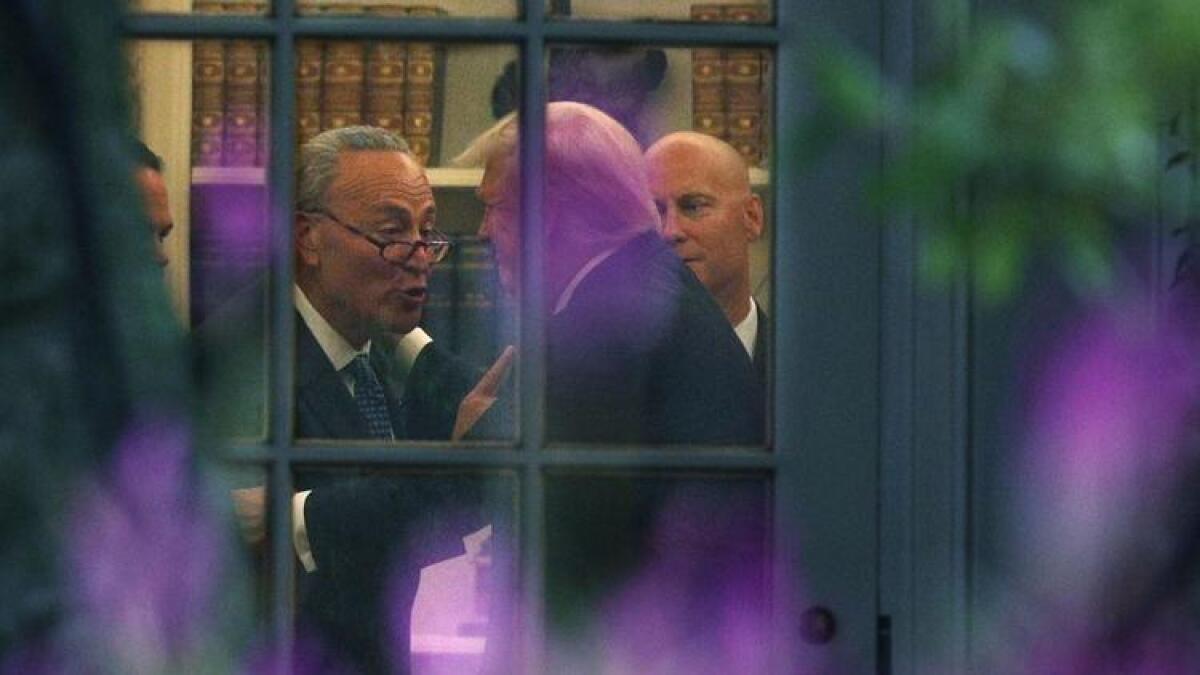
President Trump, with his second deal in as many weeks with Democratic leaders, has upended the political calculations of both of their parties: Many Republicans are left fuming of his betrayal, while some Democrats have begun cautioning party leaders against getting too cozy with a president they’ve vowed to resist.
Trump is betting that he can play the two sides against each other and finally notch some legislative achievements, in turn reassuring centrists and improving his dismal poll ratings. The risk, as the president’s nationalist allies already are warning, is that Trump will alienate some among his loyalists even as his opponents remain resolutely hostile, and he sinks further.
With the latest deal, Trump could not have chosen an issue more likely to test his core supporters. After winning election on an anti-immigration platform, he has agreed with Democrats to seek a law protecting from deportation roughly 800,000 young immigrants brought to the country illegally as children — a group of whom he formerly said flatly, “They have to go.”
Trump says travel ban ‘should be far larger’
President Trump signaled he would like his controversial travel ban expanded, writing on Twitter on Friday that his ban on travelers from several Muslim-majority countries “should be far larger, tougher and more specific” but complaining that enlarging it would not be “politically correct.”
Trump wrote the tweet in response to news of an explosion in London on an underground train during morning rush hour. British authorities said they were treating the incident as a terrorist act.
Trump went further than British officials and said the perpetrators were “in the sights” of Scotland Yard investigators before the attack. There is no public evidence to support this claim.
In what seemed to be a response to Trump’s tweet, London Metropolitan Police said in a statement, “any speculation is extremely unhelpful at this time.”
Later Friday morning Trump called the London attack “a terrible thing,” while he was in the Rose Garden watching an 11-year-old boy from Falls Church, Va., mow the White House lawn.
“It keeps going and going, and we have to be very smart and we have to be very, very tough—perhaps we’re not nearly tough enough,” he said in response to a question from a reporter.
Trump said he had been briefed on the London attack, and said he had been told about “new risks of things happening.”
Trump has a chance to widen the travel ban later this month.
The 90-day ban is set to expire on Sept. 24, and Department of Homeland Security officials are considering whether to expand the ban to other countries, keep it the same, or take countries off the list.
Trump administration officials are also reviewing what new vetting procedures for travelers should be put into place, including requiring visa applicants from some countries to submit to checks of their social media accounts. Trump has called similar procedures “extreme vetting.”
Currently, foreign nationals are banned from six countries — Iran, Syria, Sudan, Somalia, Libya and Yemen. Iraq was dropped from the banned countries list in March in exchange for accepting Iraqi nationals being deported from the U.S.
Refugees without close ties to the U.S. are also barred entry until Oct. 24 under the ban.
Trump administration officials issued a revised travel ban in March that was designed to resolve the legal problems that had led to Trump’s original order being blocked in January. The Supreme Court is set to hear a challenge next month of the revised ban.
Trump throws a wrench into any immigration deal, saying ‘chain migration’ can’t be included
Just over a day after agreeing with Democratic leaders to make an immigration deal, President Trump on Friday took a hard line against allowing close family members to follow new immigrants, a position that could stymie bipartisan legislation.
Trump wrote on Twitter that any immigration bill cannot include “chain migration,” a term used by advocates of limiting immigrants to criticize how new U.S. citizens can sponsor family members for legal status.
If Trump sticks to that position, it could sap Democrats’ support for Wednesday’s tentative agreement between Trump and the top two Democrats in Congress to seek a law giving legal status to roughly 800,000 so-called Dreamers. Those are mostly young people brought to the country illegally as children.
Immigration hardliners, including in the White House, are concerned that a law might allow beneficiaries to eventually become U.S. citizens, and they in turn would sponsor their parents and close relatives for lawful permanent residence, enlarging the number of legal immigrants in the country.
The surprise maneuvering follows Trump’s announcement last week that he would phase out Dreamers’ protection from deportation under the five-year-old Obama administration program known as DACA -- for Deferred Action for Childhood Arrivals. The program allows them to work and attend college after a federal background check. Beneficiaries’ two-year work permits and deportation deferrals will begin expiring in March if Congress doesn’t act.
A significant majority of Americans, including many Republicans, support and sympathize with the group, and Trump immediately sought to allay the impact of his order, reflecting a campaign promise, to end DACA.
Trump came to an agreement over dinner Wednesday night with House Minority Leader Nancy Pelosi and Senate Minority Leader Charles E. Schumer to write those DACA protections into law in exchange for increased spending on border security, though not for his promised southern wall.
Trump campaigned on cracking down on illegal immigration, ending DACA, as well as reducing legal immigration. He now faces intense pressure from his core supporters, some of whom contend he is backing off those promises.
Trump revives his controversial claim equating white supremacists and anti-racism protesters in Charlottesville clashes
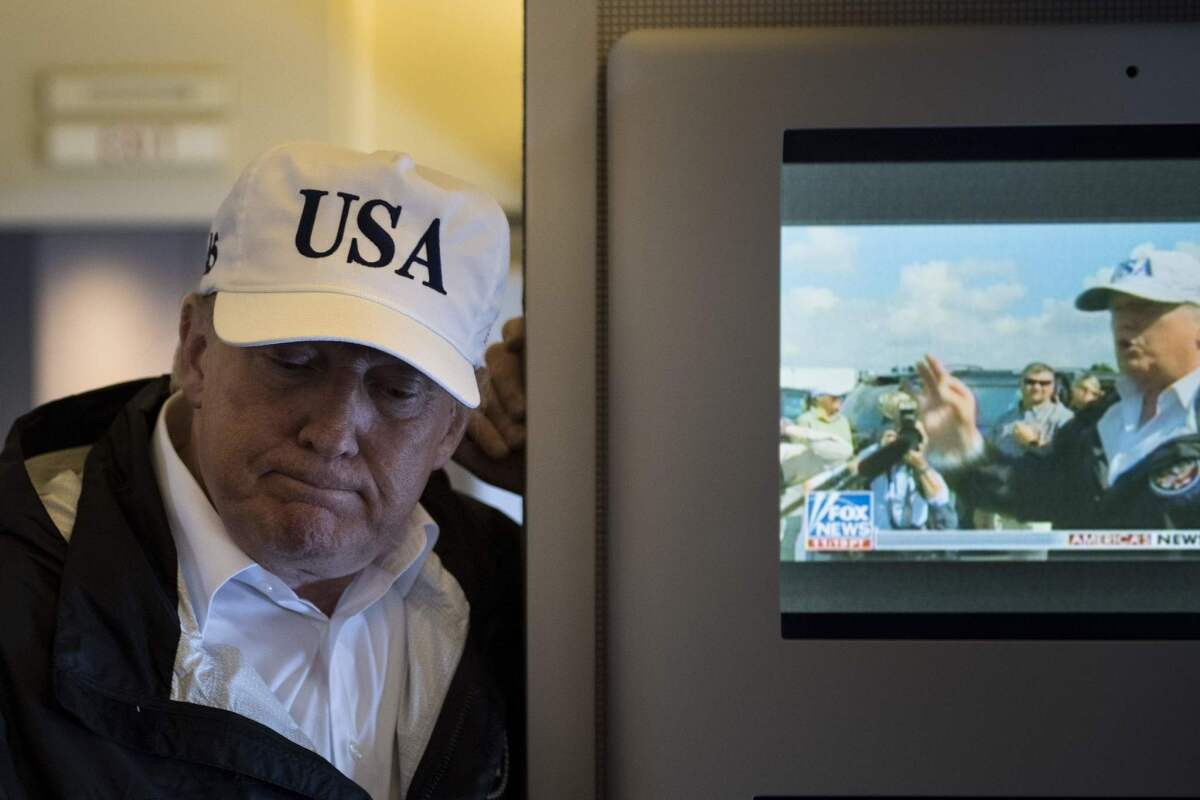
President Trump on Thursday renewed his widely condemned claim that people protesting white supremacists in Charlottesville, Va., last month shared equal blame for the violence with the neo-Nazi groups who rallied there against the town’s removal of a Confederate statue.
There are some “pretty bad dudes on the other side also,” Trump told reporters on Air Force One, referring to anti-fascist demonstrators who faced-off with white supremacists.
Trump’s revival of the controversy was all the more surprising given his context: He was describing his meeting at the White House on Wednesday with Sen. Tim Scott of South Carolina, the Senate’s only black Republican, who confronted the president about his post-Charlottesville remarks.
Scott, recounting his remarks to the president, said he disputed any such comparison equating neo-Nazis and anti-racism protesters and reviewed the brutal history of the white supremacist movement in the United States.
Scott’s message didn’t seem to have sunk in with the president, who mentioned to reporters the anti-fascist movement known as “antifa.” Some of its demonstrators have been violent.
“Especially in light of the advent of antifa, if you look at what’s going on there, you know, you have some pretty bad dudes on the other side also,” Trump said.
He added, “You look at really what’s happened since Charlottesville — a lot of people are saying, in fact a lot of people have actually written, ‘Gee, Trump might have point.’ ”
Not Scott.
He reacted to Trump’s latest remarks on Charlottesville by rebuking the president in a prepared statement: “Antifa is bad and should be condemned, yes, but white supremacists have been killing and tormenting black Americans for centuries. There’s no realistic comparison. Period.”
After the Aug. 11 and 12 protests in Charlottesville, Trump’s statements shifted widely between suggesting a moral equivalency between both sides and belatedly condemning the neo-Nazis, who marched through Charlottesville with torches and assault rifles. One anti-racism protester was killed, and 19 were injured when a car driven by an alleged white supremacist plowed into a crowd of the counter-protesters.
Trump said he had a “great talk” with Scott, who also urged him to add high-ranking African Americans to his staff.
The White House released a photo of the two men talking in the Oval Office, but its statement mistakenly identified the senator as “Tom” -- prompting much derision in social media.
‘There for you 100%,’ Trump tells Floridians; elderly plight in spotlight after nursing home deaths
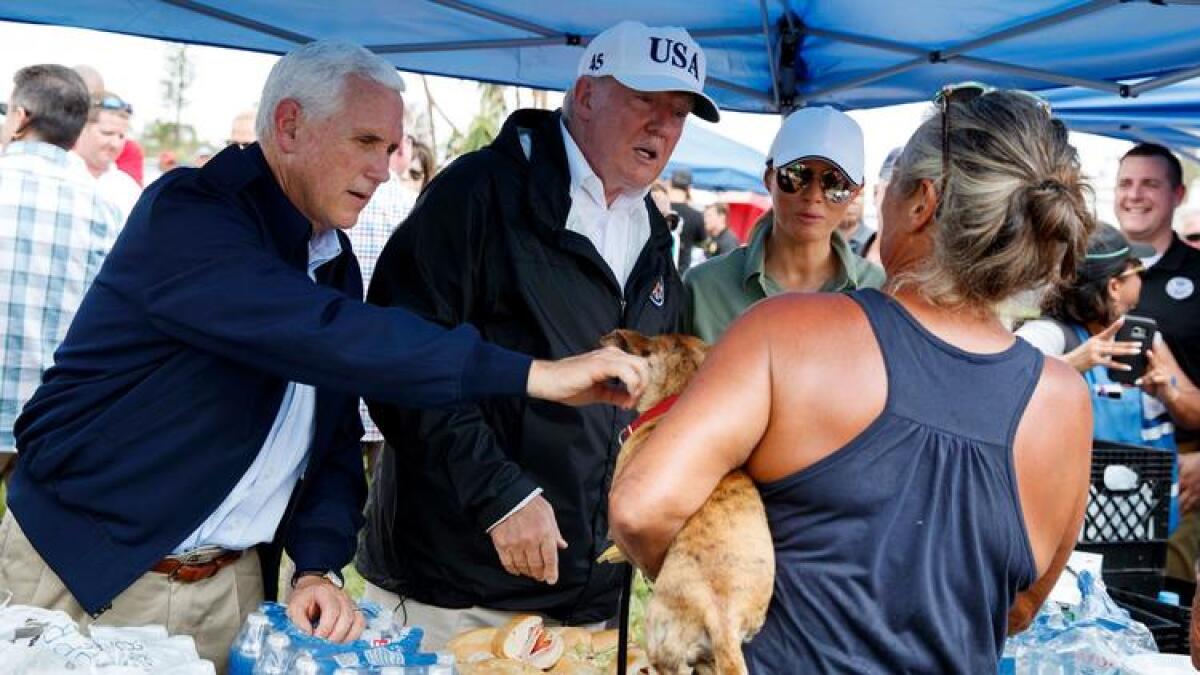
President Trump told Florida hurricane victims his administration is “there for you 100%” as officials moved urgently to safeguard the state’s vulnerable elderly and restore power to millions of homes and businesses still without electricity.
The president and First Lady Melania Trump arrived aboard Air Force One in Fort Myers on the peninsula’s southwestern Gulf coast, then traveled by helicopter to Naples, 40 miles away. It was Trump’s third disaster-zone visit in less than three weeks.
In a Naples mobile home park, not far from where then-Hurricane Irma made its second landfall in Florida, Trump shook hands with residents, quizzed people about how they were faring and joined volunteers serving lunch.
“We love the people of Florida,” he said, pledging that he would be back to monitor recovery progress. “We are there for you 100% … These are special, special people.”
As much remains up in the air over DACA deal, Trump faces scorn from some on far right
In the last day, President Trump has alienated many conservatives — including some of his most prominent supporters — by working with Democrats and sowing confusion about where he stands on illegal immigration.
Throughout the campaign, Trump energized his base with promises that he would build a massive wall along the U.S.-Mexico border and that Mexico would pay for it.
This month, he delighted his most ardent backers by announcing that he was canceling the Deferred Action for Childhood Arrivals program, or DACA, which was created by President Obama and gives legal residence to 800,000 young people — known as “Dreamers” — who were brought to the U.S. illegally as children.
But on Wednesday night, Democrats announced they had made a deal with Trump to protect the Dreamers and improve border security without building the wall.
Trump has yet to make clear exactly where he stands. But some big-name conservatives are already weighing in.
Publications on the right were no kinder to the president. Two headlines capture the mood:
Deal or no deal for Trump on DACA – who knows? (Weekly Standard)
“For a Republican president with majorities in both houses of Congress who ran on building a border wall and repealing ‘Obama’s executive amnesty,’ there seems to be little policy upside to the burgeoning deal,” Michael Warren writes. “For a goal prized by Democrats — enshrining the Obama-era protections for these illegal immigrants — Trump and Republicans got little of what they wanted. How did this happen?”
No amnesty is a good amnesty (Breitbart)
“President Trump is the last president who will ever have a chance to make the right decision on immigration,” writes the conservative columnist Ann Coulter, who staunchly opposes DACA and has expressed deep disappointment in the president she once backed. “But if he fails, Donald Trump will go down in history as the man who killed America.”
A week after Mexico’s magnitude 8.1 earthquake, Trump calls to send condolences
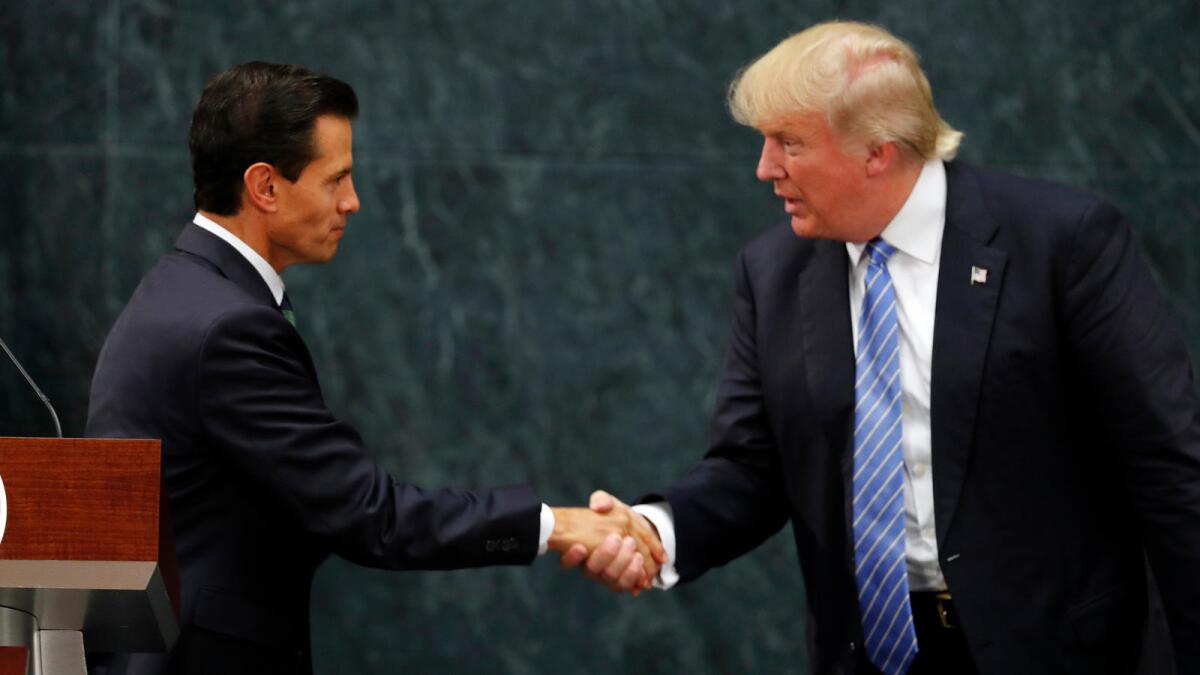
President Trump called Mexican President Enrique Peña Nieto on Thursday to offer condolences for last week’s magnitude 8.1 earthquake, which toppled hundreds of buildings and killed dozens of people in southern Mexico.
Speaking to reporters on Air Force One after surveying damage from Hurricane Irma in Florida, Trump said he had just “had a good talk” with the Mexican leader.
Trump said it had been “impossible to reach” Peña Nieto for days because the Mexican president was in a remote part of the country with a bad phone connection.
Trump’s weeklong delay in acknowledging the earthquake or sending condolences had angered many in Mexico, who hold the U.S. president in low esteem after his repeated attacks on their nation.
On Twitter on Thursday, many mocked Trump’s explanation that Peña Nieto had been difficult to reach.
Peña Nieto has traveled multiple times in recent days to the states of Oaxaca and Chiapas, where the earthquake damage was worst. But he also spent considerable time in Mexico City, including on Wednesday, when he presided over a military event.
In a statement, Peña Nieto’s office said he and Trump had a productive conversation.
It said Peña Nieto stressed the importance of finding a permanent solution for the 700,000 or so beneficiaries of the Deferred Action for Childhood Arrivals program, which protects from deportation immigrants who have been living in the U.S. illegally since they were children.
Trump announced last week that he was ending the program. But he has said in recent days that he hopes to work with Congress to pass a law that would protect so-called Dreamers.
“President Trump was optimistic that the U.S. Congress would reach a solution for the young people who are now covered by this program,” Peña Nieto’s office said.
Tillerson skeptical about Iran nuclear deal, North Korea sanctions
Secretary of State Rex Tillerson added his voice Thursday to Trump administration skepticism of the nuclear disarmament deal with Iran, a month ahead of a congressional deadline for the White House to certify Tehran’s compliance.
The administration separately extended waivers on economic sanctions against Iran, in keeping with another deadline. That means key sanctions that were lifted in exchange for Iran’s agreement to give up its nuclear program remain suspended.
Iran has met its obligations so far under the 2015 accord, according to the latest report from the International Atomic Energy Agency, the United Nations watchdog agency assigned to monitor the deal.
But the White House has hinted strongly that President Trump won’t certify to Congress next month that Iran is in compliance, as a U.S. law requires.
It’s not entirely clear what would happen at that point, and whether the U.S. would seek to withdraw from the accord. Doing so could allow Tehran to restart its nuclear development, which was blocked by the deal.
Trump reiterated his opposition to the Obama-era deal Thursday aboard Air Force One after he had toured hurricane damage in Florida.
“The Iran deal is one of the worst deals I’ve ever seen,” Trump told reporters. “We are not going to stand for what they’re doing to this country. They have violated so many different elements, but they’ve also violated the spirit of that deal.”
Tillerson, speaking to reporters in London, said no decision had been made. But he said he believed Iran was violating the spirit of the accord by continuing to foment terrorism and instability in the Middle East.
“President Trump has made it clear: We must take into account the totality of Iranian threats, not just Iran’s nuclear capabilities,” Tillerson said.
“In our view, Iran is clearly in default of the expectations” laid out in the agreement that calls for it to be an agent of stability, he said.
The deal, which was brokered by the U.S. and five other world powers, only addresses Iran’s nuclear threat and does not deal with terrorism or other activities.
After the deal was signed, the Obama administration added sanctions on Iran’s ballistic missile program and its support for terrorist groups, and the Trump administration has added to those.
The Treasury Department on Thursday, for example, blacklisted 11 Iranian individuals and entities for aiding the Islamic Revolutionary Guard Corps in production of ballistic missiles or for participating in “malicious cyber-enabled” crimes.
Tillerson also said he agreed with Trump that the latest U.N. Security Council sanctions on North Korea, which the United States supported, were still too weak.
“We had hoped for a much stronger resolution,” he said.
The administration had sought a full U.N. embargo on oil exports to North Korea, among other harsh measures, but China made clear it disagreed.
Tillerson said the provision was aimed exclusively at China because it supplies neighboring North Korea with most of its oil, as well as most of its trade.
To avoid a Chinese veto, U.S. Ambassador Nikki Haley agreed to soften the resolution to reduce oil exports to Pyongyang but not cut them off completely.
Tillerson said he hoped Beijing would decide “on their own to take it up upon themselves to use that very powerful tool of oil supply to persuade North Korea to reconsider” its development of nuclear weapons and its approach to negotiations.
“That is a very powerful tool that has been used in the past, and we hope that China will not reject that,” Tillerson said.
Trump confirms deal for ‘Dreamers’ will come before funding the border wall
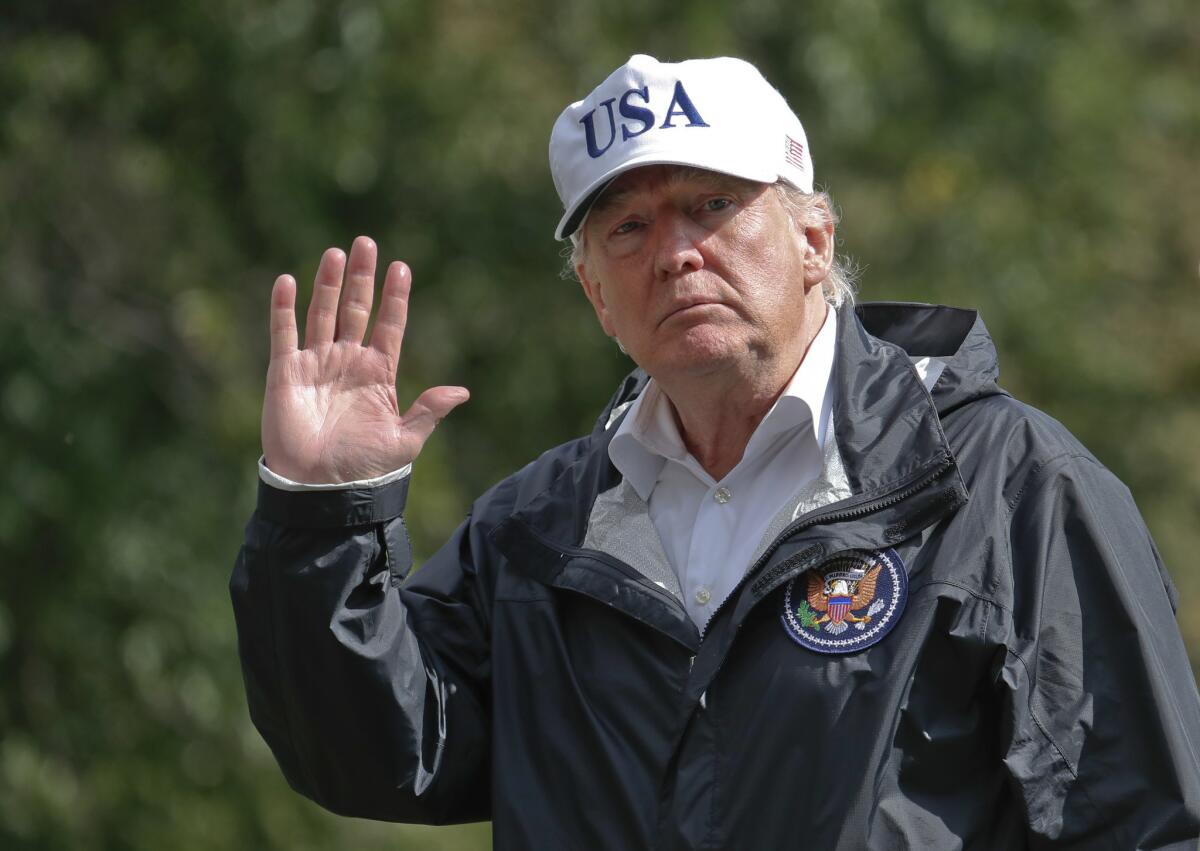
President Trump confirmed Thursday that his deal with Democrats could clear the way for legislation to protect “Dreamers” before funding for a border wall is approved.
“DACA now and the wall very soon, but the wall will happen,” Trump said, speaking to reporters on the South Lawn of the White House as he returned from seeing hurricane damage in Florida.
Trump’s description largely tracks with how House Minority Leader Nancy Pelosi (D-San Francisco) and Senate Minority Leader Charles E. Schumer (D-N.Y.) described the outcome of their Wednesday night dinner with the president, saying they had reached an agreement that included more funding for border security but not money for Trump’s promised border wall.
Trump said he has agreed to work with Democrats to protect about 800,000 people who will become vulnerable to deportation after Trump announced last week he was ending the Deferred Action for Childhood Arrivals program, beginning in March.
“We’re working on a deal for DACA, but a lot has to do with the amount of security. We want very heavy security at the border,” Trump said.
Immigration hard-liners blasted Trump on Thursday for working with Democrats and seeming to undermine his campaign promise to end the program and not reward illegal immigration.
Asked whether he would approve a deal that opens the door to citizenship for DACA recipients, Trump said that hadn’t come up yet. “We’re not talking about that. We’re not talking about amnesty at all,” he said.
American who allegedly fought for Islamic State surrenders in Syria, now in U.S. custody

A U.S. citizen who allegedly fought for Islamic State has surrendered to American-backed forces in Syria and is in U.S. custody, according to the Pentagon, a rare case of an American captured on the battlefield.
U.S. officials declined to publicly identity the American or say where he surrendered or under what circumstances, but they described him as a “known enemy combatant.”
“The U.S. citizen is being legally detained by Department of Defense personnel as a known enemy combatant,” Maj. Earl Brown, a spokesman for U.S. Central Command, which oversees military operations in the Middle East.
He referred questions to the Justice Department, but officials there declined to comment on whether or when the American would be charged and brought before a judge, as the law requires.
Brown said the American was taken into custody on or before Tuesday by Syrian Democratic Forces, a U.S.-backed alliance of Kurdish and Arab militia fighters in Syria.
The alliance has taken part in the U.S.-backed air and ground offensive aimed at forcing Islamic State militants out of Raqqah, the group’s self-declared capital in Syria.
The Daily Beast first reported the American fighter’s surrender.
Thousands of foreign fighters from around the globe flocked to Iraq and Syria after Islamic State first captured vast parts of the two countries in 2014 and proclaimed an Islamist caliphate.
Although the FBI conducted hundreds of investigations and made scores of arrests for raising money or providing support to Islamic State, relatively few Americans made their way to the front lines as combatants.
One who did, Mohamad Jamal Khweis of Alexandria, Va., was grabbed in western Iraq by Kurdish guerillas in March 2016 and later turned over to U.S. authorities.
A federal jury convicted Khweis, 27, in June of providing and conspiring to provide material support or resources to Islamic State, and a related firearms count.
He faces a mandatory minimum of five years in prison and a maximum of life in prison when he is sentenced on Oct. 13.
Sheriff Joe Arpaio on Trump and DACA: ‘Whatever final policy he supports, I’ll also support. He’s very intelligent’
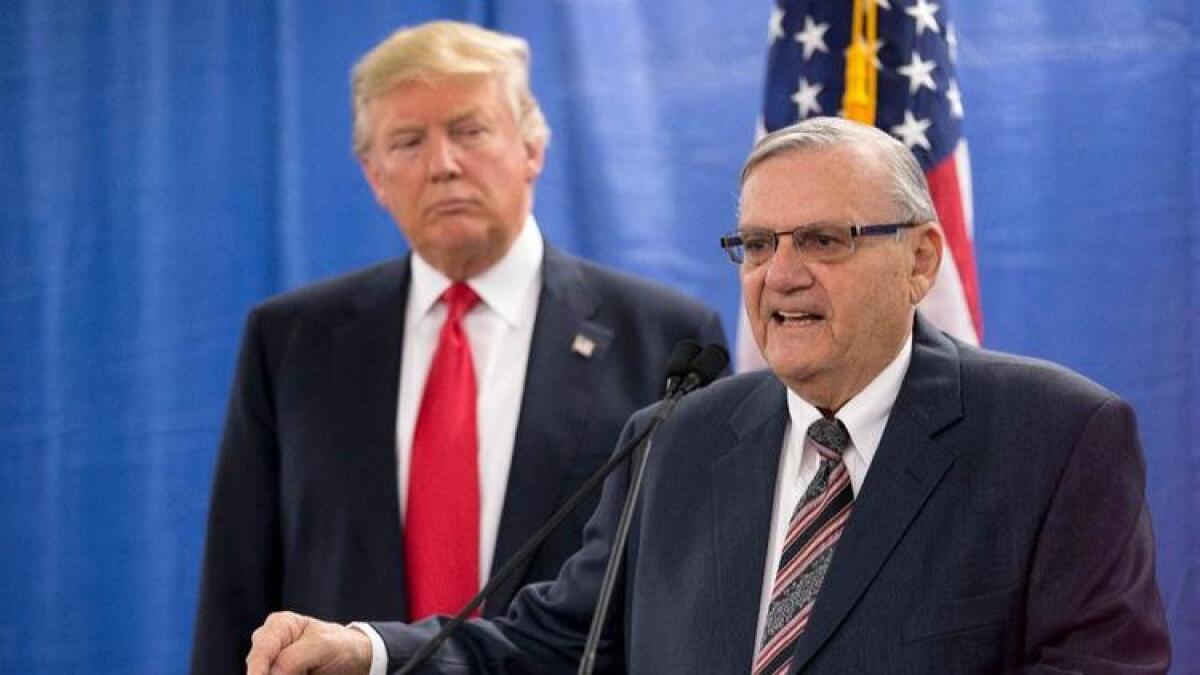
As President Trump is castigated by some conservatives over his negotiations with congressional Democrats on the Deferred Action for Childhood Arrivals program, the president has at least one supporter on the far-right: former Arizona Sheriff Joe Arpaio.
On Thursday, Arpaio, who last month received a presidential pardon from Trump, said he supports the president on whatever he chooses to do on the Obama Administration program that shields from deportation nearly 800,000 young immigrants brought to the U.S. illegally as children.
“Whatever final policy he supports, I’ll also support. He’s very intelligent. He cuts deals,” Arpaio, speaking by telephone from his home in the Phoenix suburbs, said.
Arpaio, however, insisted that the issue of what to do on DACA should fall to Congress.
“Have Congress make the decision, [Trump] can’t make it himself,” he said.
When asked if Trump was betraying his far-right base when it comes to immigration, Apraio said he was not.
“He’s trying to make deals and get stuff done,” he said.
Even so, Arpaio said he would ask Congress to create legislation that deports the so-called Dreamers but then allows them to “cut to the front of the line and return here legally.”
“Why not send them back to the country where they came from? It’s good for them to go see the country where they came from,” Arpaio said. “They then can come back legally.”
He added, “But that’s just some of my views. … I’m not the president.”
Arpaio hedged when asked directly if he supports DACA.
“The president is a great negotiator, and I support the president,” he said.
Last month, Trump pardoned Apraio, who was convicted of criminal contempt in July for flouting a court order to stop racial profiling of Latinos while he was sheriff.
Arpaio, 85, has long been a divisive figure at the center of national debates over policing and illegal immigration. He was extremely popular with many Arizona voters, but his harsh policies drew sharp criticism from advocates for immigrants and civil rights.
Treasury inspector general looking into Steven Mnuchin’s request for a military jet for his honeymoon
An inspector general is looking into Treasury Secretary Steven T. Mnuchin’s request for a U.S. military plane for his European honeymoon in August, triggering new questions about his use of government aircraft following a controversial trip with his wife to Kentucky during the solar eclipse.
The Treasury Department’s inspector general is “looking at all requests for and use of government aircraft by the secretary” as part of an inquiry that began after Mnuchin’s Kentucky trip last month, Rich Delmar, counsel to the inspector general, said Thursday.
Mnuchin requested a military jet for the couple’s honeymoon in Scotland, France and Italy because he is a member of the National Security Council and needed access to secure communications during the trip, according to a Treasury statement.
The request was withdrawn “after a secure communications option was identified during the Secretary’s extended travel,” the department said.
Strange but true: Praise in lefty San Francisco for Pelosi and Trump — gasp — working together
What happens when the congressional representative of this uber-liberal enclave — who also happens to be leader of the House Democrats — starts dancing with the devil?
Nancy Pelosi, along with her Senate counterpart, Charles E. Schumer, convinced President Trump to override his advisors and ignore congressional Republicans by agreeing to a three-month extension of the nation’s debt limit, emergency aid for Hurricane Harvey victims and other federal spending.
The next day, at Pelosi’s behest, the president tweeted reassurance to “Dreamers” — immigrants brought to America illegally as children — that they needn’t worry about deportation during the six months Congress works to resolve their ambiguous state.
And Wednesday night, “Nancy and Chuck,” as the president chummily called the pair, joined the president for dinner at the White House, where Democrats said they reached agreement with Trump to permanently protect the Dreamers as part of a larger border security package.
Trump failed to win a measly 10% of the vote here in November but, even so, many said they were just fine with Pelosi’s new BFF.
Trump pushes deal on DACA as many supporters erupt in anger
President Trump on Thursday defended his negotiations with Democratic leaders on immigration, as many of his most prominent supporters denounced the idea of a deal to legalize the status of hundreds of thousands of young immigrants who are in this county illegally.
“We’re working on a plan — subject to getting massive border controls. We’re working on a plan for DACA,” Trump told reporters on Air Force One as he prepared to fly to Florida to inspect hurricane recovery efforts.
DACA is the acronym for the Obama administration program that shielded nearly 800,000 young immigrants brought to the U.S. illegally as children, the so-called Dreamers, from deportation. Trump last week said he would phase out the program starting in six months.
“People want to see that happen,” Trump said, referring to a legislative solution for the Dreamers. “You have 800,000 young people, brought here, no fault of their own. So we’re working on a plan, we’ll see how it works out. We’re going to get massive border security as part of that. And I think something can happen, we’ll see what happens, but something will happen,” he said.
Responding to a shouted question on whether he favors “amnesty,” Trump shouted back: “The word is DACA.”
Trump met for dinner Wednesday night with House Minority Leader Nancy Pelosi (D-San Francisco) and Senate Minority Leader Charles E. Schumer (D-N.Y.) to discuss the issue. Shortly after the dinner, the two Democrats issued a statement saying that they had agreed with Trump to pursue legislation to legalize the status of Dreamers.
The two released an additional statement Thursday morning saying that “as we said last night, there was no final deal, but there was agreement on the following: We agreed that the President would support enshrining DACA protections into law, and encourage the House and Senate to act.”
“What remains to be negotiated are the details of border security, with a mutual goal of finalizing all details as soon as possible,” they added.
The deal would not include money for Trump’s long-sought wall along the border with Mexico, they said, adding that. “the President made clear he intends to pursue it at a later time, and we made clear we would continue to oppose it.”
“Both sides agreed that the White House and the Democratic leaders would work out a border security package. Possible proposals were discussed including new technology, drones, air support, sensor equipment, rebuilding roads along the border and the bipartisan McCaul-Thompson bill,” a reference to a border security measure.
Trump confirmed most of that, telling reporters that “the wall will come later.”
“We’re right now renovating large sections of wall, massive sections, making it brand new,” he said, referring to efforts to repair and upgrade some sections of existing border fences.
Trump also said he had briefed House Speaker Paul D. Ryan (R-Wis.) and Senate Majority Leader Mitch McConnell (R-Ky.) on his discussions with Schumer and Pelosi and that they were “on board.”
Talk of a deal, however, sparked angry reactions among many of Trump’s supporters.
“Amnesty Don ... Trump Caves on DACA,” screamed the headline on Breitbart, the conservative website run by Steve Bannon, Trump’s former chief strategist.
Sean Hannity, the Fox commentator and one of Trump’s most loyal supporters, likened the president’s negotiations to President George H.W. Bush’s breaking of his “no new taxes” pledge — a decision that led to a conservative revolt that doomed Bush’s presidency.
Ann Coulter, the conservative commentator who already has been critical of Trump, went the furthest, calling for Trump’s removal from office.
Trump defends efforts to help ‘Dreamers,’ says deal with Democrats isn’t final yet
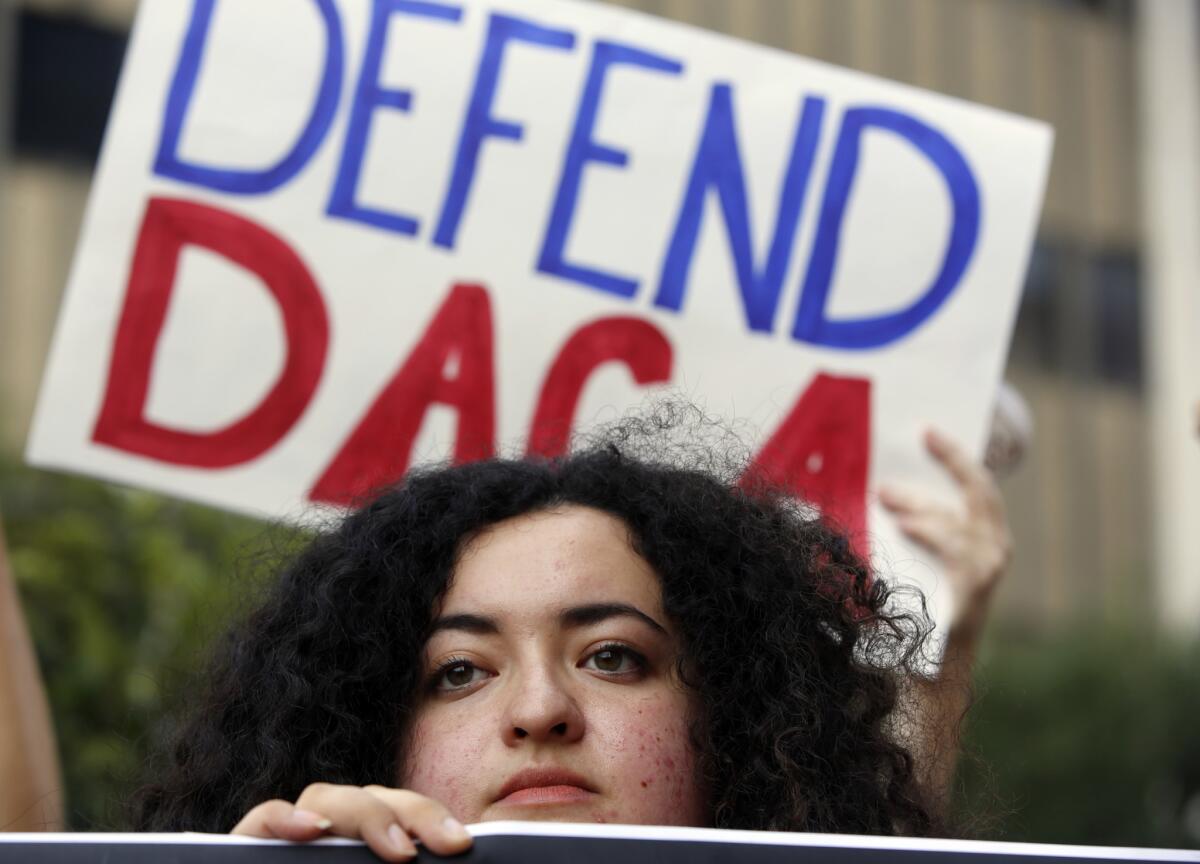
In his first comments since Congress’ top two Democrats announced Wednesday night that a deal had been reached to help so-called Dreamers, President Trump denied a final agreement was made concerning the young immigrants.
“No deal was made last night on DACA,” the president said in a series of early-morning tweets Thursday.
Responding to heavy criticism from conservatives that he was backing away from his promise to build a wall along the Mexican border, Trump insisted that “massive border security” would need to be part of any agreement.
Senate Minority Leader Charles Schumer and House Minority Leader Nancy Pelosi said Wednesday night that Trump had agreed to legislation that would revive the Obama Administration’s Deferred Action for Childhood Arrivals program, which Trump recently decided to terminate. In exchange, the Democrats said they agreed to unspecified border security measures, though not including funding for the wall.
Trump also emphasized the need to help Dreamers.
Agreement reportedly reached on extending DACA protections for ‘Dreamers’
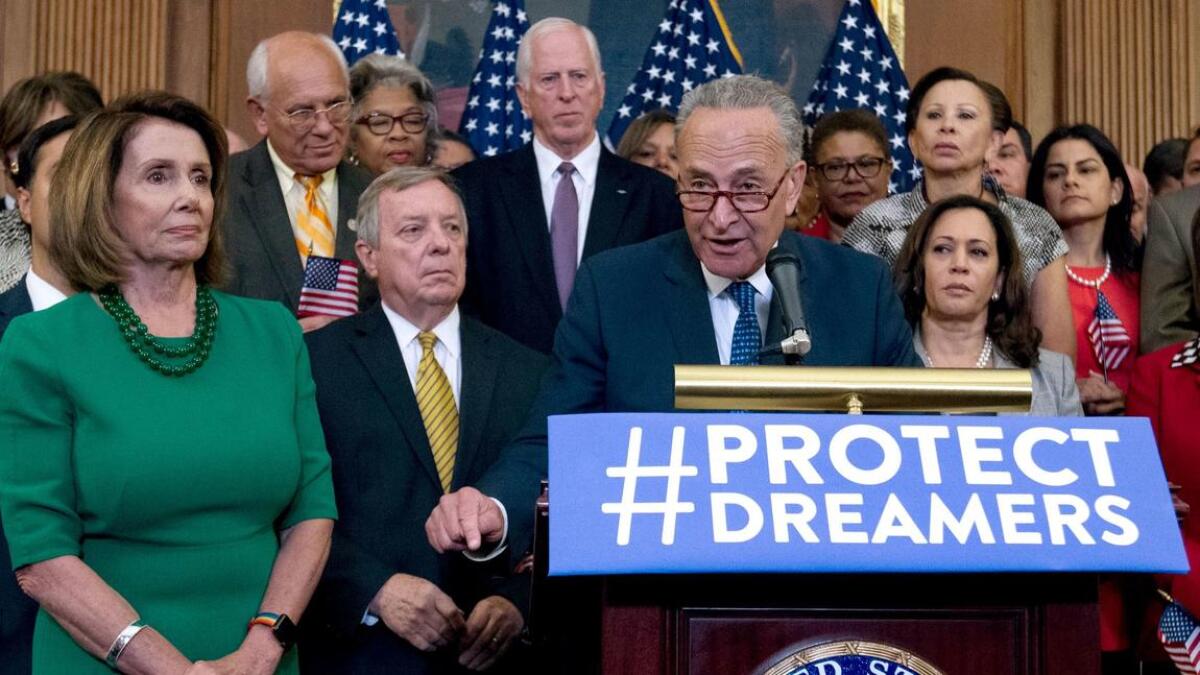
Democratic leaders said Wednesday night they had reached agreement with President Trump to provide legal status for 800,000 immigrants who came to the country illegally as children.
The deal, announced after a dinner of Chinese food at the White House, could provide further momentum to a budding movement toward bipartisanship that began last week when Trump reached a fiscal agreement with Democrats to temporarily keep the government open and pay the nation’s debts.
House Minority Leader Nancy Pelosi of San Francisco and Senate Minority Leader Charles E. Schumer of New York said in a joint statement that the newest pact would give the so-called Dreamers legal status as part of a broader measure that would beef up border security.
Trump praises, but stops short of endorsing, latest GOP health plan
Analysis: Turning aside risk, Democrats rally to Bernie Sanders’ single-payer health plan
Like passengers leaping for a departing train, leading Democrats are scrambling to support single-payer health insurance, a system that would represent a huge expansion of government control over healthcare and which the party’s presidential nominee declared last year would “never, ever” come to pass.
Sen. Bernie Sanders (I-Vt.), whose support for universal coverage was central to his 2016 presidential campaign, plans later Wednesday to unveil the latest version of his plan to expand Medicare to cover all Americans.
As Sanders prepared for his announcement, Democrats as ideologically diverse as liberal Sen. Kamala Harris of California and conservative Sen. Joe Manchin of West Virginia expressed support for his effort. Their statements reflect multiple developments: a belief that the window has closed on Republican efforts to repeal Obamacare; a surge in support for government-run insurance among younger, more activist Democrats; and looming 2018 and 2020 contests that demand clarity on what Democrats support — not just who they oppose.
Most of the party’s potential 2020 presidential candidates have now endorsed the single-payer idea, including Sanders, Harris, Sen. Cory Booker of New Jersey, Sen. Elizabeth Warren of Massachusetts, New York Sen. Kirsten Gillibrand and Sen. Al Franken of Minnesota.
Competing Democratic healthcare plans are due out soon, including one that would allow Americans to buy coverage through Medicaid and another that would expand Medicare, efforts less disruptive than Sanders’ proposal. But the authors of both have cast them as bridges to a time when a single government plan can gain a majority.
The shift toward single payer brings risk for Democrats. The party suffered huge losses after attempts to restructure the nation’s insurance system during the Clinton and Obama administrations.
Trump invites Pelosi, Schumer to dinner at White House to discuss Dream Act, Obamacare
Partisan divisions among voters deepen under Trump
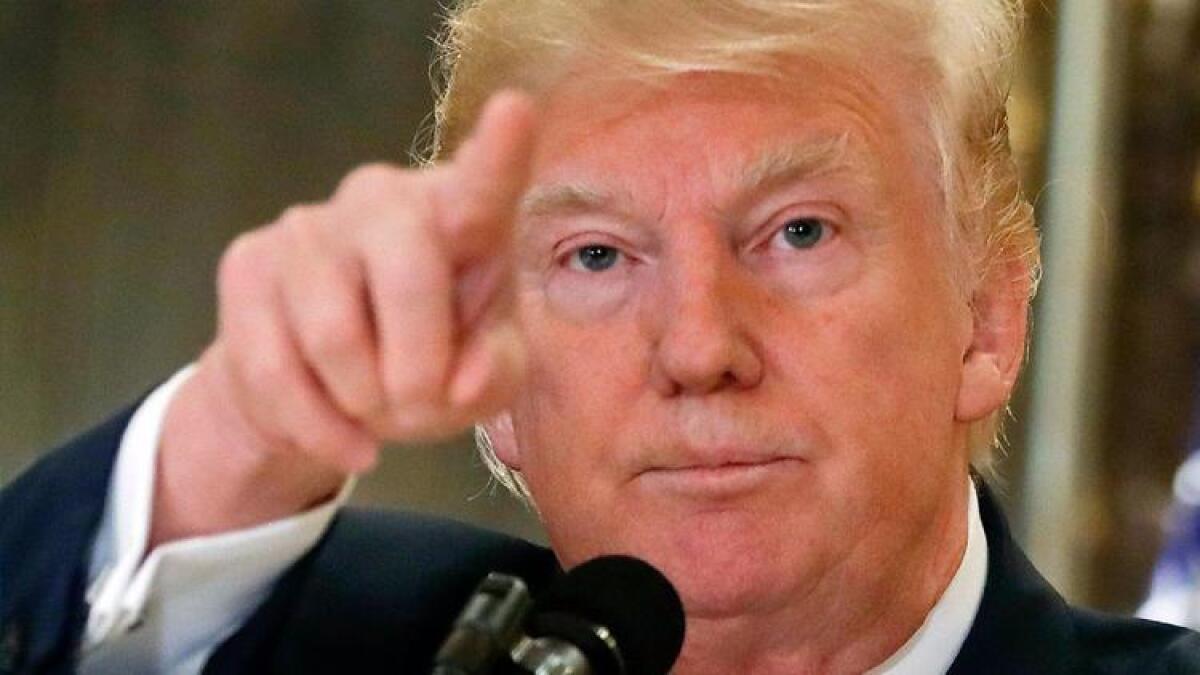
Partisan divisions in the U.S., already at a high point during President Obama’s years in office, have hardened further under President Trump, with both Democrats and Republicans feeling more negatively toward members of the opposing party.
Asked by the nonpartisan Pew Research Center to rate their feelings toward the other party’s members on a thermometer, about three-quarters of people who identify themselves as Republicans gave Democrats a cold rating. Among Democrats, feelings toward Republicans were just slightly less cold — about seven in 10 gave the other party’s members a cold rating.
In both cases, the ratings were significantly chillier than last year.
The new numbers illustrate the negative feelings that have been driving American politics. The trend toward more and harsher partisanship began more than a generation ago, but accelerated through the George W. Bush and Obama presidencies and has continued into Trump’s.
The Pew survey also found that partisanship corresponds with how Americans see certain occupations.
About three-quarters of Republicans expressed very warm feelings toward police officers, for example, while among Democrats just one-third did so. On the flip side, half of Democrats had very warm feelings toward college professors, while among Republicans only one-fifth felt that way.
Backers of the two parties have similarly negative views of the opposition, but Democrats and independents who lean Democratic are somewhat happier with their side than are Republicans and Republican-leaning independents, the Pew survey found. The numbers help explain a reality that can be seen daily on Capitol Hill -- the greater unity among Democrats than Republicans.
Nearly half of Democrats, 45%, say they feel “very warm” toward their party. Among Republicans, the share feeling “very warm” toward their party was slightly smaller, 39%.
Among independents who lean Republican, the share who say that the party label describes them well has dropped significantly over the past year. In 2016, half of Republican-leaning independents said that the party name described them “very” or “fairly” well. Now, just one-third say so.
The share of Democratic-leaning independents who say the party label describes them very or fairly well has remained steady at just over 40%.
Pew conducted its study among 4,971 members of an online panel whose members are randomly selected to accurately reflect the nation’s demographics. The survey was conducted Aug. 8-21 and has a margin of error of 2.3 percentage points in either direction.
Details emerge about Flynn’s undisclosed 2015 trip to the Middle East in a letter released by Democrats
Former business associates of Michael Flynn have told lawmakers that he traveled to the Middle East in 2015 as part of a private proposal to build nuclear power plants across the region, a trip that the former Trump administration national security advisor never disclosed during his security clearance process.
In a letter released Wednesday, two top House Democrats reveal that companies involved in the proposal provided details of Flynn’s trip in June 2015 that suggest he also failed to report contacts with Israeli and Egyptian government officials. The lawmakers — Reps. Elijah Cummings of Maryland and Eliot Engel of New York — are now asking the companies and Flynn to provide the names and nationalities of any officials he met with during the trip abroad.
The information released by the lawmakers is the latest evidence that Flynn didn’t fully account for his foreign contacts and business entanglements even though he was liable for possible federal criminal penalties for lying or omitting such information. Security clearance questionnaires specifically ask applicants to report any meetings abroad or contacts with foreign government officials that occurred in the previous seven years. As a former director of the Defense Intelligence Agency, Flynn maintained a security clearance. His last renewal was in early 2016.
Flynn has been dogged by questions about his lack of disclosure of a Turkish lobbying operation and of foreign payments he accepted after leaving the military in 2014. Flynn also was forced to resign his Trump administration post in February after White House officials determined that he had misled them about the nature of diplomatic conversations with Russia’s ambassador to the U.S.
Special counsel Robert Mueller is scrutinizing Flynn’s foreign interactions as part of his probe into Russia’s meddling in the 2016 election and any possible coordination with Trump associates. Earlier this year, that investigation incorporated an ongoing federal probe into Flynn’s lobbying for a Turkish businessman during the final months of the presidential campaign.
Flynn’s attorney, Robert Kelner, declined to comment on the letter. Flynn’s legal team has previously said that he’d like to cooperate with Congress but only intended to respond to subpoenas that compel him to do so. As members of the minority party, Cummings, the ranking member on the House Oversight and Government Reform Committee, and Engel, the ranking member of the House Foreign Affairs committee, do not have subpoena power.
Cummings and Engel first raised concerns in June about Flynn’s 2015 Mideast trip after Newsweek reported that Flynn had worked with companies angling to persuade foreign governments and companies to join in a plan to build a cluster of 40 nuclear plants in the Mideast for civilian power needs. The lawmakers also seized on a comment Flynn made in congressional testimony in the summer of 2015, in which he said that he had just returned from the Middle East.
In their latest letter, Cummings and Engel write that “it appears that General Flynn violated federal law by omitting this trip and these foreign contacts from his security clearance renewal application in 2016 and concealing them from security clearance investigators who interviewed him as part of the background check process.”
Because of the potential for a criminal violation, the two lawmakers say they are providing Mueller with the responses from the companies.
According to the letter and documents released by Cummings and Engel, Flynn’s Mideast trip was backed by ACU Strategic Partners, a U.S. firm that sent him to persuade officials to support a plan involving companies from the U.S., Russia, France, the Netherlands, Britain, Ukraine, Israel and several Persian Gulf nations.
Dr. Thomas Cochran, an advisor to ACU Strategic Partners, told the lawmakers that Flynn was expected to press Egyptian and other officials to hold off on accepting a rival offer from Russia to finance and construct a smaller system of four reactors in Egypt and two in Jordan.
Flynn’s Egypt visit “was to convince the government at least to postpone accepting the Russian offer to finance and build four reactors in order to carefully consider the ACU alternative,” Cochran said in his response. Flynn also traveled to Israel where, Cochran said, he sought to assure Israel that the project would be in its interest.
The proposal has never gotten beyond the planning stage. But in his response, Cochran indicated that there could be support from the Trump administration, particularly in its effort to involve both U.S. and Russian interests. “The ACU project gives President Trump and Secretary [of State Rex] Tillerson a valuable private sector mechanism for helping stabilize and improve relations with Russia as well as helping accelerate U.S.-Russia cooperation in the Middle East,” Cochran said.
In a separate response to the congressmen, ACU Managing Director Alex Copson confirmed that ACU paid Flynn’s travel expenses and wrote him a $25,000 check for “loss of income and business opportunities resulting from this trip.” But Copson told the lawmakers that bank records show Flynn never cashed the check.
Flynn had previously not disclosed his compensation on his government financial disclosure filed earlier this year, but in August, he filed an amended disclosure that listed he had received more than $5,000 from ACU. Flynn also listed that he was a consultant to another company, IronBridge Group, which was connected to the project.
An attorney for retired Rear Adm. Michael Hewitt, the chairman of IronBridge, confirmed to lawmakers that Flynn took the trip, but did not provide details of his foreign contacts.
Thomas Egan, an attorney for ACU, said Tuesday that he had received the lawmakers’ letter, but the company had not yet decided whether it would respond. Michael Summersgill, an attorney for IronBridge, did not respond to a telephone message Tuesday seeking comment.
Since the late 1990s, Copson has promoted a series of international nuclear-related projects that have not come to fruition. The House letter cites an April 2016 email forwarded from Copson to Hewitt and several others showing that Copson initially envisioned the U.S. and Russia as developing the reactor project. But turbulence in Syria and the Iran nuclear deal led Copson to propose bringing in other partners, including China.
Supreme Court blocks new refugees under Trump travel ban
The Supreme Court gave a short-term win to the Trump administration Tuesday, bolstering part of a travel ban that will allow the administration to block new refugees arriving from six majority-Muslim nations.
In a brief order and with no dissents, the justices reversed rulings by a federal judge in Hawaii and the U.S. 9th Circuit Court of Appeals in San Francisco.
The 9th Circuit had cleared the way for as many as 24,000 refugees to be exempt from the ban and come to this country as long as one of several nonprofit groups had given a “formal assurance” they were prepared to receive them.
Administration lawyers argued these people did not qualify for an exemption because they had “no contact” or previous relationship with anyone in this country, which was the criteria set under a previous Supreme Court decision.
On Monday, government lawyers filed an emergency appeal with Justice Anthony M. Kennedy, who agreed to a temporary freeze.
On Tuesday, the full court said it had granted the administration’s appeal. The 9th Circuit’s ruling “is stayed with respect to refugees covered by a formal assurance, pending further order of this court.”
Next month, the high court is scheduled to hear arguments on the legality of Trump’s travel ban. It is possible the justices may decide the entire matter is moot by then. The travel ban was supposed to be in effect for 90 to 120 days.
While the administration won Tuesday on the issue of refugees, it lost in seeking to limit grandparents and other close relatives from entering the country.
The Supreme Court in late June said the travel ban may not be enforced against foreigners who have a “close” family tie with someone in this country, and the 9th Circuit said that may include grandparents, in-laws and cousins.
With pizza and prose, Hillary Clinton plays to her crowd

For somebody who often is reviled by political pundits (“Can Hillary Clinton Please Go Quietly Into the Night?” read a headline in Vanity Fair), the turnout Tuesday morning at a bookstore in Manhattan was a reminder that the vanquished White House hopeful still can command a rock-star following.
And that the people who love her do so for herself — not just because of her husband or because she was not Donald Trump.
“The narrative that you always hear is that people voted for her because she wasn’t Trump, but they forget there are many people who love Hillary for herself,” said 27-year-old Catherina Messier, a recent graduate in theater studies from Brandeis University.
“She knows how to take a punch. Every woman knows what it is like to be intimidated by a guy. She was an inspiration for women, even those who didn’t like her, because you couldn’t help but see how strong she was.”
People lined up overnight in front of the bookstore at Union Square to get signed copies of Clinton’s book, “What Happened,” drinking coffee and munching on complimentary pizza — which Clinton’s advance team had ordered delivered Monday might for the fans on the sidewalk. They indulged in a favorite pastime among New Yorkers (complaining about Trump) and downloaded a new episode of “Pod Save America” (an anti-Trump podcast) with a Clinton interview.
Like the release of a new Harry Potter book, this was as much a happening as a book signing. People dressed for the occasion, displaying their politics on their T-shirts. One woman even dressed in a horizontally striped navy-and-white dress designed to look like Clinton’s book cover.
Nary a “Make America Great Again” symbol could be found in this crowd.
But one 18-year-old New York University student, who said he would have voted for Trump if he had been old enough, wore a Barry Goldwater T-shirt.
“I figured that would be safe because maybe people don’t remember who he was,” said the student, Gabriel Deen, who also had tucked under his arm a newly purchased copy of William F. Buckley’s “Getting it Right.”
While many Democrats blame Clinton for the mistakes that allowed Trump to win the White House, it was her humiliating loss that has endeared her to many of the fans. If anything, Clinton looks more appealing in defeat than she was as a cocky front-runner, fans said.
“Women are always dumped on and disrespected. She’s a hero for the way she stood up under pressure,” said Brandon Powell, a 24-year-old in reflective shades from Brooklyn.
“I just like Hillary and like being with other Hillary lovers,” said Chris Rudolf, 33, a writer and former campaign volunteer who proudly displayed his campaign buttons on his T-shirt like a retired general.
Hillary Clinton, rehashing her 2016 loss in new book, emerges to less-than-enthusiastic reviews
Hillary Clinton, who spent decades on the public stage in a myriad of roles and changing personas, emerged Tuesday in a new one: ghost from the political past.
The reception was decidedly mixed.
On the day marking publication of her latest memoir, the former first lady, U.S. senator, secretary of State, two-time Democratic White House hopeful and loser of the searing 2016 presidential race made a flurry of campaign-style stops, including a book signing and batch of media interviews.
It was a chance to open old wounds and allow partisans to fall back on familiar positions.
In new book, Hillary Clinton calls her use of a private email server ‘dumb’
Hillary Clinton – reflective, defiant, perplexed – released a tell-all book Tuesday about her experiences during the 2016 presidential campaign.
Clinton, who, since her election loss in November to Donald Trump has participated in only a handful of public events, dives into an array of issues in the book , including her use of a private email server while secretary of State, her paid Wall Street speeches and what it was like to become the first female presidential nominee of any major U.S. political party.
Throughout the primary and into the general election, Clinton was relentlessly assailed for her use of a private email server while leading the State Department.
Clinton writes in the book, titled “What Happened,” that her “dumb” decision to use a personal email server “got more coverage than any other issue in the whole race.”
“In fact, if you had turned on a network newscast in 2016, you were three times more likely to hear about those emails than about all the real issues combined,” she writes.
She adds, “it was a dumb mistake. ... It was like quicksand: the more you struggle, the deeper you sink.”
Last year, Clinton refused to release excerpts of her remarks before Wall Street executives, which took place ahead of her presidential run. The issue dogged her from the outset of the campaign, with some of her opponents, including her chief rival for the Democratic nomination, Vermont Sen. Bernie Sanders, and Trump, questioning whether Clinton’s rhetoric changed when she was behind closed doors with bank financiers.
“I didn’t think many Americans would believe that I’d sell a lifetime of principle and advocacy for any price,” she writes. “When you know why you’re doing something and you know there’s nothing more to it and certainly nothing sinister, it’s easy to assume that others will see it the same way. That was a mistake.”
“I should have realized it would be bad ‘optics’ and stayed away from anything having to do with Wall Street. I didn’t. That’s on me,” Clinton writes.
Some have suggested that, after her election loss, Clinton, whose political resume includes stints as first lady and as U.S. senator from New York, should step aside.
“There were plenty of people hoping that I, too, would just disappear,” she notes. “But here I am.”
Democrats hope for a ‘Dreamer’ vote by next month as White House says border wall funds may not be part of the deal
House Minority Leader Nancy Pelosi said Tuesday that Democrats are pushing for a vote as soon as this month on Dream Act-like legislation to protect young immigrants from deportation.
Though President Trump terminated the Obama-era Deferred Action for Childhood Arrivals program, he gave congressional leaders six months to come up with a legislative fix.
Pelosi’s efforts come as a top White House aide reiterated Tuesday that the administration is not insisting -- at least not publicly -- that funding for a proposed wall along the Mexican border be part of any deal.
Instead, both sides are more likely to come to agreement on a package of other border security measures that could be paired with the bill,
Trump, who had previously threatened a government shutdown over border wall funding, outlined the contours of a possible deal last week.
“The president is committed to sticking by his commitment that a physical structure is what is needed to help protect America,” White House legislative director Marc Short told reporters at a breakfast Tuesday sponsored by the Christian Science Monitor. “Whether or not that is specifically part of the DACA package, or a different legislative package, I am not going to prejudge here today.”
Pelosi told reporters that Trump, during his recent meeting with congressional leaders, made clear he wanted to see legislative action on a DACA protection bill, and Democrats let the president know they will not allow wall funding as part of it.
“We’ve been very clear: There is no wall in our DACA future,” Pelosi said. “It’s just not going to happen.”
Democrats are gathering signatures in the House in support of their bill, from Los Angeles-area Democratic Rep. Lucille Roybal-Allard, to force a floor vote.
As the minority party, Democrats are trying to build support for a discharge petition, which is a procedural move to force a vote after Sept. 25, if enough Republicans agree.
More than two dozen House Republicans have already signaled support for similar DACA-like legislation that would allow the young immigrants, who were brought to the U.S. illegally as children, to temporarily work and remain in the country.
Democrats would need most of those Republicans to back their bill, but Pelosi noted that even the threat of enough support to force a vote can sometimes be enough to prod the majority party leadership to act.
“We’re hoping a number of them will come over,” Pelosi said.
“The president asked them to bring it up,” she said. “We told him... We will not rest until it’s passed and we want to do it as soon as possible.”
Meanwhile, the White House is preparing to release legislative principles in the weeks ahead on other border security measures as part of a DACA deal.
“There are several things we think are important,” Short said. “We do think it is important to secure our border. We do think interior enforcement is critical. And we also think that we should be moving to a merit-based immigration system.”
Short said those ideas could be part of one legislative package or multiple bills.
Pelosi declines to endorse Sen. Bernie Sanders’ single-payer healthcare bill
House Minority Leader Nancy Pelosi (D-San Francisco) declined Tuesday to endorse Sen. Bernie Sanders’ single-payer healthcare bill, saying her immediate goal is to protect the Affordable Care Act from President Trump’s efforts to dismantle it.
Pelosi made it clear that her distance from the bill, which Sanders expects to unveil with top progressives this week, creating something of a litmus test for Democrats, had little to do with its contents. Rather she is working on more incremental gains to preserve and expand coverage for as many Americans as possible, despite Republican opposition to Obamacare, she said.
“Right now, I’m protecting the Affordable Care Act,” Pelosi told a small group of reporters at a meeting Tuesday in her Capitol Hill office. “None of these other things, whether it’s Bernie’s [bill], can really prevail unless we have the Affordable Care Act protected.”
Sanders, the Vermont independent, is drawing support from top Democrats, including with Sen. Elizabeth Warren (D-Mass.) and Sen. Kamala Harris (D-Calif.) and others often mentioned as possible presidential contenders.
Pelosi, though, downplayed the bill as a gauge to measure progressive bona fides.
“I don’t think it’s a litmus test,” Pelosi said. “To support the idea that it captures is that we want to have everybody, as many people as possible, covered. And I think that’s something that we all embrace.”
Other Democrats, including those in the House, are introducing more modest measures, including one that would extend Medicare-like healthcare coverage to those near retirement age, adults between 55 and 64 years old.
“Put them all on the table,” Pelosi said.
Pelosi defended her position at a time when some progressives are taking aim at her leadership, noting that she has backed a single-payer system since before she entered Congress.
“I’ve been carrying single-payer signs as party chair of California,” she said, referring to her tenure decades ago as state party leader. “I’m a progressive from San Francisco. Proud liberal. I have my own kind of credibility on these subjects.”
Hope Hicks’ temporary position as Trump’s communications director becomes permanent
The White House is naming Hope Hicks, who has been serving as interim communications director, to the position permanently.
Hicks is a longtime aide of President Trump, having served as his presidential campaign’s lead spokeswoman.
Hicks, 28, is the third White House communications director in the administration’s nearly eight months. Her predecessor, Wall Street personality Anthony Scaramucci, served in the role for less than two weeks.
Moscow considers cutting an additional 155 from U.S. diplomatic staff in Russia
Moscow is threatening to order an additional 155 American diplomatic personnel removed from missions in Russia in a further escalation of the cycle of retaliation between the two world powers.
Russian Foreign Minister Sergei Lavrov said Monday that Russia was seriously considering the additional cuts, although it had not yet made a formal petition. A senior State Department official, speaking on condition of anonymity, confirmed that the Trump administration was aware of the possibility.
Earlier this year, Moscow ordered the U.S. to slash its staff in Russia by nearly two-thirds, to 455 people, by Sept. 1. In response, the U.S. ordered Russia to shutter its consulate in San Francisco and two trade offices, in Washington and New York.
Washington and Moscow are basing their tit-for-tat on differing interpretations of “parity,” that principle that each government have an identical numerical presence in the other’s country. That was the justification Moscow used to cut the U.S. staff to 455, the same number Russia had here. The U.S. then said closing the San Francisco consulate meant each country would have three consulates.
U.N. Security Council OKs weakened resolution on North Korea sanctions
The United Nations Security Council unanimously approved a resolution to impose new economic sanctions on North Korea for its nuclear weapons buildup, but the penalties were weaker than the Trump administration had sought.
The 15-0 vote marks the second unanimous decision against North Korea in the weeks since it unexpectedly tested intercontinental ballistic missiles and an apparent hydrogen bomb.
After late-night negotiations Sunday with China, the U.S. delegation broadly weakened a sanctions proposal that Beijing was unwilling to support. China’s cooperation is key to enforcing any sanctions.
The move shows the continued division among major world powers as they grapple with a government that has repeatedly defied U.N. resolutions.
Equifax data breach focuses Washington’s attention on security of sensitive personal information
The massive data breach at credit reporting firm Equifax has put the company in the cross-hairs of congressional committees and one of the nation’s most aggressive attorneys general, while fueling a new push for stronger protections on Americans’ personal information.
Even the Trump administration, which has advocated slashing government rules, has indicated new regulations might be needed.
The revelation last week that a hack of Equifax’s computer system exposed the Social Security numbers and birth dates of as many as 143 million people also could scuttle Republican efforts to limit the liability faced by credit reporting companies and other financial firms in disputes with consumers.
The scale of the latest in a series of high-profile data breaches has refocused attention on the role of the three major credit reporting companies — Equifax, Experian and TransUnion — as repositories of a trove of sensitive data.
“This debacle should be a wake-up call to both consumers and policymakers about the industry’s broad reach,” said Rohit Chopra, a senior fellow at the Consumer Federation of America.
Ivanka Trump had breakfast with Janet Yellen as the president considered the Fed chair’s renomination

Ivanka Trump and Federal Reserve Chairwoman Janet L. Yellen had breakfast this summer as President Trump considered whether to nominate Yellen for another term as the central bank chief.
The president’s daughter and Yellen dined at the Fed from 8 a.m. to 9 a.m. on July 17, according to Yellen’s calendar, which the Fed releases to the public with about a one month lag.
A White House official said Monday that Ivanka Trump “reached out” to Yellen after reading a speech the Fed chairwoman made last spring about women’s participation in the economy and barriers faced by women and minority small business owners.
The White House official and a Fed spokeswoman declined to comment on what was discussed at the breakfast.
The Fed chair often meets with administration officials and members of Congress. But a sit-down with a member of the First Family is highly unusual for the chief of the nation’s independent central bank.
The breakfast came as Yellen’s four-year term is set to expire in February. She has not said publicly if she is interested in a second term but Trump has said he is considering renominating her.
Ivanka Trump is an unpaid assistant to the president and a key advisor. She has advocated for women’s issues, such as paid family leave and an expanded child tax credit.
Yellen, the first woman to lead the Fed, gave a speech in May at Brown University entitled “So We All Can Succeed: 125 Years of Women’s Participation in the Economy.”
A few weeks later, Ivanka Trump tweeted a quote from the speech and a link to it.
Ivanka Trump and Yellen had breakfast in a room in the Fed’s beaux arts Marriner S. Eccles Building, where Yellen frequently dines with guests.
In July, she had breakfast there twice with Treasury Secretary Steven T. Mnuchin. She also had lunch there in July with Gary Cohn, the White House’s top economic advisor and a possible rival for the Fed chairmanship.
President Trump has sent mixed messages about his opinion of Yellen.
He sharply criticized her during the 2016 presidential campaign, accusing her of keeping the benchmark interest rate “artificially low” to help fellow Democrats President Obama and Hillary Clinton.
“I think she is very political and to a certain extent, I think she should be ashamed of herself.” Trump told CNBC in a September 2016 interview.
A Trump campaign video included images of the Fed and Yellen, casting her as part of the “political establishment” that has “bled our country dry.”
But on July 25, about a week after Yellen’s breakfast with Ivanka Trump, the president said he was considering renominating Yellen and that she and Cohn were top candidates for the job.
“I like her. I like her demeanor. I think she’s done a good job,” Trump told the Wall Street Journal. “I’d like to see rates stay low. She’s historically been a low-interest-rate person.”
But Yellen might have hurt her chances of renomination by strongly defending tougher financial regulations during an August speech. Trump and many Republicans want to scale back many of the stricter rules put in place after the 2008 financial crisis, arguing they have stunted economic growth.
Cohn’s chances also have taken a hit recently.
Citing unnamed sources, the Wall Street Journal reported last week that Cohn is unlikely to be selected because of critical comments he made about Trump’s response to the Charlottesville, Va., violence.
Cohn told the Financial Times in an interview last month that the Trump administration “can and must do better in consistently and unequivocally condemning” white supremacists, neo-Nazis and the Ku Klux Klan.
2:05 p.m.: This post has been updated with comment from the White House.
Supreme Court agrees to temporary block on new refugees
Justice Anthony M. Kennedy granted a request from Trump administration lawyers Monday and temporarily blocked a U.S. 9th Circuit Court of Appeals order that would have allowed more refugees to enter this country from six majority-Muslim nations.
The government had asked for a “temporary administrative stay” to give the justices time to consider the issue.
The 9th Circuit order, due to take effect on Tuesday, would have cleared the way for as many as 24,000 refugees who have “a sponsorship-assurance agreement” with a U.S.-based refugee-resettlement agency, the government said.
The administration says that definition is too broad because it covers foreigners who would have “no contact” with anyone in this country until they arrive here.
But President Trump’s legal team gave up -- for now -- trying to apply the ban to grandparents of people who live here. Last week, the 9th Circuit said that grandparents are close relatives and therefore -- according to an earlier Supreme Court order -- may not be denied entry under the disputed travel ban.
The Supreme Court is scheduled to hear arguments Oct. 10 on the legality of Trump’s travel ban.
In late June, the justices handed down a short, middle-ground ruling that said the travel ban may take effect, but not against those who have a “close” family tie to someone in this country or against refugees who “claim a bona fide relationship with a person or entity in the United States.”
Since then, lawyers for Hawaii, which sued to block the ban, and the Trump administration have continued to fight over who is covered by those standards.
“The court’s immediate intervention is needed once more,” acting Solicitor Gen. Jeffrey Wall said in an emergency motion filed with Kennedy, who oversees the 9th Circuit.
Shortly afterward, Kennedy granted the stay. He is likely to seek a reply from lawyers for Hawaii, and then turn the matter over to the full court.
Russia may order an additional 155 U.S. diplomats to leave
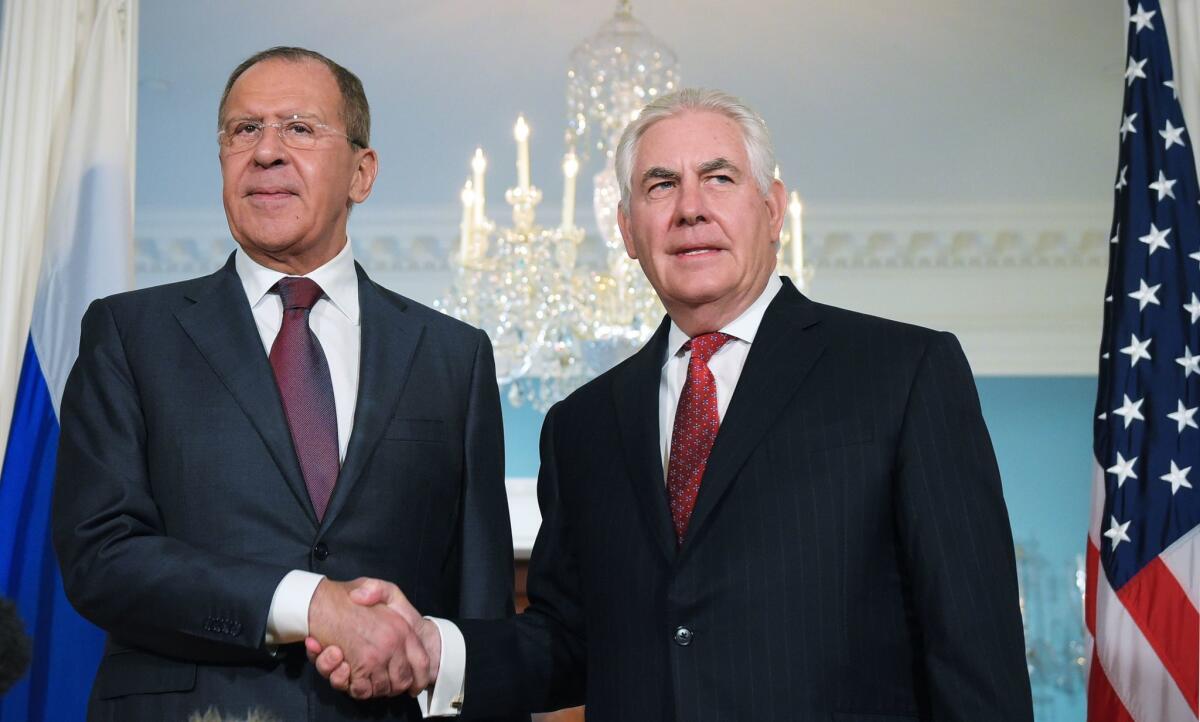
The diplomatic tit-for-tat between Moscow and Washington took yet another turn Monday when Russian Foreign Minister Sergei Lavrov said Russia was considering demanding that the U.S. diplomatic mission reduce its staff by an additional 155 employees.
Though a decision has not been made official, Lavrov said, the idea was on the table and under serious consideration.
Lavrov pointed a finger at the U.S. for initiating the parity criterion, saying that Washington had insisted that Russia close one of its four consulates in the United States because the U.S. only had three consulates in Russia.
“If they have taken parity as a criterion … we will bring these conditions into full compliance with what is called parity,” Lavrov said at a news conference Monday.
The situation started in January. Then-President Obama ordered the expulsion of 35 Russian intelligence officers and seized two Russian diplomatic compounds in the U.S. in retaliation for Kremlin meddling in the 2016 U.S. presidential elections.
In July, soon after Congress passed a new sanctions bill against Russian businesses and individuals, Russian President Vladimir Putin announced that the United States must reduce its diplomatic corps from just over 1,200 to 455 by Sept. 1. That staff reduction saw approximately 755 employees cut from the U.S. mission’s ranks, about 600 of them local hires in Russia. Two diplomatic compounds used by the U.S. Embassy staff were also taken back by the Russians, including a storage warehouse in Moscow and a summer cottage compound in the northern part of the capital.
In the U.S., Washington demanded that Russia close the San Francisco Consulate last Saturday.
Lavrov said Russia was also considering placing some travel restrictions on U.S. diplomatic staff working in Russia. Currently, American diplomats may officially enter Russia at more entry points than Russians are allowed to enter the U.S. Russia might limit the number of American staffers allowed to travel outside the diplomatic missions’ zones. This would also be a move toward parity: Low and midlevel Russian diplomats working in the U.S. have a radius of only 25 miles of free movement outside their diplomatic compounds. High-level Russian diplomats are allowed to travel freely.
All U.S. diplomatic staff are allowed to travel freely within Russia, a privilege Lavrov said was now under consideration.
Before last Saturday, Russia had four consulates in the U.S. — New York, San Francisco, Seattle and Houston — and one embassy in Washington. The United States has three consulates — in St. Petersburg, Yekaterinburg and Vladivostok — and the Moscow embassy. The reduction in staff has forced the U.S. mission to stop offering visa services to Russians except in the Moscow consular offices, as of Sept. 1. The consulates canceled thousands of interview appointments for non-immigrant visa applicants on Sept. 1.
Many Russians seeking visas to the U.S. are applying in neighboring countries for their visas. On Sept. 6, the U.S. Consulate in Kiev, Ukraine, posted on its website instructions for Russians seeking U.S. visas via the consulate there.
Analysis: Trump said he would turn the GOP into the party ‘of the American worker.’ How’s that going?

Just over a month into his presidency, Donald Trump strode into a hotel ballroom for the annual assemblage of the most fervent Republican activists and conservative leaders in the country and declared his takeover of the Republican Party — on behalf of the “forgotten men and the forgotten women.”
“The GOP will be, from now on, the party also of the American worker,” Trump said, to wild cheers. Among the changes: No more bad trade deals. Wall off immigrants. Avoid foreign wars.
Fast forward six months.
Trump has increased troop deployments to Afghanistan and threatened military action against North Korea and Venezuela. He has pressed, though unsuccessfully, for a repeal of the Affordable Care Act that would increase the number of uninsured by 32 million people and reduce Medicaid by hundreds of billions of dollars, contrary to his campaign vows. He proposed a budget that would slash government services including housing, transportation and education.
President Trump on 9/11: ‘America does not bend’
Standing near where a hijacked airliner nose-dived into the Pentagon 16 years ago, President Trump comemorated the Sept. 11 terrorist attacks Monday in a solemn tribute to the victims, the first responders and the nation.
“On that day, not only did the world change, but we all changed,” he said. “Our eyes were opened to the depths of the evil we face. But in that hour of darkness, we also came together with renewed purpose. Our differences never looked so small, our common bonds never felt so strong.”
It was one of scores of solemn ceremonies Monday marking the Al Qaeda attacks that claimed 2,977 lives and wounded thousands more when hijacked aircraft crashed into the World Trade Center, the Pentagon and in a field in Pennsylvania.
Thousands gathered in Lower Manhattan for a moment of silence, prayer and the deliberate tolls of a silver bell to mark when the Twin Towers fell in the deadliest foreign attack on U.S. soil since the start of World War II.
Trump, a native New Yorker and real estate magnate, identifies strongly with Twin Towers and the people who were killed there. He speaks regularly about the terrorist threat.
“America does not bend. We do not waver and we will never ever yield,” he said at the Pentagon.
“Our values will endure. Our people will thrive. Our nation will prevail and the memory of our loved ones will never ever die.”
In his first Sept. 11 anniversary as president, Trump spoke of “every hero who keeps us safe and free” and the sacrifice of both first responders and soldiers. He defiantly warned terrorists of the testing the will of the American people.
“Terrorists tried to break our resolve,” he said. “It’s not going to happen. But where they left a mark in rubble, Americans bravely raised the stars and stripes.”
A large American flag hung from the roof of the vast five-sided building where American Airlines Flight 77 crashed into the limestone facade on that warm, sunny morning. The flag billowed in gusts of wind under a clear blue sky.
The president and First Lady Melania Trump laid a large white wreath at the Pentagon’s memorial wall, near the garden where curved benches represent people killed here that day. They were joined by Defense Secretary James N. Mattis and General Joseph F. Dunford, Jr., the Joint Chiefs of Staff.
Vice President Pence made similar remarks at a windswept field in Shanksville, Penn., where a memorial was built to the passengers and crew killed when Flight 93 crashed.
“In the wake of their sacrifice, America itself experienced a rebirth – a rebirth of unity, of purpose, and of dedication to our most sacred ideal of freedom,” Pence said.
He praised the passengers as “men and women who looked evil square in the eye” and fought against it.
The flight was enroute from Newark to San Francisco, when hijackers armed with box cutters took control the jet. U.S. investigators believe the hijackers planned to crash the plane into the U.S. Capitol when passengers revolted and forced the plane down.
“We grieve with every family of the innocent souls who were murdered by terrorists that day,” Pence said. “We will never forget what happened.”
Pope tells Trump to keep DACA in place if he’s a true ‘pro-lifer’
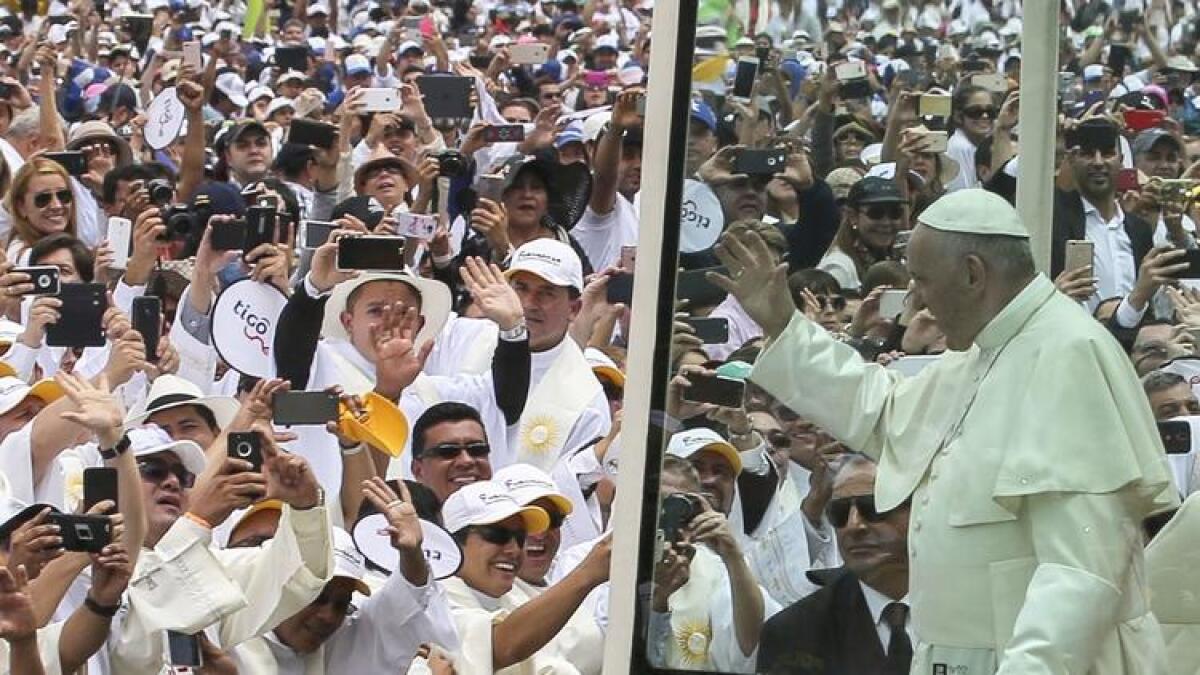
Pope Francis has urged President Trump to reconsider revoking DACA if he considers himself a true “pro-lifer.”
Speaking to reporters as he flew back to Rome after several days in Colombia, Francis said late Sunday that Trump’s decision to end legal protections for people brought to the country illegally as children would split families, “the cradle of life.”
“I have heard the president of the United States speak,” the pope said, according to news accounts. “He presents himself as a pro-life man. If he is a good pro-lifer, he should understand that the family is the cradle of life and you must defend its unity.”
Trump said last week he had decided to terminate the Deferred Action for Childhood Arrivals program in six months. He urged Congress to replace it in that time.
The Obama-era measure provides work permits and other legal documents to 800,000 young immigrants who were brought to the United States illegally as children, and protects them from deportation.
“Removing young people from their family is not a thing that bears good fruit, neither for the young person nor the family,” the pope said.
Francis has previously criticized Trump’s eagerness to build a wall along the U.S. border with Mexico and his decision to withdraw from the Paris climate accord.
During the presidential campaign last year, the pontiff said a person “who only thinks about building walls” is “not Christian.”
Trump responded that it was “disgraceful” for the pope to question his faith.
President Trump on the legacy of 9/11
We are making plain to these savage killers that there is no dark corner beyond our reach.
— President Trump at the Pentagon
Watch live: President Trump and the first lady take part in a 9/11 observance at the Pentagon
Trump and first lady commemorate 9/11
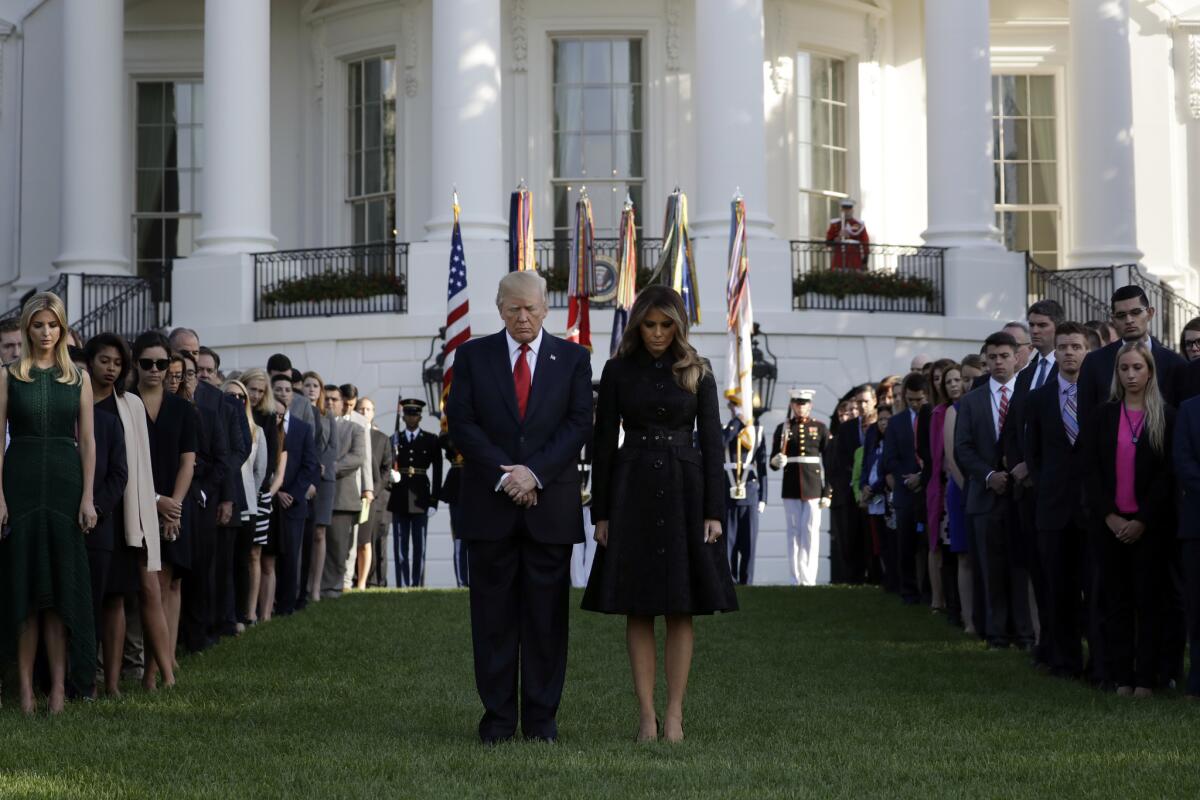
President Trump on Monday was presiding over his first 9/11 commemoration in office, a solemn and nonpartisan occasion in which he was joined by First Lady Melania Trump.
The Trumps observed a moment of silence at the White House in remembrance of the nearly 3,000 people who were killed when hijackers flew commercial airplanes into New York’s World Trade Center, the Pentagon and a field near Shanksville, Pa.
The morning remembrance was scheduled for about the time the first plane struck one of the Twin Towers on the morning of Sept. 11, 2001.
Trump and his wife also are to pay their respects at a Pentagon ceremony led by Defense Secretary James N. Mattis and Gen. Joseph F. Dunford Jr., chairman of the Joint Chiefs of Staff. The observances come as Trump grapples with the death and destruction caused by two hurricanes in three weeks.
Vice President Mike Pence is to represent the administration at an observance at the 9/11 memorial in Shanksville.
A native New Yorker, Trump has a mixed history with 9/11. He frequently uses the terrorist strikes to praise the city’s response but also makes unsubstantiated claims about what he did and saw on that day.
Trump often lauds the bravery of New York police officers, firefighters and other emergency responders who rushed to the Twin Towers, in some cases knowing they probably wouldn’t make it out alive, as an example of the resilience of the city where he made a name for himself.
But Trump has criticized President George W. Bush’s handling of the attacks, accusing his fellow Republican of failing to keep Americans safe.
Trump has also made dubious claims about 9/11, particularly saying when talking about Muslims that “thousands of people were cheering” in Jersey City, N.J., across the Hudson River from lower Manhattan, as the towers collapsed. There is no evidence in news archives of mass celebrations there by Muslims.
Trump has also said he lost “hundreds of friends” in the attack and that he helped clear rubble afterward. Trump has not provided the names of those he knew who perished in the attack, but has mentioned knowing a Catholic priest who died while serving as a chaplain to the city’s fire department.
On ’60 Minutes,’ Steve Bannon strikes at his long list of enemies and raises specter of GOP fratricide ahead
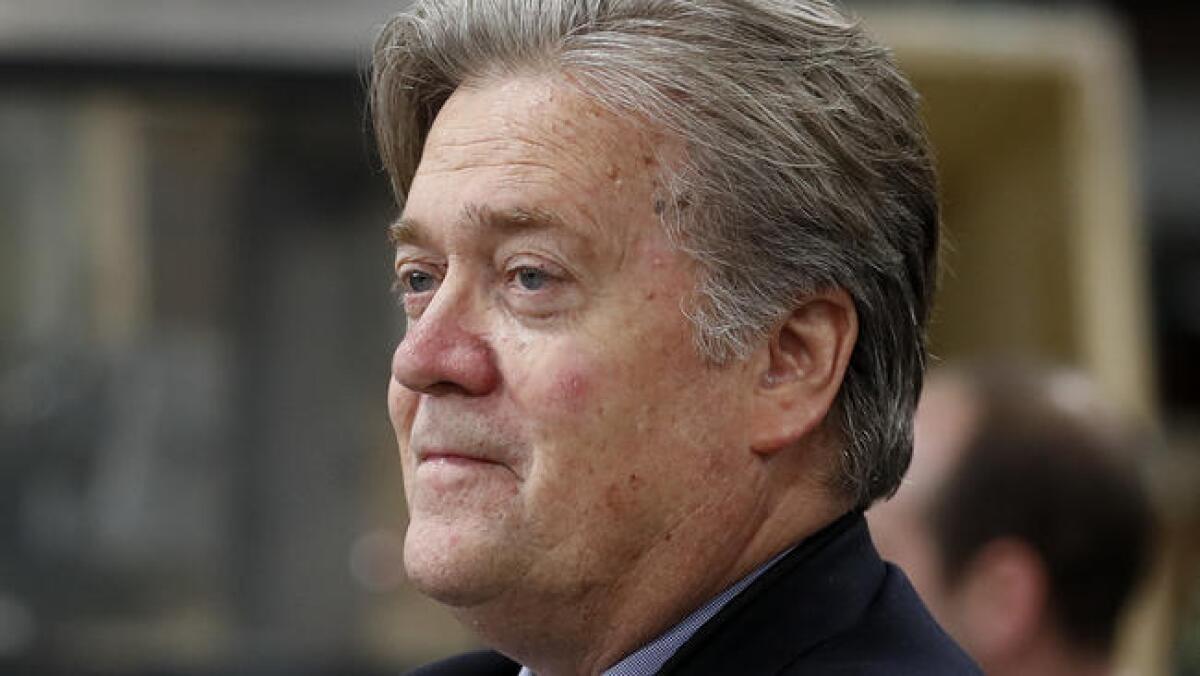
Stephen K. Bannon, President Trump’s former chief strategist, left the White House last month vowing to support the man he helped get into the Oval Office and to savage those he saw as blocking Trump’s way.
It is a long, long list.
In an interview with CBS’ “60 Minutes,” Bannon exacted revenge on a host of people, both Trump supporters and advisors as well as outsiders who never warmed to the president during last year’s campaign.
Of House Speaker Paul D. Ryan and Senate leader Mitch McConnell, who have tried to work with the president despite long-standing concerns: “They do not want Donald Trump’s populist, economic nationalist agenda to be implemented…It’s as obvious as night follows day.”
Of the national security team that helped the last Republican president, George W. Bush, and who have been critical of Trump: “I hold these people in contempt, total and complete contempt…They’re idiots and they’ve gotten us in this situation, and they question a good man like Donald Trump.” (Bannon mocked former secretaries of State Condoleezza Rice and Colin Powell, Vice President Dick Cheney and other national security advisors as the “geniuses” who embroiled the nation in war with Iraq and empowered China economically.)
Bannon saved his most scathing criticisms for those who he said had not been loyal to Trump despite ostensibly being part of his brain trust, including New Jersey Gov. Chris Christie and the president’s chief economic advisor, Gary Cohn.
Christie was blocked from a Cabinet position, Bannon said, because of his reluctance to publicly support Trump in October, when the campaign was upended by the release of an “Access Hollywood” tape in which Trump made vulgar remarks about women to host Billy Bush.
“He wasn’t there for you on Billy Bush weekend so therefore he doesn’t get a Cabinet position?” interviewer Charlie Rose asked.
“I told him, ‘The plane leaves at 11 in the morning. If you’re on the plane, you’re on the team.’ Didn’t make the plane,” Bannon replied.
He said Cohn should have resigned rather than be publicly critical of the president’s recent response to white supremacists marching in Charlottesville, Va. Cohn, who is Jewish, was standing within feet of Trump when the president said there were “some very fine people” among those marchers.
“You can tell him, ‘Hey, maybe you can do it a better way.’ But if you’re going to break, then resign,” he said.
“If you don’t like what he’s doing and you don’t agree with it, you have an obligation to resign.”
Bannon brushed aside mention of Trump’s failures, saying Rose was “holding him to an unfair standard” by judging Trump only months into his presidency.
But he predicted trouble ahead over Trump’s decision to rescind in six months the Deferred Action for Childhood Arrivals program, which protected from deportation young immigrants brought to the country by their parents. Trump cut off the program last week, with a six-month delay to allow the Republican-led House to craft a fix.
“I’m worried about losing the House now because of this,” Bannon said, predicting a party feud like the one that erupted the last time immigration reform was on the table. “And my fear is that with this six months down range, if we have another huge -- if this goes all the way down to its logical conclusion, in February and March, it will be a civil war inside the Republican party that will be every bit as vitriolic as 2013. And to me, doing that in the springboard of primary season for 2018 is extremely unwise.”
Bannon said he wanted Trump to “go full bore” and “focus on the American citizens.” In other words, to rescind the program unilaterally.
“As the work permits run out, they self-deport,” Bannon said of those currently protected by the program. “There’s no path to citizenship, no path to a green card and no amnesty. Amnesty is non-negotiable.”
Bannon, a Catholic, was disdainful of Catholic bishops who have defended immigrants: “They need illegal aliens to fill the churches…They have an economic interest in unlimited immigration, unlimited illegal immigration.”
Since his departure from the White House, Bannon has returned to the helm of the far-right Breitbart media organization he ran before joining Trump’s campaign. He told Rose that he would be Trump’s “wing man outside for the entire time.”
And help destroy Trump’s enemies, Rose asked.
“To make sure his enemies know that there’s no free shot on goal,” Bannon replied.
Unbowed by cancer, John McCain takes on Trump and Republicans on budget, immigrants and climate change
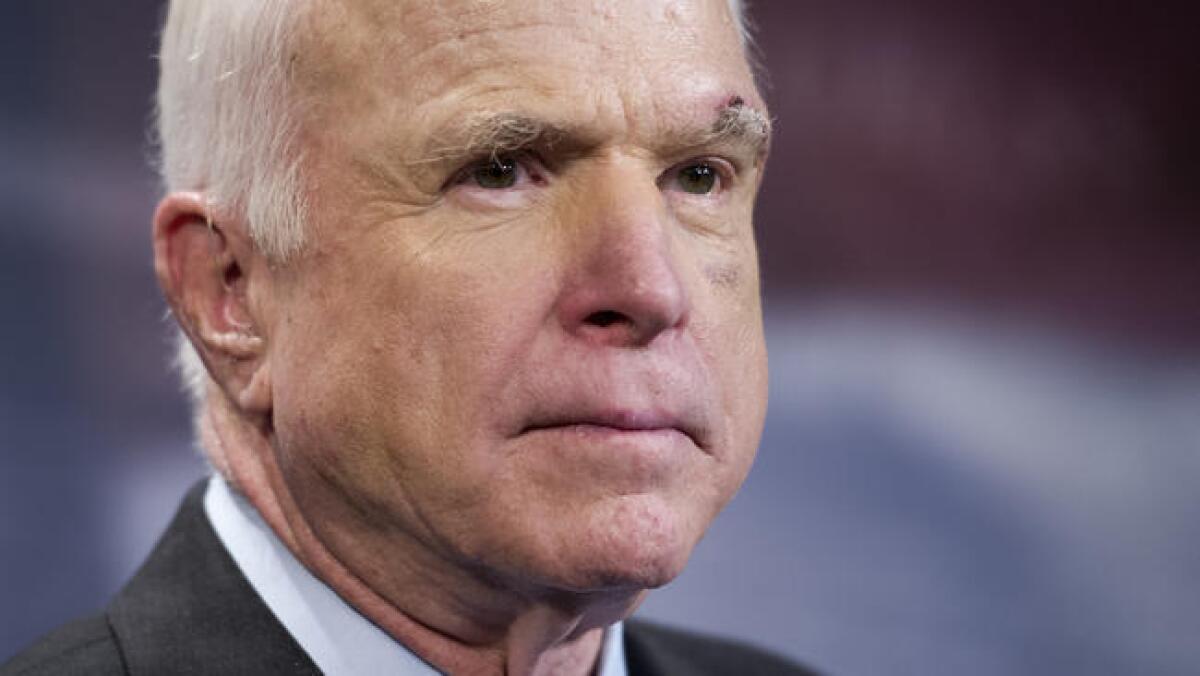
In his first extended interview since returning to the Senate after treatment for brain cancer, Sen. John McCain was his traditionally cantankerous self on Sunday, criticizing President Trump and other Republicans on issues such as illegal immigration and climate change, and calling for more bipartisanship to solve the nation’s problems.
In the latter, he did not include the president’s deal last week with Democratic leaders Rep. Nancy Pelosi of California and Sen. Charles E. Schumer of New York. McCain criticized Trump for ignoring the desires of Republican leaders and said the deal, which extended the debt ceiling and government funding until Dec. 8 and approved $15 billion in hurricane relief, locked in place “unconscionable” past cuts in military spending.
“The agreement that they made is basically devastating to national defense,” the Arizona Republican said on CNN’s “State of the Union.” He blamed recent accidents involving Navy ships — including one named after his father and grandfather, both celebrated admirals — on a lack of training and readiness caused by the spending cuts.
“Under this agreement, they not only don’t have everything they need, their lives are in greater danger. We can’t do that to them,” he said. McCain was one of 17 senators who voted against the deal last week.
McCain also addressed Trump’s action regarding the fate of young immigrants brought to this country illegally by their parents. The president last week rescinded the Deferred Action for Childhood Arrivals, or DACA, program, which protected those immigrants. The president delayed the end of the program for six months to allow Congress to consider a fix.
McCain has long advocated comprehensive immigration reform, and said it now must include protection for DACA beneficiaries.
“It is not conscionable to tell young people who came here as children that they have to go back to a country that they don’t know,” he said.
McCain has long differed with many in his party over climate change. Trump and other Republican leaders have denied that human actions are primarily responsible for changes in the climate and are affecting weather conditions. The destructive impact of Hurricanes Harvey and Irma has resurrected the debate inside the party and out.
“We have to understand that the climate may be changing and we can take common sense measures which will not harm the American people and our economy,” McCain said, citing nuclear and solar panel as appropriate alternatives.
The senator was remarkably upbeat about his own future despite his diagnosis with what he called a “very virulent” form of brain cancer. He said he will undergo tests this week to determine the effect of chemotherapy and radiation he received after surgery this summer that removed a tumor over his left eyebrow.
He said he had suffered no side effects — “except, frankly, an increased level of energy.”
“I’m very happy, I’m very happy with my life, with what I’ve been able to do,” he said. “There’s two ways of looking at this thing…. I am able to celebrate a wonderful life and I will be grateful for additional time that I have.”
He said his prognosis so far was “pretty good” but acknowledged his long-term odds.
And he leaned on a bit of self-deprecation, which he has used for decades, including during his two campaigns for the presidency.
“You gotta have joy! Joy!” he said. “I’m the guy that stood fifth from the bottom of his class in the Naval Academy.”
Congress approves Trump’s deal with Democrats, giving the minority party momentum on tax reform, Dream Act
When President Trump convened congressional leaders this week to negotiate disaster aid and avert a month-end fiscal crisis, the Oval Office conversation quickly turned to what Minority Leader Nancy Pelosi called “the currency of the realm”: votes.
Republican leaders wanted to avoid a short-term accord, and Treasury Secretary Steven T. Mnuchin argued that financial markets would prefer a deal to push the next deadline out 18 months, past the midterm election. At every step in the negotiation, Pelosi raised a simple question: Do Republicans have the votes?
Pelosi, perhaps the most skilled vote-counter in Congress, knew they did not. Back and forth it went until Trump cut off debate, stunning all sides by agreeing with Democrats on a stopgap measure to fund the government and lift the nation’s borrowing limit only until Dec. 8, and provide Hurricane Harvey aid.
“The president has been in a business where knowing your numbers is essential,” Pelosi said Friday in an interview with reporters. “He saw they didn’t have the votes. And we had the plan.”
Congress gave final approval Friday to the surprise package, which Trump swiftly signed into law, giving Democrats momentum over Republicans in the battles ahead over tax cuts and deportation protections for young immigrants known as “Dreamers.”
The outcome was unexpected even a few days ago, but it shows the power that Pelosi (D-San Francisco) and Senate Minority Leader Charles E. Schumer (D-N.Y.) are still able to wield in a Congress controlled by a Republican majority unable to present a unified front and with a political newcomer in the White House willing to make deals.
U.S. military isn’t evacuating service members, terrorist detainees from Guantanamo Bay as Hurricane Irma bears down
The Pentagon decided not to evacuate more than 5,000 people, including U.S. service members and their families, from the naval base at Guantanamo Bay in Cuba as Hurricane Irma closed in Friday.
A special prison at the base also holds 41 detainees captured overseas and held on suspicion of terrorism, including the ringleaders of the Sept. 11, 2001, terrorist attacks.
The base has “initiated its severe weather plans and is preparing to shelter in place,” Navy Cmdr. John Robinson, a prison spokesman, said in a statement.
“It has plans and procedures in place to ensure the safety of detainees in its custody during severe tropical weather conditions,” he said.
“Due to force protection and operational considerations, we do not discuss details about those plans and procedures.”
Irma was on a path to narrowly miss hitting Cuba head-on by moving northward, which factored into the military’s decision. The “Gitmo” base is on the Cuba’s southeastern shore.
It still is likely to face heavy winds and driving rain.
When the first effects of Irma blew into the base Friday afternoon, personnel were instructed to remain off the roads “unless necessary” and told to secure all outdoor furniture and equipment.
Service members were instructed to watch social media, emails and public radio for further information.
Heather Babb, a Pentagon spokeswoman, said the military would “ensure the safety and security of the detainees” at Guantanamo Bay.
“Tropical weather is an expected part of life in the Caribbean and for our personnel charged with securing the detainee facilities,” she said.
“Likewise, they routinely prepare for any contingencies required to safeguard all individuals at the installation in the event that extreme weather impacts the region. There is no intent for the safety of the detainees to come into question during Hurricane Irma.”
Trump administration presses Kuwait on Qatar, North Korean workers
The Trump administration on Friday pressed close ally Kuwait to stop employing North Korean workers in its oil fields, and to do more to defuse the crisis between Qatar and its neighbors.
Secretary of State Rex Tillerson, after meetings with senior Kuwaiti officials, said the U.S. and Kuwait would take new steps to resolve a three-month-old dispute that pits a Saudi-led coalition, including the United Arab Emirates, Bahrain and Egypt, against Qatar over its alleged support for terrorist groups and Iran.
Kuwait has been serving as mediator, with U.S. backing, but without results thus far.
“The United States and Kuwait both recognize the important of GCC [Gulf Cooperation Council] unity, to meet the challenges of the region that we all face together,” Tillerson said.
Qatar is home to the largest U.S. military base in the Middle East, and its isolation could hurt U.S. operations in the fight against Islamic State and other missions.
President Trump has sided with Saudi Arabia, but on Thursday, following his own meeting with the emir of Kuwait, Sheik Sabah al Ahmed al Jabbar al Sabah, he voiced support for mediation.
Tillerson said the U.S. had agreed to “expedite” delivery of F-18 Super Hornet aircraft, sold to Kuwait last year as part of a $10-billion arms deal, and both countries agreed to expand sharing of counter-terrorism and border security information.
Tillerson said he and his Kuwaiti counterparts also discussed the emirate’s employment of guest workers from North Korea.
As part of sanctions to punish Kim Jong Un’s government for its recent nuclear and ballistic missile tests, the U.S. is urging countries everywhere to expel North Korean workers, whose salaries provide much-needed foreign currency for Pyongyang.
Trump lawyers urge Supreme Court to rule for Colorado cake maker who turned away gay couple
Trump administration lawyers joined sides with a Colorado baker Thursday and urged the Supreme Court to rule that he has the right to refuse to provide a wedding cake to celebrate the marriage of two men.
Acting Solicitor Gen. Jeffrey B. Wall filed a friend-of-the-court brief arguing that the cake maker’s rights to free speech and the free exercise of religion should prevail over a Colorado civil rights law that forbids discrimination based on sexual orientation.
“A custom wedding cake is a form of expression,” he said. “It is an artistic creation that is both subjectively intended and objectively perceived as a celebratory symbol of a marriage.” And as such, the baker has a free-speech right under the 1st Amendment to refuse to “express” his support for a same-sex marriage, Wall argued.
The case of the Colorado cake maker has emerged as the latest battle in the culture wars. It is a clash between the religious rights of a conservative Christian against gay rights and equal treatment for same-sex couples.
The brief filed Thursday is likely to bolster the cake maker’s case, and is in line President Trump’s repeated promises to protect “religious liberty.”
China and Pakistan take swipes at Trump’s Afghanistan policy
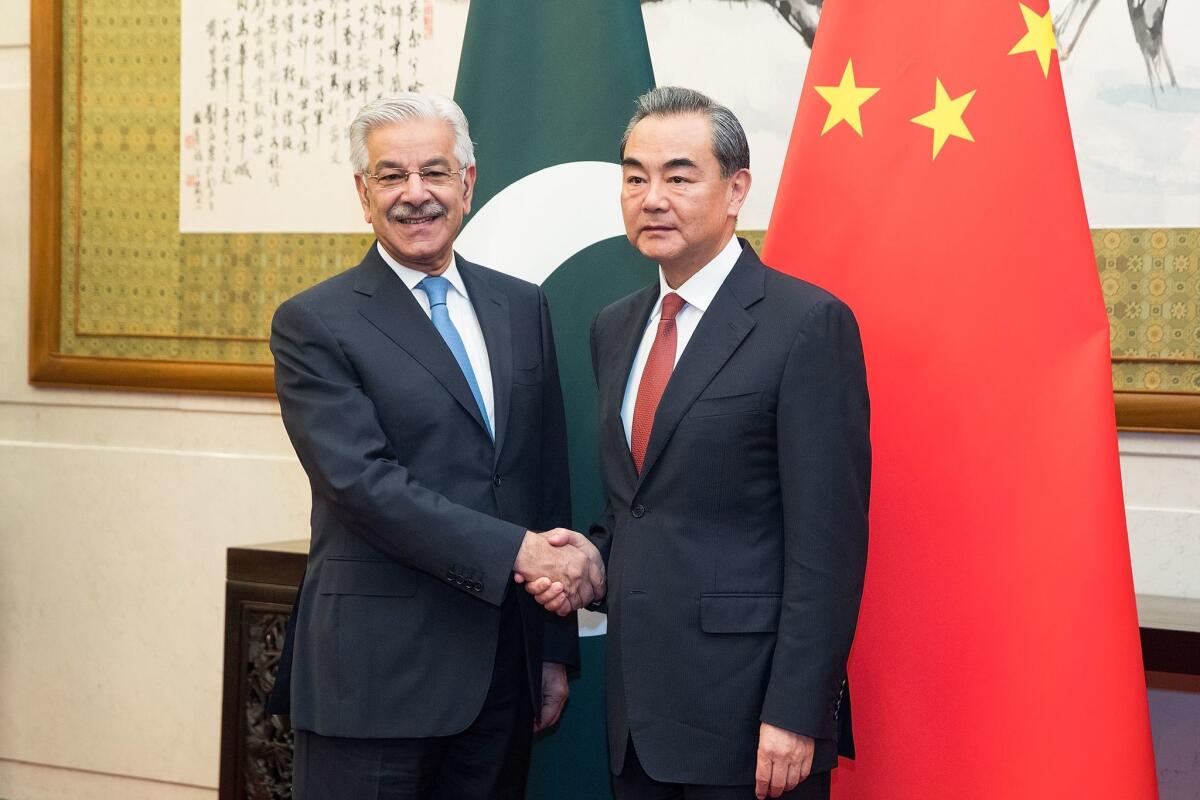
The top diplomats from China and Pakistan took swipes at President Trump’s newly unveiled Afghanistan policy on Friday as they called for new talks with the Taliban to resolve the 16-year conflict.
Chinese Foreign Minister Wang Yi said Beijing stood firmly behind its “ironclad friend” Pakistan, even though “some countries” did not give Islamabad the credit it deserved in fighting terrorism, a pointed reference to the U.S.
Pakistani Foreign Minister Khawaja Asif’s first trip abroad to Beijing this week appeared to highlight how ties between the two all-weather allies have grown even closer while Pakistan’s crucial relationship with the U.S. is disintegrating amid mutual recriminations and distrust.
Wang and Asif announced that China, Pakistan and Afghanistan will hold a new series of three-way talks later this year in China to push forward settlement negotiations with the Taliban while the U.S. doubles down on its military campaign.
Trump infuriated Pakistan last month when he accused Islamabad of providing extremists a haven and threatened to withhold military aid. He further raised alarms in Pakistan when he raised the prospect of recruiting archrival India into the U.S. strategy in Afghanistan.
U.S. officials said this week that $225 million in military aid for Pakistan have been suspended while about 3,500 additional troops will head to Afghanistan to reverse the Taliban’s battleground advances and gain leverage in negotiations.
“It’s our firm view that there is no military solution in Afghanistan, the focus should be on a politically negotiated settlement,” Asif told reporters in Beijing. “China is playing a very constructive role in this regard.”
Pakistan has repeatedly rejected U.S. accusations that it is abetting groups such as the Taliban-linked Haqqani Network, a position that China has backed.
“The government and people of Pakistan have made huge sacrifices in the fight against terror for everyone to see, and the international community should recognize that,” Wang said.
The two ministers presented a closely unified front just days after China handed Pakistan an unexpected diplomatic setback at the BRICS economic summit in Xiamen. On Monday, China joined several nations to declare the Pakistan-based militant groups Lashkar-e-Taiba and Jaish-e-Mohammad as terrorist organizations, in a move that was praised by India and the U.S.
Asif did not address the terror designation on Friday but was quoted by Pakistani media before arriving in Beijing as saying that it should not jeopardize bilateral ties. Rather, Pakistan should put its “house in order,” he said.
Despite some GOP opposition, Congress gives final approval to hurricane aid and Trump’s deal with Democrats
Congress gave final approval Friday to hurricane disaster aid and a short-term debt-and-spending package, with Democrats delivering the majority of votes President Trump needed for the deal.
House passage, by a 316-90 margin, fended off what could have been a month-end fiscal crisis, and assured FEMA won’t run out of money.
But it sets up the next showdown in December as a weakened Republican majority struggles to regroup and Trump reaches across the aisle to Democrats to make gains on his stalled agenda.
As expected, conservatives opposed the deal, but in doing so they bucked their own president’s plan to allow more borrowing beyond the debt limit and continue funding government operations through Dec. 8 without spending cuts or broader fiscal reforms. In the House, 90 Republicans opposed the package.
Trump is expected to sign it swiftly into law.
The package provides $15.2 billion in disaster-related aid, including $7.4 billion for the Federal Emergency Management Agency, which was running out of money after Hurricane Harvey hit Texas and Louisiana last month, and with Hurricane Irma now devastating the Caribbean and threatening Florida. Another $7.4 billion in community block grants was included for housing aid, and $450 million for Small Business Administration loans.
Texas Republicans, a powerful bloc of generally conservative votes, largely backed the measure, even though GOP lawmakers had come under criticism for opposing past aid after Superstorm Sandy in 2013 because it was not offset with spending reductions elsewhere.
Analysis: Trump’s turn to Democrats: A reflection of temporary pique or a larger breach with Republicans?
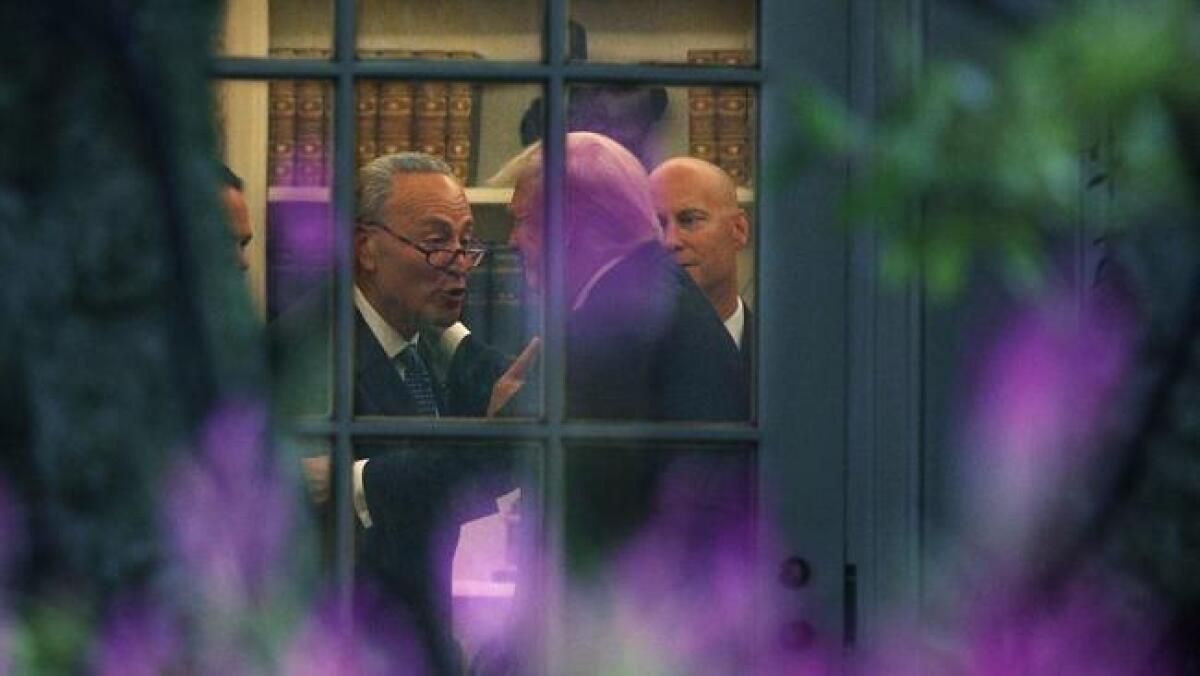
President Trump’s startling alliance with Democrats stemmed from his building frustration with Republican leaders’ inability to secure the legislative victories he assumed would come more swiftly — but its genesis is far more certain that its potential for success.
The new relationship saw its first result on Thursday. The Senate advanced legislation based on Trump’s deal Wednesday with the Democratic leaders, Rep. Nancy Pelosi and Sen. Charles E. Schumer, to extend until Dec. 8 the government’s debt limit and funding, and to offer the first billions in relief money for victims of hurricanes Harvey and Irma.
Trump also indicated his interest in working with Schumer on a longer-term deal: to void the requirement that Congress vote to extend the government’s debt ceiling, a budget exercise that authorizes the Treasury to borrow to cover spending already approved. But lawmakers’ reluctance to cast that unpopular vote has regularly threatened to send the country into default.
The president also met with Democrats from New York and New Jersey to discuss improving transit infrastructure in those states.
Working with Schumer, a New York Democrat he derided as “Crying Chuck” as recently as June, was a sign from the president unseen in the last seven months. From his start, Trump worked solely with Republicans on measures meant to satisfy a narrow, conservative base. But the president suddenly seemed intent on pursuing whatever path allowed him to be seen as the successful deal-maker he’d vowed to be — a promise he has not been able to achieve as his priorities have stalled on Republican-controlled Capitol Hill.
Trump says military action against North Korea is ‘an option’ but not inevitable
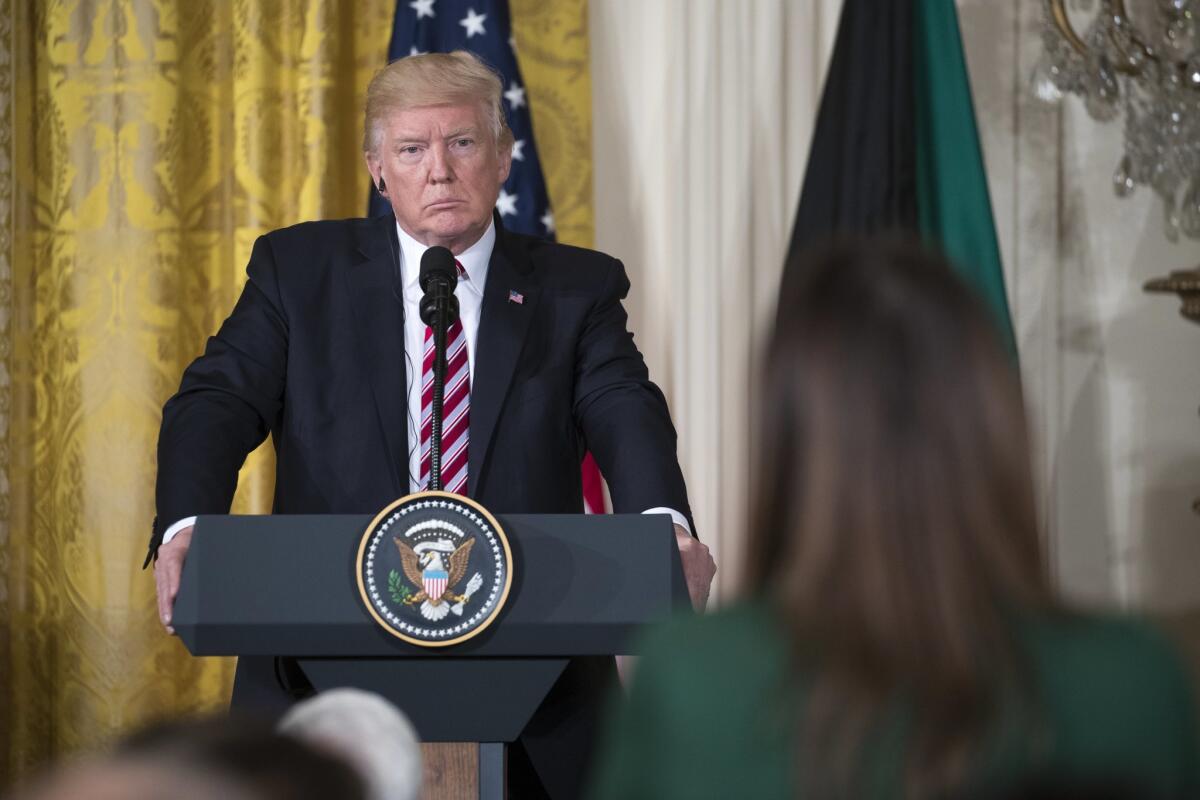
President Trump on Thursday said military action against North Korea remains an option to counter its nuclear missile program, speaking ahead of a weekend when Pyongyang is expected to make another provocative move advancing its effort.
“Military action would certainly be an option,” Trump said at a White House news conference alongside the leader of Kuwait. “Is it inevitable? Nothing is inevitable. It would be great if something else could be worked out.”
Boasting that the U.S. military is stronger than ever with the addition of “new and beautiful equipment,” Trump added, “Hopefully we’re not going to have to use it on North Korea. If we do use it on North Korea, it will be a very sad day for North Korea.”
He concluded, “North Korea is behaving badly, and it’s got to stop.”
Pressure has mounted on Trump to respond as North Korea appears to be getting closer to building a nuclear weapon small enough to be compatible with a missile that can reach the United States.
North Korea appeared to carry out its sixth and most powerful test explosion of a nuclear bomb on Sunday.
Last month, the North Korean military fired a missile into the upper atmosphere in its latest missile test. A threatened South Korea believes the North Korean military is preparing for another test of an intercontinental ballistic missile on Saturday, Prime Minister Lee Nak-yon said Thursday.
Saturday is the anniversary of North Korea’s founding, and its leaders typically celebrate with a show of force.
Trump didn’t answer a question about whether he would accept North Korea as a nuclear power and switch the U.S. strategy to one of containment and deterrence.
Decades of attempts by previous presidents to use sanctions and diplomacy to convince North Korea to abandon its nuclear ambitions haven’t worked, Trump said.
“We’ve had presidents for 25 years now, they’ve been talking, talking, talking, and the day after an agreement is reached, new work begins in North Korea, continuation on nuclear,” he said. “So I would prefer not going the route of the military, but it’s something certainly that could happen.”
Senate approves Hurricane Harvey aid and stop-gap funding package to avoid shutdown, raise debt limit
The Senate overwhelmingly approved disaster aid Thursday for Hurricane Harvey as part of a stopgap package President Trump negotiated with Democrats to fund the government and raise the nation’s debt limit, days before the Federal Emergency Management Agency was expected to run out of money.
Senate passage, by an 80-17 vote, sends the measure to the House, where swift approval is expected Friday, staving off a looming fiscal crisis at month’s end. Most Democrats voted in favor, with the no votes coming from Republicans.
The agreement, which drew protests from conservatives who were largely cut out of the deal, signals Trump’s willingness to leave fellow Republicans behind. In siding with Democrats during a meeting Wednesday at the White House, Trump not only quickly dispensed with weeks of wrangling, he cracked open a strategy that could develop other deals, particularly on immigration to protect young “Dreamers” from deportations, a priority for both the president and many in Congress.
“Let’s hope this is a sign of something to come,” House Minority Leader Nancy Pelosi said Thursday. “What I do know is that the world we live in is a giant kaleidoscope. ... Everybody you work with is a resource to you, or can be.”
Conservatives and other rank-and-file Republicans were fuming that House Speaker Paul D. Ryan and Senate Majority Leader Mitch McConnell failed to negotiate their party’s priorities, including spending cuts. Republicans complained that a short-term deal gives leverage to Democrats for the next round of talks, when the deal expires in December, and forces lawmakers to take another politically difficult vote on the debt limit.
“I will tell you that I gasped when I heard it,” Rep. Kevin Cramer (R-N.D.), a Trump ally, told reporters on Air Force One as the president visited his state Wednesday.
“In fact, I sought clarification when the president told us before the flight. I sought clarification to make sure I understood,” Cramer said. “Voting to raise the debt ceiling more than once in an election cycle is too many, and once is about one too many.”
The deal provides of more than $15 billion in disaster-related aid, replenishing $7.4 billion for FEMA accounts that are being drawn down at a rapid rate to cover the aftermath of Harvey, which devastated Texas and parts of Louisiana. It includes $7.4 billion for community block grants and $450 million for Small Business Administration loans as part of the recovery.
To ensure aid money could flow, Congress needed to allow continued borrowing beyond the current debt limit, which Treasury Secretary Steven T. Mnuchin warned would be hit sooner than initially expected because of the storm costs.
Sept. 30 is also the end of the fiscal year, when Congress needs to fund the government to prevent a federal shutdown, and the confluence of deadlines was creating a potential crisis.
The deal provides continued funding and pushes the debt limit to December, when Congress again will face a deadline, and a potential crisis, ahead of the Christmas holiday break.
12:30 p.m. Updated with more details about the disaster aid.
Senate committee approves two key banking regulators, including one for short-handed Fed
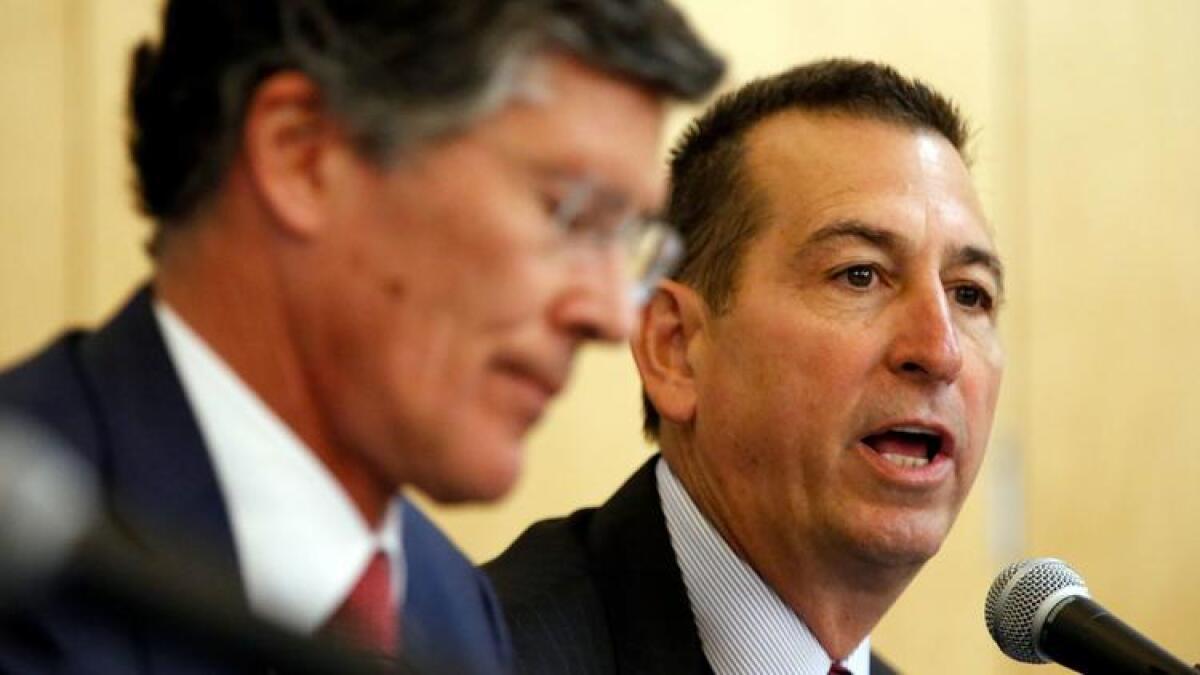
A Senate committee on Thursday approved two of President Trump’s choices for key financial regulatory posts, including one for the short-handed Federal Reserve board, despite concerns from Democrats that the nominees were too close to the industry.
Investment fund manager Randal Quarles has been tapped to be the Fed’s first vice chairman for supervision. His approval by the Senate Banking Committee on a 17-6 vote came a day after another Fed vice chairman, Stanley Fischer, announced he would be stepping down next month, leaving the seven-member central bank board with four vacancies.
The other nominee given the OK on Thursday was Joseph Otting, former chief executive of Pasadena’s OneWest Bank and an ally of Treasury Secretary Steven T. Mnuchin.
Democrats attacked Otting for what they said was OneWest’s aggressive foreclosure practices, and his nomination narrowly was approved 13-10.
Donald Trump Jr. details controversial Trump Tower meeting to committee investigating Russian interference
Donald Trump’s eldest son has told Senate staffers he was open to receiving information about Hillary Clinton’s “fitness, character or qualifications” when he accepted a meeting with a Russian lawyer last year.
Donald Trump Jr. made an opening statement of about 15 to 20 minutes before taking questions behind closed doors from staff members of the Senate Judiciary Committee, one of several congressional panels that have been investigating Russian interference in the election. Sen. Richard Durbin, D-Ill., a member of the committee, said Thursday that the president’s son delivered an opening statement and then described the meeting and “his recollection of it.”
Trump Jr. told the committee, “I did not collude with any foreign government and do not know of anyone who did.”
Trump Jr.’s appearance marks a new phase in the Senate’s investigation and reveals continuing interest in the June 2016 meeting at Trump Tower. Emails he released in July show that Trump Jr. was told before the meeting that he would receive damaging information about his father’s opponent, Democrat Hillary Clinton, as part of what was described to him as a Russian government effort to aid his father, the GOP nominee.
Special counsel Robert S. Mueller III and the House and Senate intelligence committees also are investigating that meeting, which was also attended by President Trump’s son-in-law, Jared Kushner, and then-campaign chairman Paul Manafort. A grand jury has heard testimony about it.
Senate aides also could pursue other possible connections that the president’s family had with Russia.
Trump Jr. agreed to the interview after the committee chairman, Sen. Chuck Grassley (R-Iowa), subpoenaed him and Manafort. The committee withdrew the subpoenas after the two agreed to be interviewed privately by staff members. Grassley said they both would eventually be questioned by senators in a public hearing.
Trump Jr. also was expected to appear before the Senate Intelligence Committee at some point.
Sen. Mark Warner of Virginia, the top Democrat on the committee, said the panel wants to speak with others who attended the June meeting, before interviewing Trump Jr.
“We want to do this in a thorough way that gets the most information possible,” Warner said.
Manafort met privately with staff on that committee in July. Kushner has met with that staff, as well as members of the House Intelligence Committee.
That House committee has tried to talk to Trump Jr., but Rep. Eric Swalwell (D-Dublin.) said negotiations are underway and a date hasn’t been set.
9:42 a.m.: This article has been updated with Trump Jr.’s quotes.
This article was originally published at 8:52 a.m.
Pelosi urged Trump tweet on DACA, says president willing to sign Dream Act
President Trump indicated that he was willing to sign the long-stalled Dream Act into law if it passes Congress, House Minority Leader Rep. Nancy Pelosi said Thursday, another sign that Trump may be uneasy about his decision to phase out DACA.
Pelosi said she encouraged the president in a morning phone call to assure young immigrants that they are not in immediate danger of deportation.
Trump tweeted a message to the so-called Dreamers shortly after his conversation with Pelosi, saying they were in “no danger” during the six months he has given Congress to find a solution to the program.
“The president, I think -- I’m hoping and I’m praying ... that the president really cares about the Dreamers,” the San Francisco Democrat told reporters.
Democrats have vowed to push a vote on the Dream Act, a bill first introduced in 2001 but never approved, as part of must-pass legislation on the congressional agenda this fall.
The latest version of the bill would put young immigrants who were brought into the country illegally as children on a path to legal status.
About 800,000 who received work permits and other protections under the Deferred Action for Childhood Arrivals program could be affected.
Trump on Wednesday outlined the contours of a deal that would beef up border security as part of a legislative fix for DACA, which President Obama created in 2012.
“It’s very clear he wants Congress to act to get this done,” Pelosi said, adding the president indicated he would suppport the Dream Act. “The president said he supports that, he would sign it.”
Watch live: Education Secretary Betsy DeVos to make a ‘major announcement’ on campus sexual assault
President Trump’s campaign takes aim at his new allies, Chuck and Nancy
President Trump’s newfound alliance with “Chuck and Nancy” has its limits.
The morning after Trump bewildered Republicans by siding with the top two Democrats in Congress, Sen. Charles E. Schumer of New York and Rep. Nancy Pelosi of San Francisco, over those in his own party, the president’s reelection campaign Thursday released an ad that targeted them as “career politicians ... trying to stop him.”
The two Democrats also starred as Trump’s nemeses in an ad released by the campaign in August, although that ad took aim at a broader group of Trump opponents.
The new ad includes pictures of Schumer, Pelosi, Sen. Elizabeth Warren of Massachusetts and Rep. Maxine Waters of Los Angeles, while also taking a quick swipe at the media.
“President Trump is fighting for America,” the ad says, then offers a litany of praise: “Over 1 million new jobs, companies investing billions in America, stock market reaching all-time record highs, our border more secure.”
“Americans are saying, ‘Let President Trump do his job and make America great again,” the ad concludes.
Trump shocked his own party Wednesday night when he agreed during a White House meeting with congressional leaders from both parties to the Democrats’ proposal to extend the nation’s borrowing limit and keep the government funded until mid-December. The deal also provided the initial billions expected to be approved for Hurricane Harvey relief.
By making the deal with Schumer and Pelosi, the president undercut Republican leaders’ strategy and significantly weakened their political position heading into a fall full of fights over controversial issues.
During most of Trump’s business career in New York he was a registered Democrat and contributed to numerous Democratic campaigns, including Schumer’s.
En route to an appearance Wednesday night in Bismarck, N.D., Trump also spoke familiarly about the Democratic leaders when it came to finding a solution for young immigrants who had been protected by an Obama administration ruling that Trump voided on Tuesday.
“Chuck and Nancy would like to see something happen, and so do I,” the president said.
Putin jokes that Tillerson has fallen into ‘bad company’
Russian President Vladimir Putin on Thursday joked that U.S. Secretary of State Rex Tillerson had veered off the path of cooperation and “fallen into bad company.”
Putin’s comments at an economic conference in the eastern city of Vladivostok came during an address in which he referenced current tensions between the U.S. and Russia.
In recent weeks, Washington and Moscow have been engaged in a diplomatic tit-for-tat. Russia has ordered the culling of 755 staff members from the U.S. diplomatic mission in Russia. Last week, the U.S. ordered the closure of Russia’s consulate in San Francisco. Putin said this week that he would instruct the Foreign Ministry to take up that move within the U.S. legal system.
Washington and Moscow are also at odds concerning how to resolve the crisis on the Korean peninsula.
Tillerson and Putin have a long, personal history. Tillerson, a former Exxon Mobil chief executive, helped build the oil company’s presence in Russia in the 1990s. He first met with Putin in 1999, when the Kremlin leader was Russia’s prime minister. Later, as president, Putin presided over the signing of a massive deal between Exxon Mobil, then led by Tillerson, and the state-owned Rosneft to develop oil and gas reserves in the Arctic and Baltic seas.
A year later, Putin presented Tillerson with Russia’s Order of Friendship for his contributions to developing Russia’s energy sector.
The Kremlin at first welcomed Tillerson’s appointment as secretary of State. But Kremlin rhetoric is beginning to sound more frustrated. On Tuesday, Putin quipped that President Trump was “not his bride” when asked by a reporter if the Kremlin was disappointed in the new U.S. administration.
In his comments Thursday, Putin hinted that there was still some hope for the relationship with Tillerson.
“I hope that the wind of cooperation, friendship and interaction will bring him to the right course in the end,” Putin said during his address, Russian news agencies reported.
Trump sets contours of a possible legislative compromise for ‘Dreamers’
A day after President Trump threatened to end protections for so-called Dreamers, he stunned all sides again Wednesday by endorsing a legislative fix that could put the young immigrants on the path to legal status.
Trump appeared eager to cut a deal, embracing a plan that has potential to appeal to both Republicans and Democrats. It would combine beefed-up border security with more lasting deportation protections for the nearly 800,000 recipients of the Obama-era Deferred Action for Childhood Arrivals program.
Contours of any emerging agreement remain a work in progress. And Trump, who has shown little hesitation about changing his mind, may do so again, especially if the anti-immigration wing of the Republican Party, led by former advisor Stephen K. Bannon, pressures Congress or Trump to reject any agreement that critics will surely label as amnesty.
But the dire outlook that loomed Tuesday over the young immigrants — sparking an eruption of street protests and an outpouring of public support — lifted somewhat.
“Congress, I really believe, wants to take care of this situation,” Trump told reporters on Air Force One. “I’d like to see something where we have good border security, and we have a great DACA transaction where everybody is happy and now they don’t have to worry about it anymore.”
Facebook says accounts from Russia spent $100,000 on ads during the 2016 election
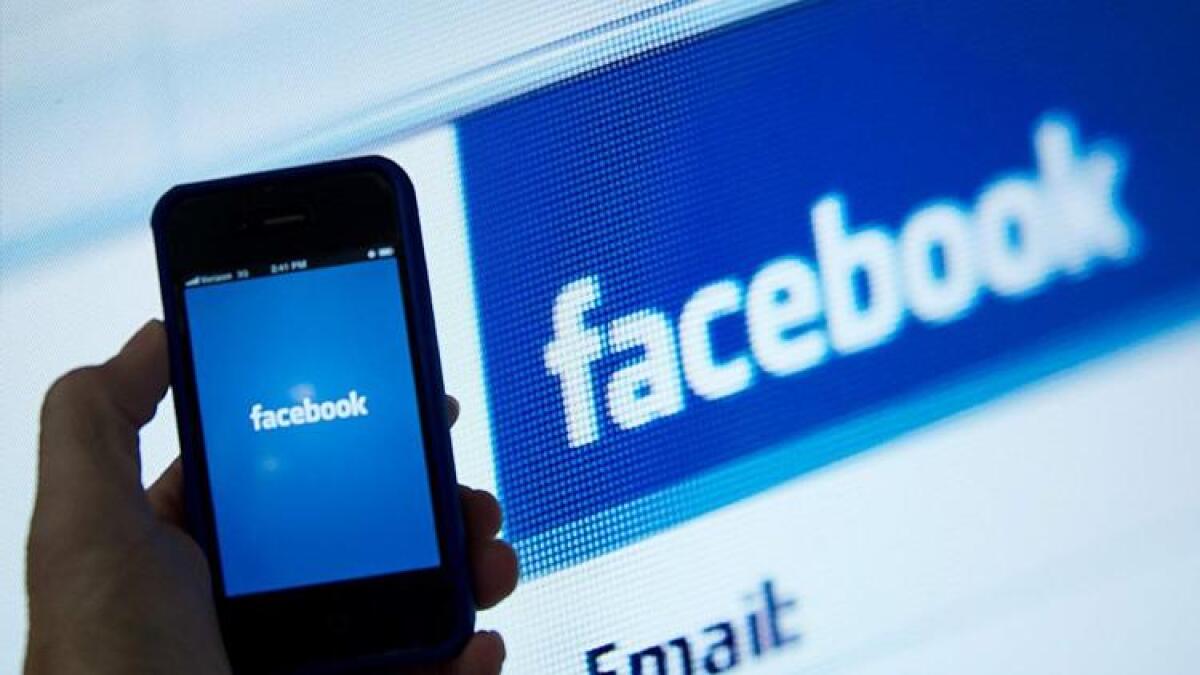
Hundreds of fake Facebook accounts, probably run from Russia, spent about $100,000 on ads aimed at stirring up divisive issues such as gun control and race relations during the 2016 U.S. presidential election, the social network said Wednesday.
Although the number of ads is relatively small, the disclosure provides a more detailed peek into what investigators believe was a targeted effort by Russians to influence U.S. politics during the campaign, this time through social media.
The 470 accounts appeared to come from a notorious “troll farm,” a St. Petersburg-based organization known for promoting pro-Russian government positions via fake accounts, according to two people familiar with the investigation. The people were granted anonymity because they weren’t authorized to publicly discuss details of the investigation.
In all, the accounts purchased about 3,000 ads between June 2015 and May 2017. Though the ads didn’t specifically reference the election, a candidate or voting, they nevertheless allowed “divisive messages” to be amplified via the social media platform, the company’s chief security officer, Alex Stamos, said in a statement.
Facebook has turned over its findings to federal authorities investigating Russian interference in the U.S. presidential election. Robert S. Mueller III, the special counsel, is charged with overseeing the probe into Russian meddling in the U.S. election and any potential coordination with associates of President Trump.
Sen. Mark Warner of Virginia, the ranking Democrat on the Senate Intelligence Committee, said Facebook briefed the panel’s staff on Wednesday, but he still wants to know more.
“I have a lot more questions for Facebook, and I’ve got a lot of questions for Twitter,” Warner said, noting that “we’ve got Twitter coming in.” He did not say when a meeting with representatives from Twitter might occur other than “soon.”
A spokeswoman for Twitter declined comment Wednesday evening.
Warner said he also wants to know more about the content of the ads pushed out by the Russian-based Internet Research Agency and whether they targeted specific voters or locations in the U.S.
He said in many cases the social media messaging “was more about voter depression and suppression without having to necessarily mention an individual candidate’s name.”
Rep. Adam Schiff of Burbank, the top Democrat on the House Intelligence Committee, said Facebook’s disclosure confirmed what many lawmakers investigating Russian interference in the U.S. election had long suspected.
“One of the things that we’re interested obviously in finding out is whether there was any coordination in terms of the use of those paid social media trolls or the Russian use of bots,” he said.
The fake accounts were discovered during a company review of ad buys that was spurred by a broader investigation the company initiated into Russian meddling after the election, Stamos said.
In addition to the 470 accounts that appeared to be run from Russia, Stamos said Facebook’s investigators also discovered an additional $50,000 in spending via 2,200 ads that “might have originated in Russia,” even including ads purchased by accounts with IP addresses in the U.S. but set to Russian in the language settings.
The dollar amount of ad spending identified by Facebook is an infinitesimal amount compared with the total amount of advertising spending during the election. According to ad tracker Borrell Associates, more than $1.4 billion was spent during the 2016 election cycle on digital advertising alone. That figure includes spending on national, state and local elections.
Rep. Eric Swalwell (D-Dublin), who also serves on the House Intelligence Committee, said Facebook’s disclosures help to “fill in with more color some of the lines that exist,” but he would like to know more about the sophistication of the ads. He also wants to know if the content of the ads smacked of Russian propaganda.
“We know they had a cyber operation, we suspect U.S. persons may have been involved, now we know a U.S. company was used. So now we need to see if there are dots that connect,” he said.
The company has come under intense pressure since the election to curb the flow of false information. After the election, it updated its advertising policy to say it wouldn’t run spots that are “illegal, misleading or deceptive, which includes fake news.”
Trump calls for a ‘permanent deal’ for ‘Dreamers,’ along with ‘good border security’
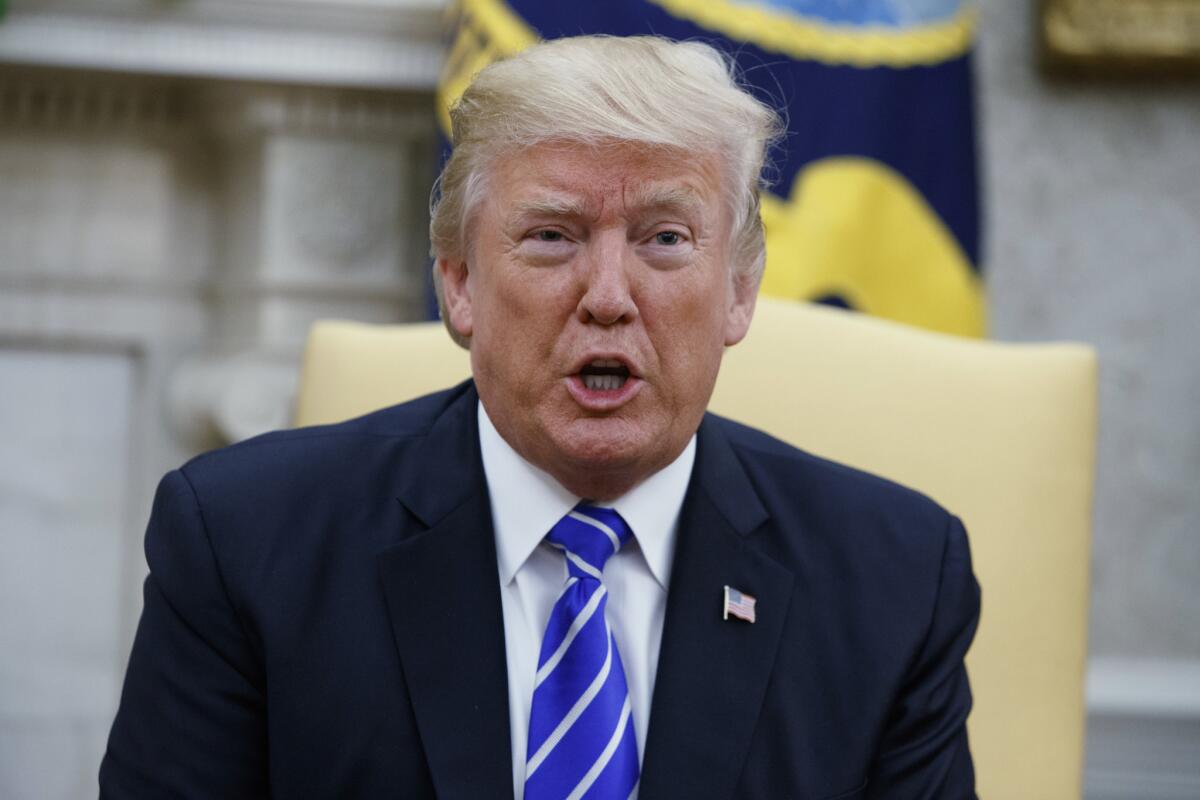
President Trump on Wednesday expressed willingness to work with congressional Democrats for a “permanent deal” to protect from deportation people brought to the country illegally as children.
That threat to the so-called Dreamers now looms because Trump on Tuesday ordered a phase-out of the Deferred Action for Childhood Arrivals, or DACA, program that President Obama created in 2012.
Given widespread public sympathy for the beneficiaries, Trump has seemed eager to find a remedy despite his campaign promise to shut the program down.
“I’d like to see something where we have good border security, and we have a great DACA transaction where everybody is happy,” Trump told reporters on Air Force One before his departure for Bismarck, N.D., where he delivered remarks about tax reform.
Passing a law to give Dreamers permanent legal status came up during an Oval Office meeting of Trump and congressional leaders earlier Wednesday.
At that session, Trump also sided with the Democratic leaders -- Senate Minority Leader Charles E. Schumer and House Minority Leader Nancy Pelosi -- on a stopgap budget deal that upset Republicans but, if passed, would avert at least until mid-December any government shutdown or debt crisis.
Trump, alluding to legal protection for Dreamers, spoke amicably of the Democratic leaders, telling reporters, “Chuck and Nancy would like to see something happen, and so do I.”
“And I said if we can get something to happen, we’re going to sign it and we’re going to make a lot of happy people,” he added.
A law to both protect Dreamers from deportation, allowing them to work and go to school lawfully, and to provide more money for border security would be narrower than the comprehensive plan to reduce legal immigration that administration officials spoke of on Tuesday.
Republicans have condemned Obama’s order creating DACA as an abuse of executive power. Trump’s order to phase it out gives Congress six months, until March 5, 2018, to write a law for an alternative program. Beneficiaries whose two-year permits expire after that date would not be able to renew them, making them liable for deportation to the countries where they were born if Congress doesn’t act.
Trump also attempted to explain what he meant when he wrote in a tweet late Tuesday, hours after announcing he would cancel DACA, that he would “revisit” the issue if Congress failed to act in six months.
“I want to see what happens in Congress. I have a feeling that’s not going to be necessary,” Trump said.
A headline on Breitbart News on Tuesday night called Trump’s tweet about revisiting DACA a “rare negotiating blunder.”
Not often has the president been criticized by that media organization, which is run by Trump’s former strategist Stephen K. Bannon, who was pushed out of the White House last month.
Trump talks to China’s Xi about North Korea
President Trump spoke Wednesday with Chinese President Xi Jinping on how to constrain North Korea following its latest and most powerful nuclear test, in the president’s latest call with world leaders on the crisis.
Trump, who has sought for months to convince China to do more to restrain Pyongyang from testing nuclear weapons and ballistic missiles, suggested that Xi had become more supportive.
“I believe that President Xi agrees with me 100%,” Trump told reporters after the 45-minute conversation. “He doesn’t want to see what’s happening there either.”
“We had a very, very frank and very strong phone call,” Trump added, “President Xi would like to do something.”
Asked if he was considering military action, the president offered a cautious response, saying “Certainly that’s not our first choice.”
“But,” he said several times, “we will see what happens.”
In recent weeks, Trump has threatened to rain “fire and fury” on North Korea if it threatened the U.S. and its allies, and said that “talking” was not the solution. He has taken a more measured response since the weekend’s nuclear test, reaching out to talk with leaders in China, Japan, South Korea, Germany and elsewhere.
And while Defense Secretary James N. Mattis warned Sunday that North Korea faces “annihilation” should it provoke a war, Secretary of State Rex Tillerson has sought conditional negotiations and pressed for additional economic sanctions.
Potential allies against Pyongyang, such as China and South Korea, have been dismayed at the mixed messages emanating from Washington.
In their last conversation around three weeks ago, Xi urged Trump to show restraint, warning that “concerned parties” should avoid “remarks and actions” that could escalate tensions on the Korean peninsula, according to the Chinese account of the call.
The United Nations Security Council unanimously voted to impose new sanctions on Pyongyang after it tested two intercontinental ballistic missiles in July that U.S. officials said were capable of reaching U.S. soil.
North Korean leader Kim Jong Un backed down on his government’s threat to fire mid-range ballistic missiles into waters off the U.S. territory of Guam, and Tillerson told reporters he was encouraged by the apparent show of restraint.
That abruptly changed last week when North Korea fired a ballistic missile over northern Japan and then conducted an underground test of what it said was a hydrogen bomb, a major advance if true.
The nuclear test -- said to be 8 to 10 times more powerful than the atom bomb dropped on Hiroshima in 1945 -- drew swift worldwide condemnation and ratcheted tensions back up.
U.S. Ambassador to the U.N. Nikki Haley told an emergency session of the Security Council on Monday that Pyongyang was “begging for war.”
Mattis testified about North Korea to the House and Senate in closed-door sessions on Wednesday after he spoke to his counterparts in South Korea and Japan.
Mattis reassured both allies that the U.S. commitment to the defense of the countries “remains ironclad” and he promised Japan “to enhance its ballistic missile defense capabilities,” according to Pentagon spokeswoman Dana White.
Nicholas Burns, a veteran former diplomat under Republican and Democratic administrations, urged careful diplomacy instead of threats to deal with North Korea. He also cautioned against regarding Kim as a madman.
“We’re dealing with a government that’s in control of its territory, that’s acting strategically,” Burns, now a professor at Harvard University, said on PBS’ Charlie Rose Show.
“This doesn’t seem to be a suicidal regime,” Burns said. “It doesn’t seem to be an irrational regime. They’re calculating. We’ve got to meet them measure for measure in a sophisticated, diplomatic campaign ourselves.”
Some in conservative media laud Trump’s decision to end DACA
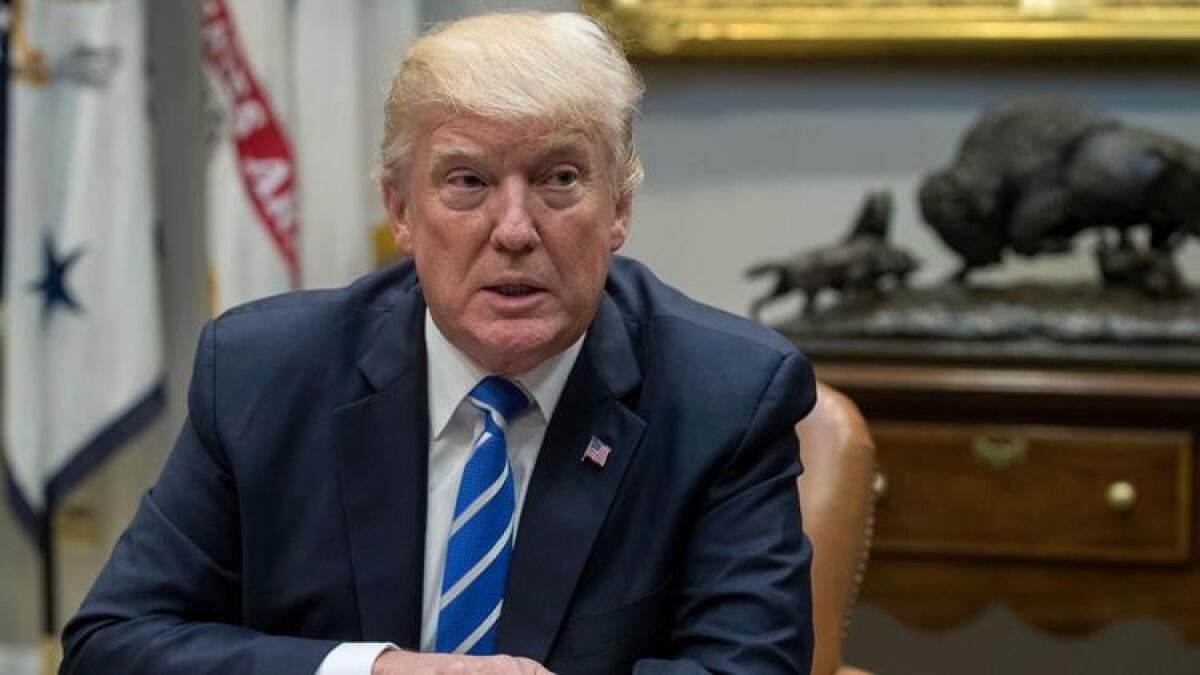
The end is nearing for a program that’s benefited so-called Dreamers.
President Trump’s announcement that six months from now he’ll terminate the Deferred Action for Childhood Arrivals program, commonly known as DACA, has been widely assailed by Democrats and even some Republicans. Trump’s response? Congress needs to act. The move by Trump has, however, seen praise from conservative media.
Here are some headlines:
14 things the MSM won’t tell you about DACA (Breitbart)
For months, the right-wing website has urged Trump to act on immigration and, among other things, end DACA. And in recent weeks, with Stephen K. Bannon, Trump’s former senior advisor who was fired last month, back in charge of the website, it has published several pieces calling on Trump to get tough on illegal immigration.
This piece highlights some of the website’s thoughts about DACA. For example, here’s what the site lists as No. 2: “DACA Recipients Are Illegal Aliens: This simple fact has been so downplayed and memory-holed, it just needed to be spoken out loud.”
To end DACA, follow the Constitution (National Review)
The legal merits of DACA have been debated for years. Even so, courts have never ruled on the constitutionality of the DACA program. It faced no significant challenge in the courts when it was implemented in 2012 by the Obama administration.
In this piece, Andrew C. McCarthy argues the program is not legal.
“There has never been a shred of honesty in the politics of DACA,” he writes. “Democrats have taken the constitutionally heretical position that a president must act if Congress ‘fails’ to. They now claim that to vacate DACA would be a travesty, notwithstanding that the program is blatantly illegal and would be undone by the courts if President Trump does not withdraw it.”
Rescinding DACA is the right thing to do (The Federalist)
Since Trump took office he’s issued several executive orders. Among them: A temporary travel ban for people from six-majority Muslim countries, which has faced a number of legal challenges.
This piece by David Harsanyi highlights some of the reaction from liberals to Trump rolling back the Obama-era order.
“The reaction to DACA exposes much of the disingenuousness of the post-election ‘norms’ crowd,” he writes. “How could those who took part in the national hissy fit over the ‘unconstitutional’ short-term executive restriction on immigration from terrorist-ridden nations now act as if DACA is a proper way to govern?”
Trump Jr. to speak privately to Senate staff on Thursday
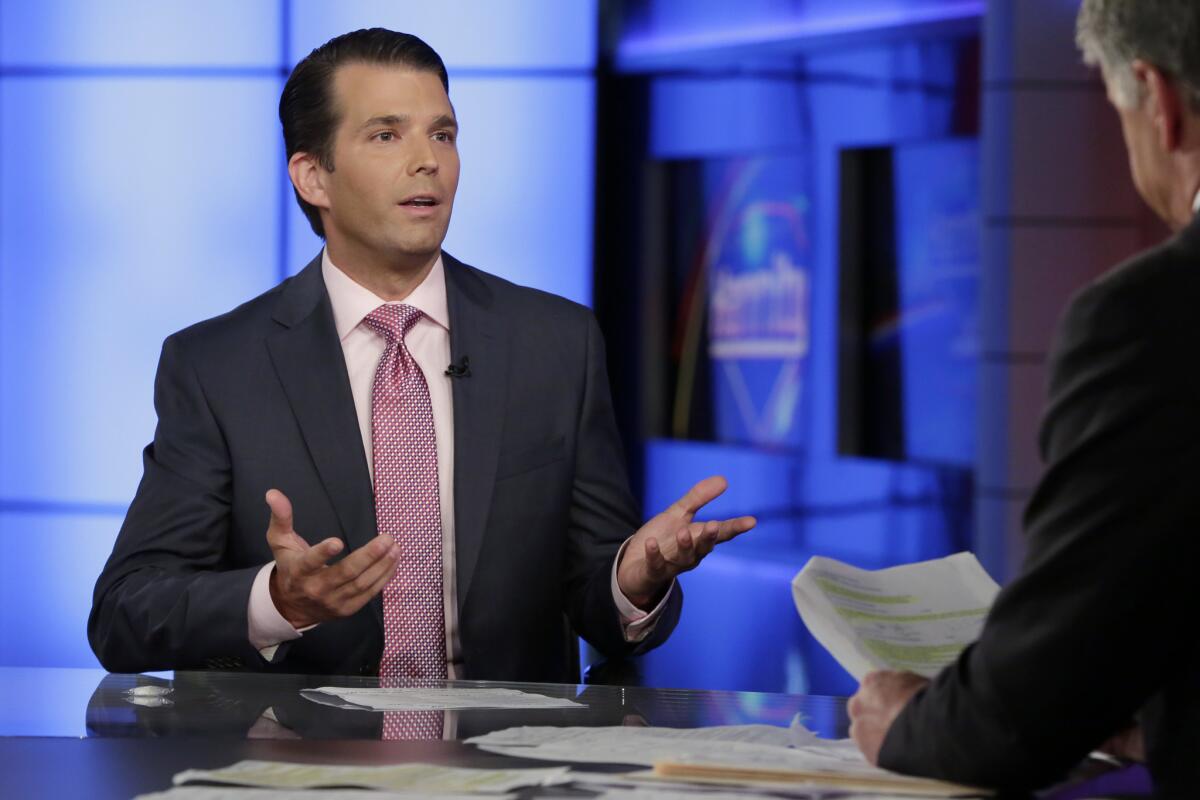
President Trump’s oldest son is expected to meet privately with a Senate committee investigating Russian interference in the 2016 presidential election, several senators said Wednesday.
Donald Trump Jr.’s appearance Thursday before the Senate Judiciary Committee would probably focus on a meeting he had with a Russian lawyer and others during the final stretches of last year’s campaign. Emails released in July show that Trump Jr. was told the session at Trump Tower in New York was part of a Russian government effort to aid his father, the Republican nominee.
Special counsel Robert Mueller is investigating that meeting, also attended by Trump’s son-in-law, Jared Kushner, and then-campaign chairman, Paul Manafort. A grand jury has heard testimony about it.
Trump Jr. has also agreed to appear in the coming weeks before the Senate Intelligence Committee, which is conducting its own investigation.
Separately, President Obama’s national security advisor, Susan Rice, was meeting on Wednesday with the House Intelligence Committee, according to a person familiar with the interview. This person wasn’t authorized to discuss the committee’s confidential work and spoke on the condition of anonymity.
That committee has subpoenaed the Justice Department and the FBI for documents related to a dossier of salacious allegations involving Trump and possible ties to Russia.
As for Donald Trump Jr., some Democratic senators said they planned to attend his session though tradition dictates that senators cannot ask questions at such interviews conducted by committee staff.
Sens. Richard J. Durbin (D-Ill.) and Richard Blumenthal (D-Conn.) said they would be there. Sen. Chris Coons (D-Del.) was considering it.
“I go in with an open mind,” Durbin said. “I want to hear his answers to questions — there are plenty of questions — about the involvement of the Trump corporation as well as the Trump campaign with the Russians and other foreigners, and I just want to hear what Mr. Trump has to say.”
Durbin said he would be “shocked” if questions weren’t asked about whether Trump Sr. knew about the Trump Tower meeting.
“The critical part of his testimony will be following the financial dealing,” Blumenthal said. He said he also wants to find out what Trump Jr. may know about potential obstruction of justice, adding there may have been conversations between the two about the firing of FBI Director James Comey and other matters.
Blumenthal and Coons said the private interview is no substitute for a public hearing, which the committee chairman, Sen. Charles E. Grassley (R-Iowa), has promised will happen.
“This meeting is far less important than his public testimony, under oath, before the American people,” Blumenthal said.
Grassley would not say on Wednesday whether he would issue a subpoena for Trump Jr. if he refuses to testify publicly.
Meanwhile, the Justice Department is reviewing subpoenas from the House intelligence committee.
In a letter Friday that was obtained by the AP, the committee wrote that it had served subpoenas on Aug. 24 to the department and the FBI for documents related to the committee’s investigation of Russian meddling. The Justice Department and FBI had missed the original Sept. 1 deadline, so the committee extended the deadline to Sept. 14.
The letter was signed by the committee chairman, Rep. Devin Nunes (R-Calif.), who stepped back from the Russia investigation this year after he was criticized for being too close to the White House. Rep. Mike Conaway (R-Texas) took over the leading role, but his name does not appear on the letter.
As chairman, Nunes retains subpoena power in the committee.
According to the letter, the original subpoenas requested any documents related to the dossier and sought information about whether the department was involved in its production.
If the documents are not produced, the committee is seeking to compel Atty. Gen. Jeff Sessions, who has withdrawn from investigations examining connections between Trump and Russia, and newly installed FBI Director Christopher Wray to testify in an open hearing. The committee issued two additional subpoenas to Sessions and Wray on late Tuesday.
“Resort to compulsory process was necessary because of DOJ’s and FBI’s insufficient responsiveness to the committee’s numerous Russia-investigation related requests over the past several months,” the letter said.
If the committee is unable to obtain documents or testimony, Nunes wrote, the committee “expressly reserves its right to proceed with any and all available legal options,” including a House vote to hold Sessions and Wray in contempt.
The Justice Department confirmed it was reviewing the subpoenas but declined further comment.
The dossier attracted public attention in January when it was revealed that then-FBI Director Comey had briefed Trump, soon before he was inaugurated as president, about claims from the documents that Russia had amassed compromising personal and financial allegations about him.
It’s unclear to what extent the allegations in the dossier have been corroborated or verified by the FBI because the bureau has not publicly discussed it.
Rep. Adam Schiff, the top Democrat on the Intelligence Committee, said Tuesday evening on MSNBC that the subpoenas were issued over the objections of Democrats. Schiff said Republicans are working harder to discredit those who compiled the dossier than to find out if the allegations in it are true. He said Republicans should be more focused on getting documents from the White House.
The subpoenas were first reported by the Washington Examiner.
Federal Reserve vice chairman to exit, opening another seat for Trump to fill
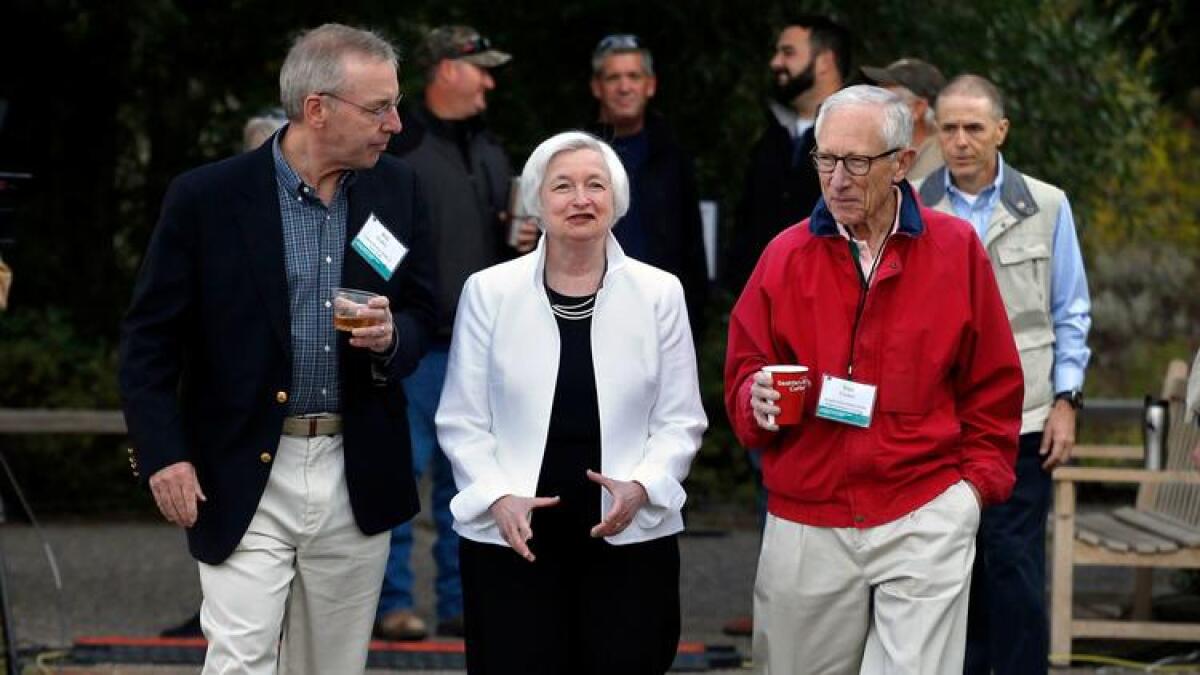
Federal Reserve Vice Chairman Stanley Fischer announced Wednesday that he will step down next month for personal reasons, opening another seat on the central bank’s board for President Trump to fill.
Fischer, 73, is a well-respected economist and former Citigroup official who headed Israel’s central bank during the 2008 global financial crisis. He has been Fed Chairwoman Janet L. Yellen’s right-hand man since taking office in 2014 after being nominated by President Obama.
Fischer’s departure and three existing vacancies on the Fed’s seven-member Board of Governors give Trump the opportunity to completely reshape the panel.
Trump already has nominated investment fund manager Randal Quarles to fill one of the Fed’s vacancies and is considering whether to renominate Yellen for another four-year term. Her term expires in February.
Vice President Mike Pence swears in Jerome Adams as surgeon general
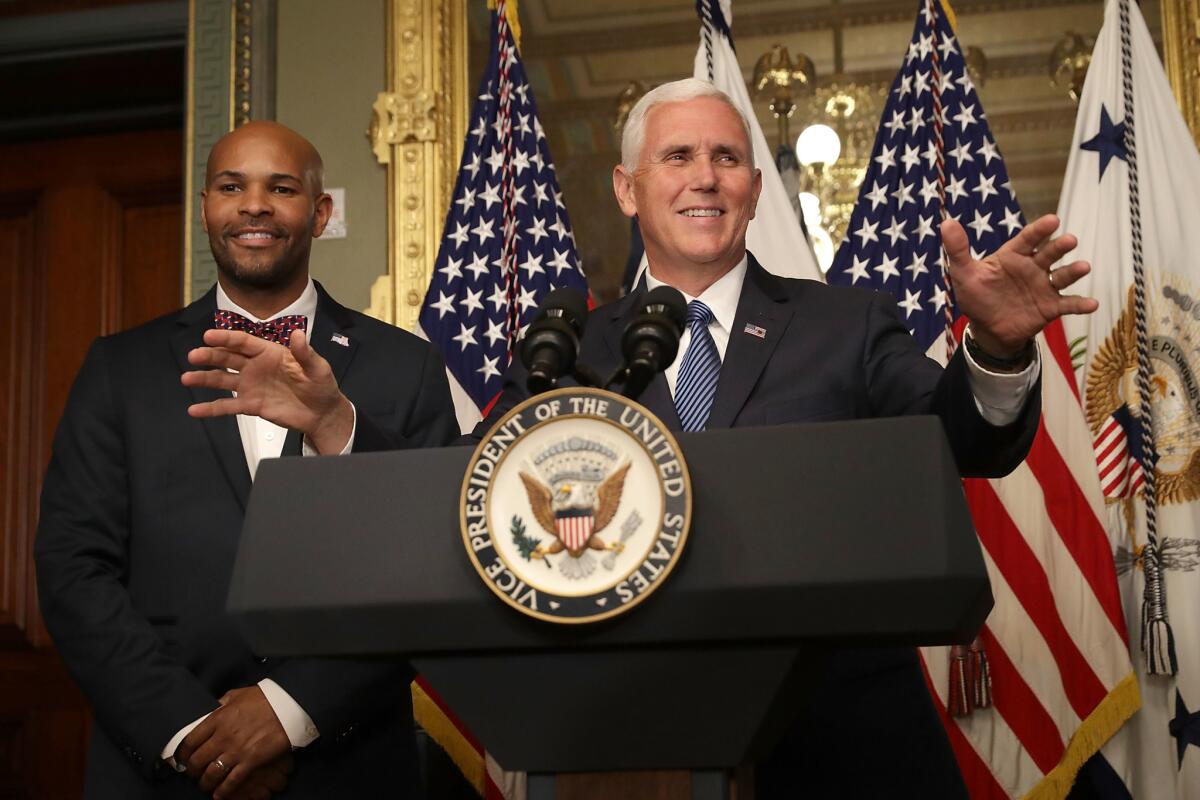
Vice President Mike Pence on Tuesday swore in the administration’s new surgeon general, Jerome Adams, a doctor from Pence’s home state of Indiana.
Adams, whom Pence appointed as Indiana’s state health commissioner during his term as governor, is an anesthesiologist at Eskenazi Hospital in Indianapolis, and a clinical associate professor of anesthesiology at Indiana University.
As state health commissioner for Indiana, Adams said, he and Pence worked together to deal with the state’s HIV crisis, rolled out an alternative to Medicaid expansion and secured more than $10 million in funding to combat infant mortality.
“Today America faces a number of urgent health challenges from the scourge of opioid abuse, infectious diseases, to the health threats arising from the devastating hurricane that beset our neighbors and friends in Texas just a little more than a week ago,” Pence said at the swearing-in ceremony, adding that President Trump was committed to tackling those challenges head on.
Democratic senator plans to travel with Trump to North Dakota for his tax speech
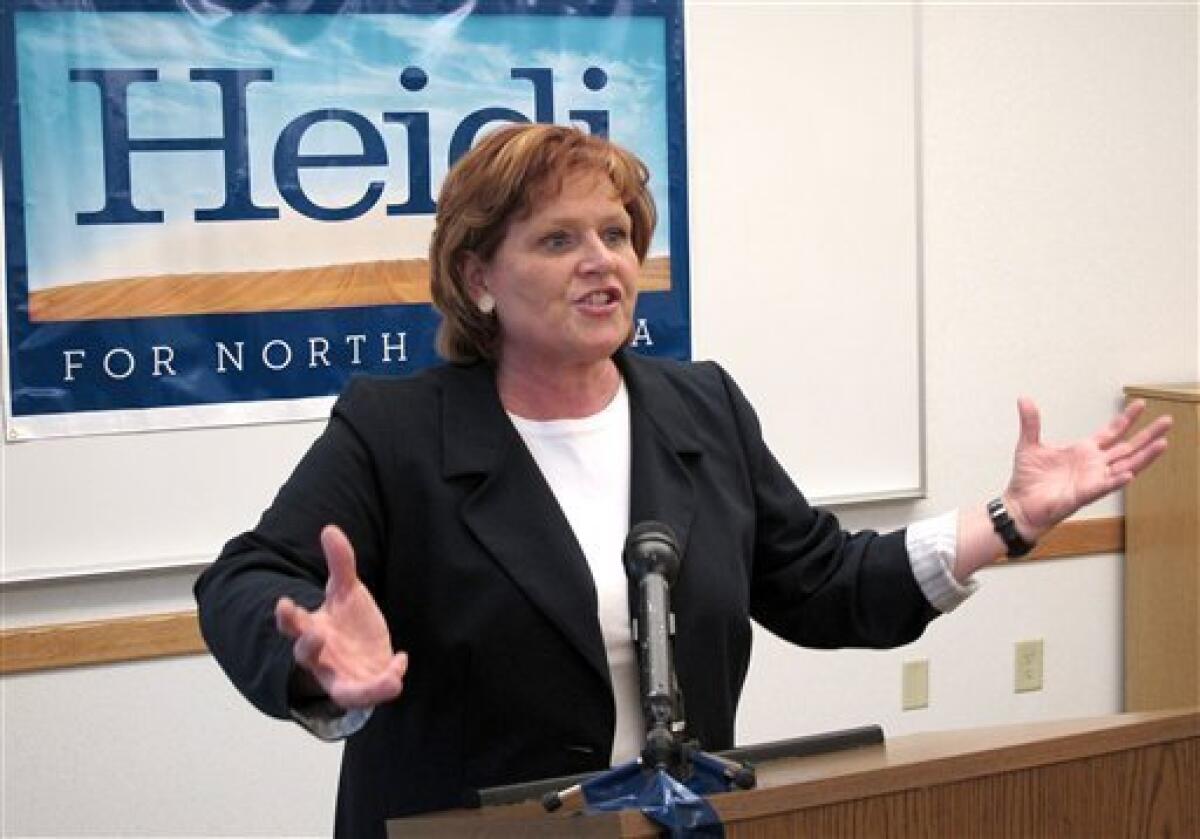
President Trump will take his case for a yet-to-be-released Republican tax overhaul to North Dakota on Wednesday, and this time he’ll have some unusual company – a Democrat.
Sen. Heidi Heitkamp (D-N.D.) plans to travel with Trump on Air Force One and attend a speech he will give at an oil refinery company in Mandan, the city where she lives, according to the White House and Heitkamp’s office.
Trump is hoping to gain Democratic support for a proposal that most likely will revolve around slashing tax rates paid by businesses to try to make the U.S. more globally competitive.
He launched his sales effort last week with a speech in Missouri, even though legislation is still being drafted and there are few specifics.
Heitkamp said she welcomed Trump’s visit to her state and that “North Dakotans are eager to hear more about his tax reform plan.”
They won’t get any new details, senior White House officials said.
Instead, Trump will sketch out the broad principles he presented in Missouri, including simplifying the tax code, reducing taxes for middle-class families and slashing the nation’s 35% corporate tax rate to 15%.
He gave a preview on Tuesday.
“We’re going to cut taxes,” Trump told reporters before a White House meeting with Republican lawmakers and administration officials crafting the tax legislation.
“We’re going to reduce taxes for people, for individuals, for middle-income families,” Trump said. “We are going to reduce taxes for our companies. And those companies are going to produce jobs.”
A bill is expected to be unveiled in the coming weeks with the goal of passing it by the end of the year.
But Congress is running out of time and enacting broad legislation will be difficult, particularly if, as expected, it is projected to increase the budget deficit by reducing overall tax revenue.
Trump will note on Wednesday that the last major tax overhaul, under President Reagan, received bipartisan support in 1986, White House officials said. One of the Democrats who voted for that legislation was North Dakota Sen. Quentin Burdick.
“If Democrats continue their obstruction – if they don’t want to bring back your jobs, raise your pay and help America win – voters should deliver a clear message: Do your job to deliver for America, or find a new job,” Trump will say in his speech Wednesday, according to excerpts released by the White House.
But lawmakers spent a year and a half working on the 1986 tax overhaul instead of trying to pass it in a matter of weeks after it was unveiled. And that legislation balanced rate cuts with other changes, including eliminating tax breaks, so that it did not produce less revenue.
Trump is targeting Democratic senators in states he won last fall. He singled out Sen. Claire McCaskill (D-Mo.) in his speech last week in her home state, which she did not attend, telling the crowd it had to “vote her out of office” if she didn’t vote for the tax bill.
On Sunday, Trump wrote an opinion article on tax reform that appeared in the Milwaukee Journal Sentinel with an eye toward pressuring Sen. Tammy Baldwin (D-Wis.).
Trump won North Dakota by 36 percentage points. Heitkamp’s term expires next year and she has not announced if she is running for reelection.
Also joining Trump on Air Force One on Wednesday will be North Dakota’s other senator, John Hoeven, and its sole House member, Kevin Cramer, both Republicans, as well as Treasury Secretary Steven T. Mnuchin, the White House said.
White House demands major immigration overhaul while mocking lawmakers
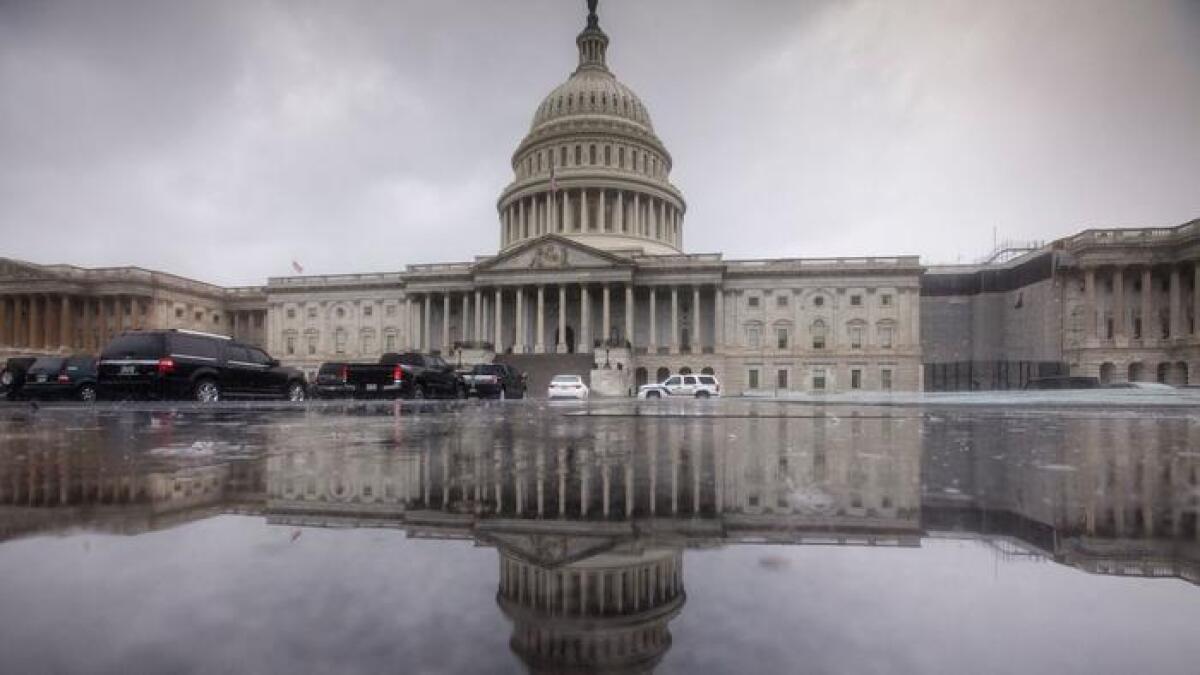
The White House set an ambitious goal for Congress Tuesday — passing a comprehensive immigration overhaul in six months — even as it belittled fellow Republicans who control the House and Senate for failing to pass laws and for taking a summer recess.
The twin messages could hurt President Trump’s already fractious relationship with congressional leaders and make it more difficult for the president to pass an already-crowded legislative agenda that faces multiple obstacles.
White House Press Secretary Sarah Huckabee Sanders said Congress needs to provide more than “just a one-piece fix” to replace the Obama-era program that gives temporary work permits to about 800,000 migrants who came to America illegally as children.
“We’ve got to do an overall immigration reform that is responsible and frankly that’s lawful,” she said during her daily news briefing at the White House.
“The goal here is that Congress actually fixes the problem,” she added.
She suggested that legislation to replace the Deferred Action for Childhood Arrivals program should include, among other provisions, money to build a wall along the border with Mexico.
The wall was a key Trump promise on the campaign trail, but it has gone nowhere in Congress. Democrats needed to pass an immigration overhaul are unlikely to support providing money for the border barrier.
“I don’t think the president’s been shy about the fact that he wants a wall and certainly something that he feels is an important part of a responsible immigration reform package,” Sanders said.
She declined to say what Trump would agree to sign, but said a congressional bill also should include improvements in border control, enhanced vetting of visitors, stricter enforcement of immigration laws and other elements that she said would help American workers.
Trump’s action Tuesday to phase out DACA was accompanied by his demand that Congress pass a replacement in the next six months. Sanders’ comments appeared to broaden that to a far more ambitious immigration overhaul in that narrow time frame.
Immigration matters are always contentious and Congress has a lengthy list of unrelated legislation that is needed to prevent government shutdown or default, or is part of the Republican agenda, this fall.
Congress has repeatedly failed to pass immigration laws even without a deadline. In the most recent serious attempt, the Senate passed a bipartisan overhaul in 2013 - but the bill died in the House when GOP leaders refused to take it up.
Sanders may have added to the tension between Trump and his fellow Republicans in Congress by mocking their failure to pass any major legislation this year — and then taking their annual summer break.
“They just came back from a three-week vacation. I think that they should be — uh — rested and ready to take on some big challenges,” she said. Most lawmakers work from their home state or district during the recess.
Trump similarly took what he called a 17-day working vacation at his golf resort in New Jersey.
Sanders attempted to deflect responsibility for a DACA fix from Trump, who let Congress take the lead in writing such high-priority items as healthcare and tax reform bills. The healthcare bill failed and the tax reform bill has yet to emerge.
“It’s Congress’s job to legislate,” Sanders said. “The American people elected them to do it. And if they can’t, then they should get out of the way and let somebody else take their job, that can actually get something done.”
Members of Congress rarely appreciate admonishments from the White House. Sen. Marco Rubio, a Florida Republican, demanded more specifics from Trump.
“It is important that the White House clearly outline what kind of legislation the president is willing to sign,” he said. “We have no time to waste on ideas that do not have the votes to pass or that the president won’t sign.”
Staff writer Lisa Mascaro contributed to this article.
Obama calls DACA action cruel and unnecessary
The Trump administration’s decision to strip legal protection from hundreds of Dreamers is cruel, immoral and unnecessary, former President Obama said in a scathing statement that called on Congress to restore the protections that he created through the Deferred Action for Childhood Arrivals program.
“To target these young people is wrong — because they have done nothing wrong,” Obama’s statement said. “It is self-defeating — because they want to start new businesses, staff our labs, serve in our military, and otherwise contribute to the country we love. And it is cruel. What if our kid’s science teacher, or our friendly neighbor turns out to be a Dreamer? Where are we supposed to send her? To a country she doesn’t know or remember, with a language she may not even speak?”
Obama challenged claims by the administration that the program was legally precarious. He said the move against DACA was not required by law. “It’s a political decision, and a moral question,” Obama said. And he warned the move will ultimately undermine the economy and the strength of the nation.
“Whatever concerns or complaints Americans may have about immigration in general, we shouldn’t threaten the future of this group of young people who are here through no fault of their own, who pose no threat, who are not taking away anything from the rest of us,” Obama said in the statement.
“Kicking them out won’t lower the unemployment rate, or lighten anyone’s taxes, or raise anybody’s wages.”
“Ultimately,” Obama’s statement said, “this is about basic decency.”
U.N. Ambassador Nikki Haley suggests Iran may be cheating on nuclear deal
The U.S. ambassador to the United Nations, Nikki Haley, painted a damning picture Tuesday of Iran’s compliance with the landmark nuclear disarmament deal brokered by the Obama administration.
Under U.S. law, Trump must certify every three months whether Iran is in compliance with the agreement’s ban on developing nuclear weapons and related restrictions. The next deadline is mid-October.
Speaking at a think tank in Washington, Haley repeatedly suggested that Tehran was cheating and said “hundreds” of “suspicious” sites are out of reach for U.N. inspectors.
She said the crisis with nuclear-armed North Korea foreshadowed what could happen if Iran secretly develops nuclear arms.
Haley would not say what she will recommend to Trump, but she said other countries were willing to turn a blind eye to Iran’s violations in the interest of preserving the 2015 deal.
“What I want the United States to understand [is] we need to wake up,” Haley said at the American Enterprise Institute, a conservative think tank. Iran’s nuclear program, she said, “is not something that suddenly went away but is hiding behind an agreement that everyone is afraid to touch.”
Trump reluctantly certified Iran’s compliance in April and July, but said then he was not inclined do it again. During last year’s election campaign, he vowed to tear up the deal, which he called the worst in history.
The deal, negotiated with Iran by the five permanent members of the U.N. Security Council plus Germany, eased economic sanctions on Tehran in exchange for its destroying or disabling most of its nuclear infrastructure.
Iran has steadfastly denied cheating and the International Atomic Energy Agency, the U.N.’s nuclear watchdog agency, has not uncovered any major violations by Tehran.
The latest IAEA quarterly report, dated Aug. 31, certified that Iran appears to be in compliance. The report noted that Tehran has not attempted to rebuild its disabled heavy-water reactor at Arak, which could produce weapons-grade plutonium.
Haley said Tehran has twice exceeded the prescribed limits on heavy-water production, however. She also said that under the deal, IAEA officials must give notice to the Iranians before some inspections and do not have access to most military sites.
“How can we know if Iran is complying if inspectors cannot look everywhere they should look?” she said.
“This is a jigsaw puzzle,” Haley added. “You can’t just look at a few of the pieces and think you have the answers.”
Advocates of the 2015 accord warn that a U.S. withdrawal would remove impediments that block Iran from producing nuclear-weapons fuel and developing a weapons capability, and thus would be counter-productive.
Haley said, however, that a Trump refusal to certify compliance would not trigger an immediate U.S. withdrawal, but instead would reopen a congressional and national debate on the deal.
Under the deal, Iran agreed to drastically reduce its uranium stockpile and remove two-thirds of its centrifuges, which are used to enrich uranium, among other actions.
In exchange, numerous economic sanctions were lifted from Iran. It was able to resume oil exports and to rejoin the international banking system, major boosts to its flagging economy.
The U.S. has maintained separate sanctions on Iran for its support for terrorist groups and its ballistic missile program. Both Obama and Trump added to those sanctions after the nuclear accord was signed.
Critics long have complained that the accord, officially called the Joint Comprehensive Plan of Action, did not address Iran’s support for terrorist groups, among a litany of militant misdeeds cited by Haley.
“Judging any international agreement ends and begins with the nature of regime that signs it,” Haley said.
“You can look at any place in the Middle East where there are problems, and there are Iranian tentacles there,” she said.
Congress returns to a bruising agenda of must-do items and deepening discord
Congress returns Tuesday to a bruising September agenda of must-do items and deepening discord with the White House, leaving the Republican majority’s hopes for advancing its once-ambitious legislative priorities all but out of reach.
Rather than emerging from the monthlong summer break with renewed legislative purpose, Republicans are approaching the weeks ahead, and its rolling crisis deadlines, with unease.
In a matter of days, Congress must approve disaster funding for Hurricane Harvey, raise the debt limit to avoid a devastating federal default and appropriate money to keep the federal government from shutting down after Sept. 30 — even as the FBI widens its investigation into Russian meddling in the 2016 election and the White House faces off with North Korea.
President Trump will meet with Republican leaders from the House and Senate on Tuesday, but he has done little to promote his party’s priorities. He instead has bashed GOP leaders in Congress, including Senate Majority Leader Mitch McConnell (R-Ky.), with disparaging tweets, essentially erecting new barriers to cooperation with would-be allies on Capitol Hill.
Facing a Democratic minority that is willing to lend support only for the most pressing issues, other Republican goals — repealing and replacing the Affordable Care Act, overhauling the tax code — seem increasingly lost despite the party’s hold on the House, Senate and White House.
“It’s simple,” wrote Stan Collender, a longtime congressional budget analyst. “Trump no longer has any easy — or even relatively easy — options for doing anything legislatively.”
Bipartisan leaders in Congress urge Trump not to withdraw from U.S. trade pact with South Korea
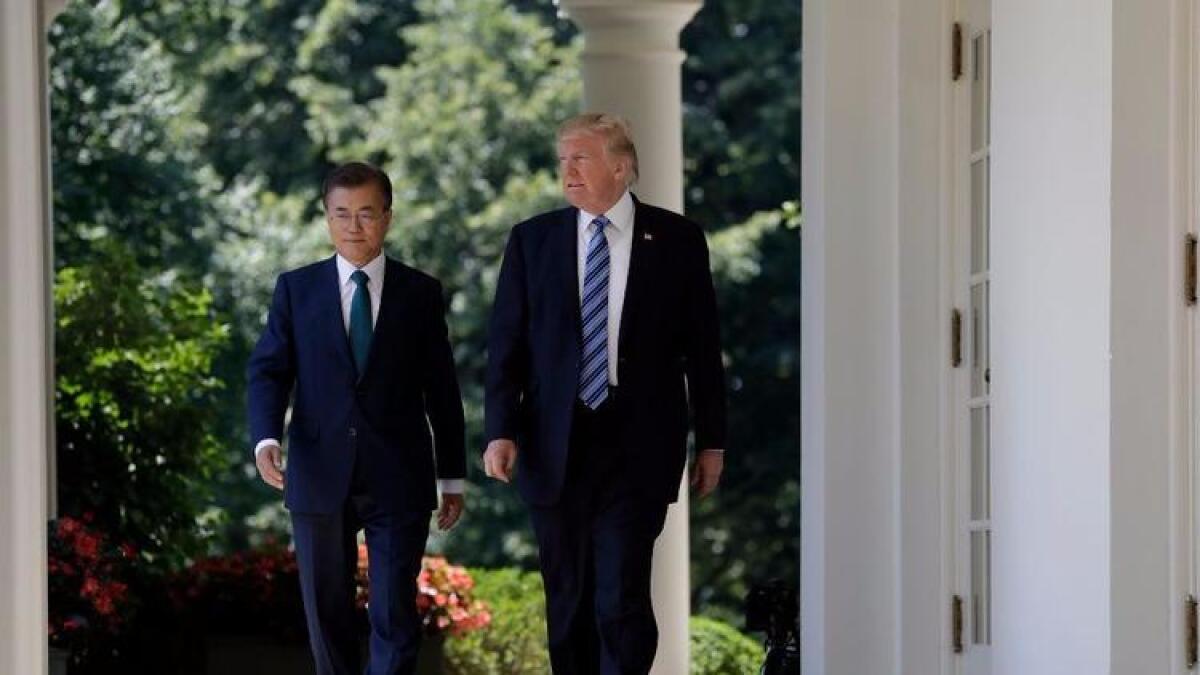
Responding to reports that the Trump administration is considering withdrawing from the U.S.-South Korea free trade agreement, congressional leaders overseeing trade called on the White House to pursue further discussions instead of pulling out of a pact with an important economic and strategic ally, particularly at a time of heightened tensions in the Korean peninsula.
In a rare bipartisan statement Tuesday, the Republican and Democratic leaders of the Senate Finance and House Ways and Means committees acknowledged that the five-year-old free trade accord with South Korea “has presented frustrations for some important U.S. industries and stakeholders” and that the U.S. should press for compliance.
But the lawmakers said that moving to exit the agreement would be neither effective nor constructive. South Korea, they noted, is America’s seventh largest export market.
The Trump administration reportedly could decide as early as this week on whether to give notice of withdrawal from the agreement, but lawmakers as well as some of Trump’s top advisors do not want to risk fraying relations with Seoul, especially while the administration is seeking support in the region and internationally to take more aggressive actions to halt North Korea’s efforts to build nuclear weapons.
“North Korea’s latest nuclear test underscores yet again the vital importance of the strong alliance between the United States and South Korea,” said the statement from House Ways and Means Committee Chairman Kevin Brady (R-Texas) and Ranking Member Richard Neal (D-Mass.), and Senate Finance Committee Chairman Orrin Hatch (R-Utah) and Ranking Member Ron Wyden (D-Ore.).
American businesses and trade groups, including the National Assn. of Manufacturers, are concerned that a decision to withdraw would have severe consequences for American exporters, and they have urged their members to contact congressional representatives.
U.S. trade in goods and services with South Korea totaled about $145 billion last year. The amount of American exports of goods to Korea has changed little in the four full years since the agreement took effect in 2012, but U.S. imports of Korean-made products have jumped almost 19% during that period. Trade-in autos have accounted for much of the increased imbalance.
Trump, who has made rewriting trade deals a top priority, has sharply criticized the deal with South Korea, which was signed by President George W. Bush and finalized under President Obama.
Last month, Trump’s chief trade negotiator, Robert Lighthizer, held a daylong meeting by video with South Korea’s trade minister, Kim Hyun-chong, and there have been subsequent discussions between officials to resolve complaints that Korea has not fulfilled its commitment to open up its services market, among other issues.
“Unfortunately, too many American workers have not benefited from the agreement,” Lighthizer said after that video-conference meeting.
“USTR has long pressed the Korean government to address burdensome regulations which often exclude U.S. firms or artificially set prices for American intellectual property,” he said, noting that U.S. service exports have seen virtually no growth in the last four years.
Follow our live coverage of the DACA decision
The Times has live coverage of the reaction to the decision about “Dreamers.”
Trump asks Congress to act on DACA
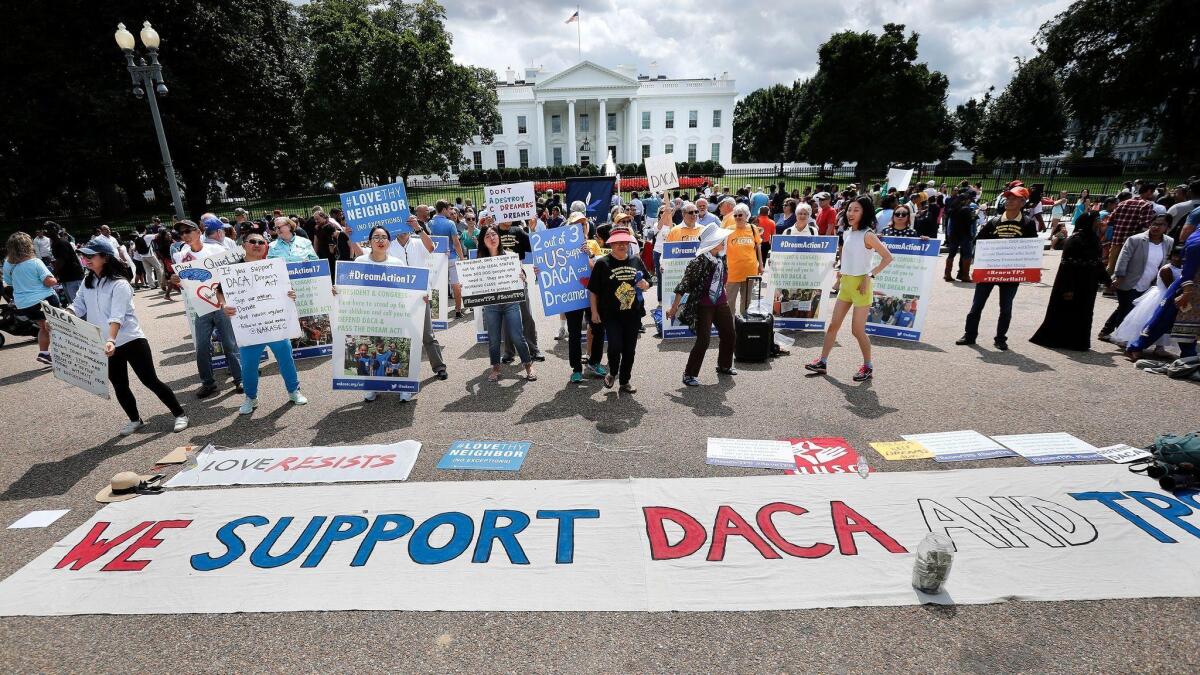
Young people currently shielded from deportation and allowed to work legally in the U.S. under the DACA program will begin losing their protection in March unless Congress acts before then, the Trump administration announced Tuesday.
In the meantime, the administration will continue to renew two-year work permits as they expire but will stop accepting new applications for the program.
The decision allows President Trump to say that he is fulfilling a campaign pledge to end the Deferred Action for Childhood Arrivals program, which President Obama established in 2012, while also attempting to shift responsibility to Congress for the impact on the nearly 800,000 people currently covered by the program.
Putin says of Trump: ‘He is not my bride’
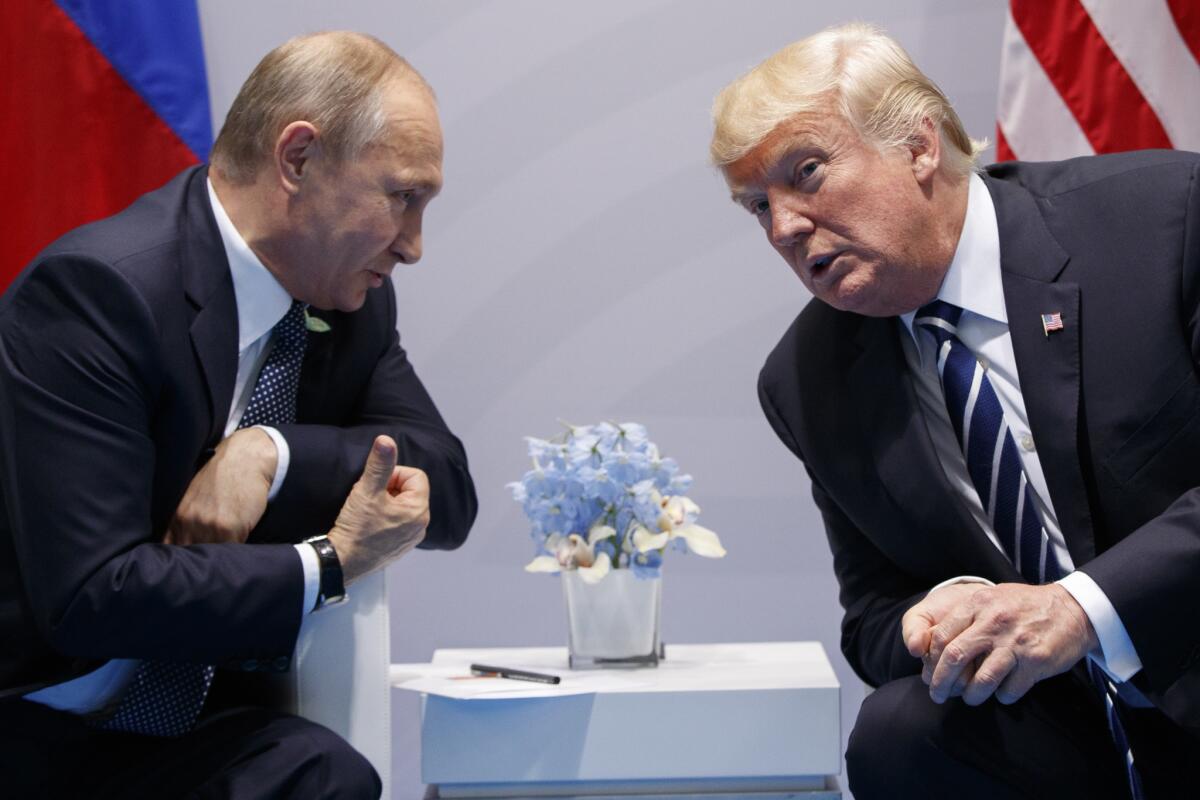
Russian President Vladimir Putin added an unforgettable phrase to the annals of U.S.-Russian relations on Tuesday when he was asked if he was disappointed in President Trump.
Dismissing the question from a reporter as naive, he said: “He is not my bride, and I am not his bride or groom.”
Like Trump, Putin is known for using plain-spoken, and sometimes startling, language. But the marital image was certainly one of the stranger comments to emerge in the wake of one of the tensest diplomatic standoffs between Moscow and Washington since the Cold War.
The Russian leader was speaking to reporters in China, where he is attending the last day of the BRICS summit.
The comment comes after the United States ordered the Russian diplomatic mission to close its San Francisco consulate on Saturday, the latest step in the tit for tat between America and Russia that has led to consulate closures and staff reductions. Putin in July demanded that the American diplomatic mission in Russia reduce its staff from approximately 1,200 to 455, the same number of Russian diplomatic staff in the U.S.
The demand was made after Congress passed another round of sanctions against Russia, which hit the energy sector particularly hard. In January, President Obama ordered 35 Russian intelligence officers to leave the United States and seized two Russian diplomatic compounds in retaliation for accusations that the Kremlin tried to interfere in the 2016 U.S. presidential election.
Putin’s comment reflects a significant change in the Kremlin’s initial positive tone after Trump defeated Democrat Hillary Clinton. Many in Russia’s political elite, and indeed in the country, embraced Trump’s election as an opportunity for an improvement in relations between the two countries.
Trump’s decisions are “guided by the national interests of his country, as I am [guided] by my own,” Putin said.
Putin said the seizure of the Russian consulate in San Francisco was “unprecedented” and said he planned to instruct the Foreign Ministry to take the matter to an American court.
“The American side has deprived the Russian Federation of the right to use our property; this is a clear violation of the property rights of the Russian side,” Putin told reporters in China, the Russian news agency Tass reported.
Trump calls leaders in Asia and Europe to boost pressure on North Korea
President Trump spoke Monday with South Korean President Moon Jae-in and sought to ratchet up pressure on North Korea following its test of what it claimed was a hydrogen bomb over the weekend, the White House said.
Trump also raised North Korea’s sixth and most powerful nuclear test in a Labor Day call with German Chancellor Angela Merkel.
He spoke Sunday with Japanese Prime Minister Shinzo Abe.
The White House said Trump gave his approval in principle to South Korea’s initiative to lift restrictions on its missile payload capabilities. He also gave “conceptual approval” for Seoul to purchase “many billions of dollars” of U.S. military hardware, it said.
“Both leaders underscored the grave threat that North Korea’s latest provocation poses to the entire world” and “agreed to maximize pressure on North Korea using all means at their disposal,” the announcement said.
The two leaders also pledged to strengthen their countries’ joint military capabilities, it said.
In his call with Merkel, the two leaders condemned North Korea’s continued reckless and dangerous behavior and reaffirmed the importance of close coordination at the United Nations, the White House said in a separate statement.
“All options to address the North Korean threat are on the table,” the second statement said.
Analysis: Trump faces pair of double-barreled crises at home and abroad
As a candidate, Donald Trump boasted of his lack of government experience and argued his business background qualified him to handle a president’s most august responsibility — handling the nuclear arsenal.
On Sunday, hours after North Korea claimed it had tested its first hydrogen bomb, far more powerful than its previous nuclear tests, Defense Secretary James N. Mattis emerged from a meeting that Trump had just held with his top national security advisors, and raised the specter of nuclear war.
Standing in the White House driveway with Gen. Joseph F. Dunford, chairman of the Joint Chiefs of Staff, Mattis warned Pyongyang that aggression against the United States or its allies would trigger a unified world response and what he termed the “total annihilation of a country, namely North Korea.”
“Any threat to the United States or its territory, including Guam, or our allies, will be met with a massive military response, a response both effective and overwhelming,” Mattis said.
The warning was all the more severe because it came from Mattis, a retired Marine Corps general who had sought to tamp down so many of Trump’s bellicose comments and tweets in recent weeks that he was forced to deny a split with the president.
Sunday’s drama represented a new reality for Trump. His presidency has been defined largely by political crises of his own making, from his decision to fire FBI Director James B. Comey to his comments after racial violence in Charlottesville, Va. It was inevitable that circumstances outside his reach would complicate his tenure.
And now they have, raising the question of how he will handle a double-barreled pair of crises — the growing threat from North Korea and the recovery and relief efforts for hundreds of thousands of Americans caught in epic floods in Texas and Louisiana.
Obama offered accolades, advice in Inauguration Day letter to Trump
Before he left office in January, President Obama offered his successor accolades and advice in a private letter that underscored some of his concerns as he passed the baton.
In the letter, published Sunday by CNN, Obama praised President Trump, saying: “Congratulations on a remarkable run. Millions have placed their hopes in you, and all of us, regardless of party, should hope for expanded prosperity and security during your tenure.”
Obama went on to urge Trump to “build more ladders of success for every child and family,” to “sustain the international order” and to protect “democratic institutions and traditions.”
Obama wrote: “We are just temporary occupants of this office. That makes us guardians of those democratic institutions and traditions — like rule of law, separation of powers, equal protection and civil liberties — that our forebears fought and bled for.”
It is customary for presidents to leave notes for their successors. But typically these missives do not come to light so quickly. The handoff letters from President George W. Bush in 2009 and President Clinton in 2001 were revealed earlier this year. CNN reports it received the Obama letter from “someone Trump showed it to.”
After taking office, Trump praised the note from Obama, calling it a “beautiful letter” in an interview with ABC. Trump added that he called Obama to thank him for the note.
The White House declined to comment, as did a spokesman for Obama.
In the letter, Obama offered some advice: urging Trump to provide opportunities for those “willing to work hard,” arguing that American “leadership in this world really is indispensable” and asking him to leave “instruments of our democracy at least as strong as we found them.”
Obama also wrote that Trump should “take time, in the rush of events and responsibilities, for friends and family. They’ll get you through the inevitable rough patches.”
He concluded by wishing the “very best as you embark on this great adventure.”
Defense Secretary Mattis warns North Korea it risks ‘total annihilation’

Defense Secretary James Mattis warned Pyongyang against aggression against the United States or its allies, saying it would trigger a unified world response and what he termed the “total annihilation of a country, namely North Korea.”
Speaking outside the White House after President Trump met with his top national security advisors, Mattis asserted that the U.S. has “many” military options, and that the president had been briefed on them.
He addressed North Korean leader Kim Jong Un in tart terms a day after Kim’s government conducted what it claimed was its first hydrogen bomb test, a nuclear device far more destructive than those used against Japan at the end of World War II.
North Korea has notched up several significant weapons advances this summer.
In July it tested two intercontinental ballistic missiles that U.S. experts said were capable for the first time of reaching the U.S. mainland. After threatening to fire midrange missiles toward Guam, it instead lobbed one over Japan, sparking alarms there. The nuclear test, its seventh, is its most powerful so far.
“Any threat to the United States or its territory, including Guam, or our allies, will be met with a massive military response, a response both effective and overwhelming,” Mattis told reporters in the White House driveway. “Kim Jong Un should take heed in the United Nations Security Council”s unified voice.
“All members unanimously agreed on the threat North Korea poses and they remain unanimous in their commitment to the denuclearization of the Korean peninsula. Because we are not looking to the total annihilation of a country, namely North Korea, but as I said we have many options to do so.”
The Defense secretary was accompanied by Joint Chiefs Chairman Gen. Joseph Dunford, the Pentagon’s highest ranking uniformed official. Neither man took questions from reporters.
Mattis’ remarks represented a far more sober threat than the administration had offered earlier Sunday, when Treasury Secretary Steve Mnuchin said he was, as a first step, preparing harsher economic sanctions against North Korea.
Trump later suggested in a tweet that he would consider blocking trade with countries doing business with Pyongyang — a threat principally aimed at China, which is North Korea’s chief trading partner.
The United Nations Security Council recently voted unanimously to impose stricter sanctions on North Korea, and China complied by barring imports of coal and other key commodities.
Intelligence analysts probing size and type of detonation by North Korea
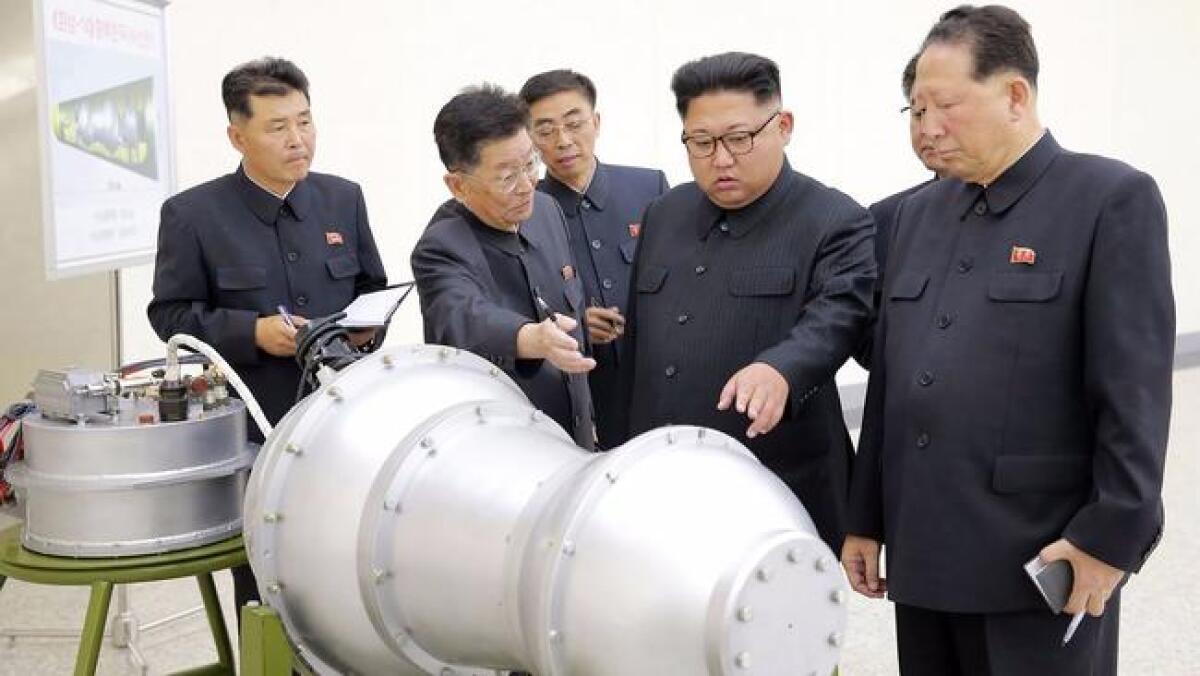
U.S. and international intelligence analysts will pore over all aspects of North Korea’s Sunday weapons test, including sampling air for radioactive particles and studying seismic shock waves, to determine if it actually detonated a hydrogen bomb.
The analysis, which is likely to take weeks, seeks to confirm the size of the detonation, the weapon design and the radioactive fuel used.
Discovering the size of the weapon takes on increased importance since North Korea successfully test launched two intercontinental ballistic missiles — weapons in theory capable of striking the U.S. mainland, including California — in July.
Although North Korea has developed and tested nuclear weapons before, it is not clear that the nation has developed a nuclear warhead small enough to fit atop a long-range missile or robust enough to survive the missile’s fiery reentry into the atmosphere.
But the string of underground nuclear tests and increasingly sophisticated missile flights have led to concerns that North Korea can now strike the U.S. mainland.
An analysis by the U.S. Geological Survey fixed the coordinates of the detonation in the northeast sector of North Korea, an isolated and heavily forested area about 6,000 feet in elevation. The nearest city or town is 14 miles away.
The blast registered on seismographs at about 6.3 in magnitude, which is more powerful than the 5.1 registered in North Korea’s last test in September and earlier in 2013.
The Comprehensive Nuclear-Test-Ban Treaty Organization, a multinational group that monitors nuclear testing worldwide, said more than 100 of its land-based monitoring stations detected the event, and the early analysis confirmed the event was larger than last year’s nuclear test.
“It constitutes yet another breach of the universally accepted norm against nuclear testing; a norm that has been respected by all countries but one since 1996,” Lassina Zerbo, head of the Vienna-based organization, said Sunday in a statement.
“It also underlines yet again the urgent need for the international community to act on putting in place a legally binding ban on nuclear testing once and for all.”
The Air Force Technical Applications Center at Patrick Air Force Base in Florida is responsible for analyzing captured data for the U.S. military. Analysts with the center pore over seismology and launch a so-called nuclear sniffer plane, WC-135 Constant Phoenix, to detect radioactivity.
North Korea has fired 21 missiles during 14 tests since February, including one last Monday that flew over northern Japan. If confirmed, the weekend test would be the sixth nuclear effort.
North Korean leader Kim Jong Un has repeatedly threatened the U.S. territory of Guam, which is home to U.S. Navy and Air Force bases and thousands of troops.
It’s also where nuclear capable B-2 and B-52 bombers are often deployed, which has drawn the ire of Kim. Currently on the island are supersonic B-1 bombers capable of carrying conventional bombs only.
The U.S. military has announced no change in posture, movement of troops, ships or aircraft as a result of Sunday’s test.
Iran has mixed reaction to North Korean nuclear test
In Iran, there were mixed reactions Sunday to North Korea’s claim that it had successfully carried out its sixth and most powerful nuclear test.
The Islamic Republic two years ago agreed to put its nuclear program on hold in exchange for relief from international sanctions that had crippled its economy.
The 2015 nuclear agreement was one of the Obama administration’s key foreign policy achievements, but President Trump has threatened to withdraw from the deal, which could trigger additional U.S. sanctions against Iran. Senior members of his administration have argued that Iran must allow international nuclear inspectors into its military sites, but Iran has refused.
“Korean peninsula on the verge of all out war,” the state-run Islamic Republic News Agency said in a commentary posted online Sunday.
Iranians appeared divided between whether their country should have maintained a similarly defiant stance against the United States and Western powers.
Many Iranians support the nuclear deal because it ended years of economic isolation and began a rapprochement with the West. But the economy has failed to rebound as Iranian President Hassan Rouhani promised.
“Iran was following North Korea’s path but was interrupted,” said a 65-year-old Tehran man named Hadi, who declined to give his surname. “The Iranian authorities should have continued what they were doing.”
Morteza Vakili, a 29-year-old doctoral student in information technology, said Iran’s large and struggling middle class was not like North Korea — one of the world’s most isolated countries — and could not tolerate the re-imposition of harsh international sanctions.
“We are not North Koreans who can eat weeds and survive,” said Vakili, who hopes to move overseas after finishing his degree. “Our government has tried to have good relations with America. We shouldn’t go in North Korea’s direction.”
Domestic and international crises collide Sunday for President Trump
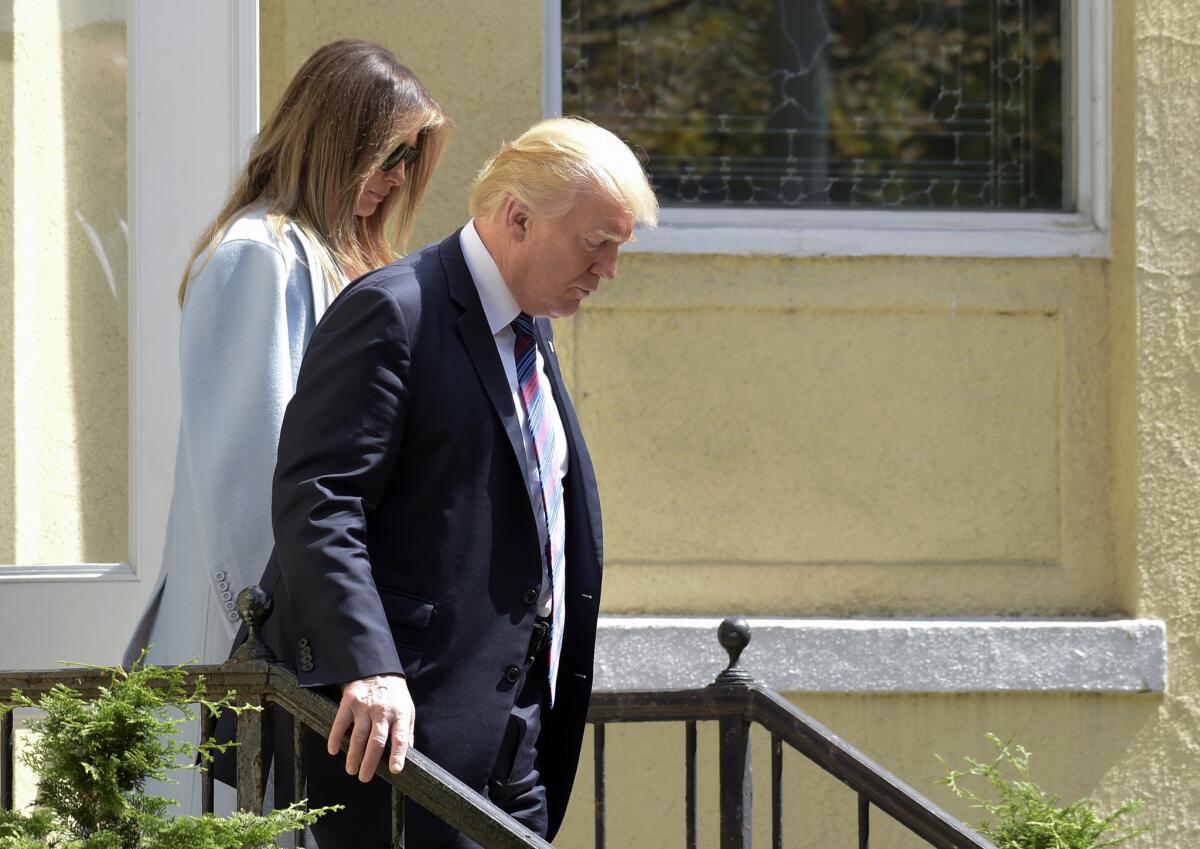
As President Trump looks toward a month already filled with must-do items, crises of both domestic and international import collided on him Sunday.
The president last week declared Sunday to be a day of prayer for the victims of Hurricane Harvey, which cut a swath of destruction across southeastern Texas and western Louisiana.
Trump has repeatedly bragged about declaring the day of prayer, and he and his wife Melania underscored its importance by attending St. John’s Church, across Lafayette Park from the White House. The Trumps attended a prayer service at the Episcopal church before his inauguration.
But a distraction from Sunday’s focus on Harvey victims was the apparent nuclear weapons test in North Korea.
Asked by reporters if he plans to attack North Korea, the president responded, “We’ll see.”
The option of a military response was also suggested in an early morning tweet from the president.
“South Korea is finding, as I have told them, that their talk of appeasement with North Korea will not work, they only understand one thing!” he tweeted.
The president and his national security advisers planned to meet Sunday afternoon, White House Press Secretary Sara Huckabee Sanders said.
As tensions over North Korea flare, Trump aims ire at ally South Korea
Amid worldwide expressions of condemnation over North Korea’s latest nuclear test, President Trump chastised U.S. ally South Korea, warning against “appeasement” of the Pyongyang government.
The escalating North Korea tensions come as Trump is weighing pulling out from a free-trade pact with South Korea. The White House said Saturday that “discussions are ongoing” about the trade agreement.
One of Trump’s key campaign issues was to scrap or re-negotiate what he considers “bad deals” on trade, but critics including Arizona Sen. Jeff Flake (R-Ariz.) say withdrawing from the trade agreement with South Korea would be a bad move at this juncture because it would create the impression of a wedge between the U.S. and its Asian allies.
“I don’t think that would be good in any circumstances – now is particularly troubling,” Flake, a frequent Trump critic, said on CNN’s “State of the Union.”
Flake has been a particular target of attacks by Trump on Twitter and in a fiery presidential speech last week to supporters in Arizona. In a highly unusual show of displeasure toward a Republican senator by a sitting president, Trump has voiced open support for Kelli Ward, a potential primary challenger to Flake.
The trade tensions with South Korea are nothing new. In a June meeting at the White House with South Korean President Moon Jae-in, Trump said he would renegotiate a trade pact that was a legacy of the era of Presidents George W. Bush and Obama.
But as recently as last week, Trump and Moon vowed to press ahead with diplomatic and economic pressure on North Korea. Trump also gave “conceptual approval” to a massive arms sale to Seoul.
Trump and national security team to discuss tougher sanctions on North Korea after nuclear test

President Trump and his national security advisors planned to meet Sunday to discuss options after North Korea’s weekend test of what it claimed was a hydrogen bomb.
White House Press Secretary Sarah Huckabee Sanders said in a morning statement that the president was monitoring the situation “closely.”
“The president and his national security team will have a meeting to discuss further later today,” she said.
The latest nuclear test heightened tensions over North Korea’s aggressive behavior toward its neighbors and threats toward U.S. territory. In recent weeks, it has fired a ballistic missile over Japan and earlier threatened to fire missiles into waters off Guam, a U.S. territory in the Pacific.
The developments complicated what had been the administration’s full focus in recent days: the rescue and recovery effort in Texas and Louisiana following the destructive Hurricane Harvey.
Trump and his wife Melania visited Houston, the epicenter of flooding damage, and Lake Charles, La., meeting with victims and emergency officials.
As attention turned Sunday to international concerns, Treasury Secretary Steve Mnuchin said that he was preparing a stiffer package of sanctions against North Korea and hoped to enlist its neighbors in the effort. He specifically cited China, which has close relations with North Korea.
Trump, in a series of tweets earlier Sunday that appeared to admonish a U.S. ally, hinted at military action in response to the nuclear test.
“South Korea is finding, as I have told them, that their talk of appeasement with North Korea will not work, they only understand one thing!” the president said.
Mnuchin, asked on “Fox News Sunday” whether the weekend test moved the region closer to military conflict, would not rule it out.
“This behavior is unacceptable,” Mnuchin said several times during an interview with anchor Chris Wallace.
“The president has made it clear this isn’t the time for just talk, it is the time for action,” he said.
But Mnuchin emphasized the importance of harsher economic sanctions, saying it was incumbent on all nations to punish North Korea and its leader Kim Jong Un.
“If countries want to do business with the United States, they obviously will be working with our allies and others to cut off North Korea economically,” he said.
Yet the administration also continued to send mixed signals toward the ally most threatened by North Korea—its neighbor to the south.
In addition to his early morning tweet, Trump has recently made clear his dissatisfaction with the trade agreement between the U.S. and South Korea.
Renegotiating that deal as military tensions peak on the peninsula would seem to undercut South Korea, but Mnuchin said the administration still planned to do so.
“In the case of South Korea we obviously provide a lot of military assistance” and other funding, he said. “The president has made it clear we want a better economic deal. There’s been no decision made other than renegotiating that trade agreement at this point.”
Trump after North Korea’s nuclear test: Pyongyang is ‘dangerous’ to U.S.

President Trump on Sunday called North Korea a “rogue nation” and a threat to the United States, hours after Pyongyang announced it had detonated a thermonuclear device, its sixth and most powerful nuclear test to date.
In tweets responding to the North Korean move, Trump seemed to put the onus on China to rein in the government of Kim Jong Un. Beijing is by far North Korea’s largest trading partner, but China has so far rebuffed the notion that responsibility to slow or halt North Korea’s nuclear and missile programs should fall on it.
China is by far North Korea’s biggest trading partner, but Trump on Sunday appeared to be more critical of South Korean President Moon Jae-in, who has attempted to reach out to the North.
North Korea came under worldwide condemnation for the nuclear test, which it described as a “perfect success.” Military experts were still trying to determine the precise strength of the explosion, which set off an artificial earthquake that could be felt in parts of Russia and China.
Trump sees ‘a lot of happiness’ among Houston families forced from their homes by flooding
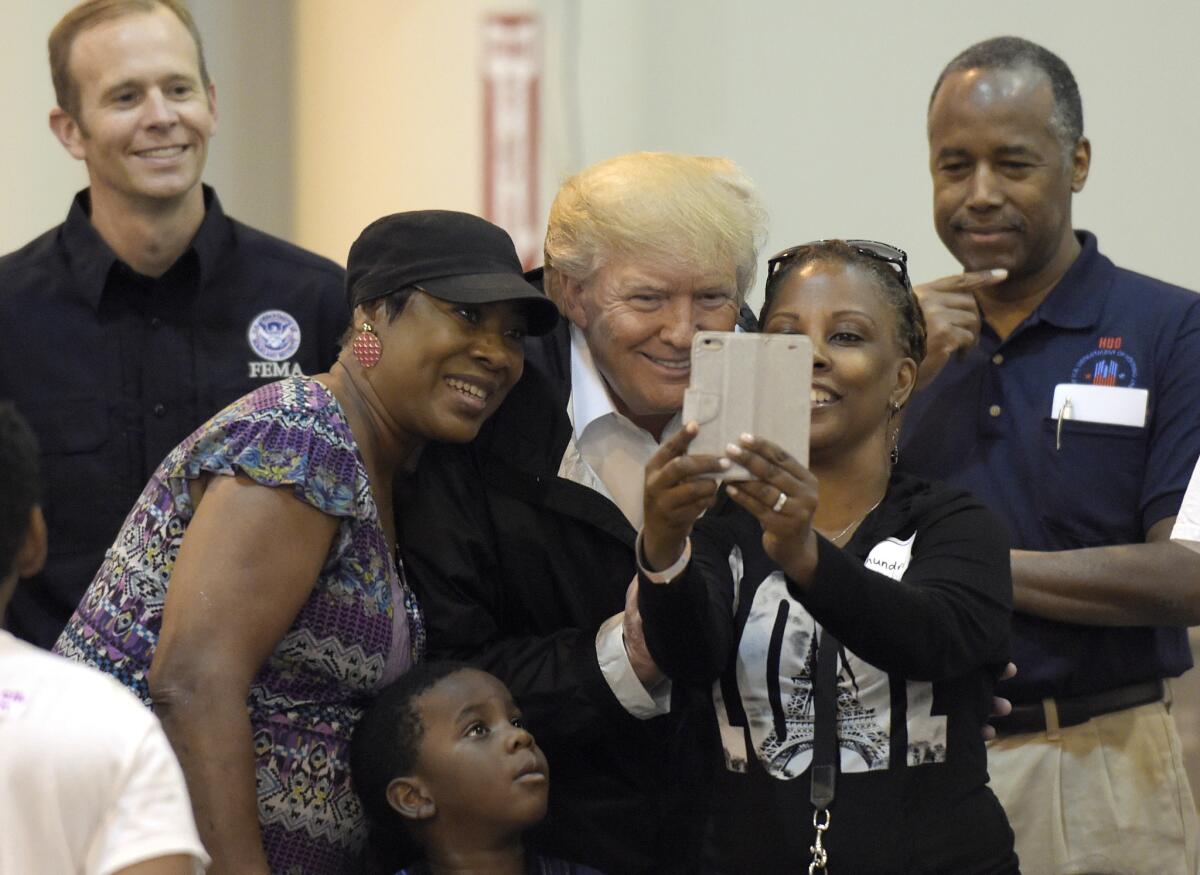
President Trump toured part of a cavernous Houston convention center on Saturday that has provided refuge to thousands of families displaced by flooding since Hurricane Harvey roared into the city a week ago.
Trump said he saw happiness among the people crowded into the NRG Center. Many have lost their homes, cars and possessions in the epic flooding.
“We saw a lot of happiness,” Trump told reporters traveling with him. “It’s been really nice. It’s been a wonderful thing. As tough as this was, it’s been a wonderful thing, I think even for the country to watch it, for the world to watch. It’s been beautiful.”
Asked what people had said to him, Trump replied, “They’re really happy with what’s going on. It’s been something that’s been very well-received. Even by you guys [the media], it’s been well-received.”
The president and First Lady Melania Trump spent almost 45 minutes at the NRG Center, stopping frequently for hugs, handshakes and selfies.
Their first stop was the “kid zone,” where children bounced balls, played board games, did puzzles and colored with crayons.
Trump stopped to talk to three young boys, one with a plastic sword. One ran away, looking pleased but shy, after he got a presidential hug. Trump also briefly hoisted a little girl with tightly braided hair and gave her a quick embrace.
Some of the adults did not sound particularly happy.
Devon Harris, 37, a construction worker, was skeptical about the impact of a presidential visit.
“Is he going to help? Can he help? I lost my home. My job is gone. My tools are gone. My car is gone. My life is gone. What is Trump going to do?”
Later, the Trumps put on plastic gloves and helped hand out lunch boxes — hot dogs, potato chips and applesauce.
Robert Hendricks, 48, an electrical engineer standing on line, was dubious. “What’s he going to do, use us as props to serve us lunch?” Still he said, “It’s good that he’s showing his face.”
But Kevin Jason Hipolito, 37, who was rescued from the roof of his flooded Acura and has been at the shelter for two days, said he was pleased Trump showed up.
“I’m a Democrat,” he said. “It raises the morale. When he went to Corpus [Christi on Tuesday], I was like, ‘Man, he just forgot about us.’ This shows a lot of support. It perks up morale.”
The Trumps later stopped at First Church in Pearland, a large suburban church doubling as a relief center. The president handed out plastic buckets and cardboard boxes of supplies to motorists who formed a queue to pick them up.
Addressing hundreds of volunteers in the church auditorium, Trump congratulated Texans on their storm-recovery efforts and noted long-term recovery could take two to three years.
“They say two years, three years. I think because this is Texas, you’ll probably do it in six months, I have a feeling,” he enthused to cheers from the crowd.
The hall was filled with tables piled high with supplies, and volunteers filled packages with food, diapers, sunscreen, bleach and other supplies.
Many in the room applauded Trump’s visit.
“It’s amazing. It really highlights all the good efforts that so many people are making. I’m glad to see him,” said Shanna Norris, 37, a consultant who attends the church. “It just really showcases the efforts of the United States and the community.”
She doesn’t think much of criticism Trump received for visit to Corpus Christi and Austin on Tuesday, when he met only state officials, not storm victims. “It’s such a wide area. There’s just a lot of devastation.”
Kenny Mercado, senior VP at CenterPoint Energy, an electricity provider, said Trump’s visit “brings spirit, brings hope. This is a city that got a long long long journey ahead. There’s still a lot of work to be done.”
After Trump’s remarks on stage, he and Mrs. Trump went outside, where a line of cars was waiting to collect supplies. They loaded about a half-dozen cars and trucks.
“Hey can you handle this?” Trump said to the first recipient, a man in a pickup truck as the president handed him a plastic American Red Cross bucket.
“There’s a lot of stuff in here,” Trump said. “You’re all set,” he said after loading a few boxes in the flatbed and slapping the truck a couple of times.
“It’s good exercise,” Trump said as the man drove off.
Trump heads to Texas and Louisiana to meet with flood victims and first responders
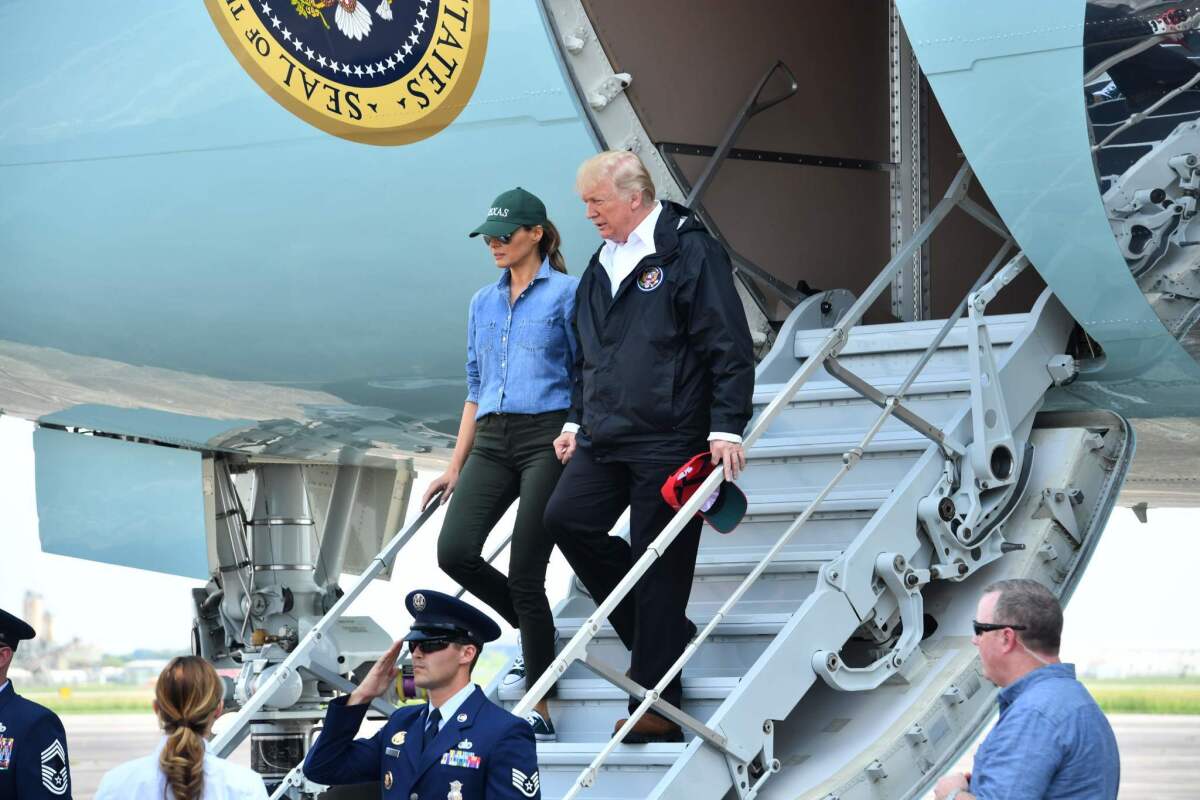
President Trump flew to Houston on Saturday, a week after Hurricane Harvey roared ashore, to survey the devastation, talk with survivors and meet with first responders.
After arriving, the president tweeted: “TEXAS: We are with you today, we are with you tomorrow, and we will be with you EVERY SINGLE DAY AFTER, to restore, recover, and REBUILD!”
He sent the message from his personal Twitter account.
The trip gives Trump a second chance to show empathy for those directly affected by the devastating storm. He flew to Texas on Tuesday but drew bipartisan criticism afterward for failing to meet any victims or express compassion for them. He instead praised the crowd that met him outside a firehouse in Corpus Christi.
Trump steered clear of Houston, the epicenter of the storm’s damage, on Tuesday to avoid disrupting relief and recovery operations there.
His visit Saturday will be different in style and substance.
He and First Lady Melania Trump departed a rainy capital Saturday morning on Air Force One, bound for Ellington Field in Houston, where they were to meet Texans directly impacted by the hurricane and flooding. They then planned to visit a hurricane relief center to meet families displaced by the storm.
Trump and his entourage landed just after 11:15 a.m. local time. He was greeted on the tarmac by Texas Gov. Greg Abbott and a small group of other officials, including military personnel.
The arrival ceremony, on high ground, played out as television screens showed heartbreaking photos of flooded neighborhoods, submerged homes and motor vehicles, and raging fires triggered by the storm and flooding.
The Trumps, both wearing slacks and casual attire, departed the aircraft and spoke privately with the officials who greeted them. Trump made no public remarks.
They plan to fly later Saturday to Chennault International Airport in Lake Charles, La., where they will meet state officials.
They plan to visit a National Guard Armory to meet officials from a county emergency operations center and members of the so-called Cajun Navy, an informal group of private boat owners conducting search-and-rescue operations in flooded areas.
John Kelly, the former Marine general who is the president’s chief of staff, was among the aides accompanying the Trumps on the trip.
“All American hearts are with the people of Texas and Louisiana,” Trump said in his weekly radio address aired Saturday. He described “a spirit of love, determination and resolve” that he said he sensed during his visit Tuesday.
On Friday, Trump met with evangelical leaders to promote his proclamation of Sunday as a national day of prayer for storm victims, along with relief groups leading recovery efforts.
Trump also sent lawmakers a request for a $7.9-billion down payment toward Harvey relief and recovery efforts. Congress is expected to approve the request after it returns Tuesday from its summer break. Estimates of damage range up to $100 billion.
White House seeks $7.85 billion from Congress for Harvey aid, with vote expected next week as FEMA runs low on funds

The White House late Friday requested $7.85 billion for a first installment of disaster aid for damage from Hurricane Harvey, and Congress could vote on it as soon as next week.
President Trump has warned of a long recovery process, and the final costs are far from tallied. The administration’s initial request of recovery funds now tops what is already a packed legislative agenda as lawmakers return to Washington after a summer break.
The request is being treated with some urgency because the Federal Emergency Management Agency is expected to soon run out of cash for its main disaster account, which sources say has less than $2.3 billion available. Projected balances are lower, as the agency faces new costs for temporary housing and other needs.
“The people of Texas and Louisiana were hit very hard by a historic flood,” Trump said Friday during a meeting with representatives of relief organizations at the White House. “Together, we will help them all recover from this tragedy.”
Republicans in Congress have balked in recent years, under a Democratic president, at providing supplemental disaster funding unless it is paid for by spending cuts from federal programs.
But members of both parties appear poised to swiftly consider Harvey funds, especially after Republicans from Texas, a large voting bloc in the House, made it a priority.
White House budget director Mick Mulvaney, who as a House member was among those Republicans who demanded offsetting savings, did not make that a condition of the administration’s request in his letter to Congress.
“This request is a down-payment on the President’s commitment to help affected States recover from the storm, and future requests will address longer-term rebuilding needs,” Mulvaney wrote.
Lawmakers have also warned against linking Harvey aid to other must-pass measures, in particular the administration’s request to raise the federal debt limit by Sept. 30 to avoid defaulting on the government’s obligations.
Mulvaney noted, however, that if the debt limit is not raised, “it may not be possible” to provide the disaster aid “or funds for other critical Government operations.”
Senate Majority Leader Mitch McConnell said in a statement that the Senate “stands ready to act quickly to provide this much-needed assistance to those impacted communities, and support first responders and volunteers.”
The bulk of the request is for money to replenish FEMA’s main disaster fund. An additional $450 million would go to the Small Business Administration for loans.
The White House also is seeking Congress’s authorization later for an additional $6.7 billion for the disaster fund for the upcoming 2018 fiscal year, which begins Oct.1, to cover Harvey and other storms during the Atlantic hurricane season.
In 2013, relief funds after Superstorm Sandy ravaged the East Coast were initially stalled as Republicans tried to require offsetting cuts elsewhere. Funding for a string of 2011 disasters, including a tornado that ravished Joplin, Mo., met similar resistance before being approved. In the House, Democrats had to provide enough votes for passage though Republicans were the majority.
Richard Cordray could step down soon, leaving the Consumer Financial Protection Bureau in limbo
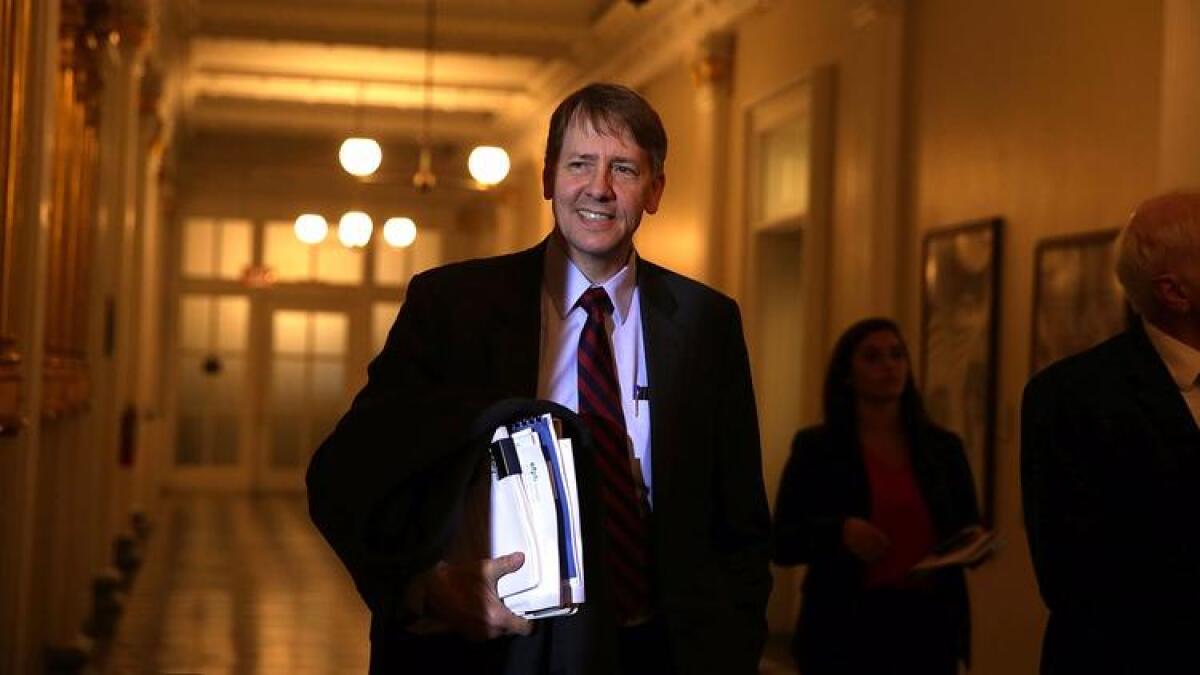
The Republican push to oust Richard Cordray as director of the Consumer Financial Protection Bureau soon might get a boost from an unexpected source: Cordray himself.
Cordray’s term as the bureau’s first and only director doesn’t expire until next summer. But there is widespread speculation that he will run for the Democratic nomination for governor of his home state of Ohio.
His departure could leave the controversial watchdog agency, created in the aftermath of the 2008 financial crisis, in limbo for months and jeopardize regulations covering consumer arbitration clauses and payday lending.
A former Ohio attorney general, Cordray would need to step down soon to launch a bid for the 2018 election. The first Democratic candidates debate is Sept. 12. He could announce his intentions as early as Monday, when he is scheduled to speak at the AFL-CIO’s annual Labor Day picnic in Cincinnati.
Cordray’s departure probably would trigger a messy succession fight at the bureau.
Republicans face Sept. 30 deadline for fast-track Obamacare repeal
The Senate parliamentarian has dealt a new blow to congressional Republicans’ Obamacare repeal campaign, ruling that the GOP can use a special procedure to advance repeal legislation with 50 votes only until the end of September.
Republicans have been relying on a process known as budget reconciliation to try to roll back the 2010 healthcare law.
This process — which prevents legislation in the Senate from being filibustered — was crucial to passing a repeal bill because Republicans have only 52 votes in the Senate, short of the 60 normally required to override a filibuster.
But the process is limited by a budget resolution, which Congress passed earlier this year, laying out how repeal legislation can be advanced.
The parliamentarian has ruled that the resolution expires on Sept. 30, according to Vermont Sen. Bernie Sanders, the senior Democrat on the Senate Budget Committee. (Sanders is an independent but caucuses with the Democrats; he also sought the party’s presidential nomination on 2016.)
“Today’s determination by the Senate parliamentarian is a major victory for the American people and everyone who fought against President Trump’s attempt to take away healthcare from up to 32 million people,” Sanders said in a statement.
If Republicans want to renew their repeal push after Sept. 30, they would have to pass a new budget resolution.
But that threatens to complicate their efforts to push other legislation overhauling the tax code, which Trump and other senior Republicans have signaled is their top priority. They already plan to use the same budget procedure for the tax legislation.
The White House indicated that the development came as little surprise. Marc Short, Trump’s legislative director, said in an interview Friday afternoon that the administration always assumed a Sept. 30 deadline for using the special budget provision to advance repeal legislation.
The White House has been supporting an effort to revive the repeal push by several GOP senators, including Sens. Lindsey Graham of South Carolina, Bill Cassidy of Louisiana and Dean Heller of Nevada.
Noah Bierman in Washington contributed to this report.
1:30 p.m.: This article was updated with White House reaction.
John McCain returns to Congress with a message about Trump: ‘We don’t answer to him. We answer to the American people’
Sen. John McCain is back, returning to Washington with a message for his colleagues in the age of President Trump.
McCain picked up Friday where he left off, before going home to Arizona to begin cancer treatment, insistent as ever that Congress must exercise its role as a check on executive power, even if that means going against the leader of his own Republican Party.
“Congress must govern with a president who has no experience of public office, is often poorly informed and can be impulsive in his speech and conduct,” McCain wrote in an op-ed in the Washington Post.
“We must respect his authority and constitutional responsibilities. We must, where we can, cooperate with him. But we are not his subordinates. We don’t answer to him. We answer to the American people,” McCain went on.
“We must be diligent in discharging our responsibility to serve as a check on his power. And we should value our identity as members of Congress more than our partisan affiliation.”
Congress resumes next week after a long summer recess, and McCain’s comments, coming days after his 81st birthday, serve as a warning notice that the six-term senator shows no signs of retreating as he battles brain cancer.
Republicans face Sept. 30 deadline for fast-track Obamacare repeal >>
More likely, McCain is positioning himself as a leading Republican voice at a time when others have been reluctant to criticize the president, fearful of Trump’s public rebukes on Twitter or elsewhere.
McCain has rarely been timid, and in many ways, he is continuing the course set in July when he stunned Washington with his vote against the healthcare bill. At the time, he urged senators in a piercing floor speech to quit listening to the “bombastic loudmouths” on partisan talk radio and online, and get to work by returning to the regular congressional order of committee hearings and votes to address the nation’s concerns, regardless of party.
U.S. orders Russia to close more diplomatic offices in escalating dispute
Responding to a Russian government demand to drastically slash American diplomatic staff in Russia, the Trump administration on Thursday ordered Moscow to close three of its consular offices in the United States.
Russia will be required to close its consulate in San Francisco, the chancery annex in Washington and the consular annex in New York, the State Department announced. The deadline is Saturday
A senior administration official would not say how many Russian staffers were affected but noted they will not be required to leave the country. The official also did not say whether the Russian missions employ any Americans.
The move was the latest tit-for-tat in worsening relations between Washington and Moscow despite President Trump’s expressions of friendliness toward Russian President Vladimir Putin.
White House says DACA decision to come Tuesday as Ryan, business leaders urge Trump to save program for young immigrants
The White House promised a decision Tuesday on so-called Dreamers as the nation’s business, religious and congressional leaders urge President Trump to save the DACA program that shields young immigrants from deportation and provides work permits for employment.
“We love the Dreamers,” Trump said during an event Friday at the White House. “Over the weekend, we’ll have a decision.”
Later, Press Secretary Sarah Huckabee Sanders said the announcement will be made Tuesday.
The pending decision comes as House Speaker Paul D. Ryan joined Friday with executives of some of the nation’s most well-known companies -- Google, General Motors, Microsoft, Starbucks -- urging Trump not to dismantle the program for the young immigrants, whose compelling stories of growing up in the United States, after being brought to the country illegally as children, have engendered widespread and bipartisan support.
Trump is under enormous pressure to end the Obama-era protections for Dreamers, as the young people are called, prodded by immigration critics and 10 Republican attorneys general who are expected to file a legal challenge next week.
But Trump appears conflicted, having promised to have “heart” when it comes to the more than 750,000 young immigrants who have registered with the federal government and whose ability to work and remain in the U.S. would be in jeopardy.
The Deferred Action for Childhood Arrivals program provides temporary, two-year permits that protect the immigrants from deportation if they remain lawful, are working or attending school or join the military.
As Trump heads to Texas on Saturday to survey damage from Gulf Coast storm Harvey, he is likely to be met by many Dreamers who number 50,000 in Houston and have been a longtime, organized presence in the region.
“Dreamers are vital to the future of our companies and our economy. With them, we grow and create jobs,” wrote hundreds of business and tech industry leaders, including executives of Apple, EBay, Crate and Barrel and Cushman & Wakefield/PICOR.
“As entrepreneurs and business leaders, we are concerned about new developments in immigration policy that threaten the future of young undocumented immigrants brought to America as children,” the business leaders wrote.
Ryan said Friday that Trump should not end the program and instead hold off while Congress considers a legislative solution for the young people in “limbo.”
“I actually don’t think he should do that,” Ryan said on WCLO radio in his hometown of Janesville, Wis., according to CNN. “I believe that this is something that Congress has to fix.”
Another top Republican, Sen Orrin Hatch of Utah, also weighed in Friday. “I’ve urged the President not to rescind DACA,” Hatch wrote on Twitter, arguing that the solution “must come from Congress.”
Religious leaders, including evangelical Christians, have also joined in support of maintaining the program.
Studies show that most DACA recipients — 87% — are using their work permits to gain legal employment, and 83% of those in school also are working.
About 6% of DACA recipients have started businesses and 12% are now homeowners, according to the report from the Center for American Progress, a liberal-leaning advocacy group.
“I stand with the Dreamers,” Facebook’s Mark Zuckerberg wrote Friday.
“Dreamers have a special love for this country because they can’t take living here for granted. ... We need a government that protects Dreamers,” Zuckerberg wrote. “These young people represent the future of our country and our economy. They are our friends and family, students and young leaders in our communities. I hope you will join us in speaking out.”
Trump’s administration has stepped up detentions of immigrants here illegally since January, largely doing away with Obama-era enforcement priorities that targeted those with criminal backgrounds.
The business leaders, organized by immigration advocate Fwd.us, also called on Congress to intervene with a legislative fix to ensure the young people will not lose their protected status and face deportation.
“We call on President Trump to preserve the DACA program. We call on Congress to pass the bipartisan DREAM Act or legislation that provides these young people raised in our country the permanent solution they deserve.”
Ever since the collapse of a bipartisan immigration overhaul in 2013, Congressional has not delved deeply into the issue, but several bills are now pending in Congress to protect the Dreamers.
12:28 p.m.: This article was updated with Trump’s comments.
Correction: A previous version of this story incorrectly stated that Cushman & Wakefield, a Chicago-based real estate firm, had signed a letter asking Trump not to end DACA. It was Cushman & Wakefield/PICOR, a separate real estate company based in Tucson, Ariz.
Silicon Valley on edge as lawmakers target online sex trafficking
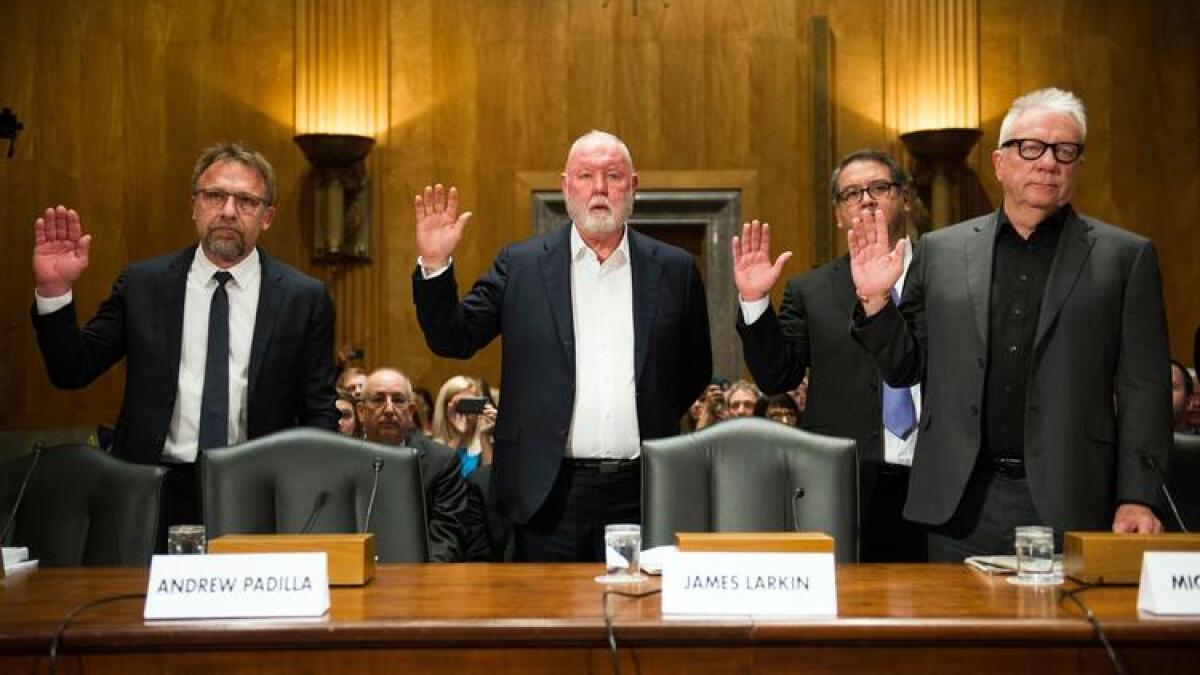
After a sustained assault from lawmakers, investigators and victims groups, the website Backpage.com agreed early this year to shut down its lucrative adult page, which had become a well-known sex-trafficking hub.
It wasn’t long before the company was back in the headlines.
The adult section was gone, but the sex traffic was not. In May, authorities in Stockton charged 23 people with involvement in a trafficking ring that was using another corner of Backpage to market sex with girls as young as 14. A Chicago teenager allegedly trafficked on Backpage had her throat slit in June.
The resilience of this platform — host to an estimated 70% of online sex trafficking at its peak — is a long-running public relations mess for the tech industry. Internet freedom laws held sacred in Silicon Valley have helped shield Backpage from prosecution and lawsuits by victims of gruesome sex trafficking.
Now the tech industry’s Backpage problem has evolved into a full-blown political crisis.
U.S. employers add 156,000 jobs in August; unemployment rate edges up to 4.4%
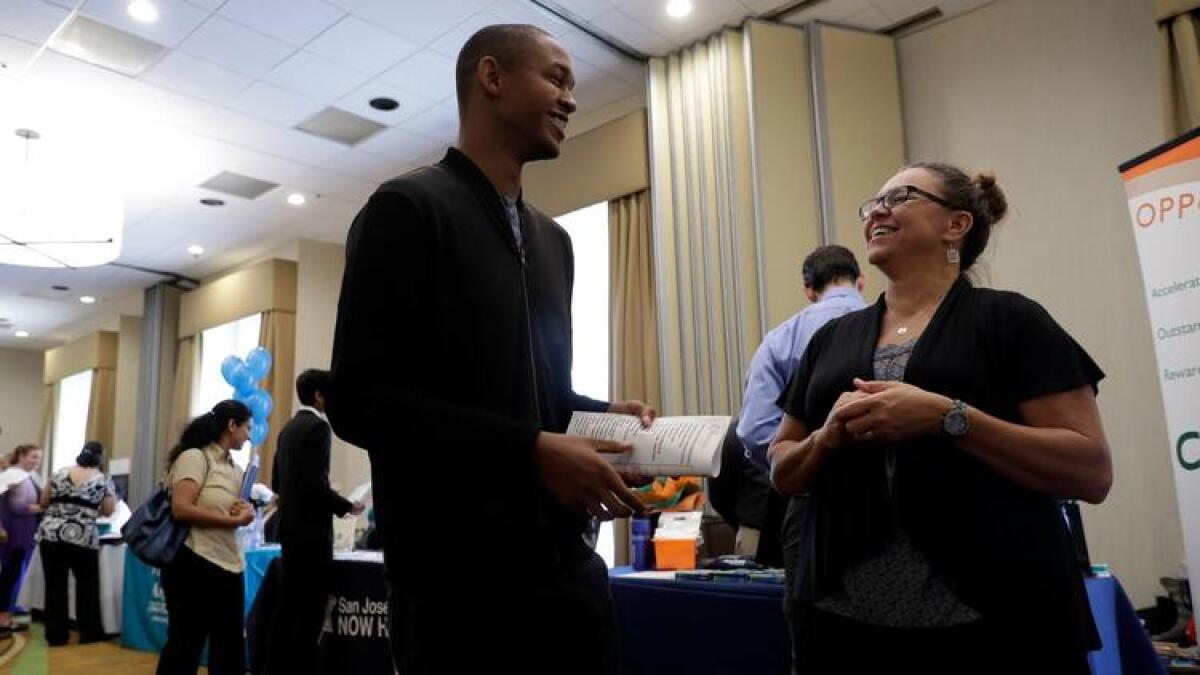
The nation’s resilient labor market showed signs of slowing last month as hiring eased, the unemployment rate ticked up and wage growth remained subdued, the government said Friday.
Employers in the U.S. added a less-than-expected 156,000 net new jobs. That is down from payroll increases of 189,000 in July and 210,000 in June. These figures for the prior two months were revised down by a total of 41,000 jobs.
The nation’s unemployment rate edged back up to 4.4% from 4.3% in July. The jobless figure is calculated from a separate household survey, and by this measure, the economy did not generate enough new work opportunities in August to meet the growth in the working-age population.
‘Disappointed’ and ‘let down,’ disaffected Trump voters voice their dismay

The roughly one-in-four Americans who consistently tell pollsters that they approve of Trump’s performance in office get a lot of attention.
But there’s another, somewhat smaller group of Trump voters — the disaffected ones — who could play a crucial role in the president’s political future.
A recent focus group in Pittsburgh brought their voices to the fore.
“Outrageous,” “disappointed,” “not ready” were among the adjectives that focus group members tossed out when asked for a single word to describe the president — and those were from the participants who had voted for him.